Similar presentations:
О.В. Терентьева, Л.М. Гудкова. Английский язык. Новый полный справочник
1.
2.
О.В. Терентьева, Л.М. ГудковаАНГЛИЙСКИЙ ЯЗЫК
НОВЫЙ ПОЛНЫЙ
СПРАВОЧНИК
ДЛЯ ПОДГОТОВКИ
к
ОГЭ
4-е издание, переработанное
и дополненное
Издательство АСТ
Москва
2019
3.
УДК 373:811.111ББК 81.2Англ-9
Т35
Т35
Терентьева, Ольга Валентиновна.
Английский язык : новый полный справочник для
подготовки к ОГЭ / О.В.Терентьева, Л.М. Гудкова. 4-е
изд., перераб. и доп. — Москва : Издательство АСТ,
2019. — 288 с.
ISBN 978-5-17-116620-5
(Новый полный справочник для подготовки к ОГЭ)
ISBN 978-5-17-116621-2
(Самый популярный справочник для подготовки к ОГЭ)
В справочнике, адресованном выпускникам 9-х классов,
в полном объёме дан материал курса «Английский язык»,
который проверяется на основном государственном экзамене.
Структура книги соответствует современному кодификатору элементов содержания по предмету, на основе которого
составлены экзаменационные задания — контрольные измерительные материалы (КИМ) ОГЭ.
В справочнике представлены все разделы письменной
части экзамена («Аудирование», «Чтение», «Грамматика и
лексика», «Письмо») и его устная часть («Говорение» в новом
формате).
Каждый раздел содержит необходимый языковой материал, образцы экзаменационных заданий и рекомендации по
их выполнению. Компактные таблицы с краткими пояснениями и примерами облегчают запоминание грамматических
правил.
УДК 373:811.111
ББК 81.2Англ-9
ISBN 978-5-17-116620-5
(Новый полный справочник для подготовки к ОГЭ)
ISBN 978-5-17-116621-2
(Самый популярный справочник для подготовки к ОГЭ)
© Терентьева О.В., Гудкова Л.М., 2019
© ООО «Издательство «АСТ», 2019
4.
СодержаниеПРЕДИСЛОВИЕ. . . . . . . . . . . . . . . . . . . . . . . . . . . . . . . . . . . . . . . 6
Содержание ОГЭ по английскому языку . . . . . . . . . . . . . . . . . . . . 8
АУДИРОВАНИЕ. . . . . . . . . . . . . . . . . . . . . . . . . . . . . . . . . . . . . . . . . . .9
ЧТЕНИЕ . . . . . . . . . . . . . . . . . . . . . . . . . . . . . . . . . . . . . . . . . . . . . . . .10
ГРАММАТИКА И ЛЕКСИКА . . . . . . . . . . . . . . . . . . . . . . . . . . . . . . .11
ПИСЬМО . . . . . . . . . . . . . . . . . . . . . . . . . . . . . . . . . . . . . . . . . . . . . . . .13
ГОВОРЕНИЕ. . . . . . . . . . . . . . . . . . . . . . . . . . . . . . . . . . . . . . . . . . . . .19
ПРАВИЛА ЗАПОЛНЕНИЯ ЭКЗАМЕНАЦИОННЫХ
БЛАНКОВ . . . . . . . . . . . . . . . . . . . . . . . . . . . . . . . . . . . . . . . . . 27
Раздел «АУДИРОВАНИЕ» . . . . . . . . . . . . . . . . . . . . . . . . . . . 32
Типичные ошибки при выполнении заданий
раздела «Аудирование . . . . . . . . . . . . . . . . . . . . . . . . . . . . . . . . . 32
Задание 1 на установление соответствия . . . . . . . . . . . . . . . . . . 32
РЕКОМЕНДАЦИИ К ВЫПОЛНЕНИЮ ЗАДАНИЯ 1 . . . . . . . . 33
ТРЕНИРОВОЧНЫЕ ОБРАЗЦЫ ЗАДАНИЯ 1
ФОРМАТА ОГЭ . . . . . . . . . . . . . . . . . . . . . . . . . . . . . . . . . . . . . . . 33
Задание 2 на установление соответствия . . . . . . . . . . . . . . . . . . 35
РЕКОМЕНДАЦИИ К ВЫПОЛНЕНИЮ ЗАДАНИЯ 2 . . . . . . . . 36
ТРЕНИРОВОЧНЫЕ ОБРАЗЦЫ ЗАДАНИЯ 2
ФОРМАТА ОГЭ . . . . . . . . . . . . . . . . . . . . . . . . . . . . . . . . . . . . . . . 36
Задания с выбором ответа . . . . . . . . . . . . . . . . . . . . . . . . . . . . . . 38
РЕКОМЕНДАЦИИ К ВЫПОЛНЕНИЮ
ЗАДАНИЙ С ВЫБОРОМ ОТВЕТА . . . . . . . . . . . . . . . . . . . . . . . 39
ТРЕНИРОВОЧНЫЕ ОБРАЗЦЫ ЗАДАНИЙ
С ВЫБОРОМ ОТВЕТА ФОРМАТА ОГЭ. . . . . . . . . . . . . . . . . . . . 39
Тексты для аудирования . . . . . . . . . . . . . . . . . . . . . . . . . . . . . 43
Задание 1 . . . . . . . . . . . . . . . . . . . . . . . . . . . . . . . . . . . . . . . . . . . . 43
Задание 2 . . . . . . . . . . . . . . . . . . . . . . . . . . . . . . . . . . . . . . . . . . . . 46
Задания с выбором ответа . . . . . . . . . . . . . . . . . . . . . . . . . . . . . . 48
Раздел «ЧТЕНИЕ» . . . . . . . . . . . . . . . . . . . . . . . . . . . . . . . . . . 52
ТИПИЧНЫЕ ОШИБКИ ПРИ ВЫПОЛНЕНИИ
ЗАДАНИЙ РАЗДЕЛА «ЧТЕНИЕ» . . . . . . . . . . . . . . . . . . . . . . . 52
Задание на установление соответствия . . . . . . . . . . . . . . . . . . . 52
РЕКОМЕНДАЦИИ К ВЫПОЛНЕНИЮ
ЗАДАНИЯ НА УСТАНОВЛЕНИЕ СООТВЕТСТВИЯ . . . . . . . . 53
ТРЕНИРОВОЧНЫЕ ЗАДАНИЯ НА УСТАНОВЛЕНИЕ
СООТВЕТСТВИЯ ФОРМАТА ОГЭ. . . . . . . . . . . . . . . . . . . . . . . . 54
3
5.
СОДЕРЖАНИЕЗадания с выбором ответа . . . . . . . . . . . . . . . . . . . . . . . . . . . . . . 63
РЕКОМЕНДАЦИИ К ВЫПОЛНЕНИЮ
ЗАДАНИЙ С ВЫБОРОМ ОТВЕТА . . . . . . . . . . . . . . . . . . . . . . . 64
ТРЕНИРОВОЧНЫЕ ЗАДАНИЯ С ВЫБОРОМ ОТВЕТА
ФОРМАТА ОГЭ . . . . . . . . . . . . . . . . . . . . . . . . . . . . . . . . . . . . . . . 65
Раздел «ГРАММАТИКА И ЛЕКСИКА» . . . . . . . . . . . . . . . 76
ТИПИЧНЫЕ ОШИБКИ ПРИ ВЫПОЛНЕНИИ
ЗАДАНИЙ РАЗДЕЛА «ГРАММАТИКА И ЛЕКСИКА» . . . . . . 76
Задания на формообразование . . . . . . . . . . . . . . . . . . . . . . . . . . 77
Практический справочник по грамматике . . . . . . . . . . . . . . . . . 78
Существительные . . . . . . . . . . . . . . . . . . . . . . . . . . . . . . . . . . . . . 78
Местоимения. . . . . . . . . . . . . . . . . . . . . . . . . . . . . . . . . . . . . . . . . 85
Числительные . . . . . . . . . . . . . . . . . . . . . . . . . . . . . . . . . . . . . . . . 97
Прилагательные/наречия . . . . . . . . . . . . . . . . . . . . . . . . . . . . . . 99
Глагол. Активный залог . . . . . . . . . . . . . . . . . . . . . . . . . . . . . . . 109
Глаголы. Пассивный (страдательный) залог. . . . . . . . . . . . . . . 132
Условные предложения и сослагательное наклонение . . . . . . . 138
Косвенная речь. Согласование времен. . . . . . . . . . . . . . . . . . . . 143
Модальные глаголы . . . . . . . . . . . . . . . . . . . . . . . . . . . . . . . . . . 146
Инфинитив/герундий. . . . . . . . . . . . . . . . . . . . . . . . . . . . . . . . . 152
Причастие . . . . . . . . . . . . . . . . . . . . . . . . . . . . . . . . . . . . . . . . . . 155
Сложное дополнение. . . . . . . . . . . . . . . . . . . . . . . . . . . . . . . . . . 157
РЕКОМЕНДАЦИИ К ВЫПОЛНЕНИЮ
ЗАДАНИЙ НА ФОРМООБРАЗОВАНИЕ . . . . . . . . . . . . . . . . . 161
ТРЕНИРОВОЧНЫЕ ЗАДАНИЯ
НА ФОРМООБРАЗОВАНИЕ ФОРМАТА ОГЭ . . . . . . . . . . . . . 163
Задания на словообразование . . . . . . . . . . . . . . . . . . . . . . . . . . 168
Практический справочник по словообразованию. . . . . . . . . . . 168
Префиксы . . . . . . . . . . . . . . . . . . . . . . . . . . . . . . . . . . . . . . . . . . 169
Суффиксы существительных . . . . . . . . . . . . . . . . . . . . . . . . . . . 173
Суффиксы прилагательных . . . . . . . . . . . . . . . . . . . . . . . . . . . . 178
Суффиксы глаголов. . . . . . . . . . . . . . . . . . . . . . . . . . . . . . . . . . . 185
Суффиксы наречий . . . . . . . . . . . . . . . . . . . . . . . . . . . . . . . . . . . 186
РЕКОМЕНДАЦИИ К ВЫПОЛНЕНИЮ
ЗАДАНИЙ НА СЛОВООБРАЗОВАНИЕ. . . . . . . . . . . . . . . . . . 195
ТРЕНИРОВОЧНЫЕ ЗАДАНИЯ
НА СЛОВООБРАЗОВАНИЕ ФОРМАТА ОГЭ . . . . . . . . . . . . . . 196
Раздел «ПИСЬМО» . . . . . . . . . . . . . . . . . . . . . . . . . . . . . . . . . 201
ТИПИЧНЫЕ ОШИБКИ ПРИ ВЫПОЛНЕНИИ
ЗАДАНИЯ РАЗДЕЛА «ПИСЬМО» . . . . . . . . . . . . . . . . . . . . . . 201
4
6.
СОДЕРЖАНИЕРЕКОМЕНДАЦИИ К ВЫПОЛНЕНИЮ
ЗАДАНИЯ «ЛИЧНОЕ ПИСЬМО». . . . . . . . . . . . . . . . . . . . . . . 202
ТРЕНИРОВОЧНЫЕ ЗАДАНИЯ «ЛИЧНОЕ ПИСЬМО» . . . . . 207
Раздел «ГОВОРЕНИЕ» . . . . . . . . . . . . . . . . . . . . . . . . . . . . . 210
ТИПИЧНЫЕ ОШИБКИ ПРИ ВЫПОЛНЕНИИ
ЗАДАНИЙ РАЗДЕЛА «ГОВОРЕНИЕ» . . . . . . . . . . . . . . . . . . 210
Задание 1. . . . . . . . . . . . . . . . . . . . . . . . . . . . . . . . . . . . . . . . . . . 211
РЕКОМЕНДАЦИИ К ВЫПОЛНЕНИЮ ЗАДАНИЯ 1 . . . . . . . 211
ТРЕНИРОВОЧНЫЕ ЗАДАНИЯ 1
УСТНОЙ ЧАСТИ ОГЭ. . . . . . . . . . . . . . . . . . . . . . . . . . . . . . . . . 212
Задание 2. . . . . . . . . . . . . . . . . . . . . . . . . . . . . . . . . . . . . . . . . . . 214
РЕКОМЕНДАЦИИ К ВЫПОЛНЕНИЮ ЗАДАНИЯ 2 . . . . . . . 214
ТРЕНИРОВОЧНЫЕ ЗАДАНИЯ 2
УСТНОЙ ЧАСТИ ОГЭ. . . . . . . . . . . . . . . . . . . . . . . . . . . . . . . . . 215
Задание 3. . . . . . . . . . . . . . . . . . . . . . . . . . . . . . . . . . . . . . . . . . . 216
РЕКОМЕНДАЦИИ К ВЫПОЛНЕНИЮ ЗАДАНИЯ 3 . . . . . . . 216
ТРЕНИРОВОЧНЫЕ ЗАДАНИЯ 3
УСТНОЙ ЧАСТИ ОГЭ. . . . . . . . . . . . . . . . . . . . . . . . . . . . . . . . . 218
Тексты для аудирования к заданию 2 . . . . . . . . . . . . . . . . . . . . 222
Справочный материал . . . . . . . . . . . . . . . . . . . . . . . . . . . . . . . . 241
Орфография и пунктуация . . . . . . . . . . . . . . . . . . . . . . . . . . . . . 241
Чтение гласных и их сочетаний . . . . . . . . . . . . . . . . . . . . . . . . . 244
Чтение согласных и их сочетаний . . . . . . . . . . . . . . . . . . . . . . . 246
Артикль . . . . . . . . . . . . . . . . . . . . . . . . . . . . . . . . . . . . . . . . . . . . 249
Список неправильных глаголов . . . . . . . . . . . . . . . . . . . . . . . . . 253
Ключи к заданиям . . . . . . . . . . . . . . . . . . . . . . . . . . . . . . . . . . . 260
Список литературы . . . . . . . . . . . . . . . . . . . . . . . . . . . . . . . . . . . 281
7.
ПредисловиеДанный справочник содержит полную информацию,
необходимую для успешной сдачи ОГЭ по английскому
языку.
Его цель — помочь учащимся 9-х классов более подробно познакомиться со структурой экзамена, систематизировать и расширить свои знания. Он также может быть
полезен учителям, которые найдут в нём необходимый
материал для работы на уроках и в процессе подготовки
учащихся.
Справочник состоит из семи разделов, в которых представлена подробная общая информация о структуре ОГЭ по
английскому языку, а также все разделы письменной части экзамена (аудирование, чтение, лексика и грамматика,
письмо) и его устная часть (говорение — в новом формате).
В каждом разделе даются рекомендации к его выполнению,
необходимый теоретический и практический материал для
тренировки.
Раздел «Содержание ОГЭ по английскому языку» представляет общую информацию о содержании экзаменационной работы и контрольных измерительных материалов по
английскому языку, включая правила заполнения бланков.
В разделах «Аудирование» и «Чтение» даются образцы тренировочных заданий разных типов и рекомендации
к их выполнению.
В разделе «Грамматика и лексика» изложен обширный
справочный материал по грамматике и словообразованию
с большим количеством упражнений для закрепления
лексико-грамматических навыков, а также рекомендации
к выполнению различных типов заданий, даны образцы
экзаменационных заданий для совершенствования практических лексико-грамматических навыков.
В разделе «Письмо» приводятся правила написания
личного письма, критерии оценивания письма и порядок
подсчёта слов в личном письме, рекомендации к выполне6
8.
Предисловиению задания по письму, даны образцы экзаменационных
заданий для совершенствования практических навыков
письма. Также предлагаются возможные варианты написания писем.
Раздел «Говорение» знакомит с новым форматом устной
части экзамена, критериями оценивания выполнения заданий по говорению. В разделе также даны рекомендации
и образцы экзаменационных заданий для совершенствования практических навыков говорения.
В отдельном разделе представлен полный экзаменационный вариант письменной части ОГЭ с ответами и текстами для аудирования.
В Приложении помещён необходимый справочный материал. После выполнения заданий можно сверить ответы
с ключами в конце пособия. Работая с заданиями и следуя
рекомендациям, учащиеся смогут выработать собственную
стратегию выполнения экзаменационной работы.
Поскольку в формате экзаменационных заданий, их
количестве и системе оценивания возможны изменения,
рекомендуется в процессе подготовки к экзаменам обращаться к материалам сайта официального разработчика
экзаменационных материалов — Федерального института
педагогических измерений: www. pi.ru.
9.
СОДЕРЖАНИЕ ОГЭПО АНГЛИЙСКОМУ ЯЗЫКУ
Целью ОГЭ по английскому языку является определение уровня англоязычной коммуникативной компетенции выпускников 9-го класса в разных видах речевой деятельности: аудировании, чтении, письме и говорении.
Языковые знания и навыки проверяются также в разделе
«Грамматика и лексика». Практическое применение языковых умений, а также социокультурные знания — в разделах «Письмо» и «Говорение».
Проверка осуществляется посредством КИМ (контрольных измерительных материалов), т.е. пакета экзаменационных заданий, позволяющих установить уровень освоения учащимися 9-х классов Федерального
компонента государственного образовательного стандарта основного общего образования. Контрольно-измерительные материалы разрабатываются специалистами Федерального института педагогических измерений
(ФИПИ) и содержат экзаменационные задания по всем
видам речевой деятельности. Структура и содержание
КИМ определяются двумя документами: спецификацией
и кодификатором.
В соответствии со спецификацией 2019 г. экзаменационная работа в 9 классе содержит письменную часть (разделы «Аудирование», «Чтение», «Грамматика и лексика»,
«Письмо») и устную часть «Говорение», которая проводится в отдельный день.
Второй документ, который регламентирует структуру
и содержание КИМ, — кодификатор элементов содержания и требований к уровню подготовки девятиклассников.
Перечень элементов содержания, проверяемых на ОГЭ
по английскому языку, составлен на базе Обязательного
минимума содержания основных образовательных программ и Требований к уровню подготовки выпускников
Федерального компонента государственного стандарта
основного общего образования по иностранным языкам,
8
10.
Содержание ОГЭ по английскому языкуа также Примерных программ по английскому языку. Разделы, указанные в кодификаторе, положены в основу данного справочника.
АУДИРОВАНИЕ
Задача этого раздела — проверка умений аудирования,
т.е. восприятия на слух и понимания основного содержания прослушанного текста или запрашиваемой информации. В разделе используются высказывания собеседников
в распространённых стандартных ситуациях повседневного общения, прагматические (объявления) и информационные аудиотексты. Трансляция аудиотекста осуществляется
с помощью технических средств, позволяющих качественно воспроизводить аудиозаписи. Длительность звучания
текста для аудирования — 1,5–2 мин. В аудиозаписи все
тексты звучат дважды в исполнении носителей языка.
В разделе «Аудирование» проверяются следующие элементы содерж ания:
— понимание основного содержания несложных звучащих аутентичных текстов;
— выборочное понимание необходимой/ запрашиваемой информации в несложных звучащих аутентичных текстах.
Перечень требований к уровню подготовки, достижение
которого проверяется в ходе выполнения раздела «Аудирование», включает необходимость наличия следующих умений.
1. Понимать основное содержание несложных аутентичных прагматических текстов и выделять значимую информацию.
2. Понимать основное содержание несложных аутентичных текстов, относящихся к разным коммуникативным типам речи (сообщение / рассказ / диалог).
3. Определять тему звучащего текста; выделять главные факты, опуская второстепенные.
4. Использовать языковую догадку, контекст.
5. Игнорировать неизвестный языковой материал, несущественный для понимания.
9
11.
СОДЕРЖАНИЕ ОГЭ ПО АНГЛИЙСКОМУ ЯЗЫКУЧТЕНИЕ
Задача этого раздела — проверка сформированности
умений понимания основного содержания прочитанного
текста или запрашиваемой информации.
В разделе «Чтение» проверяются следующие элементы
содерж ания:
— выборочное понимание нужной / интересующей информации из текста (просмотровое / поисковое чтение);
— полное и точное понимание содержания несложных
аутентичных адаптированных текстов разных жанров (изучающее чтение).
В разделе «Чтение» используются прагматические, научно-популярные, публицистические и художественные
тексты.
Объём текстов для чтения — 220–600 слов в зависимости от проверяемых умений и навыков, а также характера
задания. Языковая сложность текстов для чтения соответствует заявленному уровню сложности экзаменационной
работы (А2 по общеевропейской шкале).
Перечень требований к уровню подготовки, достижение
которого проверяется в ходе выполнения раздела «Чтение»,
включает необходимость наличия следующих умений.
1. Читать аутентичные тексты разных жанров с пониманием основного содержания.
2. Читать текст с выборочным пониманием нужной / интересующей информации (просмотровое / поисковое чтение).
3. Читать несложные аутентичные адаптированные
тексты разных жанров с полным и точным пониманием содержания.
4. Определять тему (в том числе по заголовку), выделять основную мысль.
5. Выделять главные факты, опуская второстепенные.
6. Устанавливать логическую последовательность основных фактов текста.
7. Использовать различные приёмы смысловой переработки текста: языковую догадку, анализ.
8. Оценивать полученную информацию.
10
12.
Содержание ОГЭ по английскому языкуГРАММАТИКА И ЛЕКСИКА
Задача этого раздела — проверка навыка употребления
грамматических и лексических форм на основе предложенных текстов.
В разделе «Грамматика и лексика» проверяются прежде
всего следующие элементы содерж ания.
Грамматическая сторона речи
1. Коммуникативные типы предложений (утвердительные, вопросительные, отрицательные) в Present, Future,
Past Simple; Present Perfect; Present Continuous и порядок
слов в них.
2. Предложения с there + to be (There are a lot of trees
in the park).
3. Сложноподчинённые предложения с союзами и союзными словами what, when, why, which, that, who, if, because,
that’s why, than, so, for, since, during, so that, unless.
4. Условные предложения реального (Conditional I)
и нереального характера (Conditional II).
5. Предложения с конструкцией I wish (I wish I had my
own room.).
6. Конструкции с глаголами на -ing: to love/hate doing
something; Stop talking.
7. Конструкции It takes me... to do something; to look/
feel/be happy.
8. Согласование времён в рамках сложного предложения.
9. Косвенная речь в утвердительных и вопросительных предложениях в настоящем и прошедшем времени.
10. Наиболее употребительные личные формы глаголов
действительного залога: Present Simple, Future Simple и Past
Simple, Present и Past Continuous, Present и Past Perfect.
11. Личные формы глаголов страдательного залога
Present Simple Passive, Future Simple Passive и Past Simple
Passive.
12. Фразовые глаголы (look for,...)
13. Модальные глаголы и их эквиваленты (may, can/
be able to, must/have to/should; need, shall, could, might,
would).
11
13.
СОДЕРЖАНИЕ ОГЭ ПО АНГЛИЙСКОМУ ЯЗЫКУ14. Различные грамматические средства для выражения будущего времени: Simple Future, to be going to, Present
Continuous.
15. Причастия настоящего и прошедшего времени.
16. Имена существительные во множественном числе,
образованные по правилу, и исключения.
17. Исчисляемые и неисчисляемые существительные.
18. Определёный / неопределённый / нулевой артикль.
19. Местоимения: личные (в именительном и объектном падежах, а также в абсолютной форме), притяжательные, указательные, неопределённые, относительные, вопросительные.
20. Имена прилагательные в положительной, сравнительной и превосходной степенях, образованные по правилу, а также исключения.
21. Наречия в сравнительной и превосходной степенях,
а также наречия, выражающие количество (many/much,
few/a few, little/a little).
22. Числительные количественные, порядковые.
ЛЕКСИЧЕСКАЯ СТОРОНА РЕЧИ
1. Многозначность лексических единиц. Синонимы.
Антонимы.
2. Лексическая сочетаемость.
3. Аффиксы глаголов: re-, dis-, mis-; -ize/ise.
4. Аффиксы существительных: -er/-or, -ness, -ist, -ship,
-ing, -sion/-tion, -ance/-ence, -ment, -ity/-ty.
5. Аффиксы прилагательных: -y, -ic, -ful, -al, -ly, -ian/
-an, -ent, -ing, -ous, -ible/-able, -less, -ive, -inter-, un-, in-/im-.
6. Суффикс наречий -ly.
7. Суффиксы числительных: -teen, -ty, -th
Задания по грамматике и лексике — с кратким ответом.
Ответ даётся записью в соответствующую строку Бланка
ответов № 1 в виде слова или словосочетания, записанных
без пробелов и других разделителей.
12
14.
Содержание ОГЭ по английскому языкуПИСЬМО
Задача данного раздела — проверка сформированности
продуктивного умения создавать письменный текст в соответствии с заданием.
В разделе «Письмо» проверяются следующие элементы содерж ания:
— заполнение анкет и формуляров (имя, фамилия, пол,
возраст, гражданство, адрес);
— написание короткого поздравления (с днём рождения, с другим праздником) с соответствующими пожеланиями;
— написание личного письма по образцу.
Именно личное письмо, как наиболее оптимальный вариант для проверки сформированности навыка письма, может быть включён в ОГЭ по английскому языку.
Перечень требований к уровню подготовки, достижение которого проверяется в ходе выполнения раздела
«Письмо», включает необходимость наличия следующих
умений.
1. Писать личное письмо по образцу.
2. В личном письме расспрашивать адресата о его жизни и делах, сообщать то же о себе.
3. Выражать благодарность, просьбу.
4. Употреблять формулы речевого этикета, принятые
в странах изучаемого языка.
5. Уметь выходить из положения при дефиците языковых средств.
6. Владеть орфографическими и грамматическими навыками на основе изучаемого лексико-грамматического
материала.
Оценивание выполнения задания
«Личное письмо»
В отличие от других разделов письменной части ОГЭ,
раздел «Письмо» оценивается экспертами предметной комиссии, прошедшими специальную подготовку и руководствующимися установленными критериями.
13
15.
14К1
Решение
коммуникативной
задачи
Критерии
оценивания
Задание выполнено полностью:
даны полные
ответы на три
заданных вопроса.
Правильно выбраны обращение,
завершающая
фраза и подпись.
Есть благодарность, упоминание
о предыдущих контактах, выражена
надежда на будущие контакты
3 балла
Задание выполнено: даны ответы на
три заданных вопроса, НО на один
вопрос дан неполный ответ. Есть 1–2
нарушения в стилевом оформлении
письма, И/ИЛИ
отсутствует благодарность, упоминание о предыдущих/
будущих контактах
2 балла
(Максимум 10 баллов)
Задание
выполнено
частично: даны
ответы на заданные вопросы, НО
на два вопроса
даны неполные
ответы, ИЛИ
ответ на один вопрос отсутствует.
Имеется более 2
нарушений в стилевом оформлении письма и в
соблюдении
норм вежливости
1 балл
0 баллов
Задание не
выполнено:
отсутствуют
ответы на
два вопроса,
ИЛИ текст
письма не
соответствует
требуемому
объёму*.
Критерии оценивания выполнения задания «Письмо»
СОДЕРЖАНИЕ ОГЭ ПО АНГЛИЙСКОМУ ЯЗЫКУ
16.
К2Организация текста
Текст логично выстроен и разделён
на абзацы, правильно использованы языковые средства для передачи
логической связи,
оформление текста
соответствует
нормам письменного этикета
Текст в основном
логично выстроен, НО имеются
недостатки (1–2)
при использовании средств логической связи
И/ИЛИ делении
на абзацы. ИЛИ
имеются отдельные нарушения в
структурном
оформлении текста письма
Текст выстроен
нелогично,
допущены
многочисленные
ошибки в
структурном
оформлении
текста письма, ИЛИ
оформление
текста не
соответствует
нормам
письменного этикета,
принятого
в стране
изучаемого
языка
Содержание ОГЭ по английскому языку
15
17.
16К3
Лексикограмматическое
оформление
текста
Критерии
оценивания
Использованы
разнообразная
лексика и грамматические
структуры,
соответствующие
поставленной
коммуникативной
задаче (допускается не более 2
языковых ошибок,
не затрудняющих
понимания текста)
3 балла
Имеются языковые
ошибки, не затрудняющие понимания
текста (допускается
не более 4 негрубых
языковых ошибок),
ИЛИ языковые
ошибки отсутствуют, но используются лексические
единицы и грамматические структуры
только элементарного уровня
2 балла
Имеются языковые ошибки, не
затрудняющие
понимания текста
(допускается
не более 5
негрубых языковых ошибок),
И/ИЛИ допущены языковые
ошибки, которые
затрудняют
понимание текста
(не более 1–2 грубых ошибок)
1 балл
Допущены
многочисленные языковые ошибки,
которые
затрудняют
понимание
текста
0 баллов
Окончпние таблицы
СОДЕРЖАНИЕ ОГЭ ПО АНГЛИЙСКОМУ ЯЗЫКУ
18.
Орфографическиеи пунктуационные
ошибки практически отсутствуют
(допускается не
более 2 ошибок, не
затрудняющих понимания текста)
Допущенные
орфографические
и пунктуационные ошибки не
затрудняют понимания текста
(допускается
не более 3–4
ошибок)
Допущены
многочисленные орфографические
и пунктуационные
ошибки, И/
ИЛИ
допущены
ошибки,
которые
затрудняют
понимание
текста
* Приме ча н и е. При получении участником ОГЭ 0 баллов по критерию «Решение коммуникативной задачи» всё задание оценивается в 0 баллов.
К4
Орфография и пунктуация
Содержание ОГЭ по английскому языку
17
19.
СОДЕРЖАНИЕ ОГЭ ПО АНГЛИЙСКОМУ ЯЗЫКУКак видно из приведённой таблицы, оценивание задания происходит по четырём критериям.
1. Решение коммуникативной задачи — оценивается
содержание и полнота выполнения задания. Этот критерий является определяющим, так как при получении 0 баллов по этому критерию ВСЁ ПИСЬМО оценивается в 0 баллов.
Для получения максимальных 3 баллов по первому критерию необходимо:
z дать три полных развёрнутых ответа на заданные
в письме друга вопросы;
z выбрать неофициальный стиль письма (правильное
обращение, завершающая фраза и подпись);
z соблюсти принятые нормы вежливости (поблагодарить за письмо, упомянуть предыдущие контакты
и выразить надежду на последующие контакты, вежливо завершить письмо);
z уложиться в заданный объём (100–120 слов).
На объём письма следует обратить особое внимание.
Допустимое отклонение от заданного объема составляет
10%, т.е. письмо должно содержать от 90 до 132 слов. Если
в письме меньше 90 слов, оно проверяться не будет. При
объёме более 132 слов эксперт проверяет только нормативные 120 слов. При этом часть работы (завершающая фраза,
подпись) не попадают под проверку, что снизит оценку за
письмо в целом.
2. Организация текста — оценивается правильное
оформление и логичность письма.
Для получения максимальных 2 баллов по второму критерию необходимо:
z указать свой адрес в правом верхнем углу письма
(можно краткий);
z указать дату под адресом;
z написать неофициальное обращение на отдельной
строке;
18
20.
Содержание ОГЭ по английскому языкуz правильно и логично построить текст письма и разде-
лить его на абзацы;
средства логической связи (союзы
и вводные слова);
z написать завершающую фразу на отдельной строке
(слева);
z под завершающей фразой указать своё имя (без точки!).
z использовать
3. Лексико-грамматическое оформление текста — оценивается правильное использование лексики и грамматических форм.
Для получения максимальных 3 баллов по третьему
критерию необходимо:
z правильно использовать словарный запас в соответствии с поставленной коммуникативной задачей;
z правильно пользоваться грамматическими формами.
В целом по этому критерию допускается не более двух
ошибок.
4. Орфография и пунктуация — оценивается правильность написания слов и использования знаков пунктуации.
Для получения максимальных 2 баллов по четвёртому
критерию необходимо:
z правильно пользоваться знаками пунктуации (запятыми, точками);
z правильно использовать заглавную букву;
z не делать орфографических ошибок.
В целом по этому критерию допускается не более двух
ошибок.
ГОВОРЕНИЕ
Задача данного раздела — проверка сформированности
фонетических навыков говорения, умения ответить на
заданный вопрос, а также продуктивных умений логически правильно построить монологическое высказывание по
предложенному плану.
19
21.
СОДЕРЖАНИЕ ОГЭ ПО АНГЛИЙСКОМУ ЯЗЫКУУстная часть ОГЭ приведена в соответствие с концепцией и технологией проведения устной части ЕГЭ. Она состоит из тр ех з аданий:
— чтение вслух небольшого текста научно-популярного
характера;
— участие в условном диалоге-расспросе (ответы на заданные вопросы);
— тематическое монологическое высказывание с вербальной опорой в тексте задания.
Эта часть экзамена, как и ЕГЭ, сдаётся в отдельный день.
В разделе «Говорение» проверяются следующие элементы содерж ания.
Диалогическая речь
1. Диалог этикетного характера.
2. Диалог-расспрос.
3. Диалог-побуждение к действию.
4. Диалог-обмен мнениями.
5. Комбинированный диалог (сочетание разных типов
диалогов) для решения сложных коммуникативных задач.
Монологическая речь
1. Краткие высказывания о фактах и событиях с использованием основных коммуникативных типов речи
(описание / характеристика, повествование / сообщение,
эмоциональные и оценочные суждения).
2. Сообщение, соответствующее требованиям к предметному содержанию речи.
Языковая сторона речи
1. Адекватное (без фонематических ошибок, ведущих
к сбою в коммуникации) произношение и различение на
слух всех звуков английского языка; соблюдение правильного ударения в словах и фразах; деление предложения на
смысловые группы.
2. Соблюдение правильной интонации в различных типах предложений.
20
22.
Содержание ОГЭ по английскому языку3. Коммуникативные типы предложений (утвердительные, вопросительные, отрицательные, побудительные)
и порядок слов в них.
4. Использование грамматических конструкций в рамках программы основного общего образования.
5. Правильное использование лексических единиц,
обслуживающих ситуации в рамках тематики начальной
и основной школы.
Предметное содержание речи
1. (Межличностные) взаимоотношения в семье.
2. (Межличностные) взаимоотношения с друзьями
и одноклассниками.
3. Внешность и характеристики человека.
4. Досуг и увлечения (спорт, музыка, чтение, посещение театра, кинотеатра, дискотеки, кафе). Молодёжная
мода.
5. Покупки. Карманные деньги.
6. Переписка.
7. Школьная жизнь. Изучаемые предметы и отношение к ним. Каникулы. Школьные обмены.
8. Проблемы выбора профессии и роль иностранного
языка.
9. Страна/страны изучаемого языка и родная страна.
Их географическое положение, климат, население, города
и села, достопримечательности.
10. Страна/страны изучаемого языка и родная страна.
Их культурные особенности (национальные праздники,
знаменательные даты, традиции, обычаи).
11. Выдающиеся люди родной страны и стран изучаемого языка, их вклад в науку и мировую культуру.
12. Путешествие по странам изучаемого языка и по России.
13. Технический прогресс.
14. Глобальные проблемы современности.
21
23.
СОДЕРЖАНИЕ ОГЭ ПО АНГЛИЙСКОМУ ЯЗЫКУ15. Средства массовой информации (пресса, телевидение, радио, Интернет).
16. Природа и проблемы экологии. Здоровый образ
жизни.
Специфика проведения устной части экзамена требует
дополнительного оборудования. Аудитории должны быть
оснащены компьютерами с предустановленным специальным программным обеспечением, а также гарнитурами со
встроенными микрофонами. Все ответы учащегося записываются на цифровой носитель и передаются в предметную комиссию для проверки.
Оценивание выполнения
устной части ОГЭ
Так же, как и раздел «Письмо», устная часть экзамена
оценивается экспертами предметной комиссии, прошедшими специальную подготовку и руководствующимися установленными критериями.
Критерии оценивания выполнения
заданий по устной речи
(максимум 15 баллов за весь раздел)
Задание 1 (чтение текста вслух) — максимум 2 баллa.
Баллы
2
22
Фонетическая сторона речи
Речь воспринимается легко: необоснованные
паузы отсутствуют; фразовое ударение и интонационные контуры, произношение слов
практически без нарушений нормы; допускается не более пяти фонетических ошибок,
в том числе одна-две ошибки, искажающие
смысл
24.
Содержание ОГЭ по английскому языкуОкончание таблицы
Баллы
Фонетическая сторона речи
1
Речь воспринимается достаточно легко, однако присутствуют необоснованные паузы;
фразовое ударение и интонационные контуры
практически без нарушений нормы; допускается не более семи фонетических ошибок,
в том числе три ошибки, искажающие смысл
0
Речь воспринимается с трудом из-за значительного количества неестественных пауз,
запинок, неверной расстановки ударений
и ошибок в произношении слов, ИЛИ допущено более семи фонетических ошибок, ИЛИ
сделано четыре и более фонетические ошибки, искажающие смысл
Задание 2 (участие в условном диалоге-расспросе) —
максимум 6 баллов. Оценивается отдельно каждый из шести ответов.
Баллы
Содержание ответа
1
Дан полный ответ на поставленный вопрос; допущенные отдельные фонетические, лексические
и грамматические погрешности не затрудняют
понимания
0
Ответ на вопрос не дан, ИЛИ ответ не соответствует заданному вопросу, ИЛИ ответ дан
в виде слова или словосочетания, И/ИЛИ допущены фонетические и лексические и грамматические ошибки, препятствующие пониманию
ответа
23
25.
242
3
Высказывание логично и имеет завершённый характер; имеются вступительная
и заключительная
фразы, соответствующие теме.
Средства логической
связи используются
правильно
—
Задание выполнено полностью: цель общения достигнута; тема раскрыта в полном
объёме (полно, точно и развёрнуто раскрыты все аспекты, указанные в задании).
Объём высказывания:
10–12 фраз
Задание выполнено: цель
общения достигнута; но тема
раскрыта не в полном объёме
(один аспект раскрыт
не полностью).
Объём высказывания:
8–9 фраз
Организация
высказывания
(К6)
Решение
коммуникативной задачи
(К5)
Баллы
Задание 3 (тематическое монологическое высказывание)
Использованный словарный
запас, грамматические структуры, фонетическое оформление высказывания соответствуют поставленной задаче
(допускается не более четырёх
негрубых лексико-грамматических ошибок И/ИЛИ не более
трёх негрубых фонетических
ошибок)
—
Языковое оформление
высказывания
(К7)
СОДЕРЖАНИЕ ОГЭ ПО АНГЛИЙСКОМУ ЯЗЫКУ
26.
Высказывание нелогично, вступительнаяи заключительная
фразы отсутствуют;
средства логической
связи практически
не используются
Задание не выполнено: цель
общения не достигнута: два
аспекта содержания не раскрыты.*
Объём высказывания:
5 и менее фраз
Понимание высказывания
затруднено из-за многочисленных лексико-грамматических
и фонетических ошибок (шесть
и более лексико-грамматических ошибок И/ИЛИ пять
и более фонетических ошибок)
ИЛИ более трёх грубых
ошибок
Использованный словарный
запас, грамматические структуры, фонетическое оформление высказывания соответствуют поставленной задаче
(допускается не более пяти
негрубых лексико-грамматических ошибок И/ИЛИ не более
четырёх негрубых фонетических ошибок)
* Прим еча ни е. При получении участником ОГЭ 0 баллов по критерию «Решение коммуникативной задачи» всё задание оценивается в 0 баллов.
0
1
Высказывание в основном логично
и имеет достаточно
завершённый характер, НО отсутствует
вступительная ИЛИ
заключительная фраза, имеются одно-два
нарушения в использовании средств
логической связи
Задание выполнено частично: цель общения достигнута
частично; тема раскрыта
в ограниченном объёме (один
аспект не раскрыт, ИЛИ все
аспекты задания раскрыты
неполно, ИЛИ два аспекта
раскрыты не в полном объёме, третий аспект дан полно
и точно).
Объём высказывания:
6–7 фраз
Содержание ОГЭ по английскому языку
25
27.
СОДЕРЖАНИЕ ОГЭ ПО АНГЛИЙСКОМУ ЯЗЫКУКак видно из приведённой таблицы, оценивание задания 3 устной части происходит по тр ём критериям.
1. Решение коммуникативной задачи — оценивается
содержание и полнота выполнения задания. Этот критерий является определяющим, так как при получении
0 баллов по этому критерию ВСЕ ЗАДАНИЕ оценивается
в 0 баллов.
Для получения максимальных 3 баллов по первому критерию необходимо:
z дать полные развёрнутые высказывания по всем трём
аспектам, указанным в задании;
z оформить высказывание не менее чем в 10–12
фразах.
2. Организация высказывания — оценивается правильное построение и логичность высказывания.
Для получения максимальных 2 баллов по второму критерию необходимо:
z логично построить высказывание, использовать
вступительную и завершающую фразы, соответствующие тематике задания;
z использовать средства логической связи (союзы
и вводные слова, разговорные клише).
3. Языковое оформление высказывания — оценивается правильное произношение и использование лексики
и грамматических форм в монологическом высказывании.
Для получения максимальных 2 баллов по третьему
критерию необходимо:
z правильно использовать словарный запас в соответствии с поставленной коммуникативной задачей;
z правильно пользоваться грамматическими формами;
z не допустить фонетических ошибок.
В целом по этому критерию допускается не более четырёх лексико-грамматических и не более трёх фонетических
ошибок.
26
28.
Содержание ОГЭ по английскому языкуПРАВИЛА ЗАПОЛНЕНИЯ
ЭКЗАМЕНАЦИОННЫХ БЛАНКОВ
На письменной части экзамена каждому учащемуся выдается индивидуальный комплект в запечатанном конверте. В него входят следующие основные документы:
z Контрольно-измерительные материалы (КИМ);
z Бланк ответов № 1;
z Бланк ответов № 2.
Листы КИМ содержат задания письменной части. На
них можно делать любые пометки при выполнении заданий, так как проверке они не подвергаются. Правильное
заполнение бланков имеет большое значение, поскольку от
этого может зависеть итоговая оценка на экзамене. Бланки заполняются чёрной гелевой ручкой, пользоваться ластиком или замазкой категорически запрещено. Все слова
в бланках должны прописываться тщательно, печатными
буквами, строго в соответствии с образцом, который даётся
на бланке.
В справочнике приводятся образцы бланков, которые
также можно найти на сайте www. pi.ru.
Бланк ответов № 1 состоит из двух основных частей.
Верхняя часть — регистрационная. В ней в начале экзамена заполняются следующие поля:
z дата проведения экзамена;
z код региона;
z код образовательной организации;
z номер и буква класса (при наличии);
z код пункта проведения экзамена;
z номер аудитории;
z подпись участника;
z фамилия; имя; отчество (при наличии);
z номер и серия документа, удостоверяющего личность;
z пол участника (отмечается меткой в соответствующем поле).
Все необходимые данные (кроме личных данных самого
участника) организатор в аудитории указывает на доске.
27
29.
СОДЕРЖАНИЕ ОГЭ ПО АНГЛИЙСКОМУ ЯЗЫКУНе стесняйтесь задавать вопросы по заполнению регистрационной части, если что-то не понятно.
Под регистрационной частью находится поле для записи
кратких ответов. Краткий ответ записывается слева напра-
28
30.
Содержание ОГЭ по английскому языкуво от номера задания, начиная с первой позиции. Каждый
символ записывается в отдельную ячейку.
На экзамене по английскому языку ответ на задание
с кратким ответом записывается цифрами или заглавными
печатными буквами в соответствии с образцом в верхней
части Бланка. Все слова и цифры записываются в Бланк
без пробелов и знаков препинания.
Очень часто учащиеся забывают или не успевают перенести ответы в Бланк. Лучше всего сразу переносить ответы в Бланк, по мере выполнения заданий.
Под полями для записи кратких ответов расположены
поля для записи исправленных ответов вместо ошибочно записанных. Для замены ошибочного ответа нужно
в строчке поля замены проставить номер задания, ответ
на который следует исправить, и записать верный ответ на
указанное задание. Не стесняйтесь обратиться к организатору в аудитории, чтобы проконтролировать правильность
ваших действий по замене ответа.
Бланк ответов № 2 предназначен для записи ответов
на задания с развёрнутым ответом (в ОГЭ по английскому
языку это личное письмо).
Информация для заполнения верхней части Бланка ответов № 2 («Код региона», «Код предмета» и «Название
предмета») переносится из Бланка ответов № 1.
Под регистрационной частью расположено поле для записи развёрнутого ответа (т.е. личное письмо). Письмо пишется обычным почерком, но надо следить, чтобы текст не
заходил за поля бланка и был разборчивым, так как письмо
будет проверяться экспертом предметной комиссии. В случае нехватки места на лицевой стороне следует продолжить
его на обратной стороне.
Как правило, на ОГЭ по английскому языку учащимся хватает Бланка № 2, так как задание с развёрнутым
ответом только одно. В случае необходимости выдаётся
Дополнительный Бланк ответов № 2, куда учащийся заносит необходимые регистрационные данные и где затем
продолжает писать свой ответ на задание. Однако дополни29
31.
СОДЕРЖАНИЕ ОГЭ ПО АНГЛИЙСКОМУ ЯЗЫКУ30
32.
Содержание ОГЭ по английскому языкутельный бланк выдаётся только в случае полного заполнения основного Бланка ответов № 2.
Бланк для проведения устной части выдаётся в день
проведения устной части экзамена. Он содержит только регистрационную часть, которая заполняется перед экзаменом, под контролем организатора в аудитории.
Ещё раз напомним основные правила заполнения бланков:
z заполняются гелевой ручкой;
z заполняются строго по образцу написания цифр
и букв;
z слова и цифры записываются без пробелов и знаков
препинания;
z заполняются аккуратно, не используется ластик или
замазка;
z нельзя выходить за пределы полей или делать на полях пометки.
ВНИМАНИЕ! Испорченные при заполнении бланки
замене не подлежат! Новый комплект выдаётся только
в случае обнаружения типографского брака в КИМах или
некомплектности экзаменационных материалов.
33.
Раздел«АУДИРОВАНИЕ»
Раздел «Аудирование» может включать разные типы заданий на понимание прослушанных текстов.
Обычно это задания с кратким ответом на установление
соответствия и с выбором ответа из трёх предложенных вариантов. Возможны изменения, которые будут отражены
на сайте pi.ru. В данном справочнике приводятся основные задания по аудированию варианта ОГЭ 2019 г.
Типичные ошибки при выполнении заданий
раздела «Аудирование
Как правило, при выполнении раздела «Аудирование»
учащиеся:
z неверно определяют ключевые слова, соответствующие основному содержанию в мини-диалогах и микротекстах;
z опираются в выборе на услышанные слова, а не на
смысл всего высказывания;
z невнимательно читают инструкцию к заданиям и неправильно переносят ответы в Бланк ответов.
Задание 1 на установление
соответствия
Задание 1 направлено на проверку понимания на слух
основного содержания четырёх прослушанных диалогов
небольшого объёма (они обозначаются при звучании
буквами A–D).
Перед прослушиванием учащемуся предлагается на выбор 5 опций (как правило, это определение места, в которых звучат эти диалоги). Одна из опций лишняя. В задачу
экзаменуемого входит подобрать к каждому диалогу опцию
из списка под номерами 1–5, которая наилучшим образом
32
34.
Задание 1 на установление соответствияотражает основную идею данного диалога и может быть ответом на вопрос, стоящий в задании.
Под опциями в листе КИМ помещена табличка, в которую учащийся записывает предварительные ответы. Запись звучит дважды. Между прослушиванием делается пауза. По окончании выполнения этого задания необходимо
перенести свои ответы в Бланк ответов № 1 в строку для
задания 1. Помните, что последовательность из 4 цифр записывается без пробелов и знаков препинания.
РЕКОМЕНДАЦИИ К ВЫПОЛНЕНИЮ
ЗАДАНИЯ 1
z Перед
прослушиванием прочитайте все опции
и подумайте, каким примерно может быть содержание диалога, чтобы соответствовать вопросу
в задании.
z Во время первого прослушивания отметьте те опции,
в которых вы не сомневаетесь.
z Не паникуйте, если вам в опции встретится незнакомое слово. Во время второго прослушивания сконцентрируйтесь на информации, которую вы, возможно, упустили в первый раз.
z НЕ ЗАБУДЬТЕ! Одна из опций — лишняя (она называется дистрактором). Во время второго прослушивания убедитесь, что оставшаяся опция не подходит ни
к одному из диалогов.
ТРЕНИРОВОЧНЫЕ ОБРАЗЦЫ ЗАДАНИЯ 1
ФОРМАТА ОГЭ
Примечание. Количество заданий и нумерация могут
меняться. Здесь дан формат заданий и нумерация варианта
ОГЭ 2019 г.
1 Вы два раза услышите четыре коротких диалога, обозначенных буквами А, B, C, D. Установите соответствие
между диалогами и местами, где они происходят: к каждому диалогу подберите соответствующее место действия,
33
35.
Раздел «АУДИРОВАНИЕ»обозначенное цифрами. Используйте каждое место действия из списка 1–5 только один раз. В задании есть одно
лишнее место действия.
1.
2.
3.
4.
5.
At the customs.
At the doctor’s.
At the chemist’s.
At home.
At the airport.
Запишите в таблицу выбранные цифры под соответствующими буквами.
Отв ет
Диалог
A
B
C
D
Место действия
2 Вы два раза услышите четыре коротких диалога, обозначенных буквами А, B, C, D. Установите соответствие
между диалогами и местами, где они происходят: к каждому диалогу подберите соответствующее место действия,
обозначенное цифрами. Используйте каждое место действия из списка 1–5 только один раз. В задании есть одно
лишнее место действия.
1.
2.
3.
4.
5.
In the clinic.
At the customs.
On the phone.
In the garden.
At a travel agency.
Запишите в таблицу выбранные цифры под соответствующими буквами.
Отв ет
Диалог
Место действия
34
A
B
C
D
36.
Задание 2 на установление соответствия3 Вы два раза услышите четыре коротких диалога, обозначенных буквами А, B, C, D. Установите соответствие
между диалогами и местами, где они происходят: к каждому диалогу подберите соответствующее место действия,
обозначенное цифрами. Используйте каждое место действия из списка 1–5 только один раз. В задании есть одно
лишнее место действия.
1.
2.
3.
4.
5.
At the station.
In the train.
In the street.
At the shop.
At home.
Запишите в таблицу выбранные цифры под соответствующими буквами.
Отв ет
Диалог
A
B
C
D
Место действия
Задание 2 на установление
соответствия
Задание 2 направлено на проверку понимания на слух
основного содержания пяти прослушанных высказываний
небольшого объёма (они обозначаются при звучании буквами A–E). Все высказывания, как правило, объединены
общей темой, но в каждом содержится основная мысль, которая отличает его от остальных.
Перед прослушиванием учащемуся предлагается на выбор 6 утверждений (под номерами 1–6). Одно из них лишнее. В задачу экзаменуемого входит подобрать к каждому
высказыванию утверждение, которое наилучшим образом
отражает основную идею данного отрывка. За каждое правильно подобранное утверждение экзаменуемый получает
1 балл. Таким образом, максимально возможное количество первичных баллов за это задание — 5.
35
37.
Раздел «АУДИРОВАНИЕ»Под утверждениями в листе КИМ помещена табличка,
в которую учащийся записывает предварительные ответы.
Запись звучит дважды. Между прослушиванием делается
пауза. По окончании выполнения этого задания необходимо перенести свои ответы в Бланк ответов № 1 в строку для
задания 2. Помните, что последовательность из 5 цифр записывается без пробелов и знаков препинания.
РЕКОМЕНДАЦИИ К ВЫПОЛНЕНИЮ
ЗАДАНИЯ 2
z Используйте
паузу перед первым прослушиванием,
чтобы внимательно прочитать утверждения и выявить
ключевые слова, определяющие их основную мысль.
z Не паникуйте, если вам покажется, что темп речи
слишком быстрый или встретятся незнакомые слова.
Главное — уловить основную мысль, отличающую
данное высказывание от других.
z После первого прослушивания отметьте те утверждения, в которых вы не сомневаетесь. Во время второго
прослушивания сосредоточьте внимание на информации, которую не уловили при первом прослушивании или в правильности которой сомневаетесь.
z Помните, что в высказывании и утверждении основная идея может быть выражена разными словами, поэтому вам следует опираться не на слова, а на
смысл высказывания.
z НЕ ЗАБУДЬТЕ! Одно из утверждений — лишнее (оно
называется дистрактором). Подобрав утверждения
ко всем высказываниям, убедитесь, что оставшееся
утверждение не подходит ни к одному из прослушанных текстов.
ТРЕНИРОВОЧНЫЕ ОБРАЗЦЫ ЗАДАНИЯ 2
ФОРМАТА ОГЭ
Примечание. Количество заданий и нумерация могут
меняться. Здесь дан формат заданий и нумерация варианта
ОГЭ 2019 г.
36
38.
Задание 2 на установление соответствия1 Вы два раза услышите пять высказываний, обозначенных буквами А, В, С, D, Е. Установите соответствие между
высказываниями и утверждениями из следующего списка: к каждому высказыванию подберите соответствующее
утверждение, обозначенное цифрами. Используйте каждое
утверждение из списка 1–6 только один раз. В задании есть
одно лишнее утверждение.
1. The speaker talks about the symbolic meaning of
colours.
2. The speaker says how colours in uence our health.
3. The speaker talks about the meaning of colours in the
wildlife.
4. The speaker talks about the emotional in uence of
colour.
5. The speaker talks about the history of body art.
6. The speaker says how the attitude towards colours
changed.
Запишите в таблицу выбранные цифры под соответствующими буквами.
Отв ет
Говорящий
A
B
C
D
Е
Утверждение
2 Вы два раза услышите пять высказываний, обозначенных буквами А, В, С, D, Е. Установите соответствие между
высказываниями и утверждениями из следующего списка: к каждому высказыванию подберите соответствующее
утверждение, обозначенное цифрами. Используйте каждое
утверждение из списка 1–6 только один раз. В задании есть
одно лишнее утверждение.
1. The speaker enjoyed a walking tour through three
countries.
2. The speaker had a wonderful holiday at a seaside resort.
3. The speaker thinks it was an unforgettable sea cruise.
37
39.
Раздел «АУДИРОВАНИЕ»4. The speaker wanted to have a different kind of holiday.
5. The speaker spent two weeks on a campsite.
6. The speaker preferred a car tour of the place.
Запишите в таблицу выбранные цифры под соответствующими буквами.
Отв ет
Говорящий
A
B
C
D
Е
Утверждение
3 Вы два раза услышите пять высказываний, обозначенных буквами А, В, С, D, Е. Установите соответствие между
высказываниями и утверждениями из следующего списка: к каждому высказыванию подберите соответствующее
утверждение, обозначенное цифрами. Используйте каждое
утверждение из списка 1–6 только один раз. В задании есть
одно лишнее утверждение.
1. The speaker advises not to lose common sense.
2. The speaker admits that sometimes it’s easier online.
3. The speaker warns not to forget the safety.
4. The speaker thinks that it’s rather boring.
5. The speaker is sure that reality is better.
6. The speaker knows that most are not too honest.
Запишите в таблицу выбранные цифры под соответствующими буквами.
Отв ет
Говорящий
A
B
C
D
Е
Утверждение
Задания с выбором ответа
Задания построены на прослушивании диалога в стандартной ситуации повседневного общения и направлены на
проверку умения понять на слух запрашиваемую информацию.
38
40.
Задания с выбором ответаПеред прослушиванием учащемуся предлагается
шесть утверждений под номерами. На основании услышанного необходимо выбрать один из трёх предлагаемых вариантов ответа. Утверждения могут носить форму вопроса
или незаконченного предложения, к которому даётся три
варианта окончаний. За каждый правильный ответ экзаменуемый получает 1 балл.
После каждого задания в листе КИМ есть поле, в котором учащийся записывает предварительные ответы. Запись звучит дважды. Между прослушиванием делается пауза. По окончании выполнения этого задания необходимо
перенести свои ответы в Бланк ответов № 1.
РЕКОМЕНДАЦИИ К ВЫПОЛНЕНИЮ
ЗАДАНИЙ С ВЫБОРОМ ОТВЕТА
z Используйте
паузу перед первым прослушиванием,
чтобы внимательно прочитать утверждения и три варианта ответов.
z Не паникуйте, если вам покажется, что темп речи
слишком быстрый или встретятся незнакомые слова.
z После первого прослушивания запишите те ответы,
в которых вы не сомневаетесь. Во время второго прослушивания сосредоточьте внимание на информации, которую не уловили при первом прослушивании
или в правильности которой сомневаетесь.
z Помните, что в аудиозаписи информация, выраженная в утверждении, может быть высказана другими
словами, поэтому вам следует опираться не на слова,
а на смысл высказывания.
ТРЕНИРОВОЧНЫЕ ОБРАЗЦЫ ЗАДАНИЙ
С ВЫБОРОМ ОТВЕТА ФОРМАТА ОГЭ
Примечание. Количество заданий и нумерация могут
меняться. Здесь дан формат заданий и нумерация варианта
ОГЭ 2019 г.
39
41.
Раздел «АУДИРОВАНИЕ»1 Вы услышите разговор двух подростков. В заданиях 3–8
в поле ответа запишите одну цифру, которая соответствует
номеру правильного ответа. Вы услышите запись дважды.
3. What is Kate looking forward to?
1. Having a walk with friends.
2. Seeing her relatives.
3. Having a good rest.
Отв ет:
4. Why does Don feel happy?
1. He is absolutely free.
2. He is going for a walk with his friends.
3. He has written an excellent report for his science
lesson.
Отв ет:
5. Kate isn’t worried about her studies because
1. she likes working at weekends.
2. she has little left to do.
3. she has done her work in Literature.
Отв ет:
6. What does Don decide to do on Sunday?
1. To go to the concert.
2. To watch a thriller at the cinema.
3. To play tennis.
Отв ет:
7. What does Don persuade Kate to do next weekend?
1. To do some sport.
2. To go sur ng.
3. To have a lot of practice.
Отв ет:
8. When Don decides to join her Kate feels
1. embarrassed.
2. scared.
3. surprised.
Отв ет:
40
42.
Задания с выбором ответа2 Вы услышите разговор двух подростков. В заданиях
3–8 в поле ответа запишите одну цифру, которая соответствует номеру правильного ответа. Вы услышите запись
дважды.
3. Why did Martin’s friend recommend that restaurant?
1. It was new.
2. It was trendy.
3. It was impressive.
Отв ет:
4. What was Sally’s opinion about the restaurant?
1. She liked everything except music.
2. She disliked everything.
3. She liked everything except furniture.
Отв ет:
5. Sally had visited the restaurant
1. the previous day.
2. the day before yesterday.
3. a week before.
Отв ет:
6. The friends decided to go to
1. the same restaurant.
2. a nice restaurant.
3. the place they saw on their way.
Отв ет:
7. Why did Sally want some soup?
1. She wanted to warm up.
2. She didn’t eat soup for a long time.
3. She preferred soup to meat.
Отв ет:
41
43.
Раздел «АУДИРОВАНИЕ»8. What did the friends feel about the new place?
1. They were disappointed.
2. They were pleased.
3. They worried about it.
Отв ет:
3 Вы услышите разговор двух подростков. В заданиях
3–8 в поле ответа запишите одну цифру, которая соответствует номеру правильного ответа. Вы услышите запись
дважды.
3. How did Dan get good photos?
1. He got close to the elephants.
2. The guide found him a good place.
3. He used a good camera.
Отв ет:
4. John is disappointed at
1. having an expensive camera.
2. taking photos professionally.
3. failing to take good pictures.
Отв ет:
5. What does Dan want to be in the future?
1. A professional traveler.
2. A wildlife researcher.
3. A professional photographer.
Отв ет:
6. What is his parents’ attitude towards his decision?
1. They approve of it.
2. They disapprove of it.
3. They don’t care about it.
Отв ет:
42
44.
Тексты для аудирования7. What kind of course would Dan and John like to take?
1. Taking photos under water.
2. Scuba diving.
3. Taking wildlife photos.
Отв ет:
8. Dan is sure the course will be helpful for him because
1. he has already tried this activity.
2. he still has a lot to learn.
3. he is disappointed.
Отв ет:
Тексты для аудирования
Задание 1
1
A:
Dialogue A
How can we spend this extra hour before take off?
We can go to some duty free shops and then to a restaurant.
It sounds great.
Sure. The time will pass quickly before the announcement
of our ight.
I hope. I’m a bit tired of waiting.
A:
B:
A:
B:
A:
Dialogue B
I feel I’m going to have a cold. What can you offer?
This medicine and some vitamins will help you.
All right. I’ll take both. How much are they?
Twenty dollars.
And a thermometer, please.
A:
B:
A:
B:
Dialogue C
A: Are you going to watch a movie tonight?
B: No, I think I’ll watch the soccer game and then the documentary about volcanoes.
43
45.
Раздел «АУДИРОВАНИЕ»A: By the way, Tom called yesterday. He is arranging a picnic
next Sunday.
B: Let’s talk it over a bit later. But the idea is good.
Dialogue D
A: How long have you been out of the country, madam? Where
did you go?
B: I spent three weeks in Switzerland, and one week in Greece.
A: Have you got any plants or alcohol to declare?
B: I have only two bottles of rum.
2
Dialogue A
A:
B:
A:
B:
What are you doing, I wonder?
I’m building a barbecue.
What for? You’ve got one under that old apple tree.
I’d like to get rid of it, to cut down the apple tree and plant
some bushes and owers instead.
A: What a pity. We shan’t have your tasty apples any more.
Dialogue B
A:
B:
A:
B:
A
Sorry, what can I do for you?
I should like to take a voyage before I’m quite old.
What part did you think of going to for your cruise?
I haven’t decided yet. It’s just an idea, that’s all.
Then, let’s start with this brochure.
Dialogue C
A: What do you think? Am I OK?
B: Well, there is a minor stomach problem. I’d like to do some
tests.
A: How soon will I get the results?
B: They’ll be ready before you leave the of ce. And here is a
medicine I believe will help you.
Dialogue D
A: Miss, what time is ight 452 for Boston to depart?
44
46.
Тексты для аудированияB: It leaves at 3.50, but you must check in one hour before the
departure.
A: How much luggage can I have with me?
B: Not more than 10 kilograms are allowed free.
3
Dialogue A
A:
B:
A:
B:
Hello! What bus are you waiting for?
Hi! I’m waiting for number 10.
You usually go to your university by car, don’t you?
Yes, but it’s my father’s car and he sometimes wants it.
Today he is taking my brother to the gym.
A: I see. And here is our bus.
Dialogue B
A:
B:
A:
B:
Two round trips to Chicago, please.
That will be $190 each. $380 in all.
Could you tell me what track the three o’clock leaves from?
Let me see…, now, that will be track ve.
Dialogue C
A:
B:
A:
B:
A:
I’m sorry but you’ve taken my seat.
And where are you going, I wonder?
To Liverpool.
But we’re leaving for Glasgow in 15 minutes.
Oh, it’s my mistake. It’s the wrong platform. But I still
have some time ahead of me…
Dialogue D
A:
B:
A:
B:
A:
B:
Hello! What can I do for you?
I’d like a pair of sunglasses. It’s too bright outside.
I can show you very stylish plastic ones.
I prefer a pair made of glass.
They’ll be more expensive.
It’s OK. For my eyesight they are better. Can I try them
on?
A: Of course. The mirror is behind you.
45
47.
Раздел «АУДИРОВАНИЕ»Задание 2
1
А. Colours have always been important for humans. In many
ancient civilisations people painted coloured circles and
lines around their eyes and mouths. Originally they did
this to please the gods and scare away evil spirits. But they
soon realised that colour could be used to make their faces
and bodies beautiful — and cosmetics were born.
B. Body painting is one of the most ancient arts of humankind and today it is coming back into fashion. Until recently, only men used tattoos on their bodies. Now, however,
they can be seen on many women and girls, too. Girls who
don’t want to have tattoos use removable transfers to decorate their arms and legs.
C. The colours of our clothes are also very important. For example, wearing a red sweater or jacket can increase your
energy. But if you wear it too long, you can start to feel impatient or aggressive. The colour green, on the other hand,
is known to calm the nerves and soothe emotions. Blue colour is supposed to be the colour of balance and harmony.
D. For the mysterious Aztec and Maya civilisations every
colour had a meaning, either positive or negative. For example, yellow was the symbol of the sun, and blue meant
the person had royal ancestors. Red stood for blood. Black
symbolized war and death. In ancient Egypt, gold was the
sign of power.
E. In nature very bright colours, such as yellow, red and orange are used both to warn and to attract. Birds, reptiles,
sh and insects use brilliant combinations of colours to
attract mates. Butter ies are an excellent example. Some
animals also use bright colours to warn their enemies that
they are nasty and poisonous.
2
А. I went on this amazing hiking trail called the Four Winds
Trail… It takes you through villages and beautiful countryside and cover the countries I’ve never been to before…
Finland, Sweden and Norway.
46
48.
Тексты для аудированияB. Oh, that’s great! … Even though we’ve got all the equipment for cooking outdoors, who can be bothered cooking
every single day? The children do help, but to tell you the
truth, it’s not the same as a hotel with room service, but
I doubt I could afford that for a fortnight…
C. The reason why we chose the Skyview was because we were
determined to have a relaxing, luxurious holiday. We just
wanted to have everything done for us. As for facilities, it
had a lot to offer — even a private beach. And all within
walking distance. You didn’t have to leave the premises.
D. …we arrived last Tuesday and are going to stay for another
week. The ight was super! It was my rst time on a plane!
And when we got there, we hired a car because we wanted
to tour the whole island.
E. Our holiday was a memorable one. It was a long voyage but
we never got bored. Every morning we’d take our breakfast on the top deck and enjoy the breeze. We’d spend the
rest of the day sunbathing or at the gym…
3
А. Chat rooms are great! You can talk to lots of people at the
same time. You can exchange views and ideas without any
fear to seem stupid or something like that. And you can
make up so much about yourself. To tell the truth I am a bit
shy with new people in real life. In a chat room everything
is quite different. I nd it so cool!
B. I’ve got a lot of Internet boyfriends. They sometimes ask
me out, but I just say no because I think they are all fake.
Of course, I chat with them online and share some news but
I always keep in mind that it’s all just a game. Some of my
classmates tried Internet dating and were absolutely disappointed.
C. I nd the Internet really useful with my school work and
catching up with my friends… plus chat rooms are a great
way of making friends in different countries. But I don’t
give out where I live, except maybe the city. Of course
I stay friendly, talk about common interests but I never
give out my name, my telephone number, my address, any47
49.
Раздел «АУДИРОВАНИЕ»thing personal that would let people contact me anywhere
except online.
D. I think Internet dating is a load of rubbish! How can you
say you love someone when you don’t even know them?
I could say that I’m 14 when I’m really 40 or something.
People lie all the time! It’s so stupid how some people can
be so easily cheated. Face to face and eyes to eyes — that’s
quite different.
E. What is wrong about the social nets? I’m sure that most
people who use social discovery services just want to meet
new people and have only good intentions. My parents have
found a lot of friends from their school and student life.
Just don’t spend all of your time in the net and that’s all.
You shouldn’t be dependent on anything.
Задания с выбором ответа
1
Don: Any plans for Saturday, Kate? I’m going for a walk
in the hills with a few friends. Would you like to join
us?
Kate: Well, thank you, but I’m going to my aunt’s for the
weekend. She is really nice and I always have a good
time with my cousins, so I think it’ll be great.
Don: Of course. Well, as for me, I can’t wait for Saturday!
I had to spend last weekend writing a report for my
science lesson. My teacher wanted to have it ready
on Monday. I’m glad I don’t have to do anything like
that this weekend.
Kate: Oh! Working at weekends is no fun, is it? I’ve got
a bit of work in Literature to do, but it should only
take an hour… So what are you doing after the walk?
Don: Well, the New Rock Band are here — did you know?
They are playing at the Apollo Theatre.
Kate: But it’s very dif cult to get the tickets, isn’t it?
Have you got yours?
Don: Not yet. Now I think of it, it may be too late.
48
50.
Тексты для аудированияKate: Why don’t you go to the cinema instead? There’s
a great thriller on at the Odeon — Mystery at Sea.
I saw it last week.
Don: Yes, I heard about it. The cinema is not my idea of
fun, really. Sooner or later you can see most good
lms on TV.
Kate: That’s true. So, anything for Sunday?
Don: I think I’ll play tennis. What about your next Saturday?
Kate: I’d like to go sur ng. I usually avoid sport at weekends — I think I’m a bit lazy. But I tried sur ng
when I was on holiday last year — and I really enjoyed it…
Don: If you want, I could come sur ng with you.
Kate: Oh, no! I’m only the beginner. You’ll be bored.
Don: I’m not that good myself. I need a lot of practice.
Kate: Really? OK, then.
2
Sally: Well, Martin, we have walked so much this evening
that I am very tired and hungry. Aren’t you hungry?
Martin: Yes, indeed I am. Sally, I suggest we go to this restaurant. A friend of mine recommended it to me the
other day.
Sally: What did he say about it?
Martin: “Stylish”. That was his impression.
Sally: What was the food like?
Martin: According to him the hamburgers were delicious.
Sally: And the music? Was it pleasant?
Martin: He said, “Modern”.
Sally: Now I’d like to say something. The furniture is really the latest style there. It looks good but it’s so uncomfortable to sit on. The hamburgers aren’t tasty
and the orange juice and coffee are terrible.
Martin: Sally have you already tried this restaurant?
Sally: Let me continue about music. It’s something in between rock and rap. I’ve never heard it before and
I don’t think I want to hear it again.
49
51.
Раздел «АУДИРОВАНИЕ»Martin: Now I understand whom Harry was dating yesterday!
Sally: It doesn’t matter now. Martin, look! That place is
nice and clean. I am sure we’ll enjoy our meal there.
Martin: Let’s have chicken soup with rice. Shall we?
Sally: All right, a plate of hot soup will do me good. I feel a
little chilly just now.
Martin: What shall we order next?
Sally: I’ll have beef with French fried potatoes. I haven’t
eaten meat for a long time.
Martin: What shall we take for dessert?
Sally: It’s up to you.
Martin: I suggest black coffee and ice cream
Sally: I hope we won’t have to wait very long. And it seems
to me that I’ll like everything about this place.
Martin: I, too.
3
Dan: Hi, John. Have you got a minute? Here are the photos of my safari trip to Africa last month.
John: Dan, let me have a look. Oh, a family of elephants!
How did you manage to get so close to them? It may
simply be too dangerous to be walking around elephants, lions, tigers, and bears or other possibly
deadly animals. It can also be dangerous to the animals to interact with humans in a close way. I prefer
to keep a safe distance.
Dan: Yes, I see your point. I know that all these animals
and especially elephants can be dangerous, for example in case they get frightened. So, some safari
trips are done mostly by motor transport. Watching
animals from the security of a car allows people to
come more closely to the animals. It’s less risky to
both animals and humans. I didn’t use any cars but
I wasn’t alone and the guide said it was OK. In fact
I wasn’t too close. I just have a great camera.
John: Is a good camera really all you need? I have a very expensive camera, but my photos aren’t nearly as good
50
52.
Тексты для аудированияDan:
John:
Dan:
John:
Dan:
John:
as yours. I think you should consider taking photos
professionally.
It’s really my dream to make a living taking photos
for wildlife magazines. Surprisingly my parents are
very encouraging. They want me to do it. Besides,
travelling is just for me. I want to see the world and
get some life experience.
And what about underwater photos? Last summer
I tried to take a few photos of tropical sh while scuba diving. But I need to take a course to learn how to
do it really well.
I tried underwater photography once, and the results were disappointing. You know what? I’ll check
what kind of photo courses they have at the college.
I’ll call you if there is anything on underwater photography.
Thanks a lot. You’re very helpful.
Well, such a course could be very useful for me as
well. You can’t even imagine how many things in
underwater technique are different from what I’ve
already learnt about photography. So, it would be
great if we could attend the course together.
That would be really ne!
53.
Раздел«ЧТЕНИЕ»
Раздел «Чтение» может включать разные типы заданий
на понимание прочитанных текстов.
Обычно это задания с кратким ответом на установление
соответствия и с выбором ответа из трёх предложенных вариантов. Возможны изменения, которые будут отражены
на сайте pi.ru. В данном справочнике приводятся основные задания по чтению варианта ОГЭ 2019 г.
Типичные ошибки при выполнении
заданий раздела «Чтение»
Как правило, при выполнении раздела «Чтение» учащиеся:
читают инструкцию к заданиям;
z неправильно заносят (или забывают заносить) ответы в Бланк ответов № 1;
z неправильно переводят и трактуют предлагаемые заголовки текстов;
z опираются в выборе ответа не на смысл прочитанного
текста, а на отдельные похожие слова;
z не могут определить, в какой части текста содержится ответ на вопрос;
z опираются в выборе ответа на собственный опыт и имеющиеся знания, а не на смысл прочитанного текста.
z невнимательно
Задание на установление
соответствия
Задание направлено на проверку понимания основного
содержания текстов небольшого объёма. Это может быть
один текст, разделённый на смысловые абзацы, или отрывки из разных текстов. Перед текстом учащемуся предлагаются на выбор заголовки или вопросы, один из которых лишний. В задачу экзаменуемого входит подобрать
52
54.
Задание на установление соответствияк каждому тексту заголовок, который наилучшим образом
отражает основную идею данного отрывка. За каждый правильно сделанный выбор экзаменуемый получает 1 балл.
Таким образом, максимально возможное количество первичных баллов за это задание — 7.
По окончании выполнения этого задания необходимо
перенести свои ответы в Бланк ответов № 1. Помните, что
последовательность цифр записывается без пробелов и знаков препинания.
РЕКОМЕНДАЦИИ К ВЫПОЛНЕНИЮ
ЗАДАНИЯ НА УСТАНОВЛЕНИЕ СООТВЕТСТВИЯ
z В этом задании проверяется умение понимать основное
содержание текста. Поэтому оно не требует вдумчивого, внимательного чтения. Вам потребуется использование приёмов просмотрового и поискового чтения.
z Сначала прочитайте все заголовки и подумайте, каким примерно может быть содержание текста, соответствующего тому или иному заголовку.
z Затем просмотрите весь текст, не вдаваясь в детали.
Достаточно понять общее содержание.
z Не паникуйте, если вам встретятся незнакомые слова.
Возможно, они не понадобятся при подборе заголовков.
z Теперь начинайте подбирать заголовки к каждому отрывку. Если какие-то отрывки вызывают затруднения, не задерживайтесь на них. Вы вернётесь к ним
позже.
z Если вам кажется, что к одному отрывку можно подобрать два заголовка, не пугайтесь. По мере подбора
заголовков картина прояснится.
z Помните, что в заголовке и в отрывке основная идея
может быть выражена разными словами, поэтому
вам следует опираться не на слова, а на смысл высказывания.
z НЕ ЗАБУДЬТЕ! Один из заголовков — лишний
(он называется дистрактором). Подобрав заголовки
ко всем отрывкам, убедитесь, что оставшийся заголовок не подходит ни к одному из текстов.
53
55.
Раздел «Чтение»ТРЕНИРОВОЧНЫЕ ЗАДАНИЯ
НА УСТАНОВЛЕНИЕ СООТВЕТСТВИЯ
ФОРМАТА ОГЭ
Примечание. Количество заданий и нумерация могут
меняться. Здесь дан формат заданий и нумерация варианта
ОГЭ 2019 г.
1 Прочитайте тексты и установите соответствие между
текстами и их заголовками. К каждому тексту, обозначенному буквами A–G, подберите соответствующий заголовок, обозначенный цифрами 1–8. Запишите свои ответы
в таблицу. Используйте каждую цифру только один раз.
В задании есть один лишний заголовок.
1.
2.
3.
4.
5.
6.
7.
8.
Not extreme any more
Both fashionable and protective
The history of extreme fashion
The way to protest
Wear them any way you like
The most democratic clothes
For any activity
Living in the world of music
A. They hide baldness and bad haircuts. They’re ‘one size ts
all’ and they look good on anybody. They are baseball caps.
They appeared in the USA and became the fashion accessory during the sports-crazy 90s. But you don’t have to be a
sports fan to wear a baseball cap. All kinds of people wear
them — from truck drivers to lm stars to housewives.
Rappers wear them sideways. School boys wear them backwards. It doesn’t matter whether you wear them forwards,
backwards or sideways. The most important thing is that
baseball caps look cool. They are worn by people of all ages
and lifestyles. And still they are as American as hot dogs
and apple pie!
B. Nike trainers rst appeared at the 1972 Olympics and
quickly became № 1 footwear all over the world and not
only in the world of sports, though they had to change a
lot. During the 90s, the simple trainer was updated with
54
56.
Задание на установление соответствияextra-thick soles. Dance music fans needed comfortable
shoes for all-night dancing, but traditional trainers weren’t fashionable enough. The new thick-soled trainers
were both comfortable and cool. For years we’ve been told
that we can run faster, jump higher and play better with
the right trainers. But these days most people who wear
trainers are more interested in fashion than sport. Serious
trainer fans may have twenty or thirty pairs.
C. It’s hard to believe that the T-shirt was once just a plain
white undergarment. In the early 1900s, they were worn
by sailors in the American navy under the uniforms. Over
the next few decades more people began to wear them, but
it was Hollywood that made the T-shirt such a popular
thing to wear. In1951, lm audiences were shocked and
impressed by the sight of Marlon Brando’s muscles under
his tight T-shirt in A Streetcar Named Desire. Then, when
James Dean wore a T-shirt in the 1955 lm Rebel Without
a Cause, T-shirts suddenly became very cool. Young people across America started wearing T-shirts as a symbol of
their own rebellious feelings. Of course, there’s nothing
rebellious about wearing a T-shirt now. People of all ages
and from all walks of life wear them. And these days it is
OK to wear a T-shirt almost anywhere and anytime.
D. Early lm actors started wearing sunglasses not because
they were glamorous, but because their eyes hurt. The
lights used on lm sets were extremely bright and could
be harmful for their eyes. But when lm stars began wearing their sunglasses in public, they quickly became a musthave fashion accessory. Of course sunglasses aren’t just a
fashion statement. The main reason for wearing sunglasses
is still to protect your eyes against UV radiation. But you
don’t have to sacri ce style for safety. The choice of frames
and lenses available these days is huge. So you can protect
your eyes and still be the coolest person on the beach.
E. Fashion has always been a controversial issue. Young people express themselves through fashion, and extreme fashion is a way to rebel. In the 1960s, young people started
wearing miniskirts, bell-bottomed pants and ower patterns. Many young people became hippies, and parents
55
57.
Раздел «Чтение»despaired when their teenage sons grew their hair long.
Then came the decade of glamorous fashion with gold and
silver pants. Disco-goers wore high-heeled shoes and boots
that were almost impossible to walk in. Punk rock also
raised its ugly head during the 70s. Punks had crazy Mohawk haircuts and wore dirty clothes with holes in them.
They attached pins to their clothes and even inserted them
through their cheeks and eyebrows. Punks really knew how
to rebel. Now that we’ve entered the 21st century, you can
wear whatever you like!
F. People have different reasons for covering themselves with
tattoos, piercings, and other kinds of body art. Some do it
because they want to be different. Others want to be part of
the current fashion. Ten years ago, in the West, only motorcycle riders and sailors had tattoos, and people usually
only pierced their earlobes. Today tattooing is very popular, especially amongst the young. People are piercing just
about any area of skin that can have a hole put in it. Ears are
pierced from top to bottom, and rings and pins are inserted
into lips, chins, noses, eyebrows, navels and even tongues.
Small tattoos have become almost normal. During working
hours they stay hidden on shoulders, upper arms, hips and
ankles, waiting to be shown at a nightclub or a party.
G. Sony changed the way we listen to music in 1979 when it released the rst Walkman. Suddenly we could listen to our
favourite music anywhere we liked. Of course small personal radios had been around for a long time, but the Walkman was different. As Sony says, ‘it provided listeners a
personal soundtrack to their lives’. Technology has come a
long way since the days of the original cassette Walkman.
In 1984 the CD Walkman arrived. The MiniDisc Walkman
followed in 1992. Then came the MP3 player, and now we
have the Memory Stick Walkman which weighs an amazing
67 grams.
Отв ет
Текст
Заголовок
56
A
B
C
D
E
F
G
58.
Задание на установление соответствия2 Прочитайте тексты и установите соответствие между
текстами и их заголовками. К каждому тексту, обозначенному буквами A–G, подберите соответствующий заголовок, обозначенный цифрами 1–8. Запишите свои ответы
в таблицу. Используйте каждую цифру только один раз.
В задании есть один лишний заголовок.
1.
2.
3.
4.
5.
6.
7.
8.
Building a home
Cooperation matters for everybody
Danger alarm
Feeding help
Animals’ intelligence
Food signals
Team life is easier
Team hunters
A. People work together for a simple reason — it makes dif cult jobs easier. If you had to move a heavy piece of furniture from one room to another, would you do it all by
yourself or nd someone to help you? As you would probably agree, with a friend you can get the job done more
quickly, and neither of you will be as tired afterwards.
For similar reasons, animals also use teamwork. In animal groups, each individual works to help the group as a
whole.
B. Some species have developed intelligent ways of gathering
food. Coastal bottlenose dolphins have developed a unique
way of catching sh which requires extraordinary teamwork. The dolphins follow a school of sh until they are
near a bank. Then, they swim towards the sh creating a
wave which pushes the sh out of the water and onto the
bank. The dolphins end up half out of the water lying on
the bank where they eat the helpless sh. In order for this
to work, each dolphin must rush towards the bank at exactly the same time, otherwise the wave won’t be strong
enough. How they decide when to go and who gives the
order is unknown, but a high level of communication de nitely exists between them.
57
59.
Раздел «Чтение»C. Animals can’t talk but some species have developed ways
of letting others know where food is. For example, if a bee
nds nectar, it has two ways of informing its hive. It may
create a trail with the scent of the nectar. When the other
bees pick up the smell, they can follow it to the nectar. Or
the bee may perform the ‘waggle dance’. The other bees understand what this dance means, and then they work as a
team to collect the nectar.
D. Hunting can be dif cult and even dangerous for one animal. It also takes a lot of energy to chase and kill prey,
which is wasted if the prey escapes. Hunting in packs helps
make predators more ef cient. A pack of wolves, for example, can kill a large animal such as a deer or moose, while
one wolf can only kill a small animal. Wolf packs, which
consist of two to twenty wolves, may surprise their prey
or pursue it for hours before attacking. If there are several
animals, the pack will choose the weakest one because it
will take less effort to catch. In the end, the wolves share
the meat with each other.
E. As well as food, animals need somewhere to live. Some animals simply move into the best place they can nd, but others build a home for themselves. A particularly intelligent
builder is the beaver. Beavers live by rivers and streams
and build dams to create pools of deep water which help
keep their homes safe. The whole colony about ve to six
members, co-operates to create the dam with trees they’ve
cut down using their long, sharp front teeth, then construct their home, which looks like a stick igloo, in side of
the bank.
F. Animals also depend on each other to keep safe. For example, they might have a signal that lets the group know
when a threat is nearby. When an ant is crushed it releases a scent called ‘alarm pheromone’ that signals the other ants to come to the crushed ant and attack the enemy.
Larger animals may challenge an opponent using sounds
and body language. Wolves, for example, will growl at anything that is threatening their pack, and get ready to attack. They also warn each other of danger by barking. Be58
60.
Задание на установление соответствияcause their pack is so important to their survival, wolves
will even risk their lives to defend it.
G. By living and working in groups, animals increase their
chances of surviving in the wild. Each individual in the
group contributes something that helps the others. This
could be as simple as communicating where food is. Or it
could be as dif cult and dangerous as risking one’s life
to protect another member of the group. By studying a
variety of animal group one thing is for sure: teamwork
works!
Отв ет
Текст
A
B
C
D
E
F
G
Заголовок
3 Прочитайте тексты и установите соответствие между
текстами и их заголовками. К каждому тексту, обозначенному буквами A–G, подберите соответствующий заголовок, обозначенный цифрами 1–8. Запишите свои ответы
в таблицу. Используйте каждую цифру только один раз.
В задании есть один лишний заголовок.
1.
2.
3.
4.
5.
6.
7.
8.
Useful hints.
Types of bullying.
A common school problem.
The other side of the coin.
Who can be the victim?
Why are they doing it?
Bullying can be dangerous.
If you are a bully.
A. Every day thousands of teens wake up afraid to go to
school. Bullying is a problem that affects millions of students, and it has everyone worried, not just the kids on its
receiving end. Yet because parents, teachers, and other
adults don’t always see it, they may not understand how
extreme bullying can get.
59
61.
Раздел «Чтение»B. Two of the main reasons people are bullied are because of
appearance and social status. Bullies pick on the people
they think don’t t in, maybe because of how they look,
how they act (for example, kids who are shy and withdrawn), their race or religion, or because the bullies think
their target may be gay or lesbian.
C. Some bullies attack their targets physically, which can
mean anything up to punching or hitting, or even sexual
assault. Others use psychological control or verbal insults
to put themselves in charge. For example, people in popular groups often bully people they think as different by
excluding them or gossiping about them (psychological
bullying). They may also tease their targets (verbal bullying). Verbal bullying can also involve sending cruel texts,
messages, or emails which is known as cyberbullying.
D. One of the most painful aspects of bullying is that it is endless. Most people can take one episode of teasing or name
calling. However, when it goes on and on, bullying can
put a person in a state of constant fear. Studies show that
people who are permanently abused are at risk for mental
health problems, such as low self-esteem, stress, depression, or anxiety. They may also think about suicide more.
E. Bullies are at risk for problems, too. Bullying is violence,
and it often leads to more violent behavior as the bully
grows up. It’s estimated that 1 out of 4 elementary-school
bullies will have a criminal record by the time they are 30.
Some teen bullies end up losing friendships as they grow
older. Bullies may also fail in school and not have the career success that other people enjoy.
F. Both guys and girls can be bullies. Many bullies share some
common characteristics. They like to dominate others and
are generally focused on themselves. They often have poor
social skills and poor social judgment. Sometimes they
have no feelings of sympathy or caring toward other people. They put other people down to make themselves feel
more interesting or powerful. And some bullies act the way
they do because they’ve been hurt by bullies in the past.
G. What can you do to combat bullying? Ignore the bully and
walk away. Sooner or later the bully will probably get bored
60
62.
Задание на установление соответствияwith trying to bother you. If you’re in a situation where
you have to deal with a bully and you can’t walk away, use
humor — it can throw the bully off guard. Don’t use physical force (like kicking, hitting, or pushing). Not only are
you showing your anger, you can never be sure what the
bully will do in response. You are more likely to be hurt and
get in to trouble if you use violence against a bully.
Отв ет
Текст
A
B
C
D
E
F
G
Заголовок
4 Прочитайте тексты и установите соответствие между
текстами и их заголовками. К каждому тексту, обозначенному буквами A–G, подберите соответствующий заголовок, обозначенный цифрами 1–8. Запишите свои ответы
в таблицу. Используйте каждую цифру только один раз.
В задании есть один лишний заголовок.
1.
2.
3.
4.
5.
6.
7.
8.
How it all began
Different or alike?
A way of learning languages
A world language
Greedy borrower
A universal language
A special day
A language teacher
A. Do you know how many people there are who speak English? It’s quite a number! The exact gure is impossible to
tell, but it is around 400 million people. Geographically,
English is the most widespread language on earth, and it is
second only to Chinese in the number of people who speak
it. It is spoken in the British Isles, the USA, Australia,
New Zealand and much of Canada and South Africa. English is also a second language of another 300 million people
living in more than 60 countries.
61
63.
Раздел «Чтение»B. In Shakespeare’s time only a few million people spoke English. All of them lived in what is now Great Britain. But
as a result of various historical events English spread all
over the world. For example, ve hundred years ago people
didn’t speak English in North America: the American Indians had their own languages. So did the Eskimos in Canada, the aborigines in Australia, and the Maoris in New Zealand. The English arrived and set up their colonies… Today,
English is represented in every continent and in the three
main oceans — the Atlantic, the Indian and the Paci c.
C. English is mixing with and marrying other languages
around the world. It is probably the greatest borrower.
Words newly created or in fashion in one language are very
often added to English as well. There are words from 120
languages in its vocabulary, including Arabic, French,
German, Greek, Italian, Russian, and Spanish.
D. A century ago, some linguists predicted that one day England, America, Australia and Canada would be speaking
different languages. But with the arrival of records, cinema, radio, and television, the two brands of English have
begun to draw back together again. Britons and Americans
probably speak more alike today than they did 50 or 60
years ago. (In the 1930s and 1940s, for example, American
lms were dubbed in England. It’s no longer the practice
today.) Canadian English, Australian English, South African English, and many other ‘Englishes’ around the world
are coming to resemble one another.
E. People have long been interested in having one language
that could be spoken throughout the world. Such a language would help to increase cultural and economic ties and
make communication between people easier. Through the
years, at least, 600 languages have been proposed, including Esperanto. About 10 million people have learned Esperanto since its creation in 1887, but English, according to
specialists, has better chances to become a global language.
F. For linguists across the continent, the 26th of September
is a time of celebration-it is the European Day of Languages. The aim of the day is to focus on encouraging people to
start learning a language. They take part in events cele62
64.
Задания с выбором ответаbrating learning and speaking other languages and consider the bene ts that language learning can bring.
G. The suggestion: “Languages are learned, they are not
taught” is very productive. A new term “self-access work”
is not homework, it is class work; another one is do-it-yourself. So, it is the person who learns, the teacher who only
helps, assists, trains learners to be more responsible, motivates, involves everybody into the learning process, encourages them to speak and promotes discussions.
Отв ет
Текст
A
B
C
D
E
F
G
Заголовок
Задания с выбором ответа
Задания с выбором ответа направлены на проверку понимания в прочитанном тексте запрашиваемой информации. Задания выполняются в ходе прочтения связного
текста (научно-популярного или художественного). Экзаменуемым предлагается несколько утверждений, и на основании прочитанного текста им надо выбрать один из трёх
возможных ответов: True (Верно), False (Неверно), Not
Stated (В тексте не сказано).
Ответ 1 (True — Верно) означает, что утверждение
соответствует содержанию прочитанного текста. Ответ 2 (False — Неверно) — утверждение противоречит содержанию теста. Ответ 3 (Not Stated — В тексте не сказано)
предполагает, что на основании прочитанного текста нельзя дать ни положительного, ни отрицательного ответа.
После каждого задания в листе КИМ есть поле, в котором учащийся записывает предварительные ответы. После
выполнения заданий по чтению следует перенести ответы
в Бланк ответов № 1, в соответственно пронумерованные
строки. За каждый правильный ответ учащийся получает
1 балл, за неправильный ответ или отсутствие ответа — 0
баллов.
63
65.
Раздел «Чтение»РЕКОМЕНДАЦИИ К ВЫПОЛНЕНИЮ
ЗАДАНИЙ С ВЫБОРОМ ОТВЕТА
z Внимательно прочитайте весь текст, а затем перейди-
те к утверждениям.
волнуйтесь, если вам встретятся незнакомые слова. Возможно, они не понадобятся при выполнении
заданий. Если же эти слова важны при выборе правильного ответа, постарайтесь догадаться об их значении по контексту.
z Помните, что утверждение может быть сформулировано не теми словами, которые содержатся в самом
прочитанном тексте, поэтому обратите внимание на
синонимы к ключевым словам в утверждениях.
z Обращайте внимание на наличие в утверждениях
таких слов, как much, lots, enough, few, little, often,
seldom, rarely, а также слов never, hardly, barely,
которые придают высказыванию отрицательный характер.
z Как правило, утверждения располагаются в том порядке, в котором соответствующая им информация
встречается в прочитанном тексте. Однако будьте
готовы, что при поиске информации к некоторым
утверждениям придется вернуться к уже прочитанному тексту.
z Помните о разнице между ответами «Неверно»
и «В тексте не сказано». Неверное утверждение содержит информацию, противоречащую содержанию
теста. Ответ «В тексте не сказано» означает, что из
прочитанного текста нельзя дать ни положительный, ни отрицательный ответ, т.е. по этим утверждениям информация в прочитанном тексте отсутствует.
z Вариант «В тексте не сказано» может встретиться не
один раз, а несколько.
z НЕ ЗАБУДЬТЕ! Не следует выбирать вариант ответа,
основываясь на собственном опыте или имеющихся
знаниях. Вывод следует делать только на основании
прочитанного.
z Не
64
66.
Задания с выбором ответаТРЕНИРОВОЧНЫЕ ЗАДАНИЯ
С ВЫБОРОМ ОТВЕТА ФОРМАТА ОГЭ
Примечание. Количество заданий и нумерация могут
меняться. Здесь дан формат заданий и нумерация варианта
ОГЭ 2019 г.
1 Прочитайте текст. Определите, какие из приведённых
утверждений 10–17 соответствуют содержанию текста (1 —
True), какие не соответствуют (2 — False) и о чём в тексте
не сказано, то есть на основании текста нельзя дать ни положительного, ни отрицательного ответа (3 — Not stated).
В поле ответа запишите одну цифру, которая соответствует
номеру правильного ответа.
The Amish people
Imagine the world without telephones or television,
without cars or electricity. There is no industry. Everyone
works on farms and travels by horse or on foot. Where do you
think this world is? Europe in the 17th century? In fact, it is
America in the beginning of the 21st century. It is the world
of the Amish people.
A conservative Christian group, the Amish live a simple
lifestyle that is an expression of their religious beliefs. Amish
people began migrating to North America from Europe in
the early 1700s. It was estimated that at the beginning of the
21st century there were about 100,000 Amish living in North
America.
Amish people reject most aspects of modern life. They do
not usually use telephones, electricity, radios, televisions,
or automobiles. Horses and buggies provide transportation.
Many Amish are excellent farmers who do not use power
machinery. Other common occupations are carpentry and
blacksmithing. Amish women are known for producing
beautifully handcrafted quilts.
Amish clothing is simple. Men have long beards, but no
mustaches. They wear wide-brimmed black or straw hats, dark
trousers, and plain shirts. Amish women wear their uncut
hair in buns. They also wear bonnets, ankle-length dresses,
and capes or shawls.
65
67.
Раздел «Чтение»Children attend one-room schools in their communities.
Their formal education goes only through the eighth grade.
In 1972, the US Supreme Court passed a law recognizing the
right of Amish people to limit their education to the eighth
grade. Amish boys and girls learn an occupation by helping
their parents in the eld, house, or workshop.
The Amish have a policy of not getting involved in the
military. However, Amish people have served in the military
during times of war, usually in alternate duties such as in
hospitals.
The Amish hold worship services on Sundays, but there
are no church buildings. Instead, Amish people meet in each
other’s homes.
The Amish celebrate the traditional Christian holy days,
such as Christmas and Easter. Only adults are baptized.
The Amish follow the Ordnung, which is an unwritten but
understood set of rules that regulates the Amish way of
life.
The rst Amish were followers of Jacob Amman, a Swiss
leader in the Mennonite church during the late 1600s.
According to Amman, the Bible calls for followers to end all
contact with those who are not faithful, even family members.
Those who agreed with his views formed Amish groups in
Switzerland, Germany, Russia, and Holland.
Like the Mennonites, the Amish were victims of prejudice
in Europe and were sometimes looked on as heretics, or as
unreligious. Some were put to death for their views.
After the Pennsylvania colony was founded as a place
welcoming people of different religious views, the Amish
began migrating there. The rst settlers arrived in eastern
Pennsylvania in the 1720s. They later settled in other states,
including Ohio, Indiana, Illinois, Iowa, and Kansas, as well as
Ontario, Canada.
10. The Amish are a native nationality of the North
America.
1) True
2) False
3) Not stated
Отв ет:
66
68.
Задания с выбором ответа11. In some extreme cases the Amish have to use telegraph.
1) True
2) False 3)
Not stated
Отв ет:
12. The Amish provide their living by farming.
1) True 2)
False 3)
Not stated
Отв ет:
13. Amish women are highly skilled at handicraft.
1) True
2) False
3) Not stated
Отв ет:
14. Amish children attend state schools.
1) True
2) False
3) Not stated
Отв ет:
15. The Amish can serve in the army on special conditions.
1) True
2) False
3) Not stated
Отв ет:
16. Centuries ago it was rather dangerous to follow Amish
religious views.
1) True
2) False
3) Not stated
Отв ет:
17. Now there are few Amish settlements in North America.
1) True
2) False
3) Not stated
Отв ет:
2 Прочитайте текст. Определите, какие из приведённых
утверждений 10–17 соответствуют содержанию текста (1 —
True), какие не соответствуют (2 — False) и о чём в тексте
не сказано, то есть на основании текста нельзя дать ни по67
69.
Раздел «Чтение»ложительного, ни отрицательного ответа (3 — Not stated).
В поле ответа запишите одну цифру, которая соответствует
номеру правильного ответа.
The birth of the seventh art
Can you imagine life without lms? Today, we can go to the
cinema, watch lms on TV or on our computers. We can even
make video lms ourselves.
But imagine the surprise and the shock that people felt
when they saw the rst lms in 1895. There was no sound, no
colour and the lms were very short: they lasted from 60 to 90
seconds! Besides, they didn’t tell a story. They were episodes
of real life: a military parade, a running horse, a boxing
match, the ocean…
One of the rst lms showed a train coming towards the
camera. The audience panicked and ran away! The frightened
people were sure that the train was coming into the theatre.
The early lms were shown in music halls, theatres, cafes
and even shops. Travelling projectionists brought the lms to
smaller cities and country towns.
The cinema became a new form of entertainment. It wasn’t
expensive and, at rst, the audience consisted mainly of
workers. The rich and intellectual classes ignored it.
Gradually lms became longer and started to tell stories.
As soon as it happened, they began to lm the classics.
As the industry developed, it created a new phenomenon:
the international star. World travel was still slow and dif cult
in those days, but millions of people in different countries
could see the same actors and actresses at the cinema. Their
faces, and later their voices, were familiar to people in the
countries they never visited. It was an entirely new experience
to see a ‘star’, someone to identify with and love from a
distance.
The popularity of the cinema led to the rst attacks against
it. Church leaders condemned the new form. They thought
that the cinema would steal souls and lead people away from
religion. Indeed, early cinemas looked like temples, and people
worshipped their favourite lm stars.
68
70.
Задания с выбором ответаThe era of the talking lm began in 1927 with the enormous
success of Warner Brothers’ The Jazz Singer. The lm mostly
told its story with titles, but it had three songs and a short
dialogue. The silent lm was dead within a year.
The introduction of colour was less revolutionary than the
introduction of sound. The silent lm soon disappeared, but
the black-and-white lms are made even today.
The most important aspect of the cinema was that, for the
price of a ticket, people could dream for a few hours. A little
boy could imagine he was a brave cowboy. A lonely girl could
imagine she was Scarlett O’Hara in the arms of Rhett Butler.
Today, no one disputes cinema’s place as the ‘seventh art’.
Cinema has produced as many great artists as literature, the
theatre, and any of the other arts.
10. The rst lms were more documentary ones.
1) True
2) False
3) Not stated
Отв ет:
11. The rst lms were shown in specially built places.
1) True
2) False
3) Not stated
Отв ет:
12. Educated people ignored the cinema because it was too
expensive.
1) True
2) False
3) Not stated
Отв ет:
13. The rst international stars appeared in America.
1) True
2) False
3) Not stated
Отв ет:
14. A lot of people stopped going to churches and went to
the cinema instead.
1) True
2) False
3) Not stated
Отв ет:
69
71.
Раздел «Чтение»15. The appearance of sound in lms was as important as
the appearance of colour.
1) True
2) False
3) Not stated
Отв ет:
16. Most girls imagine they are Scarlett O’Hara.
1) True
2) False
3) Not stated
Отв ет:
17. Critics still doubt that the cinema is a form of art.
1) True
2) False
3) Not stated
Отв ет:
3 Прочитайте текст. Определите, какие из приведённых
утверждений 10–17 соответствуют содержанию текста (1 —
True), какие не соответствуют (2 — False) и о чём в тексте
не сказано, то есть на основании текста нельзя дать ни положительного, ни отрицательного ответа (3 — Not stated).
В поле ответа запишите одну цифру, которая соответствует
номеру правильного ответа.
A colourful world
Most of us have a favourite colour, but all colours affect
our moods and emotions. Some of them inspire passion and
energy, while others relax us.
Yellow can be a cheerful, sunny colour that motivates
you. Some people, however, nd it tiring and annoying. For
those of you who like yellow, here’s a tip: avoid painting your
kitchen or bedrooms yellow. A survey showed that husbands
and wives tend to ght more in yellow kitchens. Even babies
cry more in a yellow room.
Green and blue, on the other hand, are supposed to be the
colours of balance and harmony. They actually help lower
blood pressure and heart rate and may have a healing effect
on the body. Concert halls and theatres have a ‘green room’
where nervous performers relax before going on stage.
70
72.
Задания с выбором ответаVery bright colours, such as yellow, red and orange are
used both to warn and to attract. Birds, reptiles, sh and
insects use brilliant combinations of colours to attract mates.
Butter ies are an excellent example. Birds have the best vision
in the natural world and, therefore, also come in beautiful
colours and patterns.
Some predators use bright colours to attract their prey.
Take for instance the spiny spider of Australia. When a
researcher dyed the yellow back of a spiny spider black, he
noticed that it caught less prey than with its natural colour.
Some animals also use bright colours to warn potential
predators that they are nasty and poisonous. Others just
imitate the warning patterns of dangerous animals to fool
predators and protect themselves.
Around the world, colours are associated with different
ideas, emotions and events. Some colour associations are
similar across cultures, especially when it comes to safety.
The most common colours for warning signs are red, yellow,
black and white. It was decided in the USA in 1935 that all
stop signs, which were yellow, should be red to match the red
traf c lights. Today, stop signs around the world are red.
However, there don’t seem to be many similarities besides
that. In South Africa, for example, red is the colour of
mourning, whereas the Chinese believe that red brings good
luck. Brides wear red on their wedding day, and babies are
given the names at a red-egg ceremony.
White is a universal symbol of peace and innocence, but
while in Western countries it symbolises birth, in China and
Japan it means death.
Western brides carry something blue on their wedding
day, since blue stands for love. On the other hand, blue is
associated with sadness or heartbreak, as in ‘feeling blue’.
But when asked for their favourite colour, one out of two
people say it’s blue.
10. Colours can in uence people in a different way.
1) True
2) False
3) Not stated
Отв ет:
71
73.
Раздел «Чтение»11. You should think twice before painting your bedroom
yellow.
1) True
2) False
3) Not stated
Отв ет:
12. Green and blue have the least soothing effect.
1) True
2) False
3) Not stated
Отв ет:
13. Birds and butter ies are the only ones to use bright
colours for attracting mates.
1) True
2) False
3) Not stated
Отв ет:
14. All poisonous animals are extremely bright.
1) True
2) False
3) Not stated
Отв ет:
15. Some warning colours are the same in most countries.
1) True
2) False
3) Not stated
Отв ет:
16. White and red have the same meaning all over the
world.
1) True
2) False
3) Not stated
Отв ет:
17. Brides in all countries follow the tradition of wearing
something blue.
1) True
2) False
3) Not stated
Отв ет:
72
74.
Задания с выбором ответа4 Прочитайте текст. Определите, какие из приведённых
утверждений 10–17 соответствуют содержанию текста (1 —
True), какие не соответствуют (2 — False) и о чём в тексте
не сказано, то есть на основании текста нельзя дать ни положительного, ни отрицательного ответа (3 — Not stated).
В поле ответа запишите одну цифру, которая соответствует
номеру правильного ответа.
Nostradamus the prophet
Was a man living in the 16th century able to predict the
French Revolution, World War Two and that Man would
walk on the moon? The answer is ‘yes’ if we ask the fans of
Nostradamus, a great French astrologer and astronomer, who
used both astrology and astronomy to predict the future.
Nostradamus’ real name was Michel de Nostradame. He
was born on the 14th of December, 1503, in a small town in
southern France. As a child he was very good at mathematics
and astrology. At the age of 15, he became a university student,
but the University was soon closed because of an outbreak of
the plague. Nostradamus travelled across the country and
helped victims of the plague using his own methods. It is said
that he invented a ‘rose pill’ that could protect people against
the plague. Sadly, his rst wife and two small children later
died of the plague.
Nostradamus continued to learn and practise medicine,
but he also got interested in astrology. Soon legends began to
grow about his strange ability to predict the future. One story
said that when Nostradamus was in Italy, he met a monk.
He immediately went down on his knees and called the monk
‘Your Holiness’. About 45 years later the monk became Pope.
Nostradamus realised that he had an unusual gift and
started writing down his predictions in the form of four-line
poems. He quickly became famous, and even Queen Catherine
de Medici of France wanted to meet him. Nostradamus
predicted the death of her husband, King Henry II, and in
1559 his prediction came true!
It is said that Nostradamus even predicted his own death!
When his assistant wished him goodnight on the 1st of July 1,
73
75.
Раздел «Чтение»1566, Nostradamus said: ‘You won’t nd me alive at sunrise.’
He was found dead on the 2nd of July.
All in all, Nostradamus wrote over 900 predictions about
the future of the world. They were published in two books
called The Centuries, which were published in 1555 and
1558.
Nostradamus’s four-line poems predicted events from the
mid-1500s until the end of the world. People have studied and
interpreted his predictions since the sixteenth century!
The problem with these predictions is that they are very
vague and can mean many things. Nostradamus made his
poems dif cult to understand by using words from Latin,
French, Greek and Italian. They have anagrams and riddles
and are not placed in chronological order. This was because he
didn’t want the Church to accuse him of being a magician or
a heretic.
But just how did Nostradamus predict the future? He
worked with ancient books, he studied the stars using his
knowledge of astrology. He also used an ancient method of
predicting the future — he looked into a bowl of water until
he had an inspiration or saw an image.
People who believe him say that he predicted the Great Fire
of London of 1666, the rise of both Napoleon and Hitler, the
assassination of American President John F. Kennedy and
even the terrorist attacks of the 11th of September, 2001.
Many of his predictions seem true. But some of the
events never happened. Sceptics think that Nostradamus’
predictions can be interpreted to t almost any event.
10. Nostradamus’s father was rich enough to give him
good education.
1) True
2) False
3) Not stated
Отв ет:
11. Nostradamus invented a lot of medicines.
1) True
2) False
3) Not stated
Отв ет:
74
76.
Задания с выбором ответа12. Nostradamus tried to hide his predictions in poetic
form.
1) True
2) False
3) Not stated
Отв ет:
13. He could only predict the future of other people.
1) True
2) False
3) Not stated
Отв ет:
14. His books were never published after 1558.
1) True
2) False
3) Not stated
Отв ет:
15. Most people can interpret his predictions because they
are put in chronological order.
1) True
2) False
3) Not stated
Отв ет:
16. The Church accused him of being a heretic.
1) True
2) False
3) Not stated
Отв ет:
17. People believe him because some of his predictions
came true.
1) True
2) False 3)
Not stated
Отв ет:
77.
Раздел«ГРАММАТИКА И ЛЕКСИКА»
Раздел «Грамматика и лексика» включает два типа заданий с кратким ответом:
z задания на заполнение пропуска в связном тексте путём преобразования предложенной начальной формы слова в нужную грамматическую форму (формообразование);
z задания на заполнение пропуска в связном тексте путём образования родственного слова от предложенного опорного слова (словообразование).
Ответы на каждое задание должны быть записаны в соответствующие строки Бланка ответов № 1 заглавными
буквами, без пробелов и знаков препинания.
Типичные ошибки при выполнении
заданий раздела «Грамматика и лексика»
Как правило, при выполнении раздела «Грамматика
и лексика» учащиеся:
z неправильно употребляют видо-временные формы
глагола (в активном и пассивном залогах);
z не видят необходимости употребления пассивного залога;
z делают ошибки в условных предложениях;
z не знают форм неправильных глаголов;
z не умеют определить, какую часть речи надо образовать;
z не видят необходимости употребления отрицательного префикса;
z путают типы заданий (формообразование и словообразование);
z делают ошибки в написании слов.
76
78.
Задания на формообразованиеЗадания
на формообразование
Задания на формообразование направлены на распознавание и употребление правильных морфологических
и грамматических форм (т.н. формообразование). Учащимся предлагается прочитать небольшой текст или два текста
с пропусками. При этом требуется преобразовать (если это
необходимо) слова, напечатанные заглавными буквами
в конце строк, так, чтобы грамматически они соответствовали содержанию текста.
Полученными словами или словосочетаниями надо заполнить пропуски и затем перенести ответы в соответствующие строки Бланка ответов № 1. Каждый пропуск соответствует отдельному заданию. За каждый правильный
ответ учащийся получает 1 балл.
В кодификаторе ОГЭ указаны грамматические формы,
которые могут встретиться в заданиях на формообразование (см. Перечень элементов содержания — Грамматическая сторона речи).
Прежде чем перейти к выполнению заданий на формообразование, советуем вам изучить правила, изложенные
в разделе «Практический справочник по грамматике»,
и выполнить все предлагаемые упражнения.
77
79.
Раздел «Грамматика и лексика»Практический справочник
по грамматике
СУЩЕСТВИТЕЛЬНЫЕ
Притяжательный падеж существительных
Обозначает принадлежность и образуется в основном
от одушевлённых существительных.
От существительных
в единственном
числе
От существительных
во множественном числе
(’s)
Множественное
число
с окончанием -s
(’)
Особые случаи
множественного
числа
(’s)
a girl’s book
girls’ books
men’s suits
my friend’s help
my friends’ help
children’s toys
a cat’s place
my cats’ toys
women’s dresses
James’s house
his parents’ house
policemen’s car
Jane and Mary’s
room
Неодушевлённые существительные, как правило, выражают принадлежность с помощью предлога of (the cover of
the book).
Исключение составляют некоторые группы неодушевлённых существительных.
Слова moon, sun, Earth,
world, country, river, ocean,
city, town
78
the moon’s surface, the sun’s
rays, the Earth’s surface, the
world’s history, the city’s
museums, the river’s bank
80.
Практический справочник по грамматикеОкончание таблицы
Названия городов, стран,
месяцев, дней недели,
времён года
London’s streets, Russia’s
history, January’s frost,
Monday’s meeting,
a summer’s morning
Меры времени
и расстояния
ve minutes’ talk, a day’s
work, a fortnight’s holiday,
a two weeks’ trip
Названия магазинов,
салонов, ресторанов
the butcher’s, the hairdresser’s, McDonald’s
restaurant
Множественное число существительных
Существительные могут быть исчисляемыми (можно
посчитать) и неисчисляемыми (нельзя посчитать).
Исчисляемые существительные имеют форму единственного и множественного числа и образуют множественное число, как правило, с помощью окончания -s/-es c соблюдением следующей орфографии.
Окончание
-s
Правило
Примеры
Большинство существительных
books, games, boys
Названия музыкальных
инструментов на о
pianos, cellos
Сокращения на о
photos, kilos,
autos
Существительные с окончанием оо или гласная + о
zoos, videos,
radios
Остальные существительные на о
рotatoes,
tomatoes, heroes
Существительные на шипящие -s, -ss, -x, -ch, -sh
buses, dresses,
boxes, churches,
brushes
-es
79
81.
Раздел «Грамматика и лексика»Окончание таблицы
Окончание
-ies
Правило
Примеры
Существительные на согласную + y (y меняется на i +
es)
a baby — babies,
a city — cities,
a country —
countries
Существительные на -f/-fe
(f/fe меняется на v + es)
a wolf — wolves,
a life — lives,
a leaf — leaves
-ves
Исключения: roofs, cuffs, chiefs, handkerchiefs,
cliffs, beliefs, proofs, safes
Особые формы множественного числа
существительных
man — men
mouse — mice
sheep — sheep
woman — women
tooth — teeth
sh — sh
child — children
foot — feet
deer — deer
ox — oxen
goose — geese
species — species
Множественное число составных
существительных
Структура
существительного
Правило
Два существительных, пишущихся
слитно
Прибавляется -s ко
второму существительному
shopkeepers
Второе существительное образует
множественное
число как исключение
Второе существительное ставится
во множественное
число
businesswomen,
seamen
80
Примеры
82.
Практический справочник по грамматикеОкончание таблицы
Структура
существительного
Правило
Примеры
Составное существительное
образовано прилагательным и существительным
Прибавляется -s
к существительному
frying pans
Два существительных, соединённые
предлогом
Прибавляется -s
к первому существительному
sisters-in-law,
relatives-in-law
Образовано не из
существительных
Прибавляется
-s к последнему
слову
forget-me-nots,
grown-ups
Неисчисляемые существительные не употребляются
с неопределённым артиклем и имеют форму только единственного или только множественного числа.
Группы неисчисляемых существительных
Только единственное число (согласуются с глаголом
в единственном числе)
Продукты
питания
cheese, meat, bread, rice, salt,
sugar, etc.
Жидкости
water, milk, coffee, juice, blood,
etc.
Материалы
iron, gold, glass, ice, etc.
Газы
oxygen, air, smoke, etc.
Учебные предметы
и названия наук
History, Mathematics, Economics,
Physics, Literature, etc.
Игры
chess, tennis, billiards, darts, soccer, etc.
Явления природы
weather, rain, snow, darkness, etc.
81
83.
Раздел «Грамматика и лексика»Окончание таблицы
Названия
болезней
measles, u, etc.
Языки
French, Chinese, English, etc.
Абстрактные
существительные
accommodation, advice, anger, applause, behaviour, business, courage,
education, homework, housework,
information, knowledge, news, peace,
progress, shopping, traf c, work,
etc.
Собирательные
существительные
baggage, furniture, luggage, hair,
money, rubbish, time, etc.
Только множественное число
(согласуются с глаголом во множественном числе)
Парные существительные
trousers, jeans, pyjamas,
pants, tights, scissors, spectacles (glasses), binoculars,
etc.
Имеют только
грамматическую форму
множественного числа
arms, clothes, congratulations, people, police, stairs,
surroundings, wages, etc.
Могут согласовываться с глаголом как в единственном,
так и множественном числе
Групповые
существительные
army, audience, family, jury,
government, press, public,
team, staff, etc.
1. Образуйте притяжательный падеж от следующих
существительных.
1. the house of Mr. Smith
2. a toy of the baby
3. the bags of these women
4. the cottage of my grandparents
5. the books of the children
6. the mother of Kate and Mary
7. the paintings of Picasso and Dali
82
84.
Практический справочник по грамматике8.
9.
10.
11.
12.
the in uence of the sun
icy mountains of Greenland
the times of Peter the Great
a distance of ve kilometres
work which takes two hours
2. Напишите следующие существительные во множественном числе.
Galaxy, key, glass, torch, handkerchief, factory, leaf, zoo,
prize, potato, piano, watch, goose, reman, foot, mouse,
policewoman, sheep, deer, tooth, fellow-worker, merry-goround, man-of-war, passer-by, brother-in-law, forget-me-not,
room-mate, woman-driver.
3. Выпишите из списка неисчисляемые существительные.
Furniture, coffee, food, meal, computer, blood, job, work,
hair, language, country, advice, information, potato, money,
progress, porridge, luggage, weather, window, knowledge,
air, water, holiday, scenery, bread, news, accident, success.
4. Выпишите из списка существительные, которые употребляются только во множественном числе.
Athletics, scissors, pyjamas, economics, police, news,
pants, subjects, darts, mechanics, spectacles, clothes, maths,
shorts, tights, gymnastics, congratulations, traf c-lights,
toothpaste, headphones, eyes, trousers, jeans.
5.
1.
2.
3.
4.
5.
6.
7.
8.
9.
Вставьте в пропуски глаголы is/are.
Her clothes ___very fashionable.
Your advice___always useful.
The information he gave us___very important.
A little money___better than nothing.
I think her hair___dyed.
No news___good news.
There___a lot of sheep in the eld.
Where___my spectacles?
Mathematics ___ dif cult, but physics___more
dif cult to my mind.
83
85.
Раздел «Грамматика и лексика»10. The traf c___very heavy in this street. Be careful at
the corner. When the traf c-lights___red, don’t cross
the street.
11. The carrots___delicious.
12. I think this ___detailed research.
13. Look out! The stairs___very old.
14. The police___ responsible for these actions.
15. The knowledge she has got at college___very deep.
16. The grapes___ripe.
6. Прочитайте текст и преобразуйте слова, напечатанные заглавными буквами в конце строк, так, чтобы они
грамматически соответствовали содержанию текста. Заполните пропуски.
When 1) _________ go to the Zoo, they
expect to see different 2) ____________.
First of all they want to see a lot of
3) __________ and sometimes
4) __________.
But they also can see 5) ________,
6) __________ and even 7) _________.
Every day large 8) ___________ of food
arrive at the Zoo.
They are mainly ordinary things like
9) _________ and 10) ________.
You can take a lot of 11) _________ or
make funny 12) _________ of them eating
with their 13) _______ and 14) ________.
CHILD
ANIMAL
MONKEY
RHINO
OX / DEER
GOOSE
DELIVERY
POTATO/
TOMATO
PHOTO
VIDEO / PAW
TOOTH
7. Прочитайте текст и преобразуйте слова, напечатанные заглавными буквами в конце строк, так, чтобы они
грамматически соответствовали содержанию текста. Заполните пропуски.
Yesterday I decided to visit a new café with my
two little 1) ________. It was an awful evening.
First
2)
84
it
turned
_______
for
out
little
they
3)
had
no
__________.
NIECE
MEAL
CHILD
86.
Практический справочник по грамматикеThe 4) __________ we were given turned out
to be dirty. Then we were told that not all the
5) _______ were available that evening. The
6) _________ were raw and the meat was so
tough that I nearly broke my 7) _________.
And then to my horror I saw two 8) ______
running along one of the 9) _______.
By
the
way,
all
10)
________
working
there
were
extremely
rude.
KNIFE
DISH
POTATO
TOOTH
MOUSE
WALL
WOMAN
МЕСТОИМЕНИЯ
Личные и притяжательные местоимения
Единственное число
Форма
Личные
Именительный
падеж
(в роли
подлежащего)
Косвенный
падеж
(в роли
дополнения)
Притяжательные
(отвечают на вопрос чей?)
Относительная
форма
(только
с существительным)
Абсолютная
форма
(без существительного)
I—я
me — меня,
мне, мной
my — мой
mine
you — ты
you — тебя,
тебе, тобой
your —
твой
yours
he — он
him — его,
ему, им, (о)
нём
his — его
his
she — она
her — её,
ей, ею, (о)
ней
her — её
hers
it — он,
она, оно
(о предметах и животных)
it — его,
ему, её, ей
(о предметах и животных)
its — его,
её (не про
людей)
its
85
87.
Раздел «Грамматика и лексика»Окончание таблицы
Форма
Притяжательные
(отвечают на вопрос чей?)
Именительный
падеж
(в роли
подлежащего)
Множественное число
Личные
we — мы
us — нас,
нам, нами
our — наш
ours
you — вы
you — вас,
вам, вами
your —
ваш
yours
they —
они
them — их,
им, ими,
(о) них
their — их
theirs
Косвенный
падеж
(в роли
дополнения)
Относительная
форма
(только
с существительным)
Абсолютная
форма
(без существительного)
Примеры употребления притяжательных местоимений:
This is my book. — This book is mine.
Возвратные местоимения
Имеют то же значение, что и возвратные -ся, себя в русском языке, а также означают сам, сама, самостоятельно.
Возвратные
местоимения
myself
86
Примеры
I will nish this work myself.
yourself
Don’t cut yourself.
himself
He thinks too much of himself.
herself
She saw herself in the mirror.
88.
Практический справочник по грамматикеОкончание таблицы
Возвратные
местоимения
Примеры
itself
My kitten licks itself after every meal.
ourselves
We enjoyed ourselves at the party.
yourselves
Look at yourselves! Your faces are dirty.
themselves
They did this work themselves.
П р и ме чание: после глаголов shave, wash, dress, feel,
complain, meet, relax возвратные местоимения не употребляются:
He washed, shaved and felt much better.
Указательные местоимения
Единственное число
Множественное
число
Разница в значении
this — этот,
эта, это
these — эти
Используются для обозначения людей и предметов,
расположенных рядом
с нами (с говорящим), описания ситуаций в настоящем
и будущем и представления
в разговоре по телефону.
that — тот,
та, то
those — те
Используются для обозначения людей и предметов,
расположенных не рядом
с нами (с говорящим), описания ситуаций в прошлом
и в разговоре по телефону
(спросить, кто звонит)
Примеры употребления указательных местоимений:
I don’t want this book, give me that one.
These shoes are nice but those ones are even nicer.
87
89.
Раздел «Грамматика и лексика»Вопросительные местоимения
(прилагательные, наречия)
Используются для построения вопросительного предложения.
Вопросительное
слово
Значение
Примеры
Who
Кто (вопрос
к подлежащему)
Who knows the rule?
Who called me yesterday?
Who...
(+ предлог)
Кого, кому, с кем
(в косвенном падеже — неформальный стиль)
Who did you visit last
Sunday?
Who is he waiting for?
Who does she live with?
Whom
Кого, кому, с кем
(в косвенном падеже — формальный
стиль)
Whom did you see there?
Whom are you going to
meet?
What
Что
What has happened?
What did you mean?
Какой
What colour are his eyes?
What kind of books do
you like?
What languages does she
speak?
What… +
предлог
Что, о чём, в чём
(в косвенном падеже с предложными
конструкциями)
What are you looking at?
What is she fond of?
Which
Какой, который
(выбор из ограниченного числа)
Which coat is yours?
Which shoes do you like?
Which of
Кто из
Какой из
Which of you can help us?
Which of these
dictionaries do you need?
88
90.
Практический справочник по грамматикеОкончание таблицы
Вопросительное
слово
Значение
Примеры
Whose
Чей
Whose book is this?
Where
Где
Куда
Where are my glasses?
Where did you go last
Sunday?
Where…
from
Откуда
Where is he from?
When
Когда
When did you see him?
Why
Почему
Why didn’t you call me?
How
Как
How did you do it
yourself?
How
many
Сколько (с исчисляемыми существительными)
How many languages
does he speak?
How many brothers have
you got?
How
much
Сколько (с неисчисляемыми существительными)
How much bread do you
need?
How much milk do you
drink?
How old
Сколько лет
How old is your sister?
Относительные местоимения (наречия)
Используются в качестве соединительных слов в сложноподчинённых предложениях.
Относительное
местоимение/
наречие
who
Значение
который
(о людях)
Примеры
This is my friend who
always helps me.
89
91.
Раздел «Грамматика и лексика»Окончание таблицы
Относительное
местоимение/
наречие
Значение
Примеры
whom
который (о людях после предлогов и в формальном стиле)
That’s the person
to whom I gave the
money.
All my classmates
whom the teacher
asked to come were
present.
which
который (о вещах)
Where is the book
which I took from the
library?
that
который (о людях, вещах, времени и месте)
This is the man that
lives nearby.
This is the book that I
bought yesterday.
The camp that I go to
every summer is at the
sea coast.
whose
чей
The woman whose bag
was stolen called the
police.
when
когда
I don’t remember the
day when I rst came
to school.
where
где
This is the hotel where
I stayed last summer.
why
почему
Can you explain the
reason why you are
late?
90
92.
Практический справочник по грамматикеНеопределенные местоимения some, any, no, every
и их производные
Местоимения
some
something
somebody/
someone
somewhere
any
anything
anybody/
anyone
anywhere
no
nothing
nobody/
no one
nowhere
Употребляются
Примеры
В утвердительных предложениях
There is somebody in the
garden.
I need some English
books.
В вопросах,
содержащих
просьбу или
предложение
Would you like some
coffee?
Can I have some tea?
В вопросительных предложениях
Does anybody know the
rule?
Is there anything in your
bag?
В отрицательных
предложениях
после частицы
not
I cannot see anybody.
I haven’t got any
English book.
Have you got anything
for dinner?
В утвердительных предложениях со значением
любой, всё равно
кто (что, кто,
где)
Take any book you need.
Anybody can do it.
You can sit anywhere.
В условных
предложениях
If anybody calls, take
the message, please.
В отрицательных
предложениях
(глагол при этом
теряет отрицательную форму)
I can do nothing in this
situation.
Nobody is going to come.
There is nowhere I can
stay in this town.
91
93.
Раздел «Грамматика и лексика»Окончание таблицы
Местоимения
every
everything
everybody/
everyone
everywhere
Употребляются
В предложениях
любого типа
Примеры
You can’t know
everything.
I know everybody in my
house.
П риме чание: местоимения something, somebody,
anything, anybody, nothing, nobody, everything, everybody
согласуются с глаголом в единственном числе.
Everybody knows this actor. Has anybody called me?
Everything is possible.
Количественные местоимения
С исчисляемыми
существительными
С неисчисляемыми
существительными
a lot of, plenty of (много) в утвердительных предложениях
He has a lot of work to do but he has a lot of friends
to help him.
many (много)
В вопросах и отрицательных предложениях
Have you got many books?
We don’t have many exams.
You’ve got so many books!
I’ve made too many
mistakes.
There are very many things
to be done.
much (много)
В вопросах и отрицательных предложениях
Is there much work to do?
There isn’t much snow this
year.
There is so much snow this
winter!
We’ve got too much work to
do.
We really have very much
work.
few (мало)
He’s got few friends, that’s
too bad.
little (мало)
There is little bread left. I’ll
go to the baker’s.
a few (несколько)
92
a little (немного)
94.
Практический справочник по грамматикеОкончание таблицы
С исчисляемыми
существительными
Tell me a few words about
your job.
This work is better, you’ve
made just a few mistakes.
С неисчисляемыми
существительными
There is a little bread, just
enough for breakfast.
I’ve got a little money,
enough to buy this book.
П р име чания
1. После слов so, too, very употребляются только местоимения many, much независимо от типа предложений.
2. Местоимения many, much, few, little часто выполняют функцию наречий и образуют степени сравнения (см.
«Сравнительные степени наречий»).
1. Вставьте личные местоимения.
1. My friend Mike lives in Oxford. This is a letter
from _____.
2. The children are hungry. Give ____ something.
3. We are thirsty. Can you give ____ some juice?
4. I don’t know this woman. Do you know _____?
5. I never drink milk. I don’t like ____.
6. These owers are for my sister. Can you give ____
to ___?
7. I need some help. Please, help ____.
8. I have just seen a mouse. Have you seen ___?
9. Meg is talking to you! Listen to ___!
10. The scissors are very sharp. Be careful with ____.
2. Заполните пропуски притяжательными местоимениями в нужной форме.
1. Winter is coming. I like ____ beauty.
2. I wash ____ hair twice a week.
3. Can you lend me a pen? I’ve lost _____.
4. Some girls are not happy with ____ looks.
5. Are you happy with ____ success, Ann?
6. There is a mouse under the table. I can see ____ tail.
7. My friend and I like Literature. It’s _____ favourite
subject.
93
95.
Раздел «Грамматика и лексика»8. This book is very old. ____ pages are yellow.
9. We usually go to the country with some friends
of _____.
10. He has a bad memory. He can’t remember even ____
own phone number!
3. Выберите правильную форму притяжательного местоимения.
1. (Mine, my) task is easier than (your, yours).
2. It is not (their, theirs) house. (Their, Theirs) is bigger.
3. Are (your, yours) hands warm? (Mine, My) are quite
cold.
4. (My, Mine) keys are in the pocket. Where are (your,
yours)?
5. Meet Mr. Bean. He is a friend of (our, ours).
6. Whose keys are these? Are they (your, yours)? — No,
they are not (my, mine).
7. Can we use (your, yours) telephone? (Our, Ours) is out
of order.
8. I told her (my, mine) life story and she told me (her,
hers).
9. Will you check (my, mine) paper and I shall check
(your, yours) test?
10. Now we are going to open (our, ours) presents, and
then we shall look at (their, theirs).
4. Вставьте возвратные местоимения.
1. I opened the door and found___facing a stranger.
2. Go and see it for___if you like.
3. Would you mind keeping your words to ___, Bob?
4. We protect___from the cold with warm things.
5. She burnt ___ironing a dress.
6. Don’t blame___, boys. It is not your fault.
7. They have nobody to thank but _____.
8. She dried___with a blue towel.
9. We soon understood that we had lost _____.
10. Soon I found ______ in a strange place.
94
96.
Практический справочник по грамматике5. Вставьте правильную форму указательного местоимения.
1. Listen to ____ song. You’ll enjoy it.
2. Who is _____ over there?
3. Let’s meet one of ______ days.
4. I’d like to thank _____ people who helped me yesterday.
5. I’ll never forget ____ morning when it all happened.
6. Do you remember _____ days when we were happy?
7. Do you think _____ trousers suit me?
8. Could you show me _____ book on the upper shelf?
9. Let’s call ______ children playing in the garden.
10. Take _____ kids out of here.
6. Вставьте местоимения some, any или no.
1. Have you got _____ English books at home? — Yes,
I have _____.
2. There are _______ beautiful pictures in the magazine.
Look at them.
3. There is _____ ink in my pen: I cannot write.
4. I haven’t got _____ exercise books. Give me _____,
please.
5. You can occupy ____ room you like.
6. There are ___ people in the park because it is cold.
7. I saw ______ boys in the garden, but Mike was not
among them.
8. There are ____ mistakes in your test. — Mistakes?
I can’t see _____.
9. I’ve just baked ____ cookies. Would you like ____?
10. here is _____ juice left. Could I have ____ more?
7. Вставьте местоимения some, any, no, every или их
производные.
1. I can see _____ on the snow, but I don’t know what it is.
2. I didn’t eat _____ because I wasn’t hungry.
3. ‘Did he say _____ about it?’ ‘No, he said ____.’
4. Is there ____ here who knows this man?
5. She said ____, but I didn’t understand it.
6. I went to the shop but I didn’t buy ____.
95
97.
Раздел «Грамматика и лексика»7. ____ has broken the window. I don’t know who.
8. There are ____ books on this desk, but there are ____
exercise books.
9. ‘What’s wrong?’ ‘There’s _____ in my eye.’
10. ‘Do you know ____ in London?’ ‘Yes, I’ve got a few
friends there.’
11. ‘What’s in that box?’ ‘____. It’s empty.’
12. Here are ____ books by English writers. Take ____
book you like.
13. ‘What shall I do now, Mom? I have done my homework.’
‘You can do ____ you like.’
14. Have you got ____ books on Dickens? I want to
read ____ about him.
15. ‘Can ____ tell me how to get to the Public Library?’
‘Yes, take ____ bus that goes from here.’
8. Вставьте в пропуски количественные местоимения
a lot of, many, much, few, a few, little, a little.
These days 1) ______ people are learning to use computers.
Very 2) _______ of them have to do it because of their work,
some just want to play games and only 3) ______ people are
really interested in computing. These days you don’t need
4) ________ money to buy a computer and often just 5) ______
knowledge is required to use one. There are so 6) _______
different ways of using computers, such as letter writing and
keeping accounts. But the main problem is that people start
spending too 7) ________ time sitting at the computer and
too 8) ______ time doing sports. Not 9) ______ people now
are fond of reading traditional paper books. They often prefer
to download at least 10) ________ electronic books to read on
their way to work.
96
98.
Практический справочник по грамматике9. Прочитайте текст и преобразуйте местоимения, напечатанные заглавными буквами в конце строк, так, чтобы
они грамматически соответствовали содержанию текста.
Заполните пропуски полученными словами.
While I was baking some cakes on Sunday,
the phone rang. It was a friend of 1) ______
whom I hadn’t seen for years.
She had 2) ______ to tell me about
3) _____ journey to Spain. During 4) _____
conversation I noticed that the room had
lled with smoke. I rushed to the kitchen
and opened the oven to check the cakes.
Practically all of 5) _____ were black.
Unfortunately 6) _____ kinds of accidents
happen to 7) ____ from time to time.
Besides, I cut 8) _____ quite often.
But 9) ____ can make me stop cooking.
MY
SOME
SHE / WE
THEY
THIS
I
MY
NO
ЧИСЛИТЕЛЬНЫЕ
Количественные
Порядковые
Количественные
Порядковые
1 — one
1st — rst
20 — twenty
20th —
twentieth
2 — two
2nd — second
30 — thirty
30th —
thirtieth
3 — three
3rd — third
40 — forty
40th —
fortieth
4 — four
4th — fourth
50 — fty
50th — ftieth
5 — ve
5th — fth
60 — sixty
60th —
sixtieth
6 — six
6th — sixth
70 — seventy
70th —
seventieth
7 — seven
7th —
seventh
80 — eighty
80th —
eightieth
8 — eight
8th — eighth
90 — ninety
90th —
ninetieth
97
99.
Раздел «Грамматика и лексика»Окончание таблицы
Количественные
Порядковые
9 — nine
9th — ninth
10 — ten
10th — tenth
11 —
eleven
11th —
eleventh
12 —
twelve
12th —
twelfth
13 —
thirteen
13th —
thirteenth
14 —
fourteen
14th —
fourteenth
15 —
fteen
15th —
fteenth
16 —
sixteen
16th —
sixteenth
17 —
seventeen
17th —
seventeenth
18 —
eighteen
18th —
eighteenth
19 —
nineteen
19th —
nineteenth
Количественные
Порядковые
100 — one
hundred
100th — one
hundredth
1000 — one
thousand
1000th — one
thousandth
101 — one
hundred and
one
101st — one
hundred and
rst
210 — two
hundred and
ten
210th — two
hundred and
tenth
1. Вставьте порядковые числительные, записав их словами.
1. Open page 22. Open the _________ page.
2. My at is number 3. I live in the _______ at.
3. Look at picture 1. Look at the ________ picture.
4. I was born on May 31. I was born on the ______ of May.
5. He lives on oor 13. He lives on the ________ oor.
6. I didn’t like chapter 11. I didn’t like the _________
chapter.
98
100.
Практический справочник по грамматике7. Do exercise on page 23. Do exercise on the ___________
page.
8. Unit 8 is very dif cult. The ________ Unit is very
dif cult.
9. Where is house 19? Where is the _________ house?
10. Read page 99 again. Read the ___________ page
again.
ПРИЛАГАТЕЛЬНЫЕ
Степени сравнения прилагательных
Группы
прилагательных
Особенности
правописания
Односложные
Положительная
степень
Сравнительная
степень
short
shorter
(the)
shorter
Превосходная степень
Односложные
с окончанием на
краткую
гласную
+ одну согласную
Согласная
удваивается
fat
sad
big
fatter
sadder
bigger
(the) fattest
(the)
saddest
(the)
biggest
Односложные
с окончанием не
немую -e
Немая
-е отбрасывается
nice
ne
large
nicer
ner
larger
(the) nicest
(the) nest
(the) largest
Двусложные
с окончанием на
согласную
и -у
Буква
-у меняется
на -i
happy
dirty
happier
dirtier
(the)
happiest
(the)
dirtiest
99
101.
Раздел «Грамматика и лексика»Окончание таблицы
Группы
прилагательных
Особенности
правописания
Положительная
степень
Сравнительная
степень
Двусложные
с окончанием на -er
clever
cleverer
(the)
cleverest
Остальные
двусложные и многосложные
active
serious
beautiful
more
active
more
serious
more
beautiful
(the) most
active
(the) most
serious
(the) most
beautiful
Исключения
good
bad
little
better
worse
less
(the) best
(the) worst
(the) least
old
older
(возраст)
elder
(о членах
семьи)
(the) oldest
(возраст)
(the) eldest
(о членах
семьи)
(the)
farthest/
furthest
(по расстоянию)
(the)
furthest
(по времени)
far
farther/
further
(по расстоянию)
further
(дальнейший,
дополнительный)
100
Превосходная степень
102.
Практический справочник по грамматикеСравнительные конструкции
Степень
прилагательного
Используется
с выражениями
Примеры
Положительная
as... as — такой
же как
not so... as — не
такой... как
Bob is as smart as Tom.
Ann is not so kind as Sue.
Сравнительная
than — чем
the... , the... —
чем... , тем...
Bill is taller than Phil.
The sooner, the better.
Превосходная
in my class
(school, etc.) —
в моём классе
(школе и т.д.)
in Russia, in the
world, etc. —
в России, в мире
и т.д.
of all ... из всех
I have ever seen
(read) — который я когда-либо видел (читал)
Tom is the laziest boy in
my class.
Everest is the highest
mountain in the world.
Ann is the smartest of all
my friends.
This is the best lm I’ve
ever seen.
Прилагательные с окончанием -ed/-ing
Разницу между употреблением прилагательных с окончанием -ed и -ing можно выразить следующей схемой:
Somebody is -ed because somebody/something is -ing.
Прилагательное на -ed
выражает эмоциональное
воздействие на кого-то
(чувства, состояние)
Прилагательное на -ing
выражает характеристику
предмета или человека
(качество, свойство)
101
103.
Раздел «Грамматика и лексика»Окончание таблицы
Jane is bored with her job.
I was disappointed with the
lm.
We were excited by the
result of the game.
Jane’s job is very boring.
I found the lm very
disappointing.
The game was very exciting.
НАРЕЧИЯ (СТЕПЕНИ СРАВНЕНИЯ)
Группы
наречий
Положительная
степень
Сравнительная степень
Превосходная степень
Наречия,
совпадающие по форме с прилагательными
fast
hard
late
early
few
faster
harder
later
earlier
fewer
fastest
hardest
latest
earliest
fewest
Наречия,
образованные суффиксом -ly
slowly
carefully
seriously
more/less
slowly
more/less
carefully
more/less
seriously
most/least
slowly
most/least
carefully
most/least
seriously
Многосложные наречия
often
seldom
more/less
often
more/less
seldom
most/least
often
most/least
seldom
Исключения
well
badly
many/much
little
better
worse
more
less
best
worst
most
least
Трудности перевода некоторых наречий
Наречие
badly — плохо
badly — очень
102
Примеры
You write so badly!
He needs help badly.
104.
Практический справочник по грамматикеОкончание таблицы
Наречие
Примеры
hard — усиленно, усердно
hardly — едва, еле-еле
You’ll have to work hard to
pass your exam.
I can hardly believe it.
late — поздно
lately — недавно,
в последнее время
Don’t get up so late.
I haven’t seen him lately.
pretty — вполне, довольно
prettily — красиво
He is pretty clever.
Your room is prettily
decorated.
near — рядом
nearly — почти
I live near my school.
It’s nearly nine o’clock.
high — высоко
highly — очень, в высшей
степени
The eagle was ying high in
the sky.
He is a highly talented
young scientist.
1.
1.
2.
3.
7.
5.
6.
7.
8.
Напишите степени сравнения прилагательных.
high
9. famous
17. late
hot
10. pleasant
18. far
funny
11. careful
19. near
cool
12. busy
20. early
sweet
13. pretty
21. bad
thin
14. clever
22. good
wide
15. big
23. important
wise
16. old
24. friendly
2. Напишите степени сравнения прилагательных и наречий.
1. ugly
8. much
15. healthy
2. terrible
9. little
16. well
3. long
10. few
17. often
4. dry
11. many
18. badly
5. ne
12. comfortable
19. fast
6. beautiful
13. easily
20. hard
7. wet
14. sensible
21. incredible
103
105.
Раздел «Грамматика и лексика»3. Раскройте скобки, поставив прилагательные в нужной форме.
1. Which is (deep), Lake Michigan or Lake Superior?
2. I like all my friends but I think Kate is (easy) to talk to.
3. Are expensive things much (good) than cheap things?
4. I am sure my dog is the (clever) in my district.
5. The (deep) part of the Paci c Ocean is 11 kilometres
below the sea level.
6. February is the (snowy) and the (cold) month of the
year here.
7. My (old) sister is 5 years (old) than me.
8. He has made (few) mistakes than yesterday.
9. This man is the (important) of all I know.
10. What is the (precious) stone in the world?
11. Everything is getting (expensive) these days.
12. It’s the (interesting) subject I’ve studied in recent
years.
13. This is where Dali painted some of his (famous)
pictures.
14. To tell the truth, Paul is not one of my (good) friends.
15. Towns are much (noisy) than villages.
4. Раскройте скобки, поставив прилагательные в нужной форме.
1. It is much (hot) in Italy than in Russia.
2. It was the (bad) moment in my life.
3. He is one of the (stupid) people I have ever seen.
4. Typhoons are (frequent) in Asia than in Europe.
5. The world’s (bad) nuclear disaster took place in 1986.
6. This year things are (good) than last year.
7. There is nothing (pleasant) in cold weather than a cup
of hot tea.
8. He was the (energetic) of four brothers.
9. You should contact Mr Brown for (far) information.
10. In her childhood Ann used to be (happy) than she is
now.
11. Nowadays a good job is becoming (hard) to nd.
12. The Beatles were the (successful) pop group ever.
13. He is ten years (old) than his wife.
104
106.
Практический справочник по грамматике14. She tried on two dresses and chose the (smart) one.
15. She is one of the (pretty) girls I have ever seen.
5. Раскройте скобки, поставив наречия в нужной
форме.
1. The train was going (fast) and (fast).
2. There are (many) customers on Saturdays than on
weekdays.
3. She plays tennis much (badly) than her sister.
4. Most people live (well) than their parents used to live.
5. He drives the car (carefully) than his brother.
6. The boss likes my plan (well) of the two.
7. I could nd the place (easily) if I had a map.
8. To get to Moscow by nine we can’t leave (late) than
seven.
9. Robberies are happening (frequently) nowadays than
before.
10. The (early) you come, the (quickly) we nish the work.
11. Dictations are something I like (little) of all.
12. He writes grammar tests (well) of all in our group.
13. You should work (hard) if you want to succeed.
14. Could you talk (slowly), please?
15. Nobody in the class studies (well) than Ann.
6. Выберите правильную форму прилагательного.
1. I didn’t think you were (interesting/interested) in
ancient history.
2. You look (worrying/worried). What has happened?
3. If you feel (boring/bored), why don’t we go to the
cinema?
4. Was your father (annoying/annoyed) when he learnt
about your failure?
5. I nd going round art galleries and museums very
(tiring/tired).
6. Children can’t fall asleep on Christmas Eve, they are
too (exciting/excited).
7. The TV show was so (boring/bored) that I fell asleep.
8. Of course it was a (surprising/surprised) decision, but
that was the only way out.
105
107.
Раздел «Грамматика и лексика»9. Exams are the most (frightening/frightened) thing
for me.
10. This new tall building is really (fascinating/
fascinated).
11. Have you seen Jane recently? She feels a bit
(depressing/depressed).
12. I have never found myself in such an (embarrassing/
embarrassed) situation.
13. Let’s invite Bob. He is very (amusing/amused).
14. She is not (satisfying/satis ed) with her job.
15. It was a very (tiring/tired) journey.
7. Выберите правильную форму прилагательного.
1. We were all (horrifying/horri ed) when we heard
about the disaster.
2. It’s sometimes (embarrassing/embarrassed) when you
have to ask people for money.
3. Are you (interesting/interested) in football?
4. I enjoyed the football match. It was quite (exciting/
excited).
5. It was a really (terrifying/terri ed) experience.
Everybody was very (shocking/shocked).
6. I had never expected to be offered the job. I was really
(amazing/amazed) when I was offered it.
7. The kitchen hadn’t been cleaned for ages. It was really
(disgusting/disgusted).
8. It’s been raining all day. I hate this (depressing/
depressed) weather.
9. Ann is (exciting/excited) about going to America next
month. She has never been there.
10. Diana teaches young children. It’s really an
(exhausting/exhausted) job.
11. He’s one of the most (boring/bored) people I’ve ever
met. He never stops talking and never says anything
(interesting/interested).
12. I was (astonishing/astonished) when I heard they were
getting divorced. They had always seemed so happy
together.
13. I’m starting a new job next week. I hope it will be
(exciting/excited).
106
108.
Практический справочник по грамматике14. We were absolutely (exhausting/exhausted) after
such a long walk.
15. I always feel (boring/bored) by horror lms, though
some people nd them (exciting/excited).
8. Выберите правильное прилагательное или наречие.
1. It is (pretty/prettily) dif cult to talk to her.
2. I had to work (hard/hardly) to get everything I have
got now.
3. Unfortunately you’ve come too (late/lately).
4. His suggestion seemed (high/highly) unacceptable to
us.
5. The plane ew very (high/highly), we could (hard/
hardly) see it.
6. He lives quite (near/nearly).
7. We have seen very little of you (late/lately).
8. She is always (pretty/prettily) dressed.
9. It was dif cult to walk after the rain and I (near/
nearly) fell down.
10. She was (bad/badly) hurt and was taken to hospital.
11. Have you bought anything new (late/lately)?
12. She is a (high/highly) professional nurse.
13. We (hard/hardly) knew what to do next.
14. Be careful! You (near/nearly) crashed into that cyclist.
15. I think he is a (pretty/prettily) good singer.
9. Прочитайте текст и преобразуйте прилагательные,
напечатанные заглавными буквами в конце строк, так,
чтобы они грамматически соответствовали содержанию
текста. Заполните пропуски полученными словами.
The 1) _________ of all the cities I have
ever visited was New York. It was the
2) _________ place I have ever been to.
The buildings are 3) _________ than
those in any other city and the streets are
the 4) _________ streets in the world.
INTERESTING
GOOD
TALL
BUSY
107
109.
Раздел «Грамматика и лексика»The 5) _________ thing was the
sightseeing. I saw some of the
6) ________ places in the world.
The only bad thing was the weather.
While I was in New York, the city had one
of the 7) _________ winters and the
8) ________ snowstorms in several years.
I would have been much 9) ________ if
the weather had been 10) _________.
EXCITING
AMAZING
COLD
BAD
HAPPY
GOOD
10. Прочитайте текст и преобразуйте прилагательные
и наречия, напечатанные заглавными буквами в конце
строк, так, чтобы они грамматически соответствовали содержанию текста. Заполните пропуски полученными словами.
Dear Susie,
Thank you so much for letting me stay
with you in Greece last month. It was the
1) _________ holiday I’ve ever had and it
was 2) ________ fun than last year’s in
France.
I think that people in Greece are much
3) _________ than the French and they
are 4) _________ to communicate with.
I met some people speaking good English
and now I speak much 5) ________
myself. I even learnt some Greek but
I still nd it 6) __________ than other
languages I tried.
The weather was much 7) _________ than
in England where we’ve had the
8) ________ summer in ten years.
I liked Greece so much that I think I could
live there 9) ________ than anywhere else
in the world. It’s really one of the
10) _________ places.
Love,
Ann
108
GOOD
MUCH
FRIENDLY
EASY
GOOD
DIFFICULT
WARM
BAD
HAPPILY
BEAUTIFUL
110.
Практический справочник по грамматикеГЛАГОЛ
АКТИВНЫЙ ЗАЛОГ
Формы глагола to be во временах группы Simple
Форма
Present
Simple
Past Simple
Future
Simple
Утвердительная
форма
I am
He/She/It is
We/You/They
are
I/He/She/It
was
We/You/
They were
I/We shall/
will be
He/She/It/
You/They
will be
Отрицательная
форма
I am not
He/She/It is
not
We/You/They
are not
I/He/She/It
was not
We/You/
They were not
I/We shall/
will not be
He/She/It/
You/They
will not be
Общий
вопрос
Am I...?
Is he/she/
it...?
Are we/you/
they...?
Was I/he/
she/it...?
Were we/
you/they..?
Shall I/we
be...?
Will he/she/
it/you/they
be..?
Специальный вопрос
WH am I …?
WH is he/she/
it...?
WH are we/
you/they...?
WH was I/
he/she/it...?
WH were we/
you/they..?
WH shall I/
we be...?
WH will he/
she/it/you/
they be..?
Вопрос
к подлежащему
Who/
What is …?
Who/What
was …?
Who will
be …?
П р име чание
В отрицательных предложениях часто употребляются стяжённые (сокращённые) формы: I’m not; isn’t; aren’t; shan’t
be; won’t be и т.д.
109
111.
Раздел «Грамматика и лексика»1. Вставьте глагол to be в нужной форме.
Ronald Frank 1) ____ a managing director of the Bank in
Main Street. He 2) _____ always on business trip. Yesterday
he and his secretary 3) _____ in Geneva. Tomorrow he
4) _____ in London. Last week he 5) _____ in Chicago. Next
week he 6) _____ in Boston. At the moment he 7) _____ in
Amsterdam. In three hours he 8) ______ in the Hague. At the
end of each trip he 9) ______ usually very tired but happy.
He 10) ____ (not) often with his family so when he returns,
his sons 11) _____ very excited and everybody 12) _____ very
glad to see him at home again.
Формы глагола have/have got
во временах группы Simple
Обратите внимание, что форма have got употребляется
только в настоящем времени.
Утвердительная
форма
I
We
You
They
Отрицательная
форма
Present
Simple
I
We
You
They
110
He
She
It
He
She
It
Past
Simple
Future
Simple
S + had
S + will have
S + did
not have
S + will not
have
have got =
have
has got = has
have not got =
do not have
has not got =
do not have
112.
Практический справочник по грамматикеОкончание таблицы
Общий вопрос
WH have
WH do
Вопрос к подлежащему
Have
Do
Специальный
вопрос
Present
Simple
Has
Does
WH has
WH does
I
we
you
they
he
she
it
I
we
you
they
he
she
it
Past
Simple
Future
Simple
Did + S
+ have?
Shall/Will
+I/we+
have..?
Will +he/
she/it/
you/they+
have..?
WH did
+S+
have?
WH shall/
will +I/we+
have..?
WH will
+he/she/it/
you/they+
have..?
Who/
What
had..?
Who/What
will have..?
got?
have?
got?
have?
got?
have?
got?
have?
Who/What has got/
has..?
П р и ме чание: в устойчивых выражениях глагол have требует обязательного вспомогательного глагола, в том числе
и в Present Simple.
111
113.
Раздел «Грамматика и лексика»Сводная таблица времён активного залога
Perfect Continuous
Perfect
Continuous
Simple
Present
Past
Future
V/Vs
I write letters to
my mother every
month.
She writes to me
every week.
Ved/V2
I wrote
two letters
yesterday.
will (shall) + V
I will write this
letter tomorrow.
am (is, are) +
V-ing
I am writing a
letter at the
moment.
My mother is
cooking dinner.
was (were) +
V-ing
I was writing
a letter to my
mother when
you called.
* will (shall) be
+ V-ing
At 5 o’clock I’ll
be writing letters
and mother
will be cooking
dinner.
have/has + V3
I have already
written three
letters.
had + V3
I had written
three letters by
the time you
came.
* will (shall)
have + V3
I’ll have written
all the letters by
5 o’clock.
* have/has been
+ V-ing
I have been
writing letters
since 2 o’clock.
Mother has been
cooking dinner
for two hours/
* had been +
V-ing
I had been
writing letters
for two hours
when you came.
* will (shall)
have been +
V-ing
I’ll have been
writing letters
for two hours
by the time you
come/
П риме чание : времена, отмеченные звёздочкой, не
включены в Кодификатор ОГЭ и даны для общего ознакомления.
112
114.
Практический справочник по грамматикеPresent Simple/Present Continuous
Present Simple
Present Continuous
Утвердительная
форма
I/We/You/They + V
He/She/It + Vs
I am + Ving
He/She/It is + Ving
We/You/They are +
Ving
Отрицательная
форма
I/We/You/They
don’t + V
He/She/It doesn’t
+V
I am not + Ving
He/She/It is not +
Ving
We/You/They are not
+ Ving
Общий
вопрос
Do + I/We/You/
They + V?
Does + He/She/It +
V?
Am + I + Ving?
Is + he/she/it +
Ving?
Are + we/you/they +
Ving?
Специальный вопрос
WH +do +I/we/you/
they + V?
WH + does + he/she/
it + V?
WH + am + I + Ving?
WH + is + he/she/it
+ Ving?
WH +are+we/you/
they+ Ving?
Вопрос
к подлежащему
Who/What + Vs?
Who/What + is +
Ving?
Употребление
Общеизвестные
факты.
Регулярные действия в настоящем.
Ряд последовательных действий
в настоящем.
Постоянные ситуации (глаголы, которые не употребляются в Continuous)
Действия, происходящие в данный
момент.
Временные действия
и ситуации.
Постоянно повторяющиеся действия,
вызывающие раздражение.
113
115.
Раздел «Грамматика и лексика»Окончание таблицы
Present Simple
Present Continuous
Употребление
Будущие действия
в соответствии с расписанием.
В придаточных
времени и условия,
относящихся к будущему.
Действия, запланированные на будущее
Ключевые
слова
Often, usually,
sometimes, every
(day, week, year),
seldom, rarely,
never, always, as a
rule, hardly ever, on
Sundays (Mondays)
Now, right now,
at the moment, at
present, still, Look!
Listen!
Правописание окончаний
Основная группа —
прибавляется -s
После -o, -s, -ss,
-ch, -sh, -x, -z —
прибавляется -es:
go — goes, wash —
washes, dress —
dresses.
После согласной
+ y буква y меняется (-ies): study —
studies
Основная группа —
прибавляется -ing.
Опускается немая -е:
write — writing.
Согласная после
ударной краткой
гласной удваивается: run — running,
put — putting.
Окончание -ie меняется на -y: lie —
lying; die — dying
Глаголы, которые не употребляются
во временах группы Continuous
Глаголы
чувственного
восприятия
see, hear, smell, feel, taste, sound
Глаголы
умственной
деятельности
know, believe, understand, forget,
remember, expect, doubt, recognize, hope,
think (считать, полагать)
114
116.
Практический справочник по грамматикеОкончание таблицы
Глаголы
эмоций
love, like, dislike, hate, want, wish, fear,
mind, prefer
Глаголы
обладания
have (иметь), possess, belong, own,
involve, consist
Глаголы
внешности
look (выглядеть), seem, appear, resemble
Другие
глаголы
be, need, cost
2. Допишите окончания глаголов (-s или -es) там, где это
нужно.
1. Не usually go___ to school by bus.
2. She like___ milk and drink… it every evening.
3. My father often watch___ TV in the evening.
4. My brother and I play___ tennis on Sundays.
5. My elder brother play___ football quite well.
6. My sister sing___ very well.
7. She wash___ her face and hands in the morning and in
the evening.
8. I usually drink___ tea for breakfast.
9. Jane do___ her English exercises after school.
10. Peter usually drive___ a car to work.
11. Tina sometimes miss___ the bus to school.
12. Jim and Helen often go___ to the theatre.
13. You never nish___ your homework!
14. It often rain___ in autumn in my country.
15. All the buses leave___ from this bus-stop.
3. Раскройте скобки, поставив глаголы в Present Simple.
1. She (to go) to the institute in the morning.
2. She (to do) her morning exercises every day.
3. For breakfast she (to have) two eggs, a sandwich and
a cup of tea.
4. It (to take) her an hour and a half to do her homework.
5. Her friends usually (to call) her at about 8 o’clock.
6. My working day (to begin) at seven o’clock.
115
117.
Раздел «Грамматика и лексика»7.
8.
9.
10.
11.
12.
13.
14.
15.
I (not to walk) to work every morning.
Ann (not to read) a lot.
Everybody in my class (to like) PE lessons.
Tom (to smoke) a lot but he (not to smoke) before
breakfast.
They (not to work) more than six hours a day.
My little sister (to cry) so often!
He always (to invite) his friends to his birthday party.
The shops in England (to open) at 9 o’clock in the
morning.
My mother (to wash) all the dirty clothes.
4. Раскройте скобки, поставив глаголы в Present
Continuous.
1. I (read) a very good magazine at the moment.
2. Joe and Ron (play) football.
3. The police of cer (talk) to us.
4. I (make) a cup of coffee.
5. We (study) for our tests.
6. Lots of people (listen) the radio at the moment.
7. You (stand) on my foot!
8. Hurry up! The bus (leave).
9. I (sit) on the sofa.
10. Look! Freddy (carry) two baskets.
11. Why (you/cry)?
12. The boys (run) at the stadium now.
13. Mary can’t talk to you now. She (have) a shower.
14. My parents (stay) at their friends’ place this week.
15. Let’s go, it (get) dark.
5. Раскройте скобки, поставив глаголы в Present Simple
или Present Continuous.
1. He (do) his homework at the moment.
2. He (do) his homework in the evening.
3. We (go) to the park after classes.
4. We (go) to the park at the moment.
5. I think she (cry). – I am sure she is. She often (cry).
6. I (talk) to you! You must listen to me!
7. We (plan) our voyage next week.
116
118.
Практический справочник по грамматике8.
9.
10.
11.
12.
13.
14.
15.
16.
I (think) he will be able to do it.
Be quiet, please! I (think) about this problem.
I (not/think) he will invite you to the party.
It (not/rain) now. It (not/rain) in July.
Simon (take) driving lessons as he is going to buy a car.
(You/know) his telephone number?
Can I call you back later? I (have) lunch at the moment.
When (he/go) to Thailand?
Where (your sister/to be) now? – She (to be) in her
room. She (to do) her homework.
17. Listen! Somebody (to play) the piano.
6. Present Simple или Present Continuous? Поставьте
глагол в скобках в правильную форму.
Hi John,
I 1) ______ (write) to let you know that I really 2) _______
(like) your new website. I 3) ______ (think) of creating my
own site but I 4) ________ (not know) how to do it. My elder
brother, who 5) __________ (know) a lot about computers, has
too little time to help me. Just imagine — he 6) ___________
(always study)!
So, can you help me a bit? I 7) ___________ (hope) that
you 8) _________ (not mind).
What 9) ________ (you/plan) to do this Sunday? In
the morning Mom and I 10) _______ (go) shopping — she
11) _________ (want) to buy a new coat — but I 12) _________
(believe) we’ll be back at around 2 pm. If you are free, maybe
you can come to my house. I 13) __________ (live) at 23
Green Street.
Hope to hear from you soon,
Kate
7. Present Simple или Present Continuous? Поставьте
глагол в скобках в правильную форму.
Dear Carrie,
I 1) ________ (have) a great time here in England.
I 2) _______ (stay) with some English friends who 3) _______
117
119.
Раздел «Грамматика и лексика»(own) a small farm. On weekdays I 4) ______ (catch) a bus to
Brighton to go to language classes. My friends 5) ______ (say)
that I 6) ______ (make) progress though I still 7) ________
(not/understand) everything.
At weekends I 8) _______ (help) on the farm. Sometimes
it’s quite hard work, but I 9) ______ (like) it. And
I 10) _______ (develop) some strong muscles!
By the way, Tom 11) ______ (come) to visit me at Christmas.
Maybe you’ll join us. But remember to take warm clothes. It
usually 12) ______ (be) very cold here in winter.
13) ______ (you/miss) me?
Love,
Paul
Past Simple/Past Continuous
Past Simple
Past Continuous
Утвердительная
форма
S + V2
I/He/She/It was +
Ving
We/You/They were +
Ving
Отрицательная
форма
S + didn’t + V
I/He/She/It was not +
Ving
We/You/They were not
+ Ving
Общий
вопрос
Did + S + V?
Was + I/he/she/it +
Ving?
Were + we/you/they +
Ving?
Специальный вопрос
WH + did + S +V?
WH + was + I/he/she/
it + Ving?
WH +were+we/you/
they+ Ving?
Вопрос
к подлежащему
Who/What + V2?
Who/What + was +
Ving?
118
120.
Практический справочник по грамматикеОкончание таблицы
Past Simple
Употребление
Ключевые
слова
Past Continuous
Одноразовые или
повторяющиеся
в прошлом действия (указан период времени).
Действие, происходившее в определённый момент или
период в прошлом.
Последовательные
действия в прошлом.
Длительное действие,
во время которого
произошло другое
действие.
Действие, происходившее какое-то
время и закончившееся в прошлом
Параллельные длительные действия
в прошлом.
Yesterday, the day
before yesterday,
last week (month,
year), a week (two
days, three months)
ago, in 1984, once,
when
At 3 o’clock yesterday,
at this time yesterday,
when he/I came,
while, still, from 6 to
7 yesterday, the whole
evening yesterday
Правописание окончаний правильных глаголов
(II и III форма)
1. Прибавляется окончание -ed: walk — walked; open —
opened.
2. После согласной -y меняется на -i: cry — cried; try —
tried.
3. Опускается немая -е: move — moved; live — lived.
4. Согласная после краткой гласной удваивается:
stop — stopped; regret — regretted.
ВНИМАНИЕ! В задания на формообразование всегда включаются неправильные глаголы (см. Приложение)
и часто — правильные глаголы с особым правописанием
окончаний.
119
121.
Раздел «Грамматика и лексика»8. Напишите вторую и третью форму глаголов.
1. drop
6. go
11. play
2. try
7. get
12. buy
3. y
8. teach
13. catch
4. come
9. plan
14. cry
5. drive
10. win
15. bring
9. Напишите вторую и третью форму глаголов.
1. tell
6. understand
11. break
2. speak
7. stop
12. draw
3. build
8. make
13. fall
4. forget
9. sleep
14. feel
5. know
10. begin
15. drink
10. Past Simple или Past Continuous? Поставьте глагол
в скобках в правильную форму.
1. Mr and Mrs Smith ( y) to Italy yesterday.
2. Nothing happened when I (switch on) the computer.
3. Joe (run) into the room while I (study).
4. It (begin) to snow while we (play) football.
5. He (walk) into the kitchen and (sit) down.
6. It (start) to rain while I (walk) to the park.
7. Yuki (listen) to the radio when the phone (ring).
8. The children (go) the cinema last night.
9. Mr. Jones ( nd) some money when he (clean)
the cupboards.
10. Chris (eat) spaghetti every day last week.
11. While I (do) my homework, I (have) a good idea.
12. When the dog (bite) Laura’s leg, she (scream).
13. We (eat) some sandwiches and then (drink) some Cola.
14. I (see) Sally yesterday. She (wait) for the bus.
15. We (play) golf when it (start) to rain.
11. Past Simple или Past Continuous? Поставьте глагол
в скобках в правильную форму.
1. When I (come) home, my little sister (sleep).
2. When mother (come) home, the children (play) on the
carpet.
3. When I (come) to my friend’s place, he (watch) TV.
120
122.
Практический справочник по грамматике4. When Tom (cross) the street, he (fall).
5. When we (walk) about in the forest, we (see) a hare.
6. When I (wash) the oor, I ( nd) my old toy under the
sofa.
7. When I (play) in the yard, I suddenly (see) my old
friend.
8. When Nick (come) home, his brother (play) with his toys.
9. When I (see) my friends, they (play) football.
10. When I (open) the door, the cat (sit) on the table.
11. When granny (read) a book on the sofa, she (fall)
asleep.
12. Sylvia (make) her breakfast when the doorbell (ring).
13. The police of cer (see) the accident when he (drive)
to work.
14. My sister (sing) while she (do) her homework.
15. My brother (drink) coffee while he (do) his homework.
12. Past Simple или Past Continuous? Поставьте глагол
в скобках в правильную форму.
1. What (you/to do) at ve o’clock yesterday? – I (to work)
in the library. – I (to be) there, too, but I (not to see) you.
2. Nina (to celebrate) her birthday yesterday. Her room
looked beautiful, there (to be) many owers in it. When
I (to come) in, somebody (to play) the piano, two or three
pairs (to dance).
3. When I (to come) home yesterday, I (to see) that all my
family (to sit) round the table. Father (to read) a letter
from my uncle.
4. I (to see) my friend in the street yesterday, but he (to
run) for a bus and he (not to have) time to speak to me.
5. We (to have) a postcard from them two days ago. They
(to say) they (to have) a marvellous time.
6. Where (you/to be) yesterday? – I (to be) at home the whole
day. – How strange. I (to ring) you up at two o’clock, but
nobody (to answer). – Oh, I (to be) in the garden. I (to
read) your book and (not to hear) the telephone.
7. When I (to look) out of the window, it (to rain) heavily
and people (to hurry) along the streets.
8. Yesterday I (to work) at my English from ve till seven.
121
123.
Раздел «Грамматика и лексика»9. It (to rain) the whole day yesterday.
10. He (to fall) down and (to break) his leg while he
(to play) football.
11. The boy (to work) at his father’s factory, (to go) to the
Art Institute in Kansas City and many years later he
(to found) his own cartoon company. The boy (to be)
Walt Disney.
12. At this time yesterday I (to lie) on the sofa and
(to read) a novel.
13. (You/to be) in Rome in 2001? What (you/to do) there?
14. She (to look) great in her blue velvet dress. She (also/
to wear) her mother’s diamonds.
15. The boys (not/to want) to go shopping as they
(to watch) the football match on TV.
13. Past Simple или Past Continuous? Поставьте глагол
в скобках в правильную форму.
Last night Bob’s father 1) ______ (read) a book in the
living room when suddenly he 2) _______ (hear) something
outside the house. He 3) ______ (open) the window and
4) ______ (look) out. It 5) ______ (be) very dark and at
rst he 6) _______ (not/can) see anything. But while he
7) ______ (close) the window, he 8) ______ (notice) a man. The
man 9) ______ (try) to climb over the garden wall. When he
10) ______ (see) Bob’s father at the window, he 11) _______
(jump) off the wall and 12) ______ (try) to escape. Bob’s
father 13) ______ (run) after him. There 14) _______ (be) a
few cars at the end of the street. Just as the thief 15) ______
(get) into one of them, Bob’s father 16) _______ (catch) him.
14. Поставьте глагол в скобках в одну из четырёх форм
(Present Simple, Present Continuous, Past Simple, Past
Continuous).
Dear Ann,
Thank you for your nice letter which I 1) _____ (get)
yesterday.
I 2) _____ (begin) to feel much better now, though my leg
still 3) _____ (hurt) a bit if I 4) ______ (walk) too much. As you
know, last weekend I 5) ______ (decide) to visit some friends
122
124.
Практический справочник по грамматикеof mine living not far from my house. While I 6) _______
(walk) home, I 7) ______ (not/notice) a stone on the path. As
a result I 8) ______ (fall) down and 9) ________ (sprain) my
ankle. So, this week I 10) ________ (stay) home.
So, at last you 11) ______ (manage) to nd that book about
Italian music you 12) ______ (want) to get! By the way, I have
some cassettes you can borrow if you 13) ______ (want).
Harry 14) _______ (give) them back to me three days ago.
Please, write again soon and send a good detective story
for my brother. He 15) ______ (spend) a lot of time with his
friends but it often 16) ________ (rain) this summer and he
17) ______ (get) bored very quickly.
Lots of love,
Alice
Present Perfect/Past Perfect
Present Perfect
Past Perfect
Утвердительная
форма
I/We/You/They + have +
V3
He/She/It + has + V3
S + had + V3
Отрицательная
форма
I/We/You/They + have
not + V3
He/She/It + has not + V3
S + had not + V3
Общий
вопрос
Have + I/we/you/they +
V3?
Has + he/she/it + V3?
Had + S + V3?
Специальный вопрос
WH + have + I/we/you/
they + V3?
WH + has + he/she/it +
V3?
WH + had + S +
V3?
Вопрос
к подлежащему
Who/What + has + V3?
Who/What +
had + V3?
123
125.
Раздел «Грамматика и лексика»Окончание таблицы
Present Perfect
Past Perfect
Употребление
Действие, совершённое
к настоящему моменту
и связанное с ним результатом.
Действия, продолжавшиеся какое-то время до
настоящего момента (глаголы, которые не употребляются в Continuous)
Действия, которые закончились до указанного момента
в прошлом
или до другого
действия в прошлом
Ключевые
слова
Ever, never, just, already,
yet, recently, lately,
before, so far, always, it’s
the rst time, today, this
week (month), since, for,
how long
By 2 o’clock
yesterday, by the
time he/I came
15. Раскройте скобки, поставив глаголы в Present
Perfect или Past Simple.
1. I (not/ nish) my homework yet.
2. The rain (stop) but a cold wind is still blowing.
3. We (go) to bed very early last night because we (be) tired.
4. They (move) to London two years ago.
5. She (not/visit) me since Tuesday.
6. I (just/see) a very interesting programme on TV.
7. Laura (never/be) to France.
8. What books (you/read) when you (live) in the country?
9. I (not/be) to a disco for months.
10. My little sister (not/learn) to read yet.
11. Не (never/be) to Germany.
12. (You/book) tickets? – Yes, I (book) them several days
ago.
13. My mother (go) to the country a month ago.
14. His brother (not/go) to school yesterday.
15. Where (you/be) last night?
124
126.
Практический справочник по грамматике16. Раскройте скобки, поставив глаголы в Present
Perfect или Past Simple.
1. I never (hear) this story from my father.
2. He (be) a reader of this magazine for years.
3. He (be) ill last week, but now he (recover)
4. I cannot tell you whether I like this book, as I (not/
read) it.
5. My mother (not/come) home yet.
6. She (already/come) from school. Now she is doing her
homework.
7. He is not at school today, he (fall) ill. – When (he/fall)
ill? – He (fall) ill yesterday.
8. I cannot give you this book as I (give) it to Ann. – When
(you/give) it to her?
9. The child (be) quite all right for the last two weeks.
10. It is cold today. The weather (change) since yesterday.
11. You (ever/visit) this picture gallery?
12. I (lose) my textbook and cannot remember when I last
(see) it.
13. I (not/come) to you yesterday because I (be) very busy.
14. When (you/write) a letter to your friend?
15. How many books (you/read) this week?
17. Раскройте скобки, поставив глаголы в одном из времён (Present Simple, Present Continuous, Present Perfect).
1. I (live) in St. Petersburg. I ( live) in St. Petersburg since
1990.
2. This is the factory where my father (work). He (work)
here for fteen years.
3. It is dif cult for me to speak about this opera as I (not/
hear) it.
4. I (just/receive) a letter from my granny, but I (not/
receive) any letters from my parents yet.
5. Every day I (wind) up my watch at 10 o’clock in the
evening.
6. Where (your gloves/be)? – I (put) them into my pocket.
7. I (go) to give that cat some food. I (be) sure it (starve). —
But Jane (feed) the cat. You needn’t do it.
125
127.
Раздел «Грамматика и лексика»8. Where (he/be) now? – He (be) in the garden. He (play)
volleyball with his friends.
9. Let’s go for a walk. The weather (be) ne today. The
sun (shine) brightly.
10. I can’t nd Tom. I (phone) all his friends but nobody
(know) where he (be).
11. Mary is a very good girl. She always (help) her mother
about the house. Today she (already/wash) the oor and
(dust) the furniture. Now they (cook) dinner together.
12. (You/ nd) your notebook? – No! I (still/look) for it.
I (search) every corner but (not/ nd) any trace of it.
13. My mother always (buy) this writer’s new books. She
(collect) all his books and now she (read) the latest one.
14. (It/stop) raining? – Not yet. Everybody (walk) with
umbrellas.
15. Bob (just/return) from Mexico. He (go) there every
spring.
18. Раскройте скобки, поставив глаголы в Past Perfect
или Past Simple.
1. When I (get) to the cinema, the lm (already/start).
2. Suddenly he (realize) that he (not/phone) his mother
in the morning.
3. I (put) away the newspaper after I (read) it.
4. After she (spend) all her money she (ask) her father to
help her.
5. The pupils (do) the work very well after the teacher
(show) them how to.
6. He (tell) me that he (see) our friend the day before.
7. They (sell) the house before they (move) to another
town.
8. I (go) into the garden to take my bike and ( nd) out
that somebody (steal) it.
9. ТWhen John (meet) Gloria at the party he (think) that
he (see) her somewhere before.
10. When I (get) to the station, the train (already/leave).
11. Yesterday I (meet) a friend of mine I (not/see) for
many years.
12. The builders ( nish) the work by the end of the day.
126
128.
Практический справочник по грамматике13. The train (left) by the time we (reach) the station.
14. Tom (be) in love with Diane for a long time before he
(propose) to her.
15. The room (look) beautiful as she (change) the furniture
and the curtains.
19. Раскройте скобки, поставив глаголы в Past Simple,
Past Continuous или Past Perfect.
1. By eight o’clock yesterday I (to do) my homework and
at eight I (to play) the piano.
2. By six o’clock father (to come) home and at six he (to
have) dinner.
3. By nine o’clock yesterday grandmother (to wash) the
dishes and at nine she (to watch) TV.
4. When I (to meet) Tom, he (to eat) an ice cream which he
(to buy) at the corner of the street.
5. When father (to come) home, we (to cook) the
mushrooms which we (to gather) in the wood.
6. When I (to see) Ann, she (to sort) the owers which she
(to pick) in the eld.
7. When I (to come) home yesterday, I (to see) that my
little brother (to break) my mobile and (to play) with
its pieces.
8. When I (to open) the door of the classroom, I (to see)
that the lesson (already/to begin) and the pupils (to
write) a dictation.
9. When I (to come) home, my sister (to read) a book
which she (to bring) from the library.
10. When mother (to come) home, the children (to eat) the
soup which she (to cook) in the morning.
11. When we (to leave) the house it (just/stop) raining and
the sun (to shine).
12. I (to look) out of the window. Two people (to shout) at
each other. They (just/to have) an accident.
13. I (to decide) to have a walk as the weather (to be) great.
The birds (to sing) loudly.
14. We (to arrive) at the station. The train (not/to come)
yet and a lot of people (to wait) at the platform.
127
129.
Раздел «Грамматика и лексика»СПОСОБЫ ВЫРАЖЕНИЯ БУДУЩИХ ДЕЙСТВИЙ
Future Simple Tense
Утвердительная форма
Подлежащее + will + V…
Отрицательная форма
Подлежащее + won’t + V…
Общий
вопрос
Shall/Will + I/we + V..?
Will + he/she/it/they + V..?
Специальный
вопрос
WH + will/shall + подлежащее + V..?
Вопрос к подлежащему
Who/What + will + V..?
Употребление
Единичные или последовательные действия в будущем, не зависящие от наших
планов; решения, принятые в момент
разговора; предсказания, основанные на
личном мнении (I think, I am sure, etc.);
надежды, обещания, предложения помощи (Shall I..?)
Ключевые
слова
tomorrow, the day after tomorrow, next
week (month, year, summer, etc), in an
hour, soon, some day, etc.
ВНИМАНИЕ! Future Simple не употребляется в придаточных предложениях условия и времени, относящихся
к будущему. Оно ставится только в главном предложении,
а в придаточном предложении употребляется соответствующее настоящее время.
ЗАПОМНИТЕ союзы времени и условия, после которых будущее время не употребляется:
when (когда)
till/until (пока не...)
if (если)
while (в то время как)
after (после того, как)
by the time (к тому времени, как)
before (перед тем, как)
unless (если не...)
as soon as (как только)
128
130.
Практический справочник по грамматикеWe will have dinner when mother comes.
I will phone you after I return from Spain.
As soon as he writes the test, he will help you.
20. Present Simple или Future Simple? Употребите правильную форму глагола в скобках. Все предложения относятся к будущему.
1. We (have) a picnic tomorrow if the weather (be) ne.
2. I ( nish) watching the lm before I (go) to school.
3. We (go) for a walk as soon as it (stop) raining.
4. If you (not/leave) at once, you (be) late for school.
5. If he (not/hurry) he (not/catch) the train.
6. The child (not/be) happy until mother (buy) a new toy.
7. You (not/feel) better unless you (take) the medicine.
8. Tom (phone) us after he (return) home.
9. He (have) an accident unless he (drive) more carefully.
10. I think I ( nish) doing homework by the time Dad
(come) home.
11. She (wash) my jeans if she (have) time.
12. Mother (send) us a telegramme as soon as she (arrive)
in Paris.
13. I (not/speak) to him again if he (not/apologize).
14. I (write) to him as soon as I (learn) his new address.
15. Dad (help) us while Mom (stay) with Granny.
Другие способы выражения действий в будущем
Способ
выражения
Оборот to be
going to +V
Употребление
Примеры
Запланированное
на будущее действие или намерение
She is going to
visit her relatives
next week.
Действие, которое
вот-вот произойдёт
(основано на очевидном факте)
It is going to
rain.
Ann is going to
have a baby soon.
129
131.
Раздел «Грамматика и лексика»Окончание таблицы
Способ
выражения
Present
Continuous
Present
Simple
Употребление
Примеры
Запланированное
и подготовленное
на будущее действие (в основном
глаголы движения
+ have)
They are arriving
next Monday.
He is leaving
tomorrow.
We are having
a party next
Saturday.
Будущее действие
в соответствии
с расписанием,
графиком, программой
The plane takes
off at 9 o’clock.
The lm begins
at 9.30.
21. Раскройте скобки, употребляя правильную форму
выражения действия в будущем.
1. I’m very tired. I think I (go) to bed.
2. You look great in this dress. — You see, I (have) dinner
with my boy-friend tonight.
3. Look out! You (fall)!
4. Sally, we’ve got no bread left. — OK, I (buy) some.
5. My parents (have) a wedding anniversary party this
Sunday. All our relatives (come).
6. Hurry up! The train (arrive) in half an hour.
7. What time (the lm/start)?
8. Let’s stay at home. I’m afraid it (rain).
9. Mom (arrive) on Tuesday and I need to do some cooking.
10. Have you bought the tickets? — Not yet. I (do) it
tomorrow.
11. Have you got any plans for the weekend? — Yes,
I (visit) my Granny.
12. What (you/do) tonight? — I have no idea. I think
I (read) a book.
13. I (buy) something for dinner. Do you need anything?
14. (You/help) me please? I can’t nish the project myself.
15. Listen! The phone is ringing! — OK, I (get) it.
130
132.
Практический справочник по грамматике22. Повторение всех изученных форм глагола. Раскройте скобки, употребляя правильную форму глагола, чтобы
она грамматически соответствовала содержанию текста.
Dear Susan,
Hi! I’m on holiday in London. I 1) ____________ (stay)
with my friend, Jane. She 2) ___________ (live) in the centre
of London, not far from Hyde Park.
I 3) ____________ (be) here since Saturday and
I 4) ____________ (already/do) lots of things.
On Monday I 5) ___________ (go) to Madam Tussaud’s. It
6) _____________ (be) terrible. When I 7) ______________
(enter) the Chamber of Horrors, I nearly 8) __________
(scream) as I 9) ____________ (never/see) anything like that
before.
Yesterday Jane and I 10) ____________ (go) shopping.
I 11) _________ (want) to buy some souvenirs. But while
I 12) ___________ (pay) for a T-shirt, someone
13) ___________ (steal) my bag. Luckily, I 14) ___________
(spend/already) nearly all my money and the bag
15) __________ (be) practically empty.
However, there 16) ___________ (be) a lot of things
I
17)
__________
(not,
do)
yet.
Tomorrow
I 18) _______________ (see) the Millennium Dome.
If the weather 19) _____________ (be) ne tomorrow
afternoon, I 20) ____________ (go) on a boat trip. I hope Jane
21) ___________ (keep) the company.
I 22) ____________ (come) back in a week, so
I 23) ___________ (call) you as soon as I 24) __________ (get)
home.
Love,
Ann
23. Повторение всех изученных форм глагола. Раскройте скобки, употребляя правильную форму глагола, чтобы
она грамматически соответствовала содержанию текста.
It’s almost 8 in the evening, and I 1) _________ (still/do)
my homework. I 2) ________ (already/do) Physics and Maths.
Now I 3) _________ (write) a composition. To tell the truth,
I 4) _________ (not/write) even half of it.
131
133.
Раздел «Грамматика и лексика»Yesterday I 5) _________ (get) a bad mark because
I 6) _________ (not/prepare) a plan for my composition.
I 7) __________ (try) to explain the situation but the
teacher 8) ___________ (not/want) to listen. Just imagine!
I 9) __________ (write) the plan when my friend
10) _________ (call) and 11) __________ (invite) me to
the theatre. Certainly, I 12) ___________ (agree) because
I 13) __________ (not/be) anywhere for ages.
I hope nothing 14) __________ (happen) tonight. If nobody
15) __________ (call) me, I think I 16) _________ ( nish) my
composition in an hour.
ПАССИВНЫЙ (СТРАДАТЕЛЬНЫЙ) ЗАЛОГ
Сравните два предложения:
He wrote this letter last week. — активный залог; в роли
подлежащего — субъект, который произвёл действие.
The letter was written (by him) last week. — пассивный
(страдательный) залог; в роли подлежащего — объект,
над которым было произведено действие.
Пассивный залог употребляется, когда неизвестно или
неважно, кто произвёл действие. Если же это необходимо подчеркнуть, употребляется предлог by:
‘Hamlet’ was written by Shakespeare.
Формы пассивного залога образуются по схеме: to be +
V3, где to be выступает в роли помощника и ставится в нужную форму (изменяемая часть); V3 (смысловой глагол)
всегда стоит в третьей форме (неизменяемая часть).
Tense
Present
Past
Future
Simple
Сводная таблица времен пассивного залога
am/is/are + V3
Letters are
written every
week.
was/were + V3
The letters were
written last
week.
will be + V3
The letter
will be
written next
week.
132
134.
Практический справочник по грамматикеTense
Present
Past
Future
Continuous
* am/is/are being
+ V3
The letters are
being written at
this moment.
* was/were
being+V3
The letters were
being written
at 5 o’clock
yesterday.
—
Perfect
Окончание таблицы
* have/has been
+ V3
The letters have
already been
written.
* had been+ V3
The letters had
been written by
5 o’clock.
* will have
been + V3
The letters
will have
been written
by noon.
П р и ме чание : времена, отмеченные звёздочкой,
не включены в кодификатор ОГЭ и даны для общего
ознакомления.
Для образования вопросов первый из глаголов-помощников ставится перед подлежащим (см. Таблицу). В отрицательных предложениях not ставится после первого глагола-помощника.
Активный и пассивный залог
после модальных глаголов и их эквивалентов*
Активный залог
can/could
may/might
must
have to/has to/
had to
be to
should/ought to
+V
Пассивный залог
can/could
may/might
must
have to/has to/
had to
be to
should/ought to
+ be + V3
* Даются для общего ознакомления, но в Кодификатор
ОГЭ не включены.
133
135.
Раздел «Грамматика и лексика»1. Прочитайте и переведите предложения на русский
язык, обращая внимание на выделенную курсивом часть.
1. The car has to be repaired as soon as possible.
2. The documents had to be signed immediately.
3. This mistake must be corrected and not repeated.
4. Nothing could be seen in the darkness.
5. You ought to be punished for your rude behavior.
6. Flowers should be watered before your departure.
7. The papers could be sent earlier.
8. His apology should be taken seriously.
9. It may be taken into consideration.
10. You might be awarded for your hard work.
2. Выберите в скобках правильную форму глагола
в пассивном залоге.
1. Exams (are/were/will be) taken every June.
2. The shop (is/was/will be) opened next month.
3. My father (is/was/will be) invited to school
last Tuesday.
4. Bread (is/was/will be) made from our.
5. Moscow (is/was/will be) built in 1147.
6. In Europe Christmas (is/was/will be) celebrated on the
25th of December.
7. Our car (is/was/will be) bought three years ago.
8. The poem (is/was/will be) learnt by heart next week.
9. The rooms (are/were/will be) tidied twice a week.
10. All the continents (are/were/will be) washed by the
great oceans.
3. Преобразуйте предложения в отрицательные и вопросительные.
1. The child was bitten by an exotic insect. (–; ?)
2. The zoo will be reconstructed next August. (–; ?)
3. The luggage is checked at the customs. (–; ?)
4. Beautiful souvenirs are sold in the centre of the city.
(–; ?)
5. The job will be nished at 3 o’clock. (–; ?)
6. The party was celebrated at home. (–; ?)
7. I am told to come on time. (–; ?)
134
136.
Практический справочник по грамматике8. You are invited to the party. (–; ?)
9. This question will be discussed tomorrow. (–; ?)
10. Your letters were sent yesterday. (–; ?)
4. Измените форму залога в предложениях по образцу.
Начинайте предложения с выделенных курсивом слов.
Somebody switched off the light. – The light was switched
off by somebody.
They discuss this problem every day. This problem is
discussed by them every day.
1. Nobody asked him to sit down.
2. Somebody played a trick on her..
3. They told me to wait outside.
4. Nobody invited her to the party.
5. My husband drove us to the airport.
6. Nobody sends us any letters.
7. Did anybody call the teacher up?
8. Does anything distress you during the examination?
9. We collect lime owers to dry and make tea from them.
10. Nobody takes this book without permission.
ВНИМАНИЕ! Неумение распознать необходимость пассивного залога является самой частой ошибкой в ОГЭ!
ПОЛЕЗНЫЙ СОВЕТ: обращайте внимание на то, является ли подлежащее одушевлённым или неодушевлённым.
Если подлежащее неодушевлённое, скорее всего это объект,
над которым производится действие, и нужна форма глагола в пассивном залоге.
5. Употребите нужную форму глагола в активном или
пассивном залоге.
1. I ____ never (forget) your kind words.
2. These wonderful pictures ____ (take) by my friend last
year.
3. The worst documentary lm ____ (show) in our club a
week ago.
4. We ____ ( nd) this article in today’s newspaper very
interesting.
5. The ruins of this ancient town ____ (discover) in 1966.
135
137.
Раздел «Грамматика и лексика»6. Almost everybody_____ (want) a good bike for their
next birthday.
7. I_____ always (remember) our rst meeting in the
Crimea.
8. Somebody_____ (see) by a watchman near your house
at midnight.
9. I_____ often (tell) not to eat too many sweets.
10. The children _____ (pick up) from school by their
father tomorrow.
6. Активный или пассивный залог? Употребите нужную форму глагола в скобках.
English as a global language
English 1) _______ (speak) originally in Britain by the
Anglo-Saxons 1500 years ago, but it 2) _______ (differ) a
lot from the language we 3) ________ (know) today. In fact,
we would have great dif culty understanding Old English
now.
Since then, the English language 4) ________ (change) a lot
and it 5) ________ (spread) all over the world. It 6) _________
(speak) as the rst language in the UK, the USA, Australia,
New Zealand, Canada, South Africa and the Carribean, and
it 7) __________ (use) as an of cial language in more than
70 countries. A lot of different forms and varieties of English
8) _________ (use) not only across the world, but even within
the British Isles. It 9) ________ (teach) as a foreign language
in several countries. More and more people 10) _________
(use) English when travelling and doing business abroad. It
seems that English is becoming the language of international
communication.
7. Активный или пассивный залог? Употребите нужную форму глагола в скобках.
The National Parks of Wales
There are three National Parks in Wales which cover
one- fth of the whole country. These parks 1) _________
(protect) by law because of their national beauty, but
136
138.
Практический справочник по грамматикеordinary people still live and work there. The most famous of
the parks is Snowdonia. It 2) _________ (cover) 840 square
miles. It’s Wales’ most picturesque countryside. The
highest mountain range in Wales 3) _________ (situate)
in this area, with several peaks over 3,000 feet. The top
4) ________ (reach) by the Snowdon mountain railway,
which is 4.5 miles long. Many people travel to the park each
year. A lot of outdoor activities 5) _________ (include)
in their rest. Walking, climbing, riding, canoeing always
6) _________ (make) their holidays special. Even more,
people camp and live without all the usual comforts of
home. Rucksacks, sleeping bags usually 7) __________
(take) to the area. Of course, it’s good if people
8) __________ (prepare) for such life and activities before.
Even some recommendations from experienced instructors
9) ___________ (do) a lot of good to beginners.
8. Прочитайте текст. Заполните пропуски соответствующими глаголами в действительном или страдательном
залоге из приведённого ниже списка.
taught was made came didn’t know toured
were caused had were told was offered found
Helen Keller
Helen Keller (1880–1968) was a successful American
writer, who was deaf and blind. Helen Keller’s deafness and
blindness 1) _________ by a severe illness when she was
a baby. Her parents 2) ___________ what to do, and they
3) __________ it dif cult to control their growing daughter.
One day they 4) ____________ about a brilliant young teacher
called Anne Sullivan.
She 5) ____________ to work with Helen and, very
rmly and patiently, 6) __________ her that every object
7) _________ a name. Eventually Helen 8) ___________
a place at university. After this she 9) __________ the world
helping people like herself.
In 1962, the story of her life 10) ___________ into a lm,
The Miracle Worker.
137
139.
Раздел «Грамматика и лексика»9. Прочитайте текст. Заполните пропуски соответствующими глаголами в действительном или страдательном
залоге из приведённого ниже списка.
were married tried disappeared joined
didn’t succeed returned was taught was introduced
was written held
Amy Johnson
the rst woman pilot to y to Australia
(English, 1903–1941)
Amy Johnson (1) ________ the London Aeroplane Club
when she was still a schoolgirl. There, she (2) ____________
how to service planes and she (3) ____________to a pilot
called Jim Mollison, who (4) __________ the record for a
ight to Australia. In 1930, Amy (5) __________ to beat
his record. She (6) ____________, but she was still the rst
woman to y to Australia. When she (7) ____________, she
and Jim Mollison (8) ________. Amy was very popular and
a song (9) _________about her: Amy, wonderful Amy! Her
death is a mystery. During the war, in 1941, she and her
aeroplane (10) ____________into the sea.
УСЛОВНЫЕ ПРЕДЛОЖЕНИЯ
И СОСЛАГАТЕЛЬНОЕ НАКЛОНЕНИЕ
Conditional I
(Future Real)
Значение
Относится
к будущему
и вполне может произойти
при определенных условиях
Образование
If… Present
Simple,…
will do
Примеры
If it doesn’t rain,
we’ll go to the
park.
If I have time, I’ll
call you.
К условным предложениям I типа относятся также придаточные времени, в которых после союзов when (когда),
after (после того, как), before (перед тем, как), as soon as
(как только), till/until (пока не...), while (в то время как),
by the time (к тому времени, как), unless (если не...) употребляется только настоящее время
138
140.
Практический справочник по грамматикеЗначение
Образование
Примеры
Conditional II
(Present Unreal)
Относится
к настоящему
или будущему
и обозначает действие,
которое могло
бы произойти
при определённых условиях.
Соответствует
сослагательному наклонению
If… Past
Simple,…
would do
(could/might
do)
If I had a good job,
I could be happy.
If I had more time,
I would visit you
more often.
If I were (was) you,
I would invite him.
Conditional III
(Past Unreal) *
Относится
к прошлому
и в сослагательном наклонении выражает, что могло
бы произойти
в прошлом
в других условиях (но не
произошло)
If… Past
Perfect,…
would+ have
done (could/
might)
If I had got that
job, I could have
been happy.
I didn’t know you
were ill. If I had
known about it, I
would have visited
you.
Смешанный тип*
Окончание таблицы
Одно из
предложений
(главное или
придаточное)
относится
к прошлому,
другое — к настоящему
If… Past
Simple,…
would have
done
If… Past
Perfect…
would do
If he studied more,
he wouldn’t have
failed his exam last
term.
If he had studied
more, he wouldn’t
have such a mess
now.
* Даются для общего ознакомления, но в Кодификатор
ОГЭ не включены.
139
141.
Раздел «Грамматика и лексика»1. Закончите условные предложения первого типа, используя данные в скобках глаголы.
1. He (feel) better as soon as he (not eat) trash food.
2. If she (work) hard, she (earn) some money for the
journey to the seaside.
3. If you (wear) this jacket today, you (be) cold.
4. (Not open) the door if someone (ring) the doorbell.
5. If you (go) on a diet, you (lose) weight.
6. We (be) very glad when she (come) back.
7. He (spoil) his eyesight if he (play) computer games too
much
8. I (not talk) to you until you (tell) me the truth.
9. They (be disappointed) if she (not invite) them to her
party.
10. If you (be) late, I (meet) you at the bus stop.
2. Закончите условные предложения второго типа,
используя данные в скобках глаголы.
1. He (write) better, if he (read) more books.
2. If she (know) the secret, she (never tell) anyone.
3. They (help) me if it (be) necessary.
4. If she (have) English practice abroad, she (speak) better.
5. We (catch) the last bus if we (leave) at once.
6. His mother (punish) her if she (come) late.
7. If I (be) you, I (not ask) those silly questions
8. She (be) happier if you (not forget) to phone her more
often.
9. I (do) the task if they (explain) it to me more clearly.
10. If they (not drive) fast, they (avoid) accident.
3. Закончите условные предложения первого или второго типа, используя данные в скобках глаголы в соответствующей форме.
1. If I had more free time, I (go) for a walk with my friend.
2. If I (not learn) English, I wouldn’t pass my exam
successfully.
3. If she (be) lucky, she will win the rst prize.
4. If I (know) his telephone number, I would call him up
immediately.
140
142.
Практический справочник по грамматике5. I would manage it if nobody (disturb) me.
6. If my mother (have) time, she’ll bake a cake.
7. If he had enough money, he (travel) around the world.
8. If they (not study) German, they would learn French.
9. If she (not be) ill, she will go skating.
10. If you (be) right, you wouldn’t apologize.
4. Прочитайте предложения. Вставьте в нужную часть
предложения will, won’t, would или wouldn’t по смыслу.
1. You understand the rule until you listen to the teacher
carefully.
2. If my brother plays the guitar loudly, I be able to sleep.
3. If they arrived on time, I worry that much.
4. If I won a lottery, I buy a new bicycle.
5. If she doesn’t go in for sports, she be weak and fat.
6. He be so naughty if his parents brought him up in a
proper way.
7. I nish my presentation if you don’t help me.
8. If they don’t hurry up, they miss their ight.
9. If I were you, I congratulate him on his birthday this
or that way.
10. I do you a favor next time if you help me with my
homework.
Сослагательное наклонение после глагола wish
Значение
Образование
Примеры
Сожаление по
поводу ситуации
в настоящем
wish + Past
Simple
I wish I lived in
Paris.
I wish I were (was)
taller.
Сожаление по
поводу ситуации
в прошлом *
wish + Past
Perfect
I wish I had learnt
English when I was
younger
* Даются для общего ознакомления, но в Кодификатор
ОГЭ не включены.
141
143.
Раздел «Грамматика и лексика»5. Выразите своё желание, исходя из данных ситуаций.
Используйте I wish…
1. It’s cold.
2. I don’t have time for my hobby.
3. I’m ill.
4. I can’t play the guitar.
5. I want to eat.
6. I can’t afford to buy a car.
7. I live in a small at.
8. I wear a uniform to school.
9. I’m at work on a hot, sunny day.
10. I’m tired.
6. Прочитайте приведённый ниже текст. Преобразуйте
слова, обозначенные номерами 1–8, так, чтобы они грамматически соответствовали содержанию текста. Заполните пропуски полученными словами.
The phone rang twice. “Detective Smart?” “Yes. Speaking.” “It’s Mrs. Hamilton, your neighbor. I wish you
1) __________ (come) at once.” “Of course, but what’s the
matter?” Mrs. Hamilton said in a weak voice, “I’ll have a heart
attack if you 2) __________ (not appear) quickly.” Detective
Smart knew his neighbor very well. Mrs. Hamilton was a fty-year-old childless widow, sometimes hysterical about nothing. The main interest of her life was gardening. So, Detective
Smart made one more attempt, “I wish you 3) _________ (call
up) the police if your owers have been rooted out.” “I don’t
care much about my owers now,” said Mrs. Hamilton almost crying.” If her answer wasn’t like that, Detective Smart
4) _________ (not/worry) that much. In ve minutes he entered his neighbor’s house.
Mrs. Hamilton’s face was pale, her hands were trembling. She couldn’t even speak. “I 5) _________ (not be able)
to help you if you don’t stop worrying,” the detective said.
“It’s him again, Mr. Smart. I saw him ten minutes ago,” said
Mrs. Hamilton at last. “Who’s he? If I 6) ________ (be) you,
142
144.
Практический справочник по грамматикеI would be more precise!” The detective exclaimed. “It’s the
ghost!” Mrs. Hamilton cried. “I repeat Mrs. Hamilton, if you
7) __________not calm down), I’ll go back home to drink my
coffee,” said the detective. “By the way, you don’t believe in
ghosts, do you, Mrs. Hamilton?” asked Detective Smart. “But
if there 8) _________ (not be) a ghost, who would steal my
jewellery twice?” Mrs. Hamilton stopped crying and looked at
Detective Smart….
КОСВЕННАЯ РЕЧЬ. СОГЛАСОВАНИЕ ВРЕМЁН
В английском языке существует особое понятие согласования времён, которого нет в русском. Это особенно видно
в косвенной речи, которая вводится словами: said, asked
и т. д.
Основное правило
Если в главном предложении глагол стоит в прошедшем времени, в придаточном глагол также передвигается на ступеньку назад и ставится в одно из времён группы
прошедших времен (Past) или особое время Future-inthe-Past.
Правило согласования времён
Прямая речь
Косвенная речь
Действия в главном и придаточном предложении
по времени совпадают
Present Simple
He said, “I live in this
house”.
Past Simple
He said that he lived in that
house.
Present Continuous
He said, “I am reading
now.”
Past Continuous
He said that he was reading
then.
Действие в придаточном предложении
произошло раньше действия в главном предложении
143
145.
Раздел «Грамматика и лексика»Продолжение таблицы
Прямая речь
Past Simple
He said, “I saw this lm
yesterday”.
Present Perfect
He said, “I have seen this
lm.”
Косвенная речь
Past Perfect
He said that he had seen that
lm (the day before, before
she came).
Past Perfect
He said, “I had seen this
lm before she came.”
Past Continuous
He said, “I was reading
when she came.”
Present Perfect Continuous
He said, “I have been reading
for two hours.”
Past Perfect Continuous *
He said that he had been
reading (when she came, for
two hours, before she came).
Past Perfect Continuous
He said, “I had been reading
before she came.”
Действие в придаточном предложении направлено
на будущее, ещё только предстоит
Future Simple
He said, “I will do it
tomorrow.”
Future-in-the-Past
He said that he would do it
the next day.
П риме чание : правило согласования времён не действует
в следующих случаях (глагол не сдвигается по времени):
1) речь идёт об общеизвестных фактах;
2) указана дата события.
Обратите внимание, что в косвенной речи изменяются
также указательные местоимения и указатели места и времени.
* Даются для общего ознакомления, но в Кодификатор
ОГЭ не включены.
144
146.
Практический справочник по грамматикеПрямая речь
Косвенная речь
this/these
that/those
here
there
today
that day
yesterday
the day before
tomorrow
the next day
last week (year)
the week (year) before
next week (year)
the next/following week (year)
the day before yesterday
two days before
the day after tomorrow
two days later
now
then
ago
before
1. Из английских форм выберите ту, которую вы употребили бы при переводе придаточного предложения.
1. Он сказал, что живет в Москве.
a) lived
b) lives
c) has lived
2. Сестра написала мне, что окончила школу.
a) has left
b) had left
c) left
3. Вопрос заключался в том, приедет ли она в Москву.
a) comes
b) will come
c) would come
4. Он сказал, что вернётся сюда завтра.
a) will be back
b) would be back
c) is back
5. Она сообщила, что скоро пойдет на прогулку.
a) would go
b) goes
c) will go
6. Я не знал, что вы заняты.
a) are busy
b) were busy
c) have been busy
7. Он сказал, что никогда не был в Киеве.
a) has never been b) had never been c) was
8. Он сказал, что она переводит хорошо.
a) translates
b) translated
c) was translating
9. Он сказал, что переводит статью сейчас.
a) translates
b) translated
c) was translating
10. Она сказала, что только что вернулась домой.
a) just returned b) has just returned c) had just returned
145
147.
Раздел «Грамматика и лексика»2. Выберите нужную форму глагола в скобках.
1.
2.
3.
4.
5.
6.
7.
8.
9.
Не asked me where I (live, lived).
He said he (will, would) come.
He asked me what time it (is, was).
I asked him what the word (means, meant).
I asked her whether she (knows, knew) it.
He said he (can, could) meet us easily.
He didn’t say where he (is, was) going.
He promised to come if he (has, had) time.
They asked when my father (bought, had bought) his
car.
10. Mary said she (will, would) be back later.
3. Раскройте скобки, поставив глагол в нужную форму.
Помните о согласовании времён.
Last night we went to a football match. While we 1) ______
(cross) the street, I 2) ______ (see) Victor. He 3) ______
(stand) at the corner. He said he 4) ______ (wait) for his
friend who 5) ______ (come) to St. Petersburg the day before
and 6) _____ (want) to see the new stadium. A man 7) ______
(come) up to me and asked if I 8) ____ (have) a spare ticket
for the match. I said that I 9) _______ (be) glad to give him
a ticket if I 10) ________ (have) one. Victor told us that two
boys 11) ______ (just/ask) him the same but he 12) _______
(not/have) any ticket either. At the entrance to the stadium
we 13) _______ (meet) Sergei. He 14) _____ (show) us to our
seats and added that he 15) _______ (join) us a bit later.
МОДАЛЬНЫЕ ГЛАГОЛЫ
Значение основных модальных глаголов
и их эквивалентов
Глаголы
can
(could)
146
Значение
Способность,
навыки, умения
Примеры
Kate can speak English well.
I could skate well when I was
little.
148.
Практический справочник по грамматикеПродолжение таблицы
Глаголы
can
(could)
may
(might)
must
Значение
Примеры
Просьба, разрешение
Could you help me? — I’m
afraid I can’t. I’m busy.
You can use my mobile if you
need it.
Объективная
возможность
You can always go to the school
library if you need a book.
Неуверенность, сомнение
Can she be so young?
She could have written this
letter.
Невероятность
He can’t have done it.
Упрек
He could be more generous to
his mother.
You could have called us.
Формальная
просьба, разрешение
May I come in? — Yes, you
may.
You may take my pen.
Предположение
It may start raining soon.
Упрёк, совет
(только might)
You might help us, you’re
quite free now.
You might have told us about
it.
Обязанность,
долг, необходимость
You must do it immediately.
Must we learn it by heart?
Строгое запрещение
You mustn’t go there.
Уверенность
It must be cold outside. You
must have made a mistake.
147
149.
Раздел «Грамматика и лексика»Окончание таблицы
Глаголы
Значение
Примеры
Совет, моральный долг
You should go to the doctor.
You ought to help your
parents.
Упрёк, совет
You should have done it long
ago.
Вынужденная
необходимость
в силу обстоятельств
I had to take a taxi yesterday.
I’ll have to rewrite the test.
Отсутствие необходимости
(отрицательная форма)
You don’t have to get up early
on Saturday.
Обязанность
по предварительной договоренности
He is to meet us at the station.
We were to wait for them at the
door.
Приказ/запрещение
You are to come here on time.
You are not to leave without
permission.
Неизбежность, предрешенность
He was to leave soon.
It was to happen.
Возможность
совершения
действия
в определённой ситуации
I think I’ll be able to do it
myself.
Отсутствие необходимости
(отрицательная форма)
You needn’t do this exercise
now.
You needn’t have gone there.
should/
ought to
have to
be to
be able to
need
148
150.
Практический справочник по грамматике1. Вставьте в пропуски модальные глаголы can/cannot,
must, may, be able to (в соответствующей форме).
1. You ____ learn this poem by heart.
2. ____ I take your pen? I ___ nd mine.
3. Soon he ____ speak German.
4. I ______ visit you today because I _____ do my
homework.
5. If you have done your homework, you ____ go for
a walk.
6. Ann _____ draw but she _____ draw well.
7. I hope I _____ go to Sochi next summer.
8. I can’t understand Martin. I’ve never _________
understand him.
9. The boy fell into the river but fortunately we _______
rescue him.
10. _____ you skate well?- No, I am afraid I ______.
2. Вставьте в пропуски глагол have to в нужном времени.
В некоторых случаях понадобится отрицательная форма.
1. It’s Sunday tomorrow so I ___________ get up early.
2. We went to a restaurant yesterday, so we _________
cook.
3. Let’s clean up now, so we ________ do it tomorrow.
4. Lucy feels better now, so she _______ take the
medicine.
5. You’ve got plenty of time. You ________ hurry.
6. It was very cold yesterday so I ________ wear a coat.
7. She ________ wear glasses or else she can’t read
8. I can’t go out tonight. I _______ study for my exam.
9. My car doesn’t work, so I __________ take the train.
10. I broke my tooth, so I _______ go to the dentist’s
yesterday.
3. Вставьте mustn’t или don’t/doesn’t have to.
1. I’ve already learnt the words. I ______ do it in the
evening.
2. You ______ stay so late without ringing me. I’m
worried.
149
151.
Раздел «Грамматика и лексика»3. You _______ speak to the teacher about it. We’ve
already discussed everything.
4. Ann ______ nish the exercise now. She can do it at
home.
5. I ______ forget to call Granny. It’s her birthday
tomorrow.
6. You _______ watch the lm if you don’t want to.
7. You ________ watch the lm. It’s not for children.
8. It’s a secret. You _______ give the information to
anybody.
9. They _____ give me an answer immediately. I can wait.
10. He is better today. He ______ stay in bed.
4. Заполните пробелы глаголами mustn’t или needn’t.
1. Carol ________ help you with your homework. It’s
important that you do it yourself.
2. You _______ go shopping. John has already bought
everything.
3. We _______ ask Bill about his holiday. He doesn’t
want to talk about it.
4. You ______ write a letter. I have already called him.
5. You look really tired. You studied all night last night,
so tonight you _______ work so hard.
6. We _______ make the same mistake again.
7. You ________ read my letters. They’re private.
8. We _______ leave yet. We’ve got plenty of time to get
to the station.
9. Close friends often ______ speak to each other to be
understood.
10. You ______ walk on thin ice!
5. Выберите в скобках правильный вариант.
A dif cult interview
I had a very difficult interview the other day, in fact it
1)________ (should be, must have been) the most difficult
one of my life. I arrived an hour early – I know I 2)_______
(mustn’t have to, didn’t have to), but I was too nervous.
In fact all the waiting made me even more nervous, and it
150
152.
Практический справочник по грамматике3)_______ (can’t have been, might have been) better to arrive just fifteen minutes before. Anyway, when the interview started I just 4)________ (couldn’t, didn’t have to)
find what to say. I had asked my mother for advice about
interview technique, and she said , ‘If I 5)_______ (should
be, were) you, I’d just be yourself.’ I know I 6)_______
(should, need) be more confident, but it isn’t always very
helpful! After about five minutes I relaxed a little, but the
questions were really difficult. At the end they said they
would 7)_______ (have to, be able to) let me know the result of the interview by the end of the month, but I’m not
very hopeful.
6. Выберите в скобках правильный вариант.
1. Who (could have/should have) done such a terrible
thing?
2. You (mustn’t/don’t have to) decide now, but you must
decide by the end of the week.
3. You (needn’t/shouldn’t) shout, I can hear you perfectly
well.
4. David (ought/must) to see a doctor about his leg.
5. They (mustn’t/can’t) take the car because the petrol
tank is empty.
6. You (could have/must have) been crazy to do something
like that!
7. You (should/have to) tell him that you are sorry for
what happened.
8. When I went to secondary school, I ( had to/ought to)
wear a uniform.
9. I (can/might) not be able to come to the restaurant
with you, so don’t wait for me.
10. You (could/should) wash your hands before preparing
food.
151
153.
Раздел «Грамматика и лексика»ИНФИНИТИВ/ГЕРУНДИЙ
Употребление инфинитива и герундия
после глаголов и выражений
Глагол +
инфинитив
Глагол +
герундий
afford, agree,
appear, ask, be
glad/pleased,
be able, choose,
decide, expect,
fail, forget, help,
hope, intend,
learn, manage,
offer, prepare,
plan, pretend,
promise, refuse,
seem, used to,
want, wish, would
like/hate/love/
prefer
admit, adore,
avoid, be worth,
can’t help, can’t
stand, consider,
deny, dislike,
enjoy, fancy,
feel like, nish,
forgive, give up,
imagine, involve,
keep, mind,
miss, postpone,
practice, resist,
risk, spend time,
suggest, what
about, it’s no use,
there is no point
(in)
Глагол +
инфинитив/
герундий
Без изменения
значения
begin, continue,
hate, like, love,
prefer, start
С изменением
значения
Remember,
forget, regret,
stop, try, go on,
need
Примечания
1. После любого прилагательного или глагола с постоянным предлогом употребляется герундий:
to apologize for
to depend on
to be/get used to
to rely on
to object to
to blame for
to thank for
to praise for
to put off
152
to be responsible for
to be interested in
to be engaged in
to be fond of
to be tired of
to be good at
to be keen on
to be afraid of
to look forward to
154.
Практический справочник по грамматике2. Сравните!
1. Remember to close the door. – Не забудь закрыть
дверь.
I remember closing the door. – Я помню, что закрыл
дверь.
2. Don’t forget to send the letter. – Не забудь отправить
письмо.
I can’t forget my travelling abroad. – Я не могу забыть
поездку за границу.
3. I regret to tell you the truth. – Сожалею, что должен
сказать тебе правду.
I regret saying that. – Я жалею, что сказал это.
4. Let’s stop to have lunch. – Давай остановимся пообедать.
Stop talking! – Прекрати разговаривать!
5. We tried to move the table but it was too heavy. – Мы
попытались сдвинуть стол, но он был слишком тяжёл.
We tried moving the table to the centre but then the
room seemed too small. – Мы попробовали выдвинуть
стол в центр, но тогда комната показалась слишком
маленькой.
6. First read the text and then go on to write the exercise. —
Сначала прочитай текст, а затем переходи к выполнению упражнения.
Go on writing! – Продолжай писать!
7. You need to repair the car. — Тебе необходимо починить машину.
Your car needs repairing. — Твоя машина нуждается
в ремонте.
1. Инфинитив или герундий? Заполните пропуски нужной формой.
1. I don’t enjoy _______ (go) to the discos.
2. My baby sister is just learning ________ (speak).
3. I couldn’t help ________ (laugh) when I saw Tom in this
costume.
4. Can’t you remember _______ ( ll) up the car with
petrol on time? It’s nearly empty.
153
155.
Раздел «Грамматика и лексика»5. I’d love ________ (invite) Dave and Mary round for
a meal some time.
6. I regret _______ (say) that I won’t be able to come.
7. My jeans need ________ (wash). They’re lthy.
8. Stop ______ (pull) my hair! It hurts!
9. To tell the truth I’m not very keen on ______ (visit)
museums.
10. I just want _______ (wish) you Happy Birthday.
11. The doctor advised me to stop _______ (smoke).
12. Would you mind _______ (feed) our cat while we’re
away on holiday?
13. Don’t forget _______ (defrost) the chicken before you
cook it.
14. Did you manage ______ ( nd) what you were looking
for?
15. Can you slow down a bit? I’m not used to ______
(drive) so fast.
2. Инфинитив или герундий? Заполните пропуски нужной формой.
1. Jane appears _____ (be) the only one who agrees
to come.
2. We concentrated on ______ (do) this work very well.
3. I remember _______ (lend) my calculator to someone
but I can’t remember who!
4. It’s no use ______ (try) to persuade me. I’m not going
to tell you!
5. I promise _____ (come) as soon as possible.
6. Jane failed ______ (meet) them at the airport.
7. Stop ________ (talk), I’m trying to nish the letter.
8. I always try to avoid ______ (see) him whenever I can.
9. I can’t stand ______ (wait) in the queue.
10. The remen managed _______ (put out) the re pretty
quickly.
11. Do you remember _______ (meet) him last summer?
12. Let’s stop here _____ (buy) a newspaper.
13. I feel like ______ (have) a cup of coffee.
14. I’d like to apologize for ______ (be) late.
15. This lm is really worth ______ (watch).
154
156.
Практический справочник по грамматике3. Инфинитив или герундий? Выберите правильную
форму.
Dear Dan,
Wе just wanted, 1) say/to say/saying thank you for giving
us a lift before we caught the plane last week. It was a lovely
evening, and we were happy 2) meeting/to meet/meet your
friends, Pete and Sarah. We managed 3) get/getting/to get
to the airport with plenty of time to spare. We even tried
4) getting/to get/get an earlier ight, but it wasn’t possible.
We really had a wonderful holiday in Spain. We just enjoyed
5) driving/to drive/drive through the countryside, and we
often stopped 6) walk/walking/to walk round a mountain
village. We met our friends, Bill and Sue, and they invited
us 7) having/to have/have a meal with them. Thеу insisted
on our 8) staying/to stay/stay with them, but we couldn’t,
as we had already booked a hotel. Thе weather was fantastic.
Thе sun didn’t stop 9) shining/to shine/shine all the time we
were there.
Leaving Spain was very sad. Anyway, we’re looking
forward to 10) see/seeing you soon.
Best wishes,
Sandra
ПРИЧАСТИЕ
Причастие – это неличная форма глагола, которая сочетает в себе свойства глагола, прилагательного и наречия.
В английском языке существует два вида причастия.
Participle I – причастие настоящего времени (V+ing),
совпадает по форме с действительным причастием в русском языке.
Participle II – причастие прошедшего времени (V3), совпадает по форме со страдательным причастием в русском
языке (имеет пассивное значение).
1. Выберите нужную форму причастия.
1. We listened to the girls (singing, sung) Russian folk
songs.
2. The oor (washing, washed) by Helen looked very clean.
155
157.
Раздел «Грамматика и лексика»3. Translate the words (writing, written) on the
blackboard.
4. Name some places (visiting, visited) by you last year.
5. I picked up the pencil (lying, lain) on the oor.
6. She was reading the book (buying, bought) the day
before.
7. I’ll show you a picture (painting, painted) by Hogarth.
8. The (losing, lost) book was found at last.
9. (Going, gone) along the street, I met Mary and Ann.
10. Look at the beautiful owers (gathering, gathered) by
the children.
11. I think that the boy (standing, stood) there is his
brother.
12. I don’t know what was in the (burning, burnt) letter.
I didn’t read it.
13. People (watching, watched) the accident were very
excited.
14. (Taking, Taken) the girl by the hand, he helped her to
cross the street.
15. The wine (drinking, drunk) at the dinner was very
good.
2. Заполните пропуски правильной формой причастия.
1. People were watching the remen trying to save
the ______ (burn) building.
2. Nothing could be done to save the ______ (sink) ship.
3. Why do you look so ______ (worry)?
4. The ______ (break) arm was examined by the doctor.
5. Who is that boy ______ (do) his homework at the
table?
6. The _____ (lose) child was found in the empty house.
7. “How did you like the book?” he asked ______ (turn)
to me.
8. The dress ______ (buy) at this shop doesn’t t me.
9. ______ (Speak) to the boss yesterday I forgot to ask
him about the salary.
10. I remember all my favourite cartoons ______ (see) in
my childhood.
156
158.
Практический справочник по грамматике3. Заполните пропуски правильной формой причастия.
Dear Paul,
I feel really 1) _____ (excite) here in Paris. It is a 2) ______
(fascinate) city. You will never get 3) ______ (bore) in it.
At rst it was a bit dif cult to walk around the city
4) _______ (not/know) French well enough. Then I started
using the phrase book 5) ______ (give) to me by you. Now
I feel much more 6) ________ (relax) in the street 7) _______
(talk) to French people.
I think they nd my accent a bit 8) _______ (amuse). But
I am never 9) _______ (embarrass) now if I need to order
something 10) _______ (sit) in the café.
I’ll tell you a lot of 11) ______ (interest) things. Besides
I’ll bring a lot of photos 12) _______ (take) here in Paris.
13) ________ (Wait) to see you soon.
Sue
СЛОЖНОЕ ДОПОЛНЕНИЕ*
Употребляется после ряда глаголов, которые можно разделить на три группы.
Глаголы
желания
want,
wish,
expect,
would like
Глаголы
разрешения
и принуждения
let, make
Существительное/
местоимение в объектном падеже
me/us
you
him/her/it
them
to V
V
They want her
to come. We
expected him to
come.
I would like you
to help us.
Mother doesn’t
let me come out
late.
The teacher made
us rewrite the
test.
* Данный раздел в Кодификатор ОГЭ не включён и дается для общего ознакомления и развития грамматических
навыков.
157
159.
Раздел «Грамматика и лексика»Окончание таблицы
Глаголы
физического восприятия
see, hear,
feel,
notice,
watch
Существительное/
местоимение в объектном падеже
me/us
you
him/her/it
them
V/Ving
We saw him
cross/crossing
the street.
I felt somebody
touch my
shoulder.
She watched her
son playing in the
garden.
1. Раскройте скобки и образуйте нужную форму сложного дополнения.
Example: He expected (they, arrive) at 5. — He expected
them to arrive at 5.
1. Do you want (they, stay) at the hotel or with us?
2. Do you want (I, show) you the sights of the city?
3. We expect (he, arrange) everything by the time we
come.
4. I want (she, tell) me the news in brief.
5. We want (she, introduce) us to the president.
6. I don’t want (they, be late) for dinner.
7. I wouldn’t like (she, prevent) me from doing it.
8. Where is Nick? – I saw (he, talk) to Kate a few minutes
ago.
9. I noticed (he, write) something and (pass) it to Alice.
10. She watched (the stars, sparkle) in the dark sky.
11. I did not expect (he, behave) in such a way.
12. I heard (he, work) in his study at night.
13. They expected (he, buy) a more expensive car.
14. I’ll make (he, tell) the truth!
15. Don’t let (she, walk) alone late at night.
158
160.
Практический справочник по грамматике2. Раскройте скобки и образуйте нужную форму сложного дополнения.
1. He made (I, do) it again.
2. If you want (we, get) there before the night you should
let (we, start) right now.
3. I heard (the door, open) and saw (somebody, walk) in.
4. What do you want (I, tell) him?
5. He tried to make (I, believe) that he was my friend.
6. Her father doesn’t let (she, go) to the cinema alone.
7. We watched (the children, play) in the garden.
8. She heard (they, return) late at night.
9. We heard (he, explain) something to the students.
10. We didn’t expect (he, be late) for the show.
11. They didn’t want (I, do) this work alone.
12. He made (she, send) the message.
13. I’d like (he, come) but I don’t know how to make
(he, do) it.
14. If you want to be friends with your kids, don’t make
(they, behave) like adults.
15. They didn’t let (we, leave) the house until we had
dinner.
3. Повторение грамматических форм. Выберите правильный вариант.
Dear Polly,
Thanks for your letter. I’m pleased 1) to hear/hearing/
hear that you’re having a good time in York. How is the English course going? 2) Are you allowed to/Do you have to/Must
you do lots of homework? What’s your teacher like? Is he
friendly? You 3) have to/should/must write and tell me more!
I had a wonderful time in China. My friend, Tai Min, invited me 4) stay/to stay/staying with her family in Nandu. Do
you remember her? She’s the girl who visited me last summer.
They have a house on a hill just outside Nandu. There was a
beautiful view of the city from my bedroom window. Tai Min’s
family were incredibly kind and hospitable, and wouldn’t let
5) that I pay/me pay/me to pay for anything. We ate out a
lot. Chinese cuisine is delicious — lots of vegetables, sh, and
rice. The weather was really nice. It was warm and sunny, ex159
161.
Раздел «Грамматика и лексика»cept on the last day, when it turned cloudy and chilly. I enjoyed 6) visit/visiting/to visit the temples and gardens — the
autumn colours were quite spectacular.
I 7) had to/must/could learn Chinese customs very quickly! In China you 8) don’t have to/can’t wear your shoes in the
house — you wear slippers which the host provides. And (just
imagine!) you 9) have to/are allowed to make a loud noise
when you drink tea! (In fact, it’s polite if you do!) I caught a
cold while I was there, but I 10) соиldn’t/shouldn’t I didn’t
have to blow my nose in public as it’s considered to be rude.
Now I’m back home. Tomorrow my aunt and uncle 11) will
come/are going to come/are coming to stay for a few days.
I 12) must/can tidy the house before they arrive! Tomorrow
evening 13) we’re going/we’ll go/we’re going to go to the theatre, and on Wednesday mother’s friend 14) live/living/lived
here has invited us all for a meal. Apart from that, I haven’t
made any plans — perhaps 15) I’m taking/I’ll take/I’m going
to take them for a drive in the country.
Anyway, I 16) must/can stop writing now — it’s nearly
midnight and I’ve got an early start tomorrow.
Write again soon and let me 17) know/knowing/to know
how you’re getting on. Give my love to Frank when you see
him.
Hope 18) see/seeing/to see you soon!
160
162.
Практический справочник по грамматикеРЕКОМЕНДАЦИИ К ВЫПОЛНЕНИЮ
ЗАДАНИЙ НА ФОРМООБРАЗОВАНИЕ
z Прежде
всего прочитайте весь текст целиком, чтобы
понять его основное содержание.
z Определите, какую часть речи надо преобразовать
в каждом пропуске, и вспомните все правила, относящиеся к этой части речи.
z Если в пропуске стоит глагол, определите, в каком
залоге (активном или пассивном) он должен стоять.
Неумение разглядеть необходимость пассивного залога — самая частая ошибка!
z Обратите внимание на основное время, в котором ведётся повествование. Найдите ключевые слова, которые подскажут вам, в каком времени должен стоять
глагол. Обязательно просмотрите предыдущее и следующее предложение, подсказка может оказаться
в них.
z Обратите внимание на тип предложения (отрицательное, вопросительное). Вспомните порядок слов и правила построения таких предложений.
z Не забудьте прибавить правильное окончание к глаголу.
z Обратите внимание на наличие условных предложений и предложений с выражением I wish. Вспомните
правила, по которым действуют глаголы в этих предложениях.
z Обратите внимание на наличие прямой речи (здесь
могут понадобиться формы будущего времени).
z При наличии косвенной речи помните о правилах согласования времён.
z Иногда от глагола надо образовать герундий или причастие. В случае с причастием определите, должно ли
оно быть активным (Ving) или пассивным (V3).
z Если необходимо преобразовать существительное,
вспомните правила образования множественного
числа и подумайте, не является ли оно исключением.
161
163.
Раздел «Грамматика и лексика»z Если
необходимо преобразовать местоимение, определите, какое из них требуется по смыслу: личное,
притяжательное или возвратное. Вспомните формы
этих местоимений. Если справа стоит указательное
местоимение, вспомните его форму множественного
числа.
z Если необходимо преобразовать прилагательное или
наречие, вспомните их степени сравнения, в том числе исключения.
z Если в задании указано числительное, скорее всего,
требуется образовать порядковое числительное.
z Заполнив пропуски, перечитайте текст ещё раз,
чтобы убедиться, что образованные формы грамматически и лексически соответствуют его содержанию.
z Перенесите ответы в Бланк ответов № 1. Проверьте
правильность записи и в случае необходимости замените неправильные ответы в специально отведённом
поле Бланка. Все слова надо писать слитно, без пробелов и знаков препинания.
ПОЛЕЗНЫЙ СОВЕТ: в данном разделе лучше не писать
стяжённые (сокращённые) формы, так как апостроф иногда
плохо прочитывается компьютером при проверке. Лучше
записать ответ полностью, например: DONOTKNOW.
ВНИМАНИЕ! Очень важно помнить об орфографии
и правильно писать окончания слов (удвоенные согласные,
изменение гласной и т.д.). Одна неправильно написанная
буква приведёт к неправильному ответу и потере балла.
162
164.
Практический справочник по грамматикеТРЕНИРОВОЧНЫЕ ЗАДАНИЯ
НА ФОРМООБРАЗОВАНИЕ
ФОРМАТА ОГЭ
Примечание. Количество заданий и нумерация могут
меняться. Здесь дан формат заданий и нумерация варианта
ОГЭ 2019 г.
1 Прочитайте приведённый ниже текст. Преобразуйте
слова, напечатанные заглавными буквами в конце строк,
обозначенных номерами 18–26, так, чтобы они грамматически соответствовали содержанию текста. Заполните пропуски полученными словами. Каждый пропуск соответствует отдельному заданию 18–26.
From the history of skyscrapers
18
19
20
21
22
23
24
25
26
It’s very dif cult to believe the
fact that the _______ skyscrapers
_________ in Chicago during the 1880s.
They were the result of a need for ________
working and living space in some American big ______ where the cost of living
_________
very
high.
Instead of using a lot of expensive
space on the ground _______ builders used the free space of the sky.
The walls of the early skyscrapers often _________ of stone — not for
practical reasons, but to make the
_________ look solid and strong.
So the most famous symbols of America __________ more than a century ago.
ONE/
BUILD
MUCH
CITY
BE
THEY
MAKE
BUILDING
APPEAR
163
165.
Раздел «Грамматика и лексика»2 Прочитайте приведённый ниже текст. Преобразуйте
слова, напечатанные заглавными буквами в конце строк,
обозначенных номерами 18–26, так, чтобы они грамматически соответствовали содержанию текста. Заполните пропуски полученными словами. Каждый пропуск соответствует отдельному заданию 18–26.
The world of Teddy Bears
18
19
20
21
22
23
24
25
26
164
The story of teddy bears _________
back to 1902, when Theodore
Roosevelt was President of the
United States. The press and the
people fondly called him Teddy. He
_________ the name, but accepted it.
Once President Roosevelt __________
in the forest. After several hours,
he still hadn’t bagged anything.
Then one of his aides discovered
a lost bear cub and tied it to a
tree — here was the President’s
trophy for the day! But Roosevelt
_________ bring himself to shoot
the cub, and ordered it to be set free.
The next day newspapers __________
with cartoons depicting him with a
bear. An idea came to the ___________
of a candy store in New York. They
made a little toy bear cub and put
it in _________ shop window with
a notice saying ‘Teddy’s Bear’. The
Bear was such a hit that they sent a
bear to the White House, together
with a request to use the President’s
name for their stuffed bears.
Roosevelt gladly gave his permission.
Soon
new
toys
became
the
______________
companions
of
all
American
__________.
GO
NOT LIKE
HUNT
CANNOT
FILL
OWNER
THEY
FAVOURITE
CHILD
166.
Практический справочник по грамматике3 Прочитайте приведённый ниже текст. Преобразуйте
слова, напечатанные заглавными буквами в конце строк,
обозначенных номерами 18–26, так, чтобы они грамматически соответствовали содержанию текста. Заполните пропуски полученными словами. Каждый пропуск соответствует отдельному заданию 18–26.
Mass Media
18
19
20
21
22
23
24
25
26
The mass media play an important
part in our lives. Newspapers, radio
and especially TV inform us of what
___________ on in this world.
It is true that the world today is
full of dramatic events and most
news __________to be bad news.
But people _____________in ordinary
events. That is why there are so
many programmes and articles about
natural disasters, plane crashes,
wars, murders and ___________.
Some people say that journalists
__________too much freedom. They
often follow celebrities and print
sensational stories about them which
are untrue or half-true. They take
photos of them in _________most
intimate moments. The question
is — should this be allowed?
The main source of news for millions of
people is television. Still, many people
prefer the radio. It’s good to listen to in
the car or when you do something about
the house. Newspapers _________
to events as quickly as TV, but they
usually provide us with extra detail.
The
Internet
__________recently
another
important
source
of
information. The ________ advantage
of the Internet is that news appears
on the screen as soon as things
happen in real life and you don’t
have to wait for news time on TV.
GO
SEEM
NOT
INTEREST
ROBBERY
GIVE
THEY
NOT REACT
BECOME
GOOD
165
167.
Раздел «Грамматика и лексика»4 Прочитайте приведённый ниже текст. Преобразуйте
слова, напечатанные заглавными буквами в конце строк,
обозначенных номерами 18–26, так, чтобы они грамматически соответствовали содержанию текста. Заполните пропуски полученными словами. Каждый пропуск соответствует отдельному заданию 18–26.
18
19
20
21
22
23
24
25
26
166
Bob Marley
Bob Marley___________ by millions all
over the world not only for his music but
for his beliefs and his work for peace.
Marley was the rst superstar from
the rural north of Jamaica. Poverty
as well as ambitions ___________
Bob to make music. His professional
career began in 1962 when he made his
_________ single. He and his group
became a sensation in Jamaica and
everywhere in the Caribbean. They
identi ed with rebellious youth. But
soon Marley’s life was to be changed by
a new in uence. In the early 1960’s the
Rastafarian
movement___________
in Jamaica, becoming more and more
popular. The Rastafarians believed
that eventually all black people
_________to their homeland to Africa.
Marley was interested in religion and
from 1967 his music _______ this.
At the start of the 70’s his
group________
still
unknown
internationally. But in 1971 while
visiting Britain, they signed a contract
with Island Records in London.
The deal gave a big advance and
access to the _________ recording
equipment. By 1975, when the single
“No Woman, No Cry” reached the
charts,
they
__________Britain.
REMEMBER
DRIVE
ONE
GROW
RETURN
REFLECT
BE
GOOD
CONQUER
168.
Практический справочник по грамматике5 Прочитайте приведённый ниже текст. Преобразуйте
слова, напечатанные заглавными буквами в конце строк,
обозначенных номерами 18–26, так, чтобы они грамматически соответствовали содержанию текста. Заполните пропуски полученными словами. Каждый пропуск соответствует отдельному заданию 18–26.
18
19
20
21
22
23
24
25
26
The Thames Festival
The ________ Thames Festival took
place in September, 1997. It started
with an amazing high wire walk
across the Thames and was a great
success. Today, the Thames Festival
________ London’s __________
free
outdoor
arts
festival.
The _____________ part of the
festival is the Sunday night carnival.
A huge 6-metre tall puppet of
Lady Godiva leads the carnival.
Lady Godiva ________ in the 11th
century and was the wife of an
English earl. According to legend,
she asked her husband to lower taxes
on the people of Coventry and he said
he _____________ it if she rode her
horse naked through the town. She
did this, and the taxes __________.
The
carnival
usually
______________ by a beautiful
reworks
display,
lighting
up the whole sky with the
brightest
of
___________.
ONE
BECOME/BIG
SPECTACULAR
LIVE
DO
LOWER
FOLLOW
COLOUR
167
169.
Раздел «Грамматика и лексика»Задания на словообразование
Задания на словообразование направлены на проверку
знания основных способов словообразования и навыков их
применения. Учащимся предлагается текст с пропусками,
в котором надо определить, какая часть речи пропущена,
и образовать эту часть речи из опорного слова, напечатанного заглавными буквами в конце строк. Образованное слово, которое должно грамматически и лексически соответствовать содержанию текста, требуется вписать в пропуск.
Каждый пропуск соответствует отдельному заданию.
После выполнения заданий необходимо перенести ответы
в соответствующие строки Бланка ответов № 1. За каждый
правильный ответ учащийся получает 1 балл.
В кодификаторе ОГЭ указаны грамматические формы,
которые могут встретиться в заданиях на словообразование (см. Перечень элементов содержания — Лексическая
сторона речи).
Прежде чем перейти к выполнению заданий на словообразование, советуем вам изучить правила, изложенные
в разделе «Практический справочник по словообразованию» и выполнить все предлагаемые упражнения.
Практический справочник
по словообразованию
Многие новые слова в английском языке образуются путём аффиксации, когда к началу или концу слова (корня)
прибавляются префиксы (en-large, dis-like, re-write) или
суффиксы (develop-ment, Brit-ish).
Префиксы стоят в начале слова, а суффиксы — в конце.
Префиксы, как правило, изменяют значение слова, но
не его принадлежность к той или иной части речи: ability
(существительное) способность — inability (существительное) неспособность.
Суффиксы служат для образования одной части речи из
другой: wonder (существительное) чудо — wonderful (прилагательное) чудесный.
168
170.
Практический справочник по словообразованиюПРЕФИКСЫ
Префиксы с отрицательным значением
Префиксы
Значение
Правила
присоединения
dis-
Отрицание
—
dislike,
dishonest,
disappear
un-
Отрицание/
противоположное
действие
—
uncomfortable,
untidy,
unsuccessful;
unlock, unload
non-
Отрицание
Чаще всего
пишется через дефис/
встречается
слитное
написание
il-
Отрицание
Часто перед
l
illegal
in-
Отрицание
—
informal
im-
Отрицание
Часто перед
m, p
immortal
ir-
Отрицание
Часто перед
r
irregular
anti-
Отрицание
—
antifascist
Примеры
non-ability,
non-access,
non-conduct,
nonsense
1. Образуйте как можно больше слов, используя отрицательные префиксы non-, dis-, un-, im-, il-, in-, anti-, ir-.
War, possible, cover (2), pack, stability, comfort, liberal,
removable, terrorism, polite, order, active, believer, effective,
tie, realistic, logical, rational, belief.
169
171.
Раздел «Грамматика и лексика»2. Закончите предложения, используя слово из рамки
и один из префиксов: un-, im-, in-, il-, dis-. Если необходимо, измените форму, чтобы она грамматически соответствовала содержанию.
pack
1.
2.
3.
4.
5.
6.
7.
8.
9.
10.
possible agree tidy fair like
employed legal polite
appear
I need to clean my room. It’s so_____ .
He’s bad at Physics. For him it’s an_____ subject.
She_____ sh. She prefers chicken.
It’s very_____ to ask how much they earn.
As soon as we arrived at the hotel, we_____ our
suitcases.
He was_____ for two years but then he found a good
job as a gardener.
“I think playing computer games is boring. I_____. In
my opinion, it’s interesting.”
Of all sisters you make me do all the house chores!
It’s_____!
It’s_____ to sell alcohol to children and teens.
The thief stole the woman’s bag, ran out from the café
and_____.
3. Образуйте антонимы от данных в скобках слов, используя отрицательные префиксы -un, -in, -ir, -im, -il, -dis.
Вставьте положительную или отрицательную форму полученных слов, исходя из контекста.
1. All your answers are____ (correct). Your mark is ‘5’.
2. He doesn’t like waiting. He’s ______ (patient).
3. My parents tell me that it’s _______ (necessary) to go
to school.
4. You’ll be _____ ( t) if you don’t go in for sports.
5. You’re pleased only with this pupil. That’s ______
(fair).
6. His room is always clean. He’s very _______ (tidy).
170
172.
Практический справочник по словообразованию7. The spot on your dress is so big that it’s ________
(visible) from everywhere.
8. It’s ______ (usual) to see a shark in the North Sea.
9. You won’t be healthy if you have ________ (regular)
meals.
10. They never say, “Excuse us”. They’re really _____
(polite).
11. Never trust him. He’s ____________ (honest).
4. Измените слова, данные справа, так, чтобы они
грамматически и лексически соответствовали содержанию текста.
Sam is a bully and he has one of the most
1) ______________
personalities of anyone I know. He’s totally 2) ____________
he never does what his parents or teachers tell him to do, he’s
3) ____________ he’s always telling lies), and I try to keep my distance from him as much as possible.
4) ____________, he’s my brother, so that’s not always easy! It’s
strange having a relative who everyone
5) _______________. It makes me feel
very 6) ____________ at school, because
sometimes people think that I must be
just like him, but in fact I’m completely
different. I hope as Sam grows older, he’ll
understand how important friendliness
is and he’ll stop being so 7) ___________
to everyone. One thing is sure — he’ll
never get a girlfriend until he changes
his ways!
ATTRACTIVE
OBEDIENT
HONEST
FORTUNATELY
LIKE
COMFORTABLE
KIND
171
173.
Раздел «Грамматика и лексика»Наиболее употребительные префиксы
с разными значениями *
Префикс
Значение
bi-
два
co-
между,
взаимно
counter-
Соответствие
русской
приставке
Примеры
bilingual
со-
co-existence
контр-
counterattack
экс-
ex-champion
ex-
бывший
en-
делать
enrich
между, среди, взаимно
international
mid
середина
midnight
mis-
неправильно, неверно
misunderstand
multipoli (y)-
много
multinational,
polytechnic
neo
новый
neoclassicism
inter-
over-
сверх, чрезмерно
post-
после
(противоположен по
значению
префиксу
pre-)
pre-
перед,
ранее
пере-
overload
postwar
до-
prehistoric
* Данный раздел в Кодификатор ОГЭ не включен и дан
для общего ознакомления и развития лексико-грамматических навыков.
172
174.
Практический справочник по словообразованиюОкончание таблицы
Префикс
re-
Соответствие
русской
приставке
Значение
снова,
заново,
вновь
пере-
sub-
под
Примеры
reread
subdivision
ultra-
ультра-,
сверх
ultrashort
under-
недостаточно (противоположен
по значению префиксу over-)
underpay
СУФФИКСЫ
Суффиксы существительных
Суффикс
Значение
-age
а) действие, условие
или результат;
б) количественное
значение или значение
собирательности;
в) место действия,
место жительства
to marry — marriage
процесс, состояние
или свойство
important —
importance
different — difference
-ance
-ence
Примеры
acre — acreage
herb — herbage
to harbor — harborage
173
175.
Раздел «Грамматика и лексика»Продолжение таблицы
Суффикс
-dom
Значение
абстрактные и собирательные существительные, обозначающие:
а) общественный статус или явление;
б) состояние
Примеры
king — kingdom
free — freedom
-ее
лицо, на которое направлено действие
to address —
addressee
-er,
-or
действующее лицо,
род занятий
to sell — seller
to visit — visitor
-ery,
-ary,
-ry
а) место;
б) действие, род занятия или деятельности;
поведение или связанное с ним качество;
в) состояние или положение
-hood
to bind — bindery
to rob — robbery
chemist — chemistry
slave — slavery
а) состояние, общественное положение;
б) качества, свойства;
в) совокупность людей
или семейные отношения
child — childhood
национальная принадлежность
Russia — Russian
-ician
лицо по роду работы,
занятий
mathematics —
mathematician
-ion,
-ation,
-tion,
-sion,
-ssion
а) действие, процесс,
состояние;
б) абстрактное понятие; свойство, качество
to transform —
transformation
to accommodate —
accommodation
отвлечённые имена
существительные
Marx — Marxism
-ian
-ism
174
saint — sainthood
brother —
brotherhood
176.
Практический справочник по словообразованиюОкончание таблицы
Суффикс
Значение
-ist
профессия, принадлежность к партии,
религии, философскому течению
to type — typist
Socialist
-ment
a) действие, процесс,
состояние;
б) результат действия
или продукт деятельности
to move — movement
-ness
качество или состояние
hарру — happiness
-ship
а) положение человека
в обществе; звание,
должность, титул;
б) умение, мастерство,
искусство; занятие;
с) чувство, отношение
к чему-либо;
д) абстрактные понятия
captain — captainship
а) процесс, состояние;
свойства; абстрактное
понятие;
б) сфера деятельности;
официальное учреждение и его функции
to depart — departure
-ute,
-ture
Примеры
to improve —
improvement
сraftsman —
сraftsmanship
comrade —
comradeship
citizen — citizenship
portrait — portraiture
-y
абстрактные и собирательные существительные
soldier — soldiery
-th
свойство, качество
(часто с изменением
гласной в корне)
long — length
strong — strength
175
177.
Раздел «Грамматика и лексика»1. Образуйте от данных существительных и глаголов существительные с помощью суффикса -er или -ist, -ian, -or.
Переведите их на русский язык.
Art, piano, library, music, to type, to act, to conduct,
to compose, to direct, to drive, to ght, to found, to invent,
to lead, to mine, to read, to report, to speak, to teach,
2. Образуйте от данных глаголов существительные с помощью суффиксов -ment, -ion, -ation, -sion, -ssion, -tion.
Переведите их на русский язык.
To achieve, to announce, to collect, to disappoint,
to combine, to improve, to connect, to dictate, to state,
to include, to introduce, to produce, to restrict, to submit.
3. Используя суффиксы -sion, -tion, -ment, -ive, образуйте от приведённых ниже глаголов существительные. Вставьте глаголы или полученные существительные
в предложения по смыслу.
еxplor equip
protect prevent
revise
detect
arrange
entertain
1. This task needs_____.
2. It’s impossible to climb the mountains without
special_____.
3. I’m afraid, I can’t_____ you.
4. You should take some measures of_____ or they’ll get
into trouble.
5. What kind of_____do you prefer: reading or watching
TV?
6. Do you know when the_____of Alaska started?
7. “You’re under our_____,”said the policeman.
8. “Let’s_____a picnic,” offered they.
9. Circus clowns don’t_____ me anymore.
10. In spite of long_____, she’s forgotten the time of her
departure.
11. You’ll fail your exam, if you don’t_____.
12. He’ll help you, as he’s a private_____.
176
178.
Практический справочник по словообразованию13. If father_____. Оur kitchen, we’ll start cooking every
day.
14. Long ago it was dif cult to_____ icebergs.
4. Образуйте существительные от данных глаголов при
помощи суффиксов -tion, -ment, -ty, -dom. Вставьте полученные существительные в предложения по смыслу.
аmuse pollute achieve punish astonish
preservе purify bore illustrate prepare
free
1. _____ of water and air is one of the main problems of
our planet.
2. It’s a pity that he’s missed our last ______ for the test.
3. This criminal deserves _____.
4. His ______ to this story is perfect.
5. Slaves in many countries of the world had to ght for
their ______.
6. ______ of rare animals is one of the tasks of National
Parks.
7. No plans, no ideas. What ________!
8. Mountain springs are well known for their water
________.
9. To her _______ she found out that her grandfather
was a millionaire.
10. To use computer technologies was a great _____ of
mankind.
11. Watching TV is her favorite _______.
177
179.
Раздел «Грамматика и лексика»5. Прочитайте приведённые ниже тексты. Преобразуйте слова, напечатанные заглавными буквами, так, чтобы
они грамматически и лексически соответствовали содержанию текстов. Заполните пропуски полученными словами — существительными.
Marlon Brando
Marlon Brando was perhaps the greatest lm
1) _______________ of his generation. He
was born in 1924 and people soon realized
that he was talented. However, he never did
very well at school and he never seemed to be
interested in 2) ___________. When he nally
left school, he travelled to New York, where
he became a 3) _________ at drama school.
There he heard about the ideas of Konstantin
Stanislavsky. That Russian became famous
for the 4) _________ of a special way to bring
acting closer to real life.
Brando used Stanislavsky’s ideas in his acting
and during the 1940s he appeared in different
plays on Broadway. The 5) ________ liked him
and he slowly became better known. His rst
major 6) _______ was in the lm A Streetcar
Named Desire 1947). He became world famous
and a star was born.
ACT
EDUCATE
STUDY
DEVELOP
CRITISIZE
SUCCEED
Суффиксы прилагательных
Суффикс
Значение
-able
возможность осуществления;
обладание некоторым качеством
to change —
changeable
to comfort —
comfortable
-al
подобие, сходство, обладание
некоторым сходством
addition —
additional
-an
-ian
-ean
принадлежность к какой-нибудь народности, родовому
клану; идеологическому течению, научной школе и т. п.
Arab — Arabian
178
Примеры
180.
Практический справочник по словообразованиюПродолжение таблицы
Суффикс
Значение
Примеры
importance —
important
difference —
different
-ant
-ent
соответствующие существительные имеют суффиксы
-ance и -ence
-ar
обладание чем-то, сходство
с чем-то
-ary
-ery
качество
-en
сделанный из чего-либо
wood — wooden
-er
сравнительная степень прилагательных
big — bigger
-ern
прилагательные, образованные от названий сторон света
east — eastern
-ese
национальность или язык
China — Chinese
-est
превосходная степень
прилагательных
tall — the tallest
-ic
состав, структура чего-либо,
отношение к чему-либо
drama — dramatic
Scotland —
Scottish
-ish
а) национальная принадлежность;
б) слабая степень качества
(соответствует русским суффиксам -оват, -еват)
-ive
относящийся к, принадлежащий, связанный с
nature — native
-ful
наличие качества
beauty — beautiful
-less
отсутствие качества
hope — hopeless
circle — circular
diet — dietary
red — reddish
179
181.
Раздел «Грамматика и лексика»Окончание таблицы
Суффикс
-ous
-y
Значение
Примеры
обладающий данным свойством, признаком, характеристикой в значительной
степени
danger —
dangerous
качество
stone — stony
1. Образуйте от данных существительных прилагательные при помощи суффиксов -ful и -less. Переведите их на
русский язык.
Aim, care, beauty, hope, doubt, fruit, use, power, thank,
harm, colour.
2. Образуйте от данных глаголов прилагательные при
помощи суффиксов -able и -ible. Переведите их на русский
язык.
To change, to eat, to compare, to convert, to pro t, to read,
to comfort, to respect, to expect.
3. Образуйте от данных существительных прилагательные при помощи суффикса -al. Переведите их на русский
язык.
Centre, culture, form, intellect, post, accident, comic.
4. Образуйте от данных существительных прилагательные при помощи суффикса -y. Переведите их на русский
язык.
Cloud, dirt, fog, frost, rain, sun, thirst, wind.
180
182.
Практический справочник по словообразованию5. Образуйте как можно больше прилагательных, используя следующие префиксы и суффиксы. Можно пользоваться словарём.
undisnoninilirimprepostinter-
patient
history
honest
west
marvel
happy
national
conscious
act
war
legal
regular
rain
skill
home
care
comfort
usual
help
beauty
hope
boy
sun
-able
-ical
-ern
-y
-less
-ous
-ful
-ish
-ive
-ic
6. Используя суффиксы -y, -ed, -ing, -al, -ful, -ate, -ial,
-ous, -ent, -ic, образуйте от приведённых ниже существительных прилагательные. Вставьте полученные прилагательные в предложения по смыслу.
success luck wind difference happiness depression
health person wealth generosity mess noise,
nance fortune dirt romance medicine pollution
1. My friend is kind and _______. He likes to give me
presents.
2. We try to lead a __________ lifestyle-sport, vegetables
and no junk food.
3. The party was so ________ that I couldn’t hear myself.
4. It’s a very ___________ question. I don’t want to
answer it.
5. The weather was cold and________ .
6. My boyfriend is a ___________ person. He sends me
poems and owers.
7. After the party the room was so _________!
8. It’s _________ to think that nobody understands you.
9. _________ people have large houses and yachts.
10. I dislike everything about this town. The streets were
_____________, the air was _______________.
181
183.
Раздел «Грамматика и лексика»11. He doesn’t need any advice. He needs _________ help.
12. The operation was __________ and she feels good now.
13. ______________ fruit trees and owers grow in my
grandma’s garden.
14. How ___________ you are to have such loving parents!
7. Образуйте от данных ниже глаголов прилагательные
при помощи суффиксов -ing или -ed. Вставьте полученные
прилагательные в предложения по смыслу.
excite surprise
love interest
1.
2.
3.
4.
5.
6.
7.
8.
9.
10.
irritate
relax
fascinate
bore
My mother is a __________ person.
They are _____________ by bad weather.
I’m _________ by this news.
Swimming is always___________.
We watched such an ___________ lm yesterday.
When children have nothing to do, they are _________.
My friend is ___________ in wild animals and birds.
I’m reading a _________ book at the moment.
We usually get very ________, buying presents.
He knows so much, he’s really one of the most
_________ people I know.
8. Образуйте от данных ниже глаголов прилагательные
при помощи суффиксов -ing или -ed. Вставьте полученные
прилагательные в предложения по смыслу.
worry confuse
attack
scare
bore
tire
amuse
satisfy
1. The teacher was __________ by their answer and gave
them good marks.
2. The rules of how to use this gadget were quite _______.
3. Do you feel _________ about your brother?
4. I can’t read any more. I’m ___________.
5. It’s such an ___________ story.
6. Little children are often ____________ by the dark.
182
184.
Практический справочник по словообразованию7.
8.
9.
10.
I had a ___________ Sunday because of the weather.
For some students going to school is _________.
The army usually used the ________ tactics.
Characters in horror lms are rather ________.
9. Прочитайте приведённый ниже текст. Преобразуйте
слова, напечатанные заглавными буквами, так, чтобы они
грамматически и лексически соответствовали содержанию текста. Заполните пропуски полученными словами
(прилагательными).
Windsor Сastle
Windsor Castle is the largest 1) ______ castle
in the world. Queen Elizabeth II and the Royal
family regard Windsor Castle as their home.
After his glorious victory William the Conquer
built a 2) ______ fort on the bank of the river
Thames. Windsor can boast 3) _________
occupation for over 900 years. And over the
centuries almost every other monarch has made
something 4) __________ to the structure.
5) _______ changes and modi cations were made
during the reigns of Charles II and George IV.
The State Rooms contain many ne examples
of furnishings and paintings, including
6) ______ works by Van Dyck and Rembrandt.
Windsor Castle is one of the most famous
castles in the World.
INHABIT
WOOD
CONTINUE
ADDITION
VARY
MARVEL
10. Прочитайте приведённый ниже текст. Преобразуйте слова, напечатанные заглавными буквами, так, чтобы
они грамматически и лексически соответствовали содержанию текста. Заполните пропуски полученными словами
(прилагательными).
Welsh oral symbols
In Wales, St David’s Day is celebrated as a
national holiday, and the symbols of Welsh
pride are everywhere around the country.
One well-known tradition is the wearing of
183
185.
Раздел «Грамматика и лексика»daffodils, the national ower of Wales, and a
1) ________ symbol of the return of Spring.
Daffodils grew around the walls of St David’s
monastery.
Another plant, which the Welsh wear proudly
on St David’s Day, is the 2) _______ national
vegetable of Wales, the leek. Leeks are
wonderfully cooked in soups and stews and
bread, but why would people wear one?
According to a 3) ________ legend, St David
ordered his soldiers to wear leeks on their
helmets during the battle against the Saxon
invaders. Or, maybe, it was King who ordered
the soldiers to wear the leeks before the battle
in 4) ________ time. It’s even possible that
love to the leek pre-dates St David. It can have
its roots in ancient 5) _________ practice. In
Wales at that period of time the 6) ________
properties of leeks were highly valued. King
Henry V also wore a leek in honor of his Welsh
heritage. Welsh soldiers carry on the tradition
by pinning leeks to their uniforms as a symbol
of national pride.
COLOUR
PATRIOT
FAME
TROUBLE
DRUID
MEDICINE
11. Образуйте как можно больше существительных
и прилагательных, используя следующие префиксы и суффиксы. Можно пользоваться словарём.
disunim-
184
excite
appoint
honest
patient
success
direct
kind
pro t
help
friend
luck
like
-y
-ly
-ship
-ment
-ness
-ion
-ful
-less
-ce
-able
186.
Практический справочник по словообразованиюСуффиксы глаголов
Глагол несёт значение прилагательного или существительного, на основе которого он сформирован.
Суффикс
Значение
Примеры
-ate
делать, осуществлять
active — activate
-en
действие, придающее
качество, выраженное
в основе глагола
sharp —
to sharpen
-fy,
-ify
делать, осуществлять,
превращать
simple — simplify
-ize (Am)
-ise (Br)
вести себя подобно,
проводить ту или иную
политику или производить действие
private —
privatise
1. Образуйте от данных прилагательных глаголы, используя суффиксы -(i)fy, -en. Переведите на русский язык.
Black, simple, sharp, short, pure, red, soft, beauty, bright,
weak, false, sweet, intense, wide.
2. Образуйте от данных существительных глаголы, используя суффикс -ize (-ise). Переведите на русский язык.
Character, analysis, socialist, sympathy, patron, drama,
apology, popularity, recognition.
3. Образуйте глаголы от данных частей речи при помощи суффиксов -(i)fy; -ise/-ize; -en; -ate. Вставьте полученные глаголы в предложения по смыслу.
simple
organ strength domestic pretty civil
black vaccine short hospital
class
1. It’s necessary to __________ him immediately. His
arm and legs are broken.
2. I can’t understand this sentence. ______ it.
185
187.
Раздел «Грамматика и лексика»3. She can _______ your dress in 5 minutes.
4. We’ll ______ a party on the 8th of March.
5. You must _______ your pets if you want them to be
healthy.
6. They needed to ________ the walls of the fortress
before the enemy’s attack.
7. The drawing will be better if the artists ________ the
shades a little bit more.
8. A lot of people tried to ________ wolves but all in vain.
9. This scientist has tried to _______ all the wild plants
of the Crimea.
10. It’s impossible to _______ these aboriginal jungle
people.
Суффиксы наречий
Суффикс
Значение
-ly
Наречие с тем же качеством, что и прилагательное, от которого оно
образовано; чаще всего
соответствует «еже-»,
если образовано от существительных, обозначающих время
bad — badly
направление или направленность
after — afterwards
home — homeward
-wards
-ward
Примеры
hour — hourly
1. Образуйте наречия при помощи суффиксов
-ly, -wards, -ward. Вставьте образованные наречия в предложения по смыслу.
back silent wide cruel
rst extreme north
after
happy
quick
part
1. We couldn’t do the task because it was ___________
dif cult.
186
188.
Практический справочник по словообразованию2. You should do the house chores and _________ you may
go for a walk.
3. The little puppy met his master _________.
4. She knew the poem only ___________.
5. The expedition was moving ___________.
6. He was talking to her so ____________ that she started
crying.
7. English is a _________ spread language.
8. They were listening to her ________ with their mouths
shut and eyes open.
9. He couldn’t learn to drive ________ no matter how
hard he tried.
2. Прочитайте приведённый ниже текст. Преобразуйте
слова, напечатанные заглавными буквами в конце строк,
так, чтобы грамматически и лексически они соответствовали содержанию текста. Заполните пропуски полученными словами — наречиями.
London Bridges
Tower Bridge is so popular that some people think that it is 1) _______________
London Bridge. It’s the most photographed of all of London’s bridges. You
often see it in lms and travel guides.
Tower Bridge is 2) __________ young. It
was built in 1894. When it was opened in
1894, it was considered a wonder of the
world. Today, it has become one of London’s most famous symbols.
Tower Bridge is the only Thames bridge
which can be raised. Its middle section
can be raised 3) ___________ to let
large ships pass under the Tower Bridge.
Huge engines raise the bridge sections,
which weigh about 1000 tons each, very
4) __________, in just over a minute. The
bridge used to be raised about 50 times a
day, but nowadays it’s 5) _____________
raised 4 to 5 times a week.
ACTUAL
SURPRISE
UP
QUICK
USUAL
187
189.
Раздел «Грамматика и лексика»You get fantastic views of London from
the high walkways. It is even more exciting if you can be there when the bridge
goes up.
One day a plane ew under the bridge.
6) _______, no one was hurt, but the
pilot lost his job.
London Bridge also houses an excellent
museum telling the story of the bridge’s
design, construction and history.
Tower Bridge is 60 metres long, and its
towers rise to a height of 43 metres.
LUCKY
3. Прочитайте приведённый ниже текст. Преобразуйте
слова, напечатанные заглавными буквами в конце строк,
так, чтобы грамматически и лексически они соответствовали содержанию текста. Заполните пропуски полученными словами — наречиями.
A letter
Dear Kate,
Thanks for your letter. I’m 1) ________
sorry I haven’t written earlier. I’ve been
2) _______ busy recently.
So, the children are on holiday at the
moment and only you can understand
that I’m 3) __________ exhausted! Just
imagine how 4) _________ glad I’ll be
when they go back to school! To tell you
the truth, I’m counting every minute to
this day. Then I’ll be 5) ________ free
during their lessons and extra classes! In
my opinion, the school holidays are too
long. The children get 6) _______ bored.
I haven’t the slightest idea what to do
with them.
Sorry, they’re asking me for their
favorite homemade cake.
Write back soon.
Take care,
Alice
188
REAL
EXTREME
ABSOLUTE
AWFUL
COMPLETE
TERRIBLE
190.
Практический справочник по словообразованию4. Заполните пропуски в предложениях соответствующими формами слов справа. Это могут быть наречия или
прилагательные в положительной или отрицательной
форме.
He’s been thinking over my question for
5 minutes. I’m getting 1)__________.
We pity 2)_______ cats and dogs in the
street.
The elephant is an 3)_________ large
animal.
Firemen usually have 4)________ clothing
on.
Something is burning in the kitchen. The
smell is 5)________.
We’re not late. We’re 6) __________ to
come back on time.
People collect this 7)________ plant high
up in the mountains.
He is a 8)_______ tennis player.
PATIENT
HOME
ASTONISH
PROTECT
PLEASANT
LIKE
MEDICINE
PROMISE
5. Заполните пропуски в предложениях соответствующими формами слов справа. Это могут быть наречия или
прилагательные в положительной или отрицательной
форме.
It can be 1)__________ to create computer
programmes.
The teacher looked 2)_________ at the
talking students.
All the actors performed 3)_________.
It was 4) ______ to leave her all alone there.
I admire her style. She always dresses
5) ________.
We can’t stay here for the night. It’ s the
most 6)______ place in the whole area.
You should eat less. You’re becoming
7) ________ fat.
I found it very 8) _________ to join our
boxing club!
PROFIT
ANGRY
WONDER
FAIR
FASHION
SAFE
DANGEROUS
EXCITE
189
191.
Раздел «Грамматика и лексика»6. Прочитайте текст. Заполните пропуски в предложениях соответствующими формами слов справа (прилагательными и наречиями).
My sister
Last week I went into a town to buy a
birthday present for my elder sister. You
couldn’t meet a more 1) __________ person
than her. To tell the truth, I’ve never seen
such 2) ___________ and funny women in
my life. She is also the most 3) _______
person I’ve ever met. The worst thing is
that she has a quicker temper than me.
Mother says that she could also be a little
tidier than she is. Anyway, the present I
wanted to buy her had to be the best I could
afford. I looked for such a gift everywhere
and 4) __________ I came across the
most beautiful scarf I had ever seen. It
was longer than the one she already had
and much more 5) __________. Imagine
my disappointment when I discovered
the next day that mother had bought her
6) _________ the same scarf!
WONDER
CHARM
SENSE
EVENTUAL
COLOUR
EXACT
7. Прочитайте приведённый ниже текст. Преобразуйте
слова, напечатанные заглавными буквами в конце строк,
так, чтобы грамматически и лексически они соответствовали содержанию текста. Заполните пропуски полученными словами.
Are You a Couch Potato?
Centuries ago, people 1) _________
had much free time, because everybody
was working too hard. In Britain in the
nineteenth century people invented
football, rugby and cricket. It was even
2) ____________ simply to watch a sport
and give the impression that you were
3) __________ doing something.
190
HARD
POSSIBLE
ACTUAL
192.
Практический справочник по словообразованиюLater leisure activities became less and
less demanding, and most people got
a variety of more or less 4) ________
interests and hobbies. Nowadays there
is a new type of person who thinks that
lying on the sofa watching television is
the most 5) _________ thing. This is the
twentieth century couch potato. For them,
every activity is too much trouble, and
6) _______ is an art form!
ENERGY
EXCITE
LAZY
8. Прочитайте текст. Заполните пропуски нужными частями речи, чтобы они грамматически и лексически соответствовали содержанию текста.
Christmas and New Year traditions
Christmas 1) _________ are different
in different places. But 2) __________
in all the countries giving presents and
sending greetings with good wishes are
very popular. The word “Christmas” means
“Christ’s Mass”. So, on Christmas Day most
people go to the church to celebrate the
birth of Jesus Christ. The 3) __________
like to decorate the Christmas tree before
the holiday. This tradition appeared in
4) ________ in the 16th century. The
evergreen tree is a symbol of life.
Lighting candles is another old tradition
which 5) _________ the re which helps
people to overcome cold winter weather.
This symbol also helps to forget the
6) ________ of winter. Christmas and
New Year’s Day have 7) ________ been
the occasion for starting new projects and
giving up bad habits. People talk about
“turning over a new leaf”. Many children
in England make New Year Resolutions,
promising themselves and their families to
improve their 8) ________.
CELEBRATE
PRACTICAL
ENGLAND
GERMAN
SYMBOL
DARK
TRADITIONAL
BEHAVE
191
193.
Раздел «Грамматика и лексика»9. Прочитайте текст. Заполните пропуски нужными частями речи, чтобы они грамматически и лексически соответствовали содержанию текста.
Albert Einstein
Albert Einstein was a man of many contrasts.
He was a scientist with a love for music and
an industrialist who managed to remain an
1) __________. He made a fortune but lived
a simple life.
In 1905, the young physicist created the
theory of relativity and made some other
discoveries which turned the existing
scienti c ideas upside down. However, his
theory was not taken too 2) ________ at
rst because it contradicted other theories.
At some time Einstein was also pursued in
Germany for his anti-war views. He was a
3) _________ opponent to fascism.
In 1909, he became Doctor of physics and
Professor at Zurich University. At that time
he was not only a 4) _________ physicist
but an excellent lecturer. He started giving
extremely popular lectures on science for the
general public. At the end of his lectures his
5) __________ used to struggle for the piece
of chalk which Einstein had used during
the lecture. In 1922, he received the Nobel
Prize. In 1939, he wrote a letter to President
Roosevelt asking him to stop the research
on splitting uranium because it could lead
to the 6) _________ of weapons of mass
destruction. Thus, the great scientist cared
deeply about the whole 7) ________. But his
warning wasn’t taken into consideration and
the research was carried on which led to the
creation of the 8) _________ bomb. In 1940,
Einstein became US citizen and up to his
death in 1955 he remained a patriotic son and
a lover of mankind.
192
IDEAL
SERIOUS
PASSION
SKILL
LISTEN
CONSTRUCT
HUMAN
ATOM
194.
Практический справочник по словообразованию10. Прочитайте текст. Заполните пропуски нужными
частями речи, чтобы они грамматически и лексически соответствовали содержанию текста.
Taken away and brought back
Have you ever wondered what happens
to people who simply 1) _______? Some
go forever, and others turn up again.
Sometimes those who do come are
2) ________ to clear the mystery of their
strange absence. And those who do not
return will continue to puzzle us. Some
of the most common explanations are:
‘murdered’ or ‘taken away by 3) _________
aliens in a spaceship’.
There was a 4) _________ story about
a girl of eight who went away and never
came back. Her parents had died when she
was a baby and her uncle had been looking
5) __________ as people said) after her. At
the age of eighteen she was going to inherit
the family wealth and 6) _________.
One day the uncle couldn’t nd her and
panicked. He decided to dress up another
little girl and showed her to everybody as
his niece. Police 7) _________ discovered
what he had done and he was charged
with murder. Nobody was in doubt of his
8) _______.
APPEAR
ABLE
FRIENDLY
MYSTERY
PROPER
PROPER
INVESTIGATE
CRUEL
11. Прочитайте текст. Заполните пропуски нужными
частями речи, чтобы они грамматически и лексически соответствовали содержанию текста.
Their habits
Japan like Great Britain is an island
country. That’s why the English
and the 1) ________ have much in
common. Of course we can talk about
some general features. There are 2)
__________ people in any nation. Among
JAPAN
VARY
193
195.
Раздел «Грамматика и лексика»them millions of people are honest and
3) _________, reserved and sincere. One
can also come across lazy and 4) ________
people. A reserved person is one who
doesn’t show much of his emotions and
doesn’t talk very much to 5) __________.
He never tells you anything about
himself. In Japan when people are making
a journey by train, they try to nd an
empty or an 6) __________ compartment.
If they have to share a compartment, they
may travel many miles without starting
a conversation. In Japan it’s 7) _______
to ask anyone about his salary. They
never discuss business while eating. They
don’t like 8) ___________ questions and,
perhaps, have the strictest rules of social
and business behavior.
HONEST
INDUSTRY
STRANGE
FILLED
POSSIBLE
PERSON
12. Прочитайте текст. Заполните пропуски нужными
частями речи, чтобы они грамматически и лексически соответствовали содержанию текста.
New Zealand’s symbol
The “kiwi” is a 1) ________ bird native to
New Zealand. The Kiwi is New Zealand’s
national symbol.
The kiwi bird) is 2) _________ in many
ways. First, it is the only bird in the world
that has its nostrils at the end of its beak.
Second, the birds are almost blind and
they feed in the 3) _________. Third, the
female kiwi has 4) ________ the largest
egg of any bird in the world in proportion
to its body size. Kiwis are about the
same size as chickens, but their eggs are
almost as big as those of ostriches’ It’s
a great 5) _________ to see Kiwis in the
wild but there are many places to watch
them in captivity around New Zealand.
6) ________ also like to call themselves
“Kiwis”.
194
FLIGHT
USUAL
DARK
POSSIBLE
DIFFICULT
NEW ZEALAND
196.
Практический справочник по словообразованиюHow did the kiwi become not just the
national bird but the national symbol?
During the First World War The New
Zealand soldiers started using the kiwi
signs and soon the New Zealand armed
forces were referred to as Kiwis.
РЕКОМЕНДАЦИИ К ВЫПОЛНЕНИЮ
ЗАДАНИЙ НА СЛОВООБРАЗОВАНИЕ
z Прежде
всего прочитайте весь текст целиком, чтобы
понять его основное содержание.
z Ещё раз внимательно прочитайте предложения с пропусками и определите, какую часть речи необходимо
вставить: существительное, прилагательное или наречие; глагол, герундий или причастие. Помните: это
задания на словообразование, т.е. преобразование
одной части речи в другую.
z Вспомните соответствующие словообразовательные
элементы.
z Если требуется образовать существительное, помните,
что может потребоваться форма множественного числа.
Поэтому внимательно посмотрите на артикли и форму
глаголов в предложении. Они могут вам помочь.
z Постарайтесь определить, в положительном или отрицательном значении должно стоять слово. Это относится особо к прилагательным, наречиям, глаголам. В этом случае вам понадобятся отрицательные
префиксы и суффиксы.
ВНИМАНИЕ! Часто вы видите, что заглавными буквами написано слово (например, прилагательное possible),
но понимаете, что грамматически в пропуске должно быть
именно прилагательное. В таком случае вспомните об антониме — impossible. Скорее всего, по содержанию необходим именно антоним.
z Заполнив
пропуски, перечитайте текст ещё раз, чтобы убедиться, что образованные формы грамматически и лексически соответствуют его содержанию.
195
197.
Раздел «Грамматика и лексика»z Перенесите
ответы в Бланк ответов № 1. Проверьте
правильность записи и в случае необходимости замените неправильные ответы в специально отведённом
поле Бланка. Все буквы в словах надо писать слитно,
без пробелов и знаков препинания.
ВНИМАНИЕ! Очень важно помнить об орфографии
и правильно писать образованные слова (удвоенные согласные, изменение гласной и т.д.). Одна неправильно написанная буква приведёт к неправильному ответу и потере балла.
ТРЕНИРОВОЧНЫЕ ЗАДАНИЯ
НА СЛОВООБРАЗОВАНИЕ
ФОРМАТА ОГЭ
Примечание. Количество заданий и нумерация могут
меняться. Здесь дан формат заданий и нумерация варианта
ОГЭ 2019 г.
1 Прочитайте приведённый ниже текст. Преобразуйте
слова, напечатанные заглавными буквами в конце строк,
обозначенных номерами 27–32, так, чтобы они грамматически и лексически соответствовали содержанию текста.
Заполните пропуски полученными словами. Каждый пропуск соответствует отдельному заданию 27–32.
What is Global warming?
27
28
29
30
196
‘Greenhouse effect’ is actually a _________
feature of our atmosphere without which
life on our planet would be _________.
Certain atmospheric gases work as a kind
of blanket, keeping the Earth warm. The
amount of these ‘greenhouse’ gases used
to be more or less the same for centuries.
But the ____________ revolution broke
this balance. Because of heavy industry and
other human ________ the amounts of CO2
and other gases have increased by 30%.
NATURE
POSSIBLE
INDUSTRY
ACTIVE
198.
Практический справочник по словообразованию31
32
Climate experts predict that by 2050 the
__________ average temperature will rise GLOBE
by 2–3 degrees. It doesn’t seem much.
Remember, however, that the __________ DIFFER
between the average global temperatures
now and the last ice age (20,000 years ago)
is only 6 to 8 degrees.
2 Прочитайте приведённый ниже текст. Преобразуйте
слова, напечатанные заглавными буквами в конце строк,
обозначенных номерами 27–32, так, чтобы они грамматически и лексически соответствовали содержанию текста.
Заполните пропуски полученными словами. Каждый пропуск соответствует отдельному заданию 27–32.
Are teenagers a problem?
27
28
29
30
31
32
According to ‘the older generation’
teenagers are lazy, they wear ________
clothes and are rude to their elders.
What’s more, they spend all their time
listening to awful music and watching
_________ lms. And all they ever think
about is parties, drugs and sex.
__________, it seems to me to be quite
the opposite. Teenagers spend a lot of
time thinking about their work (studies),
their families and friends and their
hobbies. Sure, they think about clothes,
money, their bodies and ________ in a
certain situation,
But isn’t it the same for most people? So
what about the myth that all teenagers
are rude, sel sh, lazy and _______? As
far as I’m concerned, it’s nonsense. The
vast majority of young people I meet are
polite,_________, open, interested and
hard-working.
RIDICULE
SUITABLE
ACTUAL
BEHAVE
GREED
FRIEND
197
199.
Раздел «Грамматика и лексика»3 Прочитайте приведённый ниже текст. Преобразуйте
слова, напечатанные заглавными буквами в конце строк,
обозначенных номерами 27–32, так, чтобы они грамматически и лексически соответствовали содержанию текста.
Заполните пропуски полученными словами. Каждый пропуск соответствует отдельному заданию 27–32.
My mission
27
28
29
30
31
32
198
I think my mission is to create a
good home. Home isn’t just walls or
people or memories connected with
_________.
Home is something ___________
different.
It’s the atmosphere of love,
__________
and ____________ that gives me lots
of life energy. Home is my mother
whom I love very much. Sometimes
she worries about me when I come
home late or do _________ things.
Sorry, mum! Home is my brother
whom I love too, though sometimes
he annoys me very much. Home is the
place where I can hide away from all
my ________, where I can relax after
a hard school day and be myself. If
I eave my home, a piece of it will be
always in my heart.
CHILD
ABSOLUTE
HAPPY
UNDERSTAND
EXPECTED
DIFFICULT
200.
Практический справочник по словообразованию4 Прочитайте приведённый ниже текст. Преобразуйте
слова, напечатанные заглавными буквами в конце строк,
обозначенных номерами 27–32, так, чтобы они грамматически и лексически соответствовали содержанию текста.
Заполните пропуски полученными словами. Каждый пропуск соответствует отдельному заданию 27–32.
Spiderman — a superhero for the 21st century
27
28
29
30
31
32
In 2002, a new movie was released. The
plot is very simple. The hero, Peter
Parker, is a student and also works as
a ___________. He lives in New York
with his aunt and uncle. He is a shy
young man, in love with a girl next
door, but he is very awkward, and the
girl doesn’t notice him much. In short
there is nothing ________ about him.
But one day he is bitten by the mutant
spider and gets its qualities. Now
he has superhuman _________ and
re exes, he walk up walls and stick
___________ to any surface, he can
shoot webbing from his wrists. Peter
decides to use his extraordinary powers
to ght ________ living in his city.
In his ___________ red suit,
Spiderman patrols the streets to save
the good people of New York from all
kinds of danger.
PHOTO
HERO
STRONG
PRACTICAL
CRIME
WONDER
199
201.
Раздел «Грамматика и лексика»5 Прочитайте приведённый ниже текст. Преобразуйте
слова, напечатанные заглавными буквами в конце строк,
обозначенных номерами 27–32, так, чтобы они грамматически и лексически соответствовали содержанию текста.
Заполните пропуски полученными словами. Каждый пропуск соответствует отдельному заданию 27–32.
Travelling with parents
27
28
29
30
31
32
I like travelling because it can __________
my outlook and helps me to understand
other cultures. I think that I’m already an
experienced __________.
First of all everything should be ________
planned. I’m not an adult yet so I travel
with my parents. This year we decided to
go to Britain.
In Britain we stayed in a small hotel
near London. It offered us a wide range
of ________ games, such as tennis and
football, and a lot of ________: boating,
canoeing and so on.
________ was offered for those who
wanted to get to remote places choosing
scenic routes.
BROAD
TRAVEL
CAREFUL
DIFFER
ACTIVE
CYCLE
202.
Раздел«ПИСЬМО»
Задание «Личное письмо»
Раздел «Письмо» в ОГЭ может включать задание, заключающееся в написании ответа на письмо-стимул от друга по
переписке из англоговорящей страны. Письмо-стимул содержит три вопроса, на которые необходимо дать полные
и развёрнутые ответы. Письмо-ответ должно соответствовать правилам написания личных писем, принятым в стране изучаемого языка. Задание выполняется на Бланке ответов № 2.
Типичные ошибки при выполнении
задания раздела «Письмо»
Как правило, при выполнении раздела «Письмо» учащиеся допускают следующие ошибки.
По критерию «Решение коммуникативной задачи»
дают полные и развёрнутые ответы на три вопроса, заданные в письме-стимуле;
z неправильно пишут обращение;
z не благодарят за полученное письмо и/или не ссылаются на предыдущий контакт;
z не выражают надежду на последующий контакт;
z забывают написать завершающую фразу или нарушают стиль её написания (например, используют
формально-деловой стиль);
z не соблюдают требуемый объём письма.
z не
По критерию «Организация текста»
z забывают или неправильно пишут адрес;
z забывают написать дату;
z неправильно делят письмо на абзацы;
z нарушают логику изложения текста;
z не используют или неправильно используют союзы
и/или вводные слова.
201
203.
Раздел «ПИСЬМО»По критерию «Лексико-грамматическое оформление текста»
z неправильно
употребляют артикли;
глаголы-связки в предложении;
z неправильно используют словарный запас;
z допускают грамматические ошибки базового уровня
(формы глагола, множественное число существительных, степени сравнения прилагательных и т.д.).
z пропускают
По критерию «Орфография и пунктуация»
z допускают
элементарные ошибки в правописании
слов;
z неправильно
используют знаки препинания;
о правилах написания слов с заглавной
буквы, принятых в английском языке.
z забывают
z
РЕКОМЕНДАЦИИ К ВЫПОЛНЕНИЮ
ЗАДАНИЯ «ЛИЧНОЕ ПИСЬМО»
Основные правила построения
личного письма
письмом в правом верхнем углу указывается
адрес человека, который пишет письмо (т.е. ваш адрес).
z Перед
Полный адрес пишется по следующей схеме:
Номер квартиры
Номер дома, название улицы
Город
Страна
Индекс
В целях экономии слов и времени адрес можно написать
кратко:
Город
Страна
202
204.
Задание «Личное письмо»При этом адрес можно написать в одну строчку, через запятую, например:
Moscow, Russia
Если адрес пишется столбиком, знаки препинания не
нужны, например:
St Petersburg
Russia
z Под адресом, также справа, пишется дата написания
письма. Дату можно написать несколькими способами:
11 June 2019
или June 11th, 2019
или The 11th of June, 2019
или 11/06/19
z Письмо начинается с неофициального обращения, которое пишется слева, у края письма, на следующей строке
после даты. После обращения обязательно ставится запятая. Имя друга, к которому обращено письмо, обычно
указано в самом задании:
Dear Ann,
Dear Tom,
z Поскольку вы отвечаете на полученное письмо-стимул,
в первом абзаце после обращения не забудьте поблагодарить за него друга:
Thank you for your letter. I was happy to learn the news.
или Thanks for your letter. I was really glad to read it.
Здесь же можно извиниться за долгое молчание:
I’m sorry I haven’t written for a long time but I was really
busy at school.
z Основную часть письма, которая содержит ответы на
вопросы, заданные в письме-стимуле, необходимо писать отдельным абзацем или разделить на смысловые
абзацы, в зависимости от объёма письма и количества
информации, которую вы хотите сообщить другу. Чтобы
логически перейти к ответам на вопросы, лучше начать
абзац так:
As for your questions, ... или You wanted to know about...
ВНИМАНИЕ! Помните, что абзац не может состоять из
одного предложения!
203
205.
Раздел «ПИСЬМО»z Поскольку
задание не предусматривает, чтобы вы задавали вопросы другу, можно их не задавать, так как
именно в вопросах возникает самое большое количество
ошибок. Вы можете задать вопрос, только если абсолютно уверены в правильности его построения. Если вы все
же хотите задать другу свои вопросы, выделите их в отдельный абзац.
z Письмо пишется в неофициальном стиле, поэтому в основной части вы можете использовать такие слова-связки, как well, by the way, as for me, to tell the truth, in fact,
so, for example, anyway, but.
ВНИМАНИЕ! Крайне нежелательно начинать предложение со слова but, оно может только соединять две части
предложения.
z Будет хорошо, если в последнем абзаце письма вы объясните, почему заканчиваете письмо и выразите надежду на следующий контакт (с красной строки):
Sorry, I have to go now, my mother asked to help her. Write
to me soon.
или
Sorry, I’ve got to nish now and do my homework. Hope to
hear from you soon.
z Письмо оканчивается завершающей фразой неофициального стиля, после которой обязательно ставится запятая. Возможны несколько вариантов таких фраз:
Best wishes,
With love,
Lots of love,
All the best,
z На следующей строке под завершающей фразой ставится подпись (только имя, без точки), например:
Helen или Boris
z Обратите внимание на указанный объём письма: 100–
120 слов. Это очень важно, так как письмо недостаточного объёма (меньше 90 слов) не оценивается, а при
превышении объёма выше 132 слов проверяются только
нормативные 120 слов.
204
206.
Задание «Личное письмо»ПРАВИЛА ПОДСЧЁТА СЛОВ В ПИСЬМЕ
При определении правильности объёма представленной
работы считаются все слова, с первого по последнее, включая вспомогательные глаголы, предлоги, артикли, частицы. В личном письме адрес, дата, подпись также подлежат
подсчёту.
При этом:
— стяжённые (краткие) формы (например, I’ve, it’s,
doesn’t, wasn’t) считаются как одно слово;
— числительные, выраженные цифрами (например, 5,
29, 2010, 123 204), считаются как одно слово;
— числительные, выраженные словами (например,
twenty-one), считаются как одно слово;
— сложные слова (например, pop-singer, Englishspeaking, thirty-two) считаются как одно слово;
— сокращения (например, UK, e-mail, TV) считаются
как одно слово.
Исходя из вышеизложенного, письмо личного характера можно представить схематично:
Адрес пишущего (можно краткий)
Дата (под адресом)
Обращение,
Благодарность за полученное письмо, ссылка на предыдущие контакты
Основная часть письма (содержит развёрнутые ответы
на три вопроса, заданные в письме-стимуле)
Вежливое завершение письма. Упоминание о дальнейших
контактах
Завершающая фраза,
Подпись (имя)
ВНИМАНИЕ! Не забывайте о соблюдении необходимого объёма письма! Для экономии времени пользуйтесь
фразами-клише, где это возможно.
205
207.
Раздел «ПИСЬМО»В процессе подготовки к экзамену напишите пробное
письмо. Просчитайте количество слов, которое у вас занимают адрес, дата, обращение, начало и концовка письма
вместе с завершающей фразой и подписью. Таким образом,
у вас будет представление о том, сколько слов вы можете
отвести на основную часть письма.
Рассмотрим образец задания и возможный вариант
его выполнения.
You have received a letter from your English-speaking pen
friend, Ben.
…The thought of eating a dead animal actually makes me
sick. So, I eat a lot of vegetables, fruit and nuts. Sometimes
a few eggs or a little cheese is possible. I’m sure that being a
veggie is good for health...
What do you think about being a veggie? What’s your
diet? How do you keep t?
Write him a letter and answer his 3 questions.
Write 100–120 words. Remember the rules of letter
writing.
You have 30 minutes to do this task.
В письме-стимулы заданы три вопроса, на которые необходимо дать развёрнутые ответы. Выполненное задание
(ответ) может выглядеть следующим образом:
Moscow
Russia
17/06/19
Dear Ben,
Thank you for your letter. I was glad to read it, but some
things simply surprised me.
I can’t really imagine a person, who doesn’t eat a good
piece of meat daily. How is it possible to be strong and healthy
on a green diet is just a mystery for me! (Ответ на первый
вопрос)
206
208.
Задание «Личное письмо»I think my mum’s homelike food is the best diet. And to
keep t I jog at weekends and try not to overeat. (Ответы на
второй и третий вопрос)
Maybe, you’re not quite right about your diet. I think it
can be harmful while you’re growing. And I doubt that a lot of
your friends share your ideas. (Высказано мнение автора)
Sorry for my short letter, I have to help mother cooking
(by the way, try doing it yourself).
Write back.
Best wishes,
Vlad
ТРЕНИРОВОЧНЫЕ ЗАДАНИЯ
«ЛИЧНОЕ ПИСЬМО»
1 You have received a letter from your English-speaking
pen friend, Bob.
…I’ve just learnt that our class is going to visit Moscow
and St. Petersburg in April. My mum is in panic, as she
thinks that your country is deadly cold all year round. And
she is afraid that I’ll be starving without our McDonald’s
on every corner.
What is the weather like in your country in spring?
What clothes should I take? Are there fast food places to
have a snack?
Write him a letter and answer his 3 questions.
Write 100–120 words. Remember the rules of letter
writing.
You have 30 minutes to do this task.
207
209.
Раздел «ПИСЬМО»2 You have received a letter from your English-speaking
pen friend, Bill.
…Yesterday I had a great quarrel with my mum, because
I returned from my friend’s birthday party about 11 p.m.
My parents think that by 10 o’clock I should be in bed. I’m
afraid, they don’t understand that I’m not a child any more.
Do your parents let you go out late in the evening? When
do you usually have to go to bed? Are you allowed to watch
TV after ten o’clock?
Write him a letter and answer his 3 questions.
Write 100–120 words. Remember the rules of letter
writing.
You have 30 minutes to do this task.
3 You have received a letter from your English-speaking
pen friend, Sam.
…Today is Friday. It’s my favourite day when I start
looking forward to a free weekend. I can get up later than
usual and do whatever I want. This weekend I’ll go rollerskating with my friends.
And what is your favourite day of the week? What do
you do at weekends? With whom do you prefer to spend
time then?
Write him a letter and answer his 3 questions.
Write 100–120 words. Remember the rules of letter
writing.
You have 30 minutes to do this task.
208
210.
Задание «Личное письмо»4 You have received a letter from your English-speaking
pen friend, Ann.
…After two years of arguments with my parents my
dream has come true. Last weekend they bought me a puppy.
Mum was against keeping a pet in our at but I promised to
take care of it.
What are the most popular pets in your country? Why
do you think people keep pets even in big cities? Have you
got a pet? If not, would you like to have it and which one?
Write her a letter and answer her 3 questions.
Write 100–120 words. Remember the rules of letter
writing.
You have 30 minutes to do this task.
5 You have received a letter from your English-speaking
pen friend, Tom.
…It seems every time I go to visit my Granny in the
country it starts raining. Now it has been raining for three
days and it makes me crazy. You know I’m a sporty type and
like to spend time outdoors.
Do you often go to the country? What do you do there
in bad weather? Are there places to go there when you are
bored?
Write him a letter and answer his 3 questions.
Write 100–120 words. Remember the rules of letter
writing.
You have 30 minutes to do this task.
211.
Раздел«ГОВОРЕНИЕ»
Устная часть ОГЭ по английскому языку включает в себя
три задания.
Задание 1 — 1-го уровня сложности — предусматривает чтение вслух небольшого текста научно-популярного характера.
В задании 2 — 2-го уровня сложности — предлагается
принять участие в условном диалоге-расспросе: ответить
на шесть услышанных в аудиозаписи вопросов телефонного опроса.
В задании 3 — 1-го уровня сложности — необходимо построить связное монологическое высказывание на определённую тему с опорой на план.
Каждое последующее задание выдаётся после окончания выполнения предыдущего. Всё время ответа ведётся
аудио- и видеозапись.
Типичные ошибки при выполнении заданий
раздела «Говорение»
Как правило, при выполнении раздела «Говорение» учащиеся:
z при чтении текста делают паузы не там, где это необходимо по смыслу, неправильно ставят ударение
и произносят слова;
z в диалоге-расспросе не понимают вопроса и отвечают
не по теме, дают слишком краткий ответ;
z в монологическом высказывании описывают картинку вместо того, чтобы опереться на три вопроса, данные в задании;
z не умеют логически выстроить монологическое высказывание, не употребляют вступительную и завершающую фразы.
210
212.
Задание 1Задание 1
В этом задании учащемуся предлагается прочитать
вслух небольшой отрывок из научно-популярного текста.
Для подготовки даётся 1,5 мин. После этого учащийся читает текст вслух, а его ответ записывается на компьютере.
Задача учащегося — понять содержание текста, разбить
предложения на смысловые группы, фонетически и интонационно правильно прочитать текст, уложившись в указанный временной интервал.
Максимально возможный балл за это задание — 2.
РЕКОМЕНДАЦИИ К ВЫПОЛНЕНИЮ
ЗАДАНИЯ 1
z Внимательно
прочитайте текст про себя, постарайтесь понять основное содержание.
z Обратите внимание на даты и числа. Вспомните, как
они читаются.
z Обратите внимание на незнакомые слова, попытайтесь проговорить их про себя. Вспомните основные
правила чтения.
z Разбейте предложения на смысловые группы. Подумайте, где нужно сделать паузу, а где её делать нельзя, чтобы не нарушить смысл.
z Помните, что ударение в предложениях падает на
смысловые слова (существительные, глаголы, прилагательные, наречия). Служебные слова (глаголы-связки, артикли, предлоги и союзы), как правило, являются безударными.
z При подготовке помните о фразовой интонации, принятой в английском языке:
— повествовательное предложение читается с нисходящей интонацией;
— перечисление однородных членов предложения
происходит с повышением интонации, в конце
предложения тон понижается;
— общие вопросы задаются с восходящей интонацией;
— альтернативные вопросы задаются с повышением
тона в первой части и падением в конце.
211
213.
Раздел «ГОВОРЕНИЕ»z Если вы сделали фонетическую ошибку и точно поня-
ли это, прочитайте слово заново (экспертом оценивается второй вариант прочтения).
ТРЕНИРОВОЧНЫЕ ЗАДАНИЯ 1
УСТНОЙ ЧАСТИ ОГЭ
1 You are going to read the text aloud. You have 1.5 minutes
to read the text silently, and then be ready to read it aloud.
Remember that you will not have more than 2 minutes for
reading aloud.
The game we know as basketball appeared in 1891 in the
USA and now is played all around the world. Its inventor,
James Naismith, taught physical training in a college. His
students liked to play ball. Naismith put two baskets at opposite ends of the court, and the players were to throw the
balls into them. At rst a ladder was used to take the ball out
of the basket. Later baskets were made bottomless so that the
ball would drop right through them. At rst basketball was
only played by American college students. The new game became very popular. First competitions were held in 1895 in
the USA. In 1936, basketball was included in the programme
of the Olympic Games. In Russia basketball is played everywhere: at schools, universities and sports clubs. There are
many rules that govern the game, and people say that it is easier to learn to play basketball than to understand it.
2 You are going to read the text aloud. You have 1.5 minutes
to read the text silently, and then be ready to read it aloud.
Remember that you will not have more than 2 minutes for
reading aloud.
A curious toy was created by a group of American scientists. It’s a dog robot with arti cial intelligence. Unlike dogs,
there is no need to feed it or walk with it. A video camera inside
the robot allows it to distinguish colours and determine distances, two stereo tape-recorders help it to remember words,
the sensitive sensors on its body provide the ability to respond
to the touches and change of temperatures. The dog robot can
212
214.
Задание 1jump, run, sit, lie and even wag its tail. Like any alive dog it
can grow and be taught. At rst the dog doesn’t react well
enough to your commands. But as it grows it begins to distinguish up to forty different commands. It also acquires its
own individual habits. The character of “the dog” is formed
by the owner. The electronic mind “remembers” the owner’s
approval and disapproval. Like an alive dog it has its favourite
and unloved places in the at. Bear in mind that if the owner
doesn’t pay attention to his “pet”, it falls into depression.
3 You are going to read the text aloud. You have 1.5 minutes
to read the text silently, and then be ready to read it aloud.
Remember that you will not have more than 2 minutes for
reading aloud.
People have always known that there is a link between pollution and poor health. Many scientists believe our health is
in trouble, because we have had polluted land, air and water
for too long. But few of us will believe that the greatest pollution is not outside but inside our homes, of ces and cars.
The main sources of indoor pollution are right under people’s
noses — dry-cleaned clothes, dusty carpets, fumes from cooking and heating and cigarette smoke. Of course this list is incomplete. Indoor air and house dust are full of poisons that
can be carried in on people’s shoes. Carpets are most troublesome. They contain dangerous bacteria, even if people vacuum them regularly. Wiping one’s feet on a door-mat reduces
the amount of pollutants in a carpet by a factor of six. But if
you remove your shoes before entering it is even more effective. These acts are very simple, but useful.
4 You are going to read the text aloud. You have 1.5 minutes
to read the text silently, and then be ready to read it aloud.
Remember that you will not have more than 2 minutes for
reading aloud.
Scientists say that in the future people will live longer.
With healthier lifestyles and better medical care the average
person will live to 100. But that’s tomorrow. And today, we
continue to stuff ourselves with fast food. What is tasty is
213
215.
Раздел «ГОВОРЕНИЕ»not always healthy. Doctors say that chips and pizzas are fattening, cola spoils our teeth and coffee shortens our lives. If
we eat too much, it will lead to heart disease and other serious illnesses. But the world today is getting fatter and fatter.
Lack of exercise is another serious problem. We spend hours
in front of our computers and TV-sets. Few of us do morning
exercises. We walk less, because we prefer to use cars or public
transport. It’s common knowledge that smoking and drinking can shorten our lives dramatically. Yet many young people
smoke and drink. We all know that the healthier we are, the
better we feel. The better we feel, the longer we live. So why
not take care of ourselves?
Задание 2
В этом задании учащимся предлагается принять участие в условном диалоге-расспросе: ответить на шесть услышанных в аудиозаписи вопросов телефонного опроса.
Особенностью является то, что экзаменуемый видит перед
собой только общее задание и должен быстро среагировать
на звучащий вопрос и ответить на него, уложившись в отведенный для ответа интервал.
За каждый правильный развернутый ответ даётся
1 балл. Таким образом, максимальный балл за все задание — 6.
РЕКОМЕНДАЦИИ К ВЫПОЛНЕНИЮ
ЗАДАНИЯ 2
z Внимательно прослушайте начало телефонного опро-
са — это поможет сориентироваться и настроиться на
возможную тему вопросов.
z Прослушав вопрос, постарайтесь дать на него полный и развёрнутый ответ. Это может быть не одно
предложение.
z Ответ не может быть кратким (Да/Нет).
z Следите за счётчиком времени, чтобы уложиться
в отведённый интервал времени.
214
216.
Задание 2ТРЕНИРОВОЧНЫЕ ЗАДАНИЯ 2
УСТНОЙ ЧАСТИ ОГЭ
Для примера первый вариант приводится вместе с текстом аудиозаписи. Обратите внимание на выделенные
курсивом слова в начале текста. По этому началу можно
предположить, о чём будут заданы вопросы. Тексты аудиозаписи к остальным вариантам даны в конце раздела.
1 You are going to take part in a telephone survey. You have
to answer six questions. Give full answers to the questions.
Remember that you have 40 seconds to answer each question.
Electronic assistant: Hello! This is the electronic assistant
of the Club “Help me”. We kindly ask you to take part in our
survey. We need to nd out what teenagers think about their
daily timetable. Please answer our six questions. The questionnaire is anonymous; you don’t have to give your name. So,
let’s get started.
Electronic assistant: What subjects do you study at school?
Student:
_________________________________
(Пауза для каждого ответа 40 секунд)
Electronic assistant: What’s your favorite subject?
Explain why.
Student: ______________________________________
Electronic assistant: How much time do you spend on your
school tasks?
Student: ______________________________________
Electronic assistant: What tasks do you avoid doing?
Student: ______________________________________
Electronic assistant: What do you do to relax after school?
Student: ______________________________________
Electronic assistant: Who/what usually helps you to overcome study dif culties?
Student: ______________________________________
Electronic assistant: This is the end of the survey. Thank
you very much for your time.
215
217.
Раздел «ГОВОРЕНИЕ»2–5 You are going to take part in a telephone survey.
You have to answer six questions. Give full answers to the
questions. Remember that you have 40 seconds to answer
each question.
(Тексты аудиозаписи к заданиям вы найдете в Приложении).
Задание 3
В этом задании учащимся предлагается составить монологическое высказывание на заданную тему. В качестве
вербальной опоры даются три вопроса, которые необходимо раскрыть полно и развёрнуто. По сути, это такое же
задание, какое присутствовало в старом формате устной
части ОГЭ. Единственным отличием является то, что в новом формате задание может сопровождаться фотографией,
соответствующей тематике самого задания.
Максимальный балл за выполнение задания — 7.
РЕКОМЕНДАЦИИ
К ВЫПОЛНЕНИЮ ЗАДАНИЯ 3
z Внимательно
прочитайте задание и опорные вопросы к нему. Подумайте, что вы можете сказать по этой
теме.
z Начните
с небольшого вступления. Например: A lot
of people are fond of ..., and now I am going to give a
talk about ... .
z Постарайтесь
полностью выполнить поставленные
задачи, говорить ясно и чётко, не отходить от темы
и следовать предложенному плану ответа.
ВНИМАНИЕ! Не описывайте картинку! Она дана только в качестве иллюстрации к теме задания.
216
218.
Задание 3z Старайтесь
дать развёрнутые ответы на каждый
пункт плана.
z Используйте разговорные клише и средства логической связи, чтобы объединить ответы в единый связный рассказ. Например:
To begin with … Speaking about … I can’t say that … To
tell the truth … As for me … I’m absolutely sure that … No
doubt that …, for example… To sum up, I want to say that …
z Завершите
монолог заключительной фразой, например:
That’s all I wanted to say about …
z Следите
за счётчиком времени, чтобы уложиться
в отведённый интервал времени.
219.
Раздел «ГОВОРЕНИЕ»ТРЕНИРОВОЧНЫЕ ЗАДАНИЯ 3
УСТНОЙ ЧАСТИ ОГЭ
1 You are going to give a talk about your summer holidays.
You will have to start in 1.5 minutes and speak for not more
than 2 minutes.
Remember to say:
z where you usually spend your summer holidays;
z who you spend your holidays with;
z what activities you usually have.
You have to talk continuously.
218
220.
Задание 32 You are going to give a talk about your hobbies. You will
have to start in 1.5 minutes and speak for not more than
2 minutes.
Remember to say:
z what you do in your free time;
z why you like your hobby;
z what interesting/useful things you can learn from your
hobby.
You have to talk continuously.
219
221.
Раздел «ГОВОРЕНИЕ»3 You are going to give a talk about music in your life. You
will have to start in 1.5 minutes and speak for not more than
2 minutes.
Remember to say:
z how often you listen to music;
z what kind of music you prefer;
z how often you go to concerts.
You have to talk continuously.
220
222.
Задание 34 You are going to give a talk about your shopping habits.
You will have to start in 1.5 minutes and speak for not more
than 2 minutes.
Remember to say:
z what your favourite shopping places are;
z what things you buy most often/like to buy most of all;
z who you prefer shopping with, why.
You have to talk continuously.
223.
ТЕКСТЫ ДЛЯ АУДИРОВАНИЯК ЗАДАНИЮ 2
2 You are going to take part in a telephone survey. You have
to answer six questions. Give full answers to the questions.
Remember that you have 40 seconds to answer each question.
Тексты для аудирования
Electronic assistant: Hello! This is the electronic assistant of the Club “Athlete”. We kindly ask you to take part in
our survey. We need to nd out what teenagers think about
sports. Please answer our six questions. The survey is anonymous — you don’t have to give your name. So, let’s get started.
Electronic assistant: What sports do you like watching on
TV?
Student: ______________________________________
Electronic assistant: Do you practise any sport? Explain
why.
Student: ______________________________________
Electronic assistant: What activities do you have at your
PE lessons?
Student: ______________________________________
Electronic assistant: What do you do to be t?
Student: ______________________________________
Electronic assistant: Why is it important for you to keep?
Student: ______________________________________
Electronic assistant: What would you recommend your
friend to keep t?
Student: ______________________________________
Electronic assistant: This is the end of the survey. Thank
you very much for your time.
222
224.
Тексты для аудирования3 You are going to take part in a telephone survey. You have
to answer six questions. Give full answers to the questions.
Remember that you have 40 seconds to answer each question.
Electronic assistant: Hello! This is the electronic assistant
of the Young Journalists’ Club. We kindly ask you to take
part in our survey. We need to nd out what teenagers think
about mass media. Please answer our six questions. The survey is anonymous — you don’t have to give your name. So,
let’s get started.
Electronic assistant: What kinds of mass media can you
name?
Student: ______________________________________
Electronic assistant: Who usually listens to the radio in
your family? Explain why.
Student: ______________________________________
Electronic assistant: How often do you watch TV? Why?
Student: ______________________________________
Electronic assistant: What magazines are popular with
your classmates?
Student: ______________________________________
Electronic assistant: What kinds of mass media can’t you
do without?
Student: ______________________________________
Electronic assistant: What in your opinion makes the Internet the most wide-spread kind of mass media?
Student: ______________________________________
Electronic assistant: This is the end of the survey. Thank
you very much for your time.
223
225.
ТЕКСТЫ ДЛЯ АУДИРОВАНИЯ К ЗАДАНИЮ 24 You are going to take part in a telephone survey. You have
to answer six questions. Give full answers to the questions.
Remember that you have 40 seconds to answer each question.
Electronic assistant: Hello! This is the electronic assistant of the Internet Club. We kindly ask you to take part in
our survey. We need to nd out what teenagers think about
the Internet. Please answer our six questions. The survey is
anonymous — you don’t have to give your name. So, let’s get
started.
Electronic assistant: How much time do you spend on the
Internet daily?
Student: ______________________________________
Electronic assistant: Can you do without the Internet? Explain why.
Student: ______________________________________
Electronic assistant: What’s better for you: to make
friends via the Internet or in real life? Why?
Student: ______________________________________
Electronic assistant: Why do many people prefer Internet
to TV in your opinion?
Student: ______________________________________
Electronic assistant: What aspects of English can be improved via the Internet?
Student: ______________________________________
Electronic assistant: In what way would you recommend
your friend to use the Internet?
Student: ______________________________________
Electronic assistant: This is the end of the survey. Thank
you very much for your time.
224
226.
Тексты для аудирования5 You are going to take part in a telephone survey. You have
to answer six questions. Give full answers to the questions.
Remember that you have 40 seconds to answer each question.
Electronic assistant: Hello! This is the electronic assistant of the Club “IT World”. We kindly ask you to take part
in our survey. We need to nd out what teenagers think about
the Internet. Please answer our six questions. The survey is
anonymous — you don’t have to give your name. So, let’s get
started.
Electronic assistant: Do you nd your school Information
Technology classes interesting? Why?
Student: ______________________________________
Electronic assistant: How much time per day do you spend
online?
Student: ______________________________________
Electronic assistant: In what way can the Internet be
harmful to your health? What’s your opinion?
Student: ______________________________________
Electronic assistant: What do you use the Internet for?
Student: ______________________________________
Electronic assistant: What do you think about dating via
the Internet?
Student: ______________________________________
Electronic assistant: Would you recommend your great
grandparents learn to use the Internet? Explain why.
Student: ______________________________________
Electronic assistant: This is the end of the survey. Thank
you very much for your time.
227.
ТРЕНИРОВОЧНЫЙ ВАРИАНТОГЭ (ФОРМАТ 2019 г.)
(письменная часть)
Раздел 1
«АУДИРОВАНИЕ»
1 Вы два раза услышите четыре коротких диалога, обозначенных буквами А, B, C, D. Установите соответствие
между диалогами и местами, где они происходят: к каждому диалогу подберите соответствующее место действия,
обозначенное цифрами. Используйте каждое место действия из списка 1–5 только один раз. В задании есть одно
лишнее место действия.
1. At a repair shop
2. At a restaurant
3. At a hotel
4. At the airport
5. In a shop
Запишите в таблицу выбранные цифры под соответствующими буквами.
Отв ет
Диалог
A
B
C
D
Место действия
2 Вы два раза услышите пять высказываний, обозначенных буквами А, В, С, D, Е. Установите соответствие между
высказываниями и утверждениями из следующего списка: к каждому высказыванию подберите соответствующее
утверждение, обозначенное цифрами. Используйте каждое
утверждение из списка 1–6 только один раз. В задании есть
одно лишнее утверждение.
1. The speaker wants to be humanistic.
2. The speaker talks about the multifunctional use
of foodstuffs.
226
228.
Раздел 13. The speaker doesn’t care about tness.
4. The speaker talks about healthy food.
5. The speaker talks about tendencies of national cuisines.
6. The speaker warns to be careful.
Запишите в таблицу выбранные цифры под соответствующими буквами.
Отв ет
Говорящий
A
B
C
D
Е
Утверждение
Вы услышите разговор двух подростков. В заданиях 3–8
в поле ответа запишите одну цифру, которая соответствует
номеру правильного ответа. Вы услышите запись дважды.
3 Rick is glad to have a TV set in his room because
1) his little brother wants to watch cartoons all the
time.
2) he doesn’t like watching TV in the living room.
3) there are no more arguments about watching TV.
Отв ет:
4 Does Vicky mind watching TV in the living room?
1) Yes, because everybody is talking there.
2) No, because she likes talking while watching the
programmes.
3) No, unless she can choose to watch what she wants.
Отв ет:
5 Why doesn’t Vicky have a TV set of her own?
1) They can’t afford it.
2) She has got a bike instead.
3) Her mother objects to it.
Отв ет:
227
229.
ЭКЗАМЕНАЦИОННЫЙ ВАРИАНТ (письменная часть)6 What did Rick promise his parents?
1) Not to watch TV after ten o’clock.
2) To turn TV off late at night.
3) Not to be too tired for school.
Отв ет:
7 What does Vicky think the real reason is for her mother
objecting against a TV set?
1) Her mum wants to control her activities.
2) Her mum wants her to do her homework.
3) Her mum doesn’t want her to watch TV.
Отв ет:
8 Why does Vicky think Rick is lucky?
1) They don’t say he is a child.
2) They bought a TV set for him.
3) They don’t interfere much with what he is doing.
Отв ет:
Раздел 2
«ЧТЕНИЕ»
9 Прочитайте тексты и установите соответствие между
текстами и их заголовками: к каждому тексту, обозначенному буквами А–G, подберите соответствующий заголовок, обозначенный цифрами 1–8. Используйте каждую
цифру только один раз. В задании есть один лишний заголовок.
1. The ways of travelling
2. Thinking about nature
3. Killing or watching?
4. The least expensive tours
5. The history of eco tourism
6. What does it mean?
7. Forget about heavy luggage
8. A lot of suggestions
228
230.
Раздел 2A. A safari is a trip on land, usually in jungle or savanna environments, which is engaged in for the purpose of viewing or hunting animals. Most often, the modern safari involves viewing, photographing, and experiencing animals
in their natural habitats. With greater laws for the preservation of many animal species, fewer people undertake a
safari to hunt animals.
B. Safari is a Swahili word, which originally derives from the
Arabic word for travel, safara. Most associate the idea of
going on safari with Africa, but actually there are many
safari destinations throughout the world. For example,
one can take safari trips in India, Australia, Antarctica,
Alaska, Brazil or Peru. Essentially any place where one can
observe animals in their true habitats can be a safari destination.
C. Some safari trips are done mostly by motor transport. It
may simply be too dangerous to be walking around lions,
tigers, and bears, or other possibly deadly animals. It can
also be dangerous to the animals to closely interact with
humans. Watching animals from the security of a vehicle
allows one to come more closely to the animals with less
danger to both animals and humans.
D. Other safari trips are walking trips, and armed guides usually lead them. They may take place on wildlife preserves.
People might camp out for a night on the African Savannah, for example, in tent cabins or semi-permanent camps.
These are usually the cheapest way to take a safari, but
they do have their privations. For example, access to toilets and ability to have a shower may be quite limited.
E. A safari, meaning the actual tour to see or hunt animals,
can last anywhere from two days to two weeks. One might
also spend part of this time traveling by air or bus to several locations in order to see the best sights. A single safari could involve camping or staying in a lot of locations,
which makes packing light a good idea, particularly on the
more budget oriented safaris.
F. Though Africa has the largest number of safari offerings,
those in Australia, Asia and South America often can be
equally exciting. Many are constructed on the same prin229
231.
ЭКЗАМЕНАЦИОННЫЙ ВАРИАНТ (письменная часть)cipals as African safaris, with lodges or semi-permanent
camps based near wildlife reservations. In places like Alaska, one can also take one-day tours to view grizzly and polar bears in their native environment. These tend to be offered together with cruises to Alaska.
G. An eco adventure is a trip that combines adventurous activities and means of travel with environmentally responsible methods. The destinations and activities vary widely
and can include canoeing on the Amazon River, hiking in
a tropical rainforest or a safari in Africa. Destinations are
typically remote and travellers need to have a good guide
with them. Ideally, an eco adventure either leaves no trace
of human activity behind or contributes towards environmental conservation.
Запишите в таблицу выбранные цифры под соответствующими буквами.
Отв ет
Текст
A
B
C
D
E
F
G
Заголовок
Прочитайте текст. Определите, какие из приведённых
утверждений 10–17 соответствуют содержанию текста (1 —
True), какие не соответствуют (2 — False) и о чём в тексте
не сказано, то есть на основании текста нельзя дать ни положительного, ни отрицательного ответа (3 — Not stated).
В поле ответа запишите одну цифру, которая соответствует
номеру правильного ответа.
Four Great Voyages
Columbus lived in the perfect place at the perfect time for
the role he was destined to play in history. He was born in
1451 in Genoa. As a boy, Columbus helped his father in his
wool-weaving business. His father soon pushed him into a
business career. At the age of 14, Christopher began sailing
on trading ships in the Mediterranean. When he was 25 years
old, on his rst voyage in the Atlantic Ocean, off the coast
230
232.
Раздел 2of Portugal, his ship was attacked by pirates. The ship sank,
but Columbus held onto a oating oar until he reached the
Portuguese shore.
For his rst great voyage, Columbus had three ships: the
Nina, the Pinta, and the Santa Maria. The entire crew of all
three ships numbered about 90. The ships sailed from the
Canary Islands on September 6, 1492. Weeks went by, and
the sailors became frightened. They begged Columbus to turn
back; there were even whispers of mutiny. Columbus wrote in
his journal, “I comforted them with great promises of land
and riches.” On October 10, Columbus and his crew agreed to
sail on for 3 more days and then turn around if no land was
seen.
Two days later, at night, the sailors saw light in the
darkness and then white sand shining in the moonlight.
Columbus’s ships were approaching an island in the Bahamas,
an island that Columbus named San Salvador.
When dawn came, Columbus and some of his men came
ashore in small boats. They placed a Spanish ag in the
ground and declared the island a Spanish territory. They were
greeted by timid but friendly people who wore no clothes.
Because Columbus thought he had landed on an island in the
Indies near Japan or China, he called these natives Indians.
The three ships spent a few days at San Salvador and
then sailed on to Cuba and Hispaniola (where Haiti and the
Dominican Republic are now located). There the Santa Maria
was wrecked. Columbus built a fort on the island and left 39
men there, then the Nina and Pinta set sail for Spain. They
took with them some of their ndings — trinkets, plants,
birds… and several New World natives. The voyage home was
extremely rough, and some of the Indians died. On March 15,
Columbus’s ships arrived safely in Spain.
After his rst voyage, Columbus was showered with
honours. He was now to be titled “Don” and he had the right
to sit in the presence of the king and queen. For his second
expedition, he was given 17 ships and about 1,500 men.
Columbus made one more voyage from Spain to West
Indies and that time he nally reached the mainland of South
America. But his colony was in trouble. The Spanish colonists
231
233.
ЭКЗАМЕНАЦИОННЫЙ ВАРИАНТ (письменная часть)had expected to nd gold and riches. Instead, they found hard
work, unhealthy climate and constant danger.
Columbus died in 1506 and was buried in Seville. Even
after his death he continued to travel. In 1542, his bones were
shipped to Santo Domingo to rest with honour in the cathedral.
Then his remains were moved to Havana and in 1899 again to
Seville. But were they? Some say that the wrong bones were
moved from Santo Domingo and that the Admiral still rests
on his beloved island of Hispaniola.
10. Columbus’s father wanted his son to follow his business.
1) True
2) False
3) Not stated
Отв ет:
11. He nearly died on his very rst sea voyage.
1) True
2) False
3) Not stated
Отв ет:
12. All the sailors supported Columbus on his rst great
voyage to unknown lands.
1) True
2) False
3) Not stated
Отв ет:
13. A lot of sailors died on Columbus’s return voyage.
1) True
2) False
3) Not stated
Отв ет:
14. Columbus took several natives to show them to the
Spanish Queen.
1) True
2) False
3) Not stated
Отв ет:
15. Columbus was greatly enriched after his rst great
voyage.
1) True
2) False
3) Not stated
Отв ет:
232
234.
Раздел 316. The Spanish colonists were disappointed by their life
in the New World.
1) True
2) False
3) Not stated
Отв ет:
17. There are still doubts about the place of Columbus’s
burial.
1) True
2) False
3) Not stated
Отв ет:
Раздел 3
«ГРАММАТИКА И ЛЕКСИКА»
Прочитайте приведённый ниже текст. Преобразуйте
слова, напечатанные заглавными буквами в конце строк,
обозначенных номерами 18–26, так, чтобы они грамматически соответствовали содержанию текста. Заполните пропуски полученными словами. Каждый пропуск соответствует отдельному заданию 18–26.
18
19
20
21
22
Are you a liar?
Are you a liar? ‘No,’ you will
say angrily. And so will most
people. Nobody _________ liars.
But
if
somebody
_________
you
the
question,
‘Do
you
always tell the truth’, your
answer will not be so certain.
A survey showed that on the average a
person tells 200 lies a day! ________
of these are white lies, of course.
They are forgivable because they
often _________ for the sake of fact.
There are situations in which it’s
necessary to lie to be polite. If you
____________ to hurt someone,
you will invent a reason for not
accepting an invitation to a party.
Saying goodbye, you usually add,
LIKE
ASK
MANY
TELL
NOT WANT
233
235.
ЭКЗАМЕНАЦИОННЫЙ ВАРИАНТ (письменная часть)23
24
25
26
‘Have a good time’, though actually
you seldom wish it because you never
_________ that person.
If your aunt gives you a present,
whether you like it or not, you must
say, ‘How lovely!’ just not to hurt
________.
And the list of such _________ can
be continued.
White lies don’t do any harm and
even make relations ________.
LIKE
SHE
CASE
EASY
Прочитайте приведённый ниже текст. Преобразуйте
слова, напечатанные заглавными буквами в конце строк,
обозначенных номерами 27–32, так, чтобы они грамматически и лексически соответствовали содержанию текста.
Заполните пропуски полученными словами. Каждый пропуск соответствует отдельному заданию 27–32.
27
28
29
30
234
Taking up a team sport
People worldwide enjoy sports
whether they are playing in a team
or doing an individual sport. Some
_________ team sports because
they like playing in a team, while
those who take up individual sports
consider team sports to have many
___________.
To begin with, one advantage of
taking up-a team sport is the sense
of team spirit. Players learn to cooperate while working towards the
same goal. Moreover, playing in a
team can also help one make new
friends. Another reason for taking
up a team sport is that when you win,
you share the _________ and when
you lose, you have someone to share
the _________ with.
On the other hand, there is always a
chance that not all players will get
along with each other. This may
CHOICE
ADVANTAGE
ACHIEVE
LOSE
236.
Раздел 431
32
cause _________ and make players
very competitive.
In __________, when you are part of
a team, you have to depend on other
players.
ARGUE
ADD
Раздел 4
«ПИСЬМО»
Для ответа на задание используйте отдельный лист. При
выполнении задания особое внимание обратите на то, что
ваши ответы будут оцениваться только по записям, сделанным на отдельном чистом листе. Никакие записи черновика
не будут учитываться экспертом. Обратите внимание также
на необходимость соблюдения указанного объёма письма.
Письма недостаточного объёма, а также часть текста письма, превышающая требуемый объём, не оцениваются.
33 You have received a letter from your English-speaking
pen friend, Jane.
…The school year is coming to the end and I think more
and more about summer holidays. This summer my uncle
is going to take me to his farm and give me horse-riding
lessons if I help him in the stable. So, I’m looking forward
to it.
Where are you going to spend your summer holidays?
Do you prefer active or passive holidays? What are your
favourite activities then?
Write her a letter and answer her 3 questions.
Write 100–120 words. Remember the rules of letter
writing.
You have 30 minutes to do this task.
235
237.
ЭКЗАМЕНАЦИОННЫЙ ВАРИАНТ (письменная часть)Тексты для аудирования
Сейчас вы будете выполнять задания по аудированию.
Каждый текст прозвучит два раза. После первого и второго прослушиваний у вас будет время для выполнения
и проверки заданий. Все паузы включены в аудиозапись.
Остановка и повторное воспроизведение аудиозаписи не
предусмотрены.
Задание 1
Вы два раза услышите четыре коротких диалога, обозначенных буквами А, B, C, D. Установите соответствие
между диалогами и местами, где они происходят: к каждому диалогу подберите соответствующее место действия,
обозначенное цифрами. Используйте каждое место действия из списка 1–5 только один раз. В задании есть одно
лишнее место действия. Запишите в таблицу выбранные
цифры под соответствующими буквами. У вас есть 20 секунд, чтобы ознакомиться с заданием.
A:
B:
A:
B:
A:
B:
A:
B:
A:
B:
A:
B:
Now we are ready to start.
Dialogue A
This isn’t what we were promised…
Absolutely not. In the brochure it says all rooms overlook
the sea. Ours overlook the road and the night club. So, it
won’t be quiet, will it?
I’m sure it will be noisy. The disco will keep us awake at
night.
Let’s ask for another room, then.
Ok, let’s try to change it.
Come on... .
Dialogue B
Your passport, please.
Here it is, sir.
How long are you staying in Paris?
9 days.
Your passport and visa are in order. Have a pleasant ight,
sir.
Thank you.
236
238.
Тексты для аудированияDialogue C
A: I’d like to have these shoes repaired. The heels are worn
down.
B: I see… The new heels are to be put on.
A: Can you repair the shoes right now?
B: Sorry, I’m very busy now. You can pick up your shoes tomorrow.
A: At what time?
B: After dinner. It’ll cost you 7 dollars.
Dialogue D
A:
B:
A:
B:
A:
Would you like this table by the window?
Yes, thank you.
Here is the menu, Madam.
But what would you recommend?
Well, roast meat is good. If you prefer sh, there’s nice
fresh salmon.
B: I think, I’ll take salmon, please.
You have 20 seconds to complete the task. (Pause
20 seconds.)
Now you will listen to the dialogues again. (Repeat.)
This is the end of the task. You now have 20 seconds
to check your answers.
(Pause 20 seconds.)
Задание 2
Вы два раза услышите пять высказываний, обозначенных
буквами А, В, С, D, Е. Установите соответствие между
высказываниями и утверждениями из списка: к каждому
высказыванию подберите соответствующее утверждение,
обозначенное цифрами. Используйте каждое утверждение
из списка 1–6 только один раз. В задании есть одно лишнее утверждение. Запишите в таблицу выбранные цифры
под соответствующими буквами. У вас есть 30 секунд,
чтобы ознакомиться с заданием.
Now we are ready to start.
237
239.
ЭКЗАМЕНАЦИОННЫЙ ВАРИАНТ (письменная часть)Speaker A
I’ve thought much about the ways of staying t and studied a lot of information. I know that if you eat more than you
need, the extra calories turn into fat; if you eat less than you
need, the body burns fat to get energy and you lose weight.
So, one way of losing weight is by dieting — eating less. Another way is to go on eating as usual, but then you must take
more exercise. In this case you must remember that it’s important to start an exercise programme gradually. Don’t try
to lose a lot of weight fast. It doesn’t usually work and it can
be dangerous.
Speaker B
Nowadays people all over the world eat and love fast food
and hamburgers. But what about national food? I’ve travelled
a lot with my parents and I’ve always tried some of the national dishes in each country. Though I can’t say that all of them
are still national. Of course, I think that pancakes with sour
cream and caviar are a Russian dish. But think of pizza — it
appeared as an Italian dish for poor people and now it is the
most international dish of all and is eaten all over the world.
Speaker C
Last year I visited Vienna and listened to a highly special
orchestra. Just think — all the instruments in it are made of
carrots, cucumbers and pumpkin. The lead musician plays a
horn, which is made from a cucumber, a green pepper and a
carrot. The musicians can play everything — from classical
music to jazz. And their performance was really fantastic!
By the way, nothing is wasted after such concerts: after the
performance a cook makes a big pot of soup or stew for the
musicians and audience to eat. In our case it was very tasty
soup sold in small portions. The money paid for it was spent
on charity.
Speaker D
I try to keep a vegetarian diet and I have found a lot of supporters. More and more people nowadays become vegetarians.
A diet free from meat has all the vitamins, minerals and protein you need. And a vegetarian diet is not only healthier but
it is also kinder because it doesn’t mean killing more animals.
238
240.
Тексты для аудированияBesides, animals grown for meat production are kept in special factory farms. Pigs and chickens are in boxes where they
cannot even turn around! Isn’t it better just to stop eating
them?
Speaker E
Mother says I am overweight and always tries to put me on
a diet. As for me I don’t care about it. I know that I am a lazy
bone and I am not too thin. But there is nothing I can do about
it. Playing football or basketball?.. That’s not for me. I prefer
lying on my sofa and watching matches on TV. Of course with
a couple of sandwiches and a bag of pop-corn. I hate salads and
what my mother calls healthy food.
You have 30 seconds to complete the task. (Pause 30 seconds.)
Now you will listen to the texts again. (Repeat.)
This is the end of the task. You now have 20 seconds
to check your answers.
(Pause 20 seconds.)
Задания 3–8
Вы услышите разговор двух подростков. В заданиях 3–8
в поле ответа запишите одну цифру, которая соответствует
номеру правильного ответа. Вы услышите запись дважды.
У вас есть 60 секунд, чтобы ознакомиться с заданиями.
Now we are ready to start.
Vicky: Rick, have you got a TV set in your room?
Rick: Yes, I got one for my birthday last month; it’s great.
Why are you asking, Vicky?
Vicky: You’re lucky. My Mum won’t let me have one.
Rick: Why not? It’s much better because you avoid all those
boring arguments about what to watch.
Vicky: Right. My sister always wants to watch lots of cartoons and I think I’ve grown up to see them.
Rick: Exactly, I used to have the same problem with my little brother. Another thing is that people are always
239
241.
ЭКЗАМЕНАЦИОННЫЙ ВАРИАНТ (письменная часть)Vicky:
Rick:
Vicky:
Rick:
Vicky:
Rick:
Vicky:
Rick:
Vicky:
Rick:
Vicky:
talking in the living room and even if you can choose
the programme, you can’t hear it properly.
Actually I really like talking about what I’m watching, so I don’t mind people being around, as long as
I can choose the programmes.
But, why won’t your Mum let you have a TV in your
room?
She says it would cost too much but I don’t think
that’s the real reason, because she said I could have a
bike instead. Besides, my aunt said we could have her
old one for nothing and my Mum still said no.
I see. When I got mine my parents were worried that
I might watch it late at night and be too tired for
school in the morning. So, I promised them I’d always
turn it off before ten o’clock.
And do you?
Not always. It depends on what is on.
I think my Mum just wants to control what I do and
to be able to say ‘No television until you’ve done your
homework’, and things like that.
Perhaps she thinks you need that.
She thinks I’m still a child. I’d like to decide things
like that for myself.
My parents never ask about my schoolwork. They say
it’s something I have to do by myself.
You’re lucky.
You have 30 seconds to complete the task. (Pause
30 seconds.)
Now you’ll hear the text again. (Repeat.)
This is the end of the task. You now have 30 seconds
to check your answers.
(Pause 30 seconds.)
This is the end of the Listening Test.
Время, отведённое на выполнение заданий по аудированию, истекло.
242.
Справочный материалОРФОГРАФИЯ И ПУНКТУАЦИЯ
ПРАВОПИСАНИЕ ПРИБАВЛЕНИЯ ОКОНЧАНИЙ
Множественное число существительных (-s/-es)
Окончание
Правило
Примеры
Большинство существительных
books, games, boys
Названия музыкальных
инструментов на о
pianos, cellos
Сокращения на о
photos, kilos,
autos
Существительные с окончанием оо или гласная + о
zoos, videos,
radios
Остальные существительные на о
potatoes,
tomatoes, heroes
Существительные на шипящие -s, -ss, -x, -ch, -sh
buses, dresses,
boxes, churches,
brushes
Существительные на согласную + y (y меняется на i +
es)
a baby — babies,
a city — cities,
a country —
countries
Существительные на -f/-fe
(f/fe меняется на v + es)
a wolf — wolves,
a life — lives,
a leaf — leaves
-s
-es
-ies
-ves
И сключ е н и я : roofs, cuffs, chiefs,
handkerchiefs, cliffs, beliefs, proofs, safes
241
243.
СПРАВОЧНЫЙ МАТЕРИАЛГлаголы в Present Simple (-s/-es)
Окончание
Правило
Примеры
-s
Основная группа
run — runs,
play — plays
-es
После
-o, -s, -ss, -ch, -sh, -x
go — goes,
wash — washes,
dress — dresses
-ies
После согласной + y —
буква y меняется (-ies)
study — studies
Окончания прошедшего времени
правильных глаголов (-ed)
Правописание
Примеры
Немая -е опускается
move — moved, live — lived
Согласная после ударной
краткой гласной удваивается
cry — cried, try — tried
После согласной + y —
буква y меняется (-ied)
stop — stopped, regret —
regretted
Окончание -ing глаголов
Правописание
Примеры
Немая -е опускается
ride — riding, write —
writing
Согласная после ударной
краткой гласной удваивается
run — running, forget —
forgetting
Окончание -ie меняется на -y
die — dying, lie — lying
242
244.
Справочный материалОкончания -er/-est в степенях сравнения
прилагательных
Группы
прилагательных
Особенности
правописания
Односложные
Положительная
степень
Сравнительная
степень
short
shorter
(the)
shortest
fat
fatter
(the) fattest
sad
sadder
(the)
saddest
big
bigger
(the)
biggest
Превосходная степень
Односложные
с окончанием на
краткую
гласную
+ одну согласную
Согласная
удваивается
Односложные
с окончанием на
немую -e
Немая
-е отбрасывается
nice
ne
large
nicer
ner
larger
(the) nicest
(the) nest
(the) largest
Двусложные
с окончанием на
согласную
и -у
Буква
-у меняется
на -i
happy
happier
(the)
happiest
dirty
dirtier
(the)
dirtiest
clever
cleverer
(the)
cleverest
Двусложные
с окончанием на -er
243
245.
СПРАВОЧНЫЙ МАТЕРИАЛУпотребление запятых
Запятая в английском языке ставится в следующих случаях:
z после вводных слов (however, moreover, besides, for
example, in my opinion)
However, I don’t like jogging very much.
z между однородными членами предложения, не соединёнными союзами
He took a shower, shaved, had some tea and left.
z в условных предложениях, если первым идёт придаточное
If it rains tomorrow, we’ll stay at home.
z после слов автора перед прямой речью
She said, ‘I don’t want to join you.’
z в письме после обращения и завершающей фразы
Dear Tom,
All the best,
z в датах (отделяет число от года)
My brother was born on May 31, 2002.
z в многозначных числах, отделяя класс тысяч, миллионов и т.д.
30,000,000
ЧТЕНИЕ ГЛАСНЫХ И ИХ СОЧЕТАНИЙ
Чтение гласных букв
Типы ударных слогов
I
открытый
II
закрытый
III
гл + r
(+ согл)
IV
гл + r +
гл
a
[ei]
name
[æ]
black
[ ] car
[еə] care
o
[əυ]
rose
[ɒ] hot
[ ]
sport
[ ]
more
Буква
244
Безударные
слоги
[ə]
similar
doctor
mother
246.
Справочный материалОкончание таблицы
Типы ударных слогов
Буква
I
открытый
II
закрытый
III
гл + r
(+ согл)
IV
гл + r +
гл
e
[i:] he
[e] pet
[ :] her
[iə] here
u
[ju:]
pupil
[ ] cut
[ :]
turn
[jə] cure
i
y
[ai]
nine,
my
[i] pin,
gym
[ :] girl
[aiə]
re,
tyre
Безударные
слоги
[ə]
similar
doctor
mother
[i]
taxi,
baby
Чтение сочетаний гласных
под ударением
Буквосочетания
Чтение
ai
Примеры
Буквосочетания
Чтение
Примеры
train
oo
[u:]
moon
day
oo + d
[ei]
ay
food
[υ]
ea
sea
oo + k
meet
ou
book
[i:]
ee
out
[aυ]
oi
coin
ow
toy
air
few
ear
brown
[ɔi]
oy
ew
[ju:]
[еə]
chair
hear
[iə]
au
autumn
eer
awful
our
deer
[ ]
aw
[aυə]
hour
245
247.
СПРАВОЧНЫЙ МАТЕРИАЛЧтение сочетаний гласных с согласными
al
igh
wa
wor
Перед k в ударном слоге
[ ]
chalk
Перед остальными согласными в ударном слоге
[ l]
tall, always,
also
Любая позиция
[ai]
high, night
Перед согласными, кроме r
[wɒ]
want
Перед r
[w ]
warm
Перед согласными в ударном слоге
[w :]
work
ЧТЕНИЕ СОГЛАСНЫХ И ИХ СОЧЕТАНИЙ
Чтение позиционных согласных
Буква
c
g
s
x
246
Позиция
Чтение
Примеры
Перед e, i, y
[s]
pencil, city
В остальных случаях
[k]
cat, clean
Перед e, i, y
[ ]
page, engineer
Исключения
[g]
give, girl, get
В остальных случаях
[g]
garden, green
В начале слова, перед
глухими согласными
и в конце — после глухих
[s]
sit, desk,
books
Между гласными, после
гласных и звонких согласных в конце
[z]
please, pens
Перед согласными
и в конце слов
[ks]
text, six
Перед ударной гласной
[gz]
exam
248.
Справочный материалЧтение сочетаний согласных букв
Букво
сочетание
bt
ch
Позиция
Чтение
Примеры
В конце слова
[t]
doubt, debt
За исключением заимствований
[ ]
В словах греческого
происхождения
[k]
В словах французского
происхождения
[ʃ]
cial
В конце слова
[ʃ(ə)l]
cient
В конце слова
[ʃ(ə)nt]
chair, peach
chemistry,
school
machine
social,
commercial
ef cient,
ancient
ck
В любой позиции
[k]
black, stick
dg
В любой позиции
[ ]
bridge,
knowledge
В конце слова
[t]
bought,
taught
В конце слова
[f]
enough,
laugh
gm
В конце слова
[m]
paradigm
gn
В конце и начале слов
[n]
gnome,
foreign
kn
В начале слова перед
гласной
[n]
mb
В конце слова
[m]
climb,
comb, dumb
mn
В конце слова
[m]
autumn,
column
gh
know, knee
247
249.
СПРАВОЧНЫЙ МАТЕРИАЛПродолжение таблицы
Букво
сочетание
Позиция
Чтение
Примеры
В конце слова
[ŋ]
long, bring,
song
Внутри слова
[ŋg]
nger,
hungry
nk
В любой позиции
[ŋ]
pink, think
ph
В словахзаимствованиях
[f]
phrase,
phantom,
phone
pn
В начале
слов-заимствований
[n]
pneumonia,
pneumatic
ps
В начале
слов-заимствований
[s]
psychology,
psychic
qu
Перед гласной
sh
В любой позиции
ng
[kw]
quarrel,
queen
[ʃ]
wish,
shelter
possession,
commission
ssion
В конце слова
[ʃ(ə)n]
scle
В конце слова
[sl]
muscle
sten
В конце слова
[s(ə)n]
listen,
fasten
stle
В конце слова
[sl]
whistle,
castle
tch
В любой позиции
[ ]
catch,
watch
В начале и конце
значимых слов
[θ]
В начале служебных
слов и между гласными
[ð]
th
248
think, myth
the, this,
mother,
thus
250.
Справочный материалОкончание таблицы
Букво
сочетание
tion
wh
wr
Позиция
Чтение
В конце слова
[ʃ(ə)n]
Примеры
donation,
action
Перед буквой о
[h]
who, whole
В начале слова перед
остальными гласными
[w]
white,
whisper,
wheel
В начале слова перед
гласной
[r]
write, wrap,
wrong
АРТИКЛЬ
Неопределённый артикль
Употребляется только перед исчисляемыми существительными в единственном числе (a — перед согласными;
an — перед гласными).
Употребление
Примеры
Существительное,
употребляемое впервые
I’ve got a new mobile.
В значении
некий, какой-то
We bought a car yesterday.
В обороте there is/was
There is a big garden near
my house.
В восклицательных
предложениях
What a clever girl! It’s such
a nice song!
В устойчивых
выражениях
to make a mistake; to take
a seat; to have a good time;
to give sb a lift; to catch
a cold; to go for a walk; to
have a toothache; a number
of; a lot of, once a week,
in a loud/angry voice, etc.
249
251.
СПРАВОЧНЫЙ МАТЕРИАЛОпределённый артикль
Употребляется со всеми типами существительных
в единственном и множественном числе.
Употребление
Примеры
Существительное уже
упоминалось ранее или из
контекста ясно, о чём идет
речь
This is the book I’ve told you
about.
Did you like the lm?
Существительное обозначает единственный в своём
роде предмет
The sun, the Earth, the
world, the capital, the sky,
the moon, the South, the
atmosphere
Перед прилагательными
в превосходной степени, порядковыми числительными
He is the smartest boy in my
class.
Today is the rst of June.
С фамилией, когда имеется
в виду вся семья
The Smiths live not far from
here.
С названиями рек, морей,
каналов, океанов
The Thames, the Black Sea,
the British Channel, the
Paci c Ocean
С названиями групп
островов, горных хребтов,
пустынь
The Bahamas, the Urals,
the Sahara
С названиями стран во множественном числе, или когда в них есть слова republic,
state, kingdom, federation
The Netherlands, the
German republic, the
USA, the UK, the Russian
Federation
С названиями кинотеатров,
театров, отелей, музеев
и галерей, газет
The Odeon, the Bolshoi
Theatre, the Hilton, the
British Museum, the Tate
Gallery, the Times
С музыкальными инструментами
I play the guitar.
250
252.
Справочный материалОкончание таблицы
Употребление
Примеры
С прилагательными в роли
существительных
The poor, the homeless,
the unemployed
С названиями национальностей
The Chinese, the British,
the Scotch
В устойчивых выражениях
to listen to the radio, to go to
the cinema/to the theatre, to
go to the country/be in the
country, etc.
«Нулевой» артикль
Употребление
Примеры
С неисчисляемыми существительными и существительными во множественном числе, когда они
упоминаются в первый раз
или в общем значении
I don’t like coffee, I prefer
tea.
I’ve really got lots of books.
Tigers are beautiful animals.
С именами и фамилиями
в единственном числе
Peter, Tom Smith, William
Shakespeare
При указании способа путешествия
By car, by train, by plane,
by bus, on foot
С названиями городов,
улиц, площадей, парков,
вокзалов
New York, Tverskaya Street,
Red Square, Hyde Park,
Victoria Station
С названиями горных вершин, отдельных островов,
озер (со словом lake)
Ben Nevis, Corfu, Lake
Baikal
С названиями стран и континентов
Russia, England, Africa,
North America, но the UK,
the US
251
253.
СПРАВОЧНЫЙ МАТЕРИАЛОкончание таблицы
Употребление
Примеры
С названиями ресторанов,
банков, магазинов, если
в нём есть имя основателя
McDonald’s, Barclays Bank,
Selfridges
С названиями из двух слов,
первое из которых является именем, фамилией или
названием места
Kennedy Airport,
Westminster Abbey
С указанием времени
приема пищи
to have breakfast/lunch/
dinner/tea
С названиями видов
спорта, игр
to play football/hockey/
chess/badminton; do
aerobics
С названиями школьных
предметов, языков
History, French, Maths
С названиями дней недели,
месяцев, сезонов
Monday, July, spring
С названиями праздников
Easter, Christmas, New Year
Со словами school, hospital,
church, prison, university,
когда имеется в виду их
назначение
I never go to church. He is
in hospital, he is seriously
ill. Children start going to
school at the age of 7.
В устойчивых выражениях
to watch TV, to be at home/
at work, to go home/to work,
to go to bed/to be in bed.
252
254.
Список неправильных глаголовСписок неправильных глаголов
In nitive
Past Tense
V2
Past Participle
V3
Перевод
A
arise
arose
arisen
подняться;
возникнуть
awake
awoke
awoken
будить;
проснуться
B
be
was; were
been
быть; нести;
родить
bear
bore
born; borne
родить
beat
beat
beaten
бить
become
became
become
стать; сделаться
begin
began
begun
начать
bend
bent
bent
согнуть (ся)
bet
bet
bet
держать пари
bind
bound
bound
связать
bite
bit
bitten
кусать
bleed
bled
bled
кровоточить
blow
blew
blown
дуть
break
broke
broken
(с) ломать
breed
bred
bred
выращивать
bring
brought
brought
принести
broadcast
broadcast
broadcast
распространять;
разбрасывать
build
built
built
строить
burn
burnt;
burned
burnt;
burned
жечь; гореть
253
255.
СПРАВОЧНЫЙ МАТЕРИАЛПродолжение таблицы
In nitive
Past Tense
V2
Past Participle
V3
Перевод
burst
burst
burst
разразиться;
взорваться
buy
bought
bought
купить
C
catch
caught
caught
ловить; поймать
choose
chose
chosen
выбрать
come
came
come
прийти
cost
cost
cost
стоить
creep
crept
crept
ползти
cut
cut
cut
резать
D
deal
dealt
dealt
иметь дело
dig
dug
dug
копать
do
did
done
делать
draw
drew
drawn
тащить; рисовать
dream
dreamt;
dreamed
dreamt;
dreamed
грезить; мечтать
drink
drank
drunk
пить; выпить
drive
drove
driven
гнать; ехать
E
eat
ate
eaten
есть; кушать
F
254
fall
fell
fallen
падать
feed
fed
fed
кормить
256.
Список неправильных глаголовПродолжение таблицы
In nitive
Past Tense
V2
Past Participle
V3
Перевод
feel
felt
felt
чувствовать
ght
fought
fought
сражаться
nd
found
found
находить
y
ew
own
летать
forbid
forbad;
forbade
forbidden
запрещать
forecast
forecast;
forecasted
forecast;
forecasted
предсказывать
foresee
foresaw
foreseen
предвидеть
foretell
foretold
foretold
предсказывать
forget
forgot
forgotten
забыть
forgive
forgave
forgiven
простить
freeze
froze
frozen
замерзнуть;
замораживать
G
get
got
got
получить
give
gave
given
дать
go
went
gone
идти; уходить
grow
grew
grown
расти
H
hang
hung
hung
висеть; повесить
have
had
had
иметь
hear
heard
heard
слушать
hide
hid
hidden
прятать (ся)
hit
hit
hit
ударить; попасть
255
257.
СПРАВОЧНЫЙ МАТЕРИАЛПродолжение таблицы
In nitive
Past Tense
V2
Past Participle
V3
Перевод
hold
held
held
держать
hurt
hurt
hurt
причинить боль
K
keep
kept
kept
хранить
know
knew
known
знать
L
lay
laid
laid
класть; положить
lead
led
led
вести
learn
learnt;
learned
learnt; learned
учить
leave
left
left
оставить
lend
lent
lent
одолжить
let
let
let
пустить; дать
lie
lay
lain
лежать
light
lit
lit
осветить
lose
lost
lost
терять
M
make
made
made
делать
mean
meant
meant
подразумевать
meet
met
met
встретить
mistake
mistook
mistaken
ошибаться, принять за другого
O
overcome
256
overcame
overcome
преодолеть
258.
Список неправильных глаголовПродолжение таблицы
In nitive
Past Tense
V2
Past Participle
V3
Перевод
oversleep
overslept
overslept
прос(ы)пать
P
pay
paid
paid
платить
put
put
put
класть
quit; quitted
покидать;
оставлять
Q
quit
quit; quitted
R
read
read
read
читать
retell
retold
retold
пересказывать
ride
rode
ridden
ездить верхом
ring
rang
rung
звонить
rise
rose
risen
подняться
run
ran
run
бежать; течь
S
say
said
said
говорить; сказать
see
saw
seen
видеть
seek
sought
sought
искать
sell
sold
sold
продавать
send
sent
sent
послать
set
set
set
устанавливать
sew
sewed
sewn
шить
shake
shook
shaken
трясти
shine
shone
shone
светить; сиять
257
259.
СПРАВОЧНЫЙ МАТЕРИАЛПродолжение таблицы
In nitive
Past Tense
V2
Past Participle
V3
Перевод
shoot
shot
shot
стрелять; давать
побеги
show
showed
shown
показывать
shrink
shrank
shrunk
сокращаться; сжиматься; отпрянуть
shut
shut
shut
закрывать
sing
sang
sung
петь
sink
sank
sunk
опускаться; погружаться; тонуть
sit
sat
sat
сидеть
sleep
slept
slept
спать
smell
smelt;
smelled
smelt;
smelled
пахнуть;
нюхать
speak
spoke
spoken
говорить
spend
spent
spent
тратить
split
split
split
расщепить (ся)
spoil
spoilt;
spoiled
spoilt;
spoiled
портить
spread
spread
spread
распространиться
spring
sprang
sprung
вскочить;
возникнуть
stand
stood
stood
стоять
steal
stole
stolen
украсть
strike
struck
struck
ударить; бить;
бастовать
swear
swore
sworn
(по) клясться;
присягнуть
258
260.
Список неправильных глаголовОкончание таблицы
In nitive
Past Tense
V2
Past Participle
V3
Перевод
sweep
swept
swept
мести;
промчаться
swim
swam
swum
плыть
swing
swung
swung
качаться
T
take
took
taken
взять; брать
teach
taught
taught
учить
tear
tore
torn
рвать
tell
told
told
рассказывать;
сказать
think
thought
thought
думать
throw
threw
thrown
бросить
U
understand understood
upset
upset
understood
понимать
upset
опрокинуть (ся),
расстроить
W
wake
woke
woken
просыпаться;
будить
wear
wore
worn
носить (одежду)
weep
wept
wept
плакать
win
won
won
выиграть
wind
wound
wound
заводить (механизм)
write
wrote
written
писать
261.
Ключи к заданиямРаздел «АУДИРОВАНИЕ»
Задание 1
Задание 2
Задания 3–8
1
5341
1
65413
1
212321
2
4513
2
15263
2
221312
3
3124
3
26351
3
333112
Раздел «ЧТЕНИЕ»
Вариант 1
Вариант 2
Вариант 3
Вариант 4
№ за№ за№ за№ заОтвет
Ответ
Ответ
Ответ
дания
дания
дания
дания
9
5762418
9
2468137
9
3527461
9
4152673
10
2
10
1
10
1
10
3
11
3
11
2
11
1
11
3
12
2
12
2
12
2
12
1
13
1
13
3
13
2
13
2
14
2
14
3
14
3
14
3
15
1
15
2
15
1
15
2
16
1
16
3
16
2
16
3
17
3
17
2
17
3
17
1
260
262.
Ключи к заданиямРаздел «ГРАММАТИКА И ЛЕКСИКА»
ЗАДАНИЯ НА ФОРМООБРАЗОВАНИЕ
СУЩЕСТВИТЕЛЬНЫЕ
1. Mr. Smith’s house; 2. the baby’s toy; 3. these women’s
bags; 4. my grandparents’ cottage; 5. the children’s books;
6. Kate and Mary’s mother; 7. Picasso and Dali’s paintings;
8. the sun’s in uence; 9. Greenland’s icy mountains; 10. Peter
the Great’s times; 11. ve kilometres’ distance; 12. two
hours’ work
2. Galaxies, keys, glasses, torches, handkerchiefs,
factories, leaves, zoos, prizes, potatoes, pianos, watches,
geese, remen, feet, mice, policewomen, sheep, deer, teeth,
fellow-workers, merry-go-rounds, men-of-war, passersby, brothers-in-law, forget-me-nots, room-mates, womendrivers
3. Furniture, coffee, food, blood, job, work, hair, advice,
information, money, progress, porridge, luggage, weather,
knowledge, air, water, scenery, bread, news, success
4. Scissors, pyjamas, police, pants, spectacles, clothes,
shorts, tights, congratulations, traf c-lights, headphones,
trousers, jeans
5. 1. are; 2. is; 3. is; 4. is; 5. is; 6. is; 7. are; 8. are; 9. is; is;
10. is; are; 11. are; 12. is; 13. are; 14. are; 15. is; 16. are
6. 1) children 2) animals 3) monkeys 4) rhinos 5) oxen 6) deer
7) geese 8) deliveries 9) potatoes 10) tomatoes 11) photos
12) videos 13) paws 14) teeth
7. 1) nieces 2) meals 3) children 4) knives 5) dishes
6) potatoes 7) teeth 8) mice 9) walls 10) women
261
263.
КЛЮЧИ К ЗАДАНИЯММЕСТОИМЕНИЯ
1. 1) him 2) them 3) us 4) her 5) it 6) them, her 7) me 8) it
9) her 10) them
2. 1) its 2) my 3) mine 4) their 5) your 6) its 7) our 8) Its
9) ours 10) his
3. 1) my, yours 2) their, Theirs 3) your, Mine 4) My, yours
5) ours 6) yours, mine 7) your, Ours 8) my, hers 9) my, your
10) our, theirs
4. 1) myself 2) yourself/yourselves 3) yourself 4) ourselves
5) herself 6) yourselves 7) themselves 8) herself 9) ourselves 10) myself
5. 1) this 2) that 3) these 4) those 5) that 6) those 7) these
8) that 9) those 10) these
6. 1) any, some 2) some 3) no 4) any, some 5) any 6) no 7) some
8) some, any 9) some, some 10) no, some
7. 1) something 2) anything 3) anything, nothing 4) anybody
5) something 6) anything 7) Somebody 8) some, no/no,
some 9) something 10) anybody 11) Nothing 12) some, any
13) anything 14) any, something 15) anybody, any
8. 1) a lot of 2) few 3) a few 4) much 5) a little 6) many 7) much
8) little 9) many 10) a few
9. 1) mine 2) something 3) her 4) our 5) them 6) these 7) me
8) myself 9) nothing
ЧИСЛИТЕЛЬНЫЕ
1. 1) twenty second 2) third 3) rst 4) thirty rst
5) thirteenth 6) eleventh 7) twenty third 8) eighth
9) nineteenth 10) ninety ninth
ПРИЛАГАТЕЛЬНЫЕ И НАРЕЧИЯ
1.
1. higher — (the) highest
2. hotter — (the) hottest
3. funnier — (the) funniest
4. cooler — (the) coolest
5. sweeter — (the) sweetest
6. thinner — (the) thinnest
7. wider — (the) widest
8. wiser — (the) wisest
262
264.
Ключи к заданиям9.
10.
11.
12.
13.
14.
15.
16.
17.
18.
19.
20.
21.
22.
23.
24.
more famous — (the) most famous
more pleasant — (the) most pleasant
more careful — (the) most careful
busier — (the) busiest
prettier — (the) prettiest
cleverer — (the) cleverest
bigger — (the) biggest
older/elder — (the) oldest/eldest
later — (the) latest
farther/further — (the) farthest/furthest
nearer — (the) nearest
earlier — (the) earliest
worse — (the) worst
better — (the) best
more important — (the) most important
friendlier — (the) friendliest
2.
22.
23.
24.
25.
26.
27.
28.
29.
30.
31.
32.
33.
34.
35.
36.
37.
38.
39.
40.
41.
42.
uglier — (the) ugliest
more terrible — (the) most terrible
longer — (the) longest
drier — (the) driest
ner — (the) nest
more beautiful — (the) most beautiful
wetter — (the) wettest
more — (the) most
less — (the) least
fewer — (the) fewest
more — (the) most
more comfortable — (the) most comfortable
more easily — (the) most easily
more sensible — (the) most sensible
healthier — (the) healthiest
better — (the) best
more often — (the) most often
worse — (the) worst
faster — (the) fastest
harder — (the) hardest
more incredible — (the) most incredible
263
265.
КЛЮЧИ К ЗАДАНИЯМ3. 1) deeper 2) easier 3) better 4) cleverest 5) deepest
6) snowiest, coldest 7) elder, older 8) fewer 9) most important 10) most precious 11) more expensive 12) most
interesting 13) most famous 14) best 15) noisier
4. 1) hotter 2) worst 3) most stupid 4) more frequent
5) worst 6) better 7) more pleasant 8) most energetic
9) further 10) happier 11) harder 12) most successful
13) older 14) smartest 15) prettiest
5. 1) faster, faster 2) more 3) worse 4) better 5) more carefully 6) best 7) more easily 8) later 9) more frequently
10) earlier, more quickly 11) least 12) best 13) harder
14) more slowly 15) better
6. 1) interested 2) worried 3) bored 4) annoyed 5) tiring
6) excited 7) boring 8) surprising 9) frightening 10) fascinating 11) depressed 12) embarrassing 13) amusing
14) satis ed 15) tiring
7. 1) horri ed 2) embarrassing 3) interested 4) exciting
5) terrifying 6) amazed 7) disgusting 8) depressing 9) excited 10) exhausting 11) boring, interesting 12) astonished 13) exciting 14) exhausted 15) bored, exciting
8. 1) pretty 2) hard 3) late 4) highly 5) high, hardly
6) near 7) lately 8) prettily 9) nearly 10) badly 11) lately
12) highly 13) hardly 14) nearly 15) pretty
9. 1) most interesting 2) best 3) taller 4) busiest 5) most
exciting 6) most amazing 7) coldest 8) worst 9) happier
10) better
10. 1) best 2) more 3) friendlier 4) easier 5) better 6) more
dif cult 7) warmer 8) worst 9) more happily 10) most
beautiful
ГЛАГОЛ
Активный залог
1. 1) is 2) is 3) were 4) will be 5) was 6) will be 7) is 8) will be
9) is 10) isn’t/is not 11) will be 12) will be
2. 1) goes 2) likes, drinks 3) watches 4) play 5) plays 6) sings
7) washes 8) drink 9) does 10) drives 11) misses 12) go
13) nish 14) rains 15) leave
3. 1) goes 2) does 3) has 4) takes 5) call 6) begins 7) don’t
walk/do not walk 8) doesn’t read/does not read 9) likes
264
266.
Ключи к заданиям4.
5.
6.
7.
10) smokes, doesn’t smoke/does not smoke 11) don’t work/
do not work 12) cries 13) invites 14) open 15) washes
1) am reading 2) are playing 3) is talking 4) am making
5) are studying 6) are listening 7) are standing 8) is leaving
9) am sitting 10) is carrying 11) are you crying 12) are running 13) is having 14) are staying 15) is getting
1) is doing 2) does 3) go 4) are going 5) is crying, cries
6) am talking 7) are planning 8) think 9) am thinking
10) don’t think/do not think 11) isn’t raining/is not raining, doesn’t rain/does not rain 12) is taking 13) Do you
know 14) am having 15) is he going 16) is your sister, is, is
doing 17) is playing
1) am writing 2) like 3) am thinking 4) don’t know/do not
know 5) knows 6) is always studying 7) hope 8) don’t mind/
do not mind 9) are you planning 10) are going 11) wants
12) believe 13) live
1) am having 2) am staying 3) own 4) catch 5) say 6) am making 7) don’t understand/do not understand 8) help 9) like
10) am developing 11) is coming 12) is 13) Do you miss
8.
16.
17.
18.
19.
20.
21.
22.
23.
dropped – dropped
tried – tried
ew – own
came – come
drove – driven
went – gone
got – got
taught – taught
24.
25.
26.
27.
28.
29.
30.
planned – planned
won – won
played – played
bought – bought
caught – caught
cried – cried
brought – brough
9.
16.
17.
18.
19.
20.
21.
22.
23.
told – told
spoke – spoken
built – built
forgot – forgotten
knew – known
understood – understood
stopped – stopped
made – made
24.
25.
26.
27.
28.
29.
30.
slept – slept
began – begun
broke – broken
drew – drawn
fell – fallen
felt – felt
drank – drunk
265
267.
КЛЮЧИ К ЗАДАНИЯМ10. 1) ew 2) switched on 3) ran, was studying 4) began, were
playing 5) walked, sat 6) started, was walking 7) was
listening, rang 8) went 9) found, was cleaning 10) ate
11) was doing, had 12) bit, screamed 13) ate, drank
14) saw, was waiting 15) were playing, started
11. 1) came, was sleeping 2) came, were playing 3) came,
was watching 4) was crossing, fell 5) were walking, saw
6) was washing, found 7) was playing, saw 8) came, was
playing 9) saw, were playing 10) opened, was sitting
11) was reading, fell 12) was making, rang 13) saw, was
driving 14) was singing, was doing 15) was drinking, was
doing
12. 1) were you doing, was working, was, didn’t see/did not
see 2) celebrated, were, came, was playing, were dancing
3) came, saw, was/were sitting, was reading 4) saw, was
running, didn’t have/did not have 5) had, said, were having 6) were you, was, rang, answered, was, was reading,
didn’t hear/did not hear 7) looked, was raining, were
hurrying 8) was working 9) was raining 10) fell, broke,
was playing 11) worked, went, founded, was 12) was lying, reading 13) Were you, were you doing 14) looked,
was also wearing 15) didn’t want/did not want, were
watching
13. 1) was reading 2) heard 3) opened 4) looked 5) was
6) couldn’t/could not 7) was closing 8) noticed 9) was
trying 10) saw 11) jumped 12) tried 13) ran 14) were
15) was getting 16) caught
14. 1) got 2) am beginning 3) hurts 4) walk 5) decided 6) was
walking 7) didn’t notice/did not notice 8) fell 9) sprained
10) am staying 11) managed 12) wanted 13) want
14) gave
15. 1) haven’t nished/have not nished 2) has stopped
3) went, were 4) moved 5) hasn’t/has not visited 6) have
just seen 7) has never been 8) did you read, lived 9) haven’t/have not been 10) hasn’t/has not learnt/learned
11) has never been 12) Have you booked, booked 13) went
14) didn’t/did not go 15) were you
16. 1) have never heard 2) has been 3) was, has recovered
4) haven’t/have not read 5) hasn’t/has not come 6) has
266
268.
Ключи к заданиям17.
18.
19.
20.
21.
already come 7) has fallen, did he fall, fell 8) have given,
did you give 9) has been 10) has changed 11) Have you
ever visited 12) have lost, saw 13) didn’t/did not come,
was 14) did you write 15) have you read
1) live, have lived 2) works, has worked 3) haven’t/have
not heard 4) have just received, haven’t/have not received 5) wind 6) are your gloves, have 7) am going, am,
is starving, has fed 8) is he, is, is playing 9) is, is shining
10) have phoned, knows, is 11) helps, has already washed,
dusted, are cooking 12) Have you found, am still looking,
have searched, haven’t/have not found 13) buys, has collected, is reading 14) Has it stopped, is walking 15) has
just returned, goes
1) got, had already started 2) realized, hadn’t/had not
phoned 3) put, had read 4) had spent, asked 5) did, had
shown 6) told, had seen 7) had sold, moved 8) went,
found, had stolen 9) met, thought, had seen 10) got, had
already left 11) met, hadn’t/had not seen 12) had nished
13) had left, reached 14) had been, proposed 15) looked,
had changed
1) had done, was playing 2) had come, was having 3) had
washed, was watching 4) met, was eating, had bought
5) came, were cooking, had gathered 6) saw, was sorting, had picked 7) came, saw, had broken, was playing
8) opened, saw, had already begun, were writing 9) came,
was reading, had brought 10) came, were eating, had
cooked 11) left, had just stopped, was shining 12) looked,
were shouting, had just had 13) decided, was, were singing 14) arrived, hadn’t/had not come, were waiting
1) will have, is 2) will nish, go 3) will go, stops 4) don’t/
do not leave, will be 5) doesn’t/does not hurry, won’t/
will not catch 6) won’t/will not be, buys 7) won’t/will
not feel, take 8) will phone, returns 9) will have, drives
10) will nish, comes 11) will wash, has 12) will send,
arrives 13) won’t/will not speak, doesn’t/does not apologize 14) will write, learn 15) will help, stays
1) will go 2) am having 3) are going to fall 4) will buy
5) are having, are going to come/are coming 6) arrives
7) does the lm start 8) is going to rain 9) is arriving
267
269.
КЛЮЧИ К ЗАДАНИЯМ10) am going to do 11) am going to visit 12) are you doing,
will read 13) am going to buy 14) Will you help 15) will get
22. 1) am staying 2) lives 3) have been 4) have already done
5) went 6) was 7) entered 8) screamed 9) had never seen
10) went 11) wanted 12) was paying 13) stole 14) had already spent 15) was 16) are 17) haven’t/have not done
18) am going to see 19) is 20) will go 21) will keep 22) am
coming 23) will call 24) get
23. 1) am still doing 2) have already done 3) am writing
4) haven’t/have not written 5) got 6) hadn’t/had not
prepared 7) tried 8) didn’t/did not want 9) was writing
10) called 11) invited 12) agreed 13) hadn’t/had not been
14) is going to happen/will happen 15) calls 16) will nish
Пассивный залог
1. (Упражнение дано для ознакомления)
2. 1) are 2) will be 3) was 4) is 5) was 6) is 7) was 8) will be
9) are 10) are
3. 1) wasn’t bitten; was the child bitten…? 2) won’t be reconstructed; will the zoo be reconstructed? 3) isn’t checked;
is the luggage checked? 4) aren’t sold; are beautiful souvenirs sold? 5) won’t be nished; will it be nished? 6) wasn’t
celebrated; 7) am not told; will I/you be told? 8) aren’t
invited; are you invited? 9) won’t be discussed; will this
question be discussed? 10) weren’t sent; were your letters
sent?
4. 1) He wasn’t asked to sit down. 2) A trick was played on
her by somebody. 3) I was told to wait outside by them.
4) She wasn’t invited to the party by anybody. 5) We were
driven to the airport by my husband. 6) We aren’t sent any
letters by anybody. 7) Was the teacher called up by anybody? 8) Are you distressed by anything during the examination? 9) Lime owers are collected to dry and make tea
from them. 10) This book isn’t taken by anybody without
permission.
5. 1) ‘ll never forget 2) were taken 3) was shown 4) nd
5) were discovered 6) wants 7) ‘ll always remember 8) was seen
9) am often told 10) will be picked up
268
270.
Ключи к заданиям6. 1) was spoken 2) differed 3) know 4) has changed 5) has
spread 6) is spoken 7) is used 8) are used 9) is taught
10) use
7. 1) are protected 2) covers 3) is situated 4) is reached 5) are
included 6) make 7) are taken 8) have been prepared 9) will
do
8. 1) were caused 2) didn’t know 3) found 4) were told 5) came
6) taught 7) had 8) was offered 9) toured 10) was made
9. 1) joined 2) was taught 3) was introduced 4) held 5) tried
6) didn’t succeed 7) returned 8) were married 9) was written 10), disappeared
Условные предложения и сослагательное наклонение
1. 1) will feel/doesn’t eat 2) works/will earn 3) wear/will be
4) don’t/rings 5) go/will lose 6) will be/comes 7) will spoil/
plays 8) won’t talk/tell 9) will be disappointed/doesn’t invite 10 are/will meet
2. 1) would write/had read 2) knew/would never 3) would
help/were/was 4) had/would speak 5) would catch/left
6) would punish/came 7) was/were/wouldn’t ask 8) would
be/didn’t forget 9) would do/explained 10) didn’t drive/
would avoid
3. 1) would go 2) didn’t learn 3) is 4) knew 5) disturbed 6) has
7) would travel 8) didn’t study 9) is 10) was/were
4. 1. You won’t understand the rule 2. I won’t be able to sleep.
3. I wouldn’t worry that much. 4. I would buy a new bicycle. 5. she will be weak and fat. 6. He wouldn’t be so naughty. 7. I won’t nish my presentation. 8. they will miss their
ight. 9. I would congratulate him on his birthday this or
that way. 10. I will do you a favor next time.
5. 1. I wish it wasn’t cold. I wish it were/was warmer. 2. I
wish I had more time for my hobby. 3. I wish I wasn’t/weren’t ill. 4. I wish I could play the guitar. 5. I wish I wasn’t/
weren’t hungry. I wish I didn’t want to eat. 6. I can’t buy
a car. I wish I could buy a car. 7. I wish I didn’t live in a
small at. I wish I lived in a big at. 8. I wish I didn’t wear
a uniform to school. 9. I wish I wasn’t/weren’t at work on
a hot, sunny day. I wish I were/was at the seaside on a hot,
269
271.
КЛЮЧИ К ЗАДАНИЯМsunny day. 10. I wish I wasn’t/weren’t tired. I wish I was/
were full of energy.
6. 1) came 2) don’t/do not appear3) called up 4) wouldn’t/
would not worry 5) won’t/will not be able 6) were 7) don’t/
do not 8) weren’t/were not
Косвенная речь. Согласование времен
1. 1) a 2) b 3) c 4) b 5) a 6) b 7) b 8) b 9) c 10) c
2. 1) lived 2) would 3) was 4) meant 5) knew 6) could 7) was
8) had 9) had bought 10) would
3. 1) were crossing 2) saw 3) was standing 4) was waiting
5) had come 6) wanted 7) came 8) had 9) would be 10) had
11) had just asked 12) didn’t have 13) met 14) showed
15) would join
Модальные глаголы
1. 1) must 2) May, cannot 3) will be able to 4) cannot 5) may
6) can, cannot 7) will be able to 8) been able to 9) were able
to 10) Can, cannot
2. 1) won’t have to 2) didn’t have 3) won’t have to 4) doesn’t
have to 5) don’t have to 6) had to 7) has to 8) have to 9) will
have to 10) had to
3. don’t have to 2) mustn’t 3) don’t have to 4) doesn’t have to
5) mustn’t 6) don’t have to 7) mustn’t 8) mustn’t 9) don’t
have to 10) doesn’t have to
4. 1) mustn’t 2) needn’t 3) mustn’t 4) needn’t 5) mustn’t
6) mustn’t 7) mustn’t 8) needn’t 9) needn’t 10) mustn’t
5. 1) must have been 2) didn’t have to 3) might have been
4) couldn’t 5) were 6) should 7) be able to
6. 1) could have 2) don’t have to 3) needn’t 4) ought 5) can’t
6) must have been 7) should 8) had to 9) might 10) should
Инфинитив. Герундий
1. 1) going 2) to speak 3) laughing 4) to ll 5) to invite 6) to
say 7) washing 8) pulling 9) visiting 10) to wish 11) smoking 12) feeding 13) to defrost 14) to nd 15) driving
270
272.
Ключи к заданиям2. 1) to be 2) doing 3) lending 4) trying 5) to come 6) to meet
7) talking 8) seeing 9) waiting 10) to put out 11) meeting
12) to buy 13) having 14) being 15) watching
3. 1) to say 2) to meet 3) to get 4) to get 5) driving 6) to walk
7) to have 8) staying 9) shining 10) seeing
Причастие
1. 1) singing 2) washed 3) written 4) visited 5) lying 6) bought
7) painted 8) lost 9) Going 10) gathered 11) standing
12) burnt 13) watching 14) Taking 15) drunk
2. 1) burning 2) sinking 3) worried 4) broken 5) doing 6) lost
7) turning 8) bought 9) Speaking 10) seen
3. 1) excited 2) fascinating 3) bored 4) not knowing 5) given
6) relaxed 7) talking 8) amusing 9) embarrassed 10) sitting
11) interesting 12) taken 13) Waiting
СЛОЖНОЕ ДОПОЛНЕНИЕ
1. 1) them to stay 2) me to show 3) him to arrange 4) her to
tell 5) her to introduce 6) them to be late 7) her to prevent
8) him talking 9) him write, pass 10) the stars sparkling
11) him to behave 12) him work/working 13) him to buy
14) him tell 15) her walk
2. 1) me, do 2) us to get, us start 3) the door open, somebody
walk 4) me to tell 5) me believe 6) her go 7) the children
playing 8) them return 9) him explaining 10) him to be late
11) me to do 12) her send 13) him to come, him do 14) them
behave 15) us leave
3. 1) to hear 2) Do you have to 3) should 4) to stay 5) me to pay
6) visiting 7) had to 8) can’t 9) are allowed to 10) couldn’t
11) are coming 12) must 13) we’re going 14) living 15) I’ll
take 16) must 17) know 18) to see
271
273.
2721
rst
were built
more
cities
was
their
were made
buildings
appeared
№
18
19
20
21
22
23
24
25
26
children
most favourite
their
owners
were lled
could not/couldn’t
best
had conquered
best
were/was
do not react/don’t
react
has become
re ected
was growing
would return
rst
drove
is remembered
4
their
are given
robberies
are not interested
seems
did not like/didn’t
like
was hunting
is going
3
goes
2
colours
is followed
were lowered
would do
lived
most spectacular
biggest
has become
rst
5
ТРЕНИРОВОЧНЫЕ ЗАДАНИЯ НА ФОРМООБРАЗОВАНИЕ ФОРМАТА ОГЭ
КЛЮЧИ К ЗАДАНИЯМ
274.
Ключи к заданиямЗАДАНИЯ НА СЛОВООБРАЗОВАНИЕ
1.
2.
3.
4.
1.
2.
3.
4.
5.
ПРЕФИКСЫ
antiwar, impossible, discover, uncover, unpack, instability, discomfort, illiberal, irremovable, antiterrorism, impolite, disorder, inactive, nonbeliever, ineffective, untie,
unrealistic, illogical, irrational, disbelief.
1) untidy 2) impossible 3) dislikes 4) impolite 5) unpacked
6) unemployed 7) disagree 8) unfair 9) illegal 10) disappeared
1) correct 2) impatient 3) necessary 4) un t 5) unfair
6) tidy 7) visible 8) unusual 9) irregular 10) impolite
11) dishonest
1) unattractive 2) disobedient 3) dishonest 4) Unfortunately 5) dislikes 6) uncomfortable 7) unkind
СУФФИКСЫ
Суффиксы существительных
Artist, pianist, librarian, musician, typist, actor, conductor, composer. director, driver, ghter, founder, inventor,
leader, miner, reader, reporter, speaker, teacher
Achievement, announcement, collection, disappointment,
combination, improvement, connection, dictation, statement, inclusion, introduction, restriction, submission.
a) exploration, equipment, revision, detection, detective,
arrangement, entertainment, protection, prevention
b) 1) revision 2) equipment 3) protect 4) prevention
5) entertainment 6) exploration 7) protection 8) arrange
9) entertain 10) arrangements 11) revise 12) detective
13) equips 14) detect
a) amusement, pollution, achievement, punishment, astonishment, freedom, preservation, purity, boredom, illustration, preparation
b) 1) Pollution 2) preparation 3) punishment 4) illustration
5) freedom 6) Preservation 7) boredom 8) purity 9) astonishment 10) achievement 11) amusement
1) actor 2) education 3) student 4) development 5) critics
6) success
273
275.
КЛЮЧИ К ЗАДАНИЯМСуффиксы прилагательных
1. aimless, careful, careless, beautiful, hopeful, hopeless,
doubtful, doubtless, fruitless, useful, useless, powerful,
powerless, thankful, harmful, harmless, colourful, colourless
2. changeable, eatable/edible, comparable, convertible,
pro table, readable, comfortable, respectable, expectable
3. central, cultural, formal, intellectual, postal, accidental, comical
4. cloudy, dirty, foggy, frosty, rainy, sunny, thirsty, windy
5. impatient, historical, dishonest, western, marvelous,
unhappy, international, unconscious, active, prewar/
postwar, illegal, irregular, rainy, skillful, homeless,
careful/careless, comfortable/uncomfortable, unusual,
helpful/helpless, beautiful, hopeful/hopeless, boyish,
sunny
6. a) successful, lucky, windy, different, happy, depressing, healthy, personal, wealthy, generous, messy, noisy,
nancial, fortunate, dirty, romantic, medicinal, polluted
b) 1) generous 2) healthy 3) noisy 4) personal
5) windy 6) romantic 7) messy 8) depressing 9) Wealthy
10) dirty, polluted 11) nancial 12) successful 13) Different
14) lucky
7. 1) loving 2) irritated 3) surprised 4) relaxing 5) exciting
6) bored 7) interested 8) fascinating 9) excited.
8. 1) satis ed 2) confusing 3) worried 4) tired 5) amusing
6) scared 7) boring 8) tiring 9) attacking 10) scaring
9. 1) inhabited 2) wooden 3) continuous 4) additional
5) Various 6) marvelous
10. 1) colorful 2) patriotic 3) famous 4) troublesome 5) druidic 6) medicinal
11. excitement, appointment, disappointment, honesty,
dishonest, dishonesty, patience, impatient, successful, direction, kindness, unkind, pro table, helpful,
helpless, friendship, friendly, lucky, unlucky, likeness,
likeable
274
276.
Ключи к заданиямСуффиксы глаголов
1. Blacken, simplify, sharpen, shorten, purify, redden, soften, beautify, brighten, weaken, falsify, sweeten, intensify, widen
2. Characterize, analyze, socialize, sympathize, patronize,
dramatize, apologize, popularize, recognize.
3. 1) hospitalize 2) simplify 3) shorten 4) organize 5) vaccinate 6) strengthen 7) blacken 8) domesticate 9) classify
10) civilize
Суффиксы наречий
1. a) backward (s), silently, widely, cruelly, afterwards,
happily, quickly, partly, rstly, extremely, northward (s)
b) 1) extremely 2) afterwards 3) happily 4) partly 5) northward (s) 6) cruelly 7) widely 8) silently 9) backwards
2. 1) actually 2) surprisingly 3) upwards 4) quickly 5) usually 6) Luckily
3. 1) really 2) extremely 3) absolutely 4) awfully 5) completely 6) terribly
4. 1) impatient 2) homeless 3) astonishingly 4) protective
5) unpleasant 6) likely 7) medicinal 8) promising.
5. 1) pro table 2) angrily 3) wonderfully 4) unfair 5) fashionably 6) unsafe 7) dangerously 8) exciting
6. 1) wonderful 2) charming 3) sensible 4) eventually
5) colorful 6) exactly
7. 1) hardly 2) impossible 3) actually 4) energetic 5) exciting 6) laziness
8. 1) сelebrations 2) practically 3) English 4) Germany
5) symbolizes 6) darkness 7) traditionally 8) behavior/
behavior
9. 1) idealist 2) seriously 3) passionate 4) skillful 5) listeners 6) construction 7) humanity/humankind 8) atomic.
10. 1) disappear 2) unable 3) unfriendly 4) mysterious
5) properly 6) property 7) investigation(s) 8) cruelty.
11. 1) Japanese 2) various 3) dishonest 4) industrious
5) strangers 6) un lled 7) impossible 8) personal
12. 1) ightless 2) unusual 3) darkness 4) possibly 5) dif culty 6) New Zealanders
275
277.
КЛЮЧИ К ЗАДАНИЯМТРЕНИРОВОЧНЫЕ ЗАДАНИЯ
НА СЛОВООБРАЗОВАНИЕ ФОРМАТА ОГЭ
№
1
2
3
4
5
27
Natural
ridiculous
childhood
photographer
broaden
28 Impossible unsuitable
absolutely
heroic
traveller
29
Industrial
happiness
strength
carefully
30
activities behaviour
Actually
understanding
practically different
31
global
greedy
unexpected
criminals
activities
32
difference
friendly
dif culties
wonderful
Cycling
Раздел «ПИСЬМО»
Возможные варианты выполнения
задания «Личное письмо»
1
Pskov, Russia
10/02/2019
Dear Bob,
Thanks a lot for your letter. I was glad to learn about your
plans.
Your mum shouldn’t worry about the food. There are a lot
of fast food restaurants of all kinds even in my town. And in
Moscow and St. Petersburg you’ll never stay hungry.
As for the weather, spring is still rather cold in my
country, so be sure to take a sweater, a warm jacket and a
cap. And don’t forget about an umbrella. It can be rather wet,
especially in St. Petersburg. But also be ready for warm days,
because spring is very changeable. And the most important —
comfortable footwear, you’ll have to walk very much.
Sorry to nish, have to help dad.
Write back soon.
Best wishes,
Mike
276
278.
Ключи к заданиям2
Samara, Russia
13.06.19
Dear Bill,
Thanks for your letter. I was sorry to learn about your
quarrel.
I think, all parents act the same. Of course, they let me go
out in the evening, but not later than 10 p.m. The only exception is visiting the theatre. As performances usually end later
than that time, I get home about 11 o’clock. But dad usually
picks me up at the theatre or meets me at the bus stop.
I usually go to bed at 11.30 and it’s not my mum’s order.
I just need to sleep well. And I seldom watch TV at all, so if
there is something extraordinary on, then all of us watch it.
Sorry, have to nish and do my cleaning.
Write back soon.
Best wishes,
Dan
3
Moscow
Russia
The 10th of May
Dear Sam,
Thanks a lot for your letter. It was nice to learn that we
share the same feelings.
I never liked Friday before, because I had to study on Saturday. But this year we have no Saturday lessons, so Friday
is my favourite day as well. The way I spend my weekends depends on the weather. I often go to the park with my friends or
with my family. So, you see, I prefer not to stay alone. If it’s
not warm enough, we can go to the cinema. On rainy days my
friends and I just sit at our homes chatting online.
Sorry, today is not Friday, so I have to do homework.
Write back soon.
Love,
Dina
277
279.
КЛЮЧИ К ЗАДАНИЯМ4
Moscow
Russia
20/05/19
Dear Ann,
Thanks a lot for your letter. I’m so glad your dream has
come true.
A lot of people in my country keep pets, and the most popular are dogs and cats. I think, they do it because it’s nice to
have a living creature who loves you just for what you are.
That’s why lonely people often keep pets, though it’s dif cult
in big cities. You have to walk a dog somewhere. It’s much easier with cats, but still you can’t leave your house for a long
time.
Unfortunately, I haven’t got a pet, because my little sister
is allergic to animals’ hair. My dream is to have a dog in the
future.
Sorry, have to go shopping.
Write back soon.
Love,
Tamara
5
Tula, Russia
June 12th
Dear Tom,
Thank you for your letter and for sharing your problem.
I go to our country house every summer. Fortunately,
I have a couple of friends there and when it’s raining we play
board games, for example, “Monopoly”. I think, you can nd
different board games in any bookshop.
Besides, in bad weather I read a lot. Now you can carry a library just in one iPad. Also I search the Internet for the news
and sometimes I watch lms online (I don’t like TV).
278
280.
Ключи к заданиямAs for a place to go, there is nothing entertaining nearby,
so if I am too bored, I just go back to my town for a couple of
days.
Sorry, have to go shopping.
Write back soon.
Best wishes,
Andrew
Тренировочный вариант
№ задания
Ответ
№ задания
Ответ
1
3412
18
likes
2
65213
19
asks
3
3
20
Most
4
3
21
are told
5
3
22
do not want/
don’t want
6
2
23
have liked
7
1
24
her
8
3
25
cases
9
3614782
26
easier
10
3
27
choose
11
2
28
disadvantages
12
2
29
achievement
13
3
30
loss
14
3
31
arguments
15
3
32
addition
16
1
17
1
279
281.
КЛЮЧИ К ЗАДАНИЯМПисьмо
Возможный вариант ответа
Moscow,
Russia
May 25, 2019
Dear Jane,
Thank you for your letter. I can’t help admiring your
enthusiasm about summer holidays.
As for me, I hate doing nothing in summer. But I’m afraid
your way of spending summer is too active, especially for a
girl. Besides, I’m a bit afraid of horses.
I usually spend half of my holidays in the countryside,
where I help my granny in the garden. My favourite task there
is to look after strawberries. And also we spend a month at
the seaside, where we rent a small house for the family. There
I go diving and waterskiing and I just adore all kinds of water
activities.
Sorry, I have to nish. My mum needs help about the house.
Write back soon.
Love,
Stasey
282.
Список литературыСпецификация контрольных измерительных материалов для
проведения в 2019 году основного государственного экзамена по
иностранному языку. — М.: ФИПИ, 2019. — www. pi.ru
Кодификатор элементов содержания и требований к уровню подготовки обучающихся для проведения основного государственного экзамена по английскому языку. — М.: ФИПИ,
2019. — www. pi.ru
Демонстрационный вариант контрольных измерительных
материалов для проведения в 2019 году основного государственного экзамена по английскому языку (письменная часть). — М.:
ФИПИ, 2019. — www. pi.ru
Демонстрационный вариант контрольных измерительных материалов для проведения в 2019 году основного государственного экзамена по английскому языку (устная часть). — М.: ФИПИ,
2019. — www. pi.ru
Терентьева О. В. Английский язык в таблицах: 5–11 кл.:
справ. материалы. — М.: Издательство АСТ, 2018.
Гудкова Л. М., Терентьева О. В. ГИА-2015: Английский язык:
20 вариантов экзаменационных работ для подготовки к основному государственному экзамену в 9 классе. — М.: АСТ: Астрель,
2014.
Терентьева О. В., Гудкова Л. М. Английский язык: Полный
экспресс-репетитор для подготовки к ГИА: 9 класс. — М.: АСТ:
Астрель, 2012.
Abbs Brian. Blueprint Intermediate Student’s Book. — Longman
Group, 1995.
Acklam Richard. Going for Gold Intermediate Coursebook. —
Pearson Education Limited, 2003.
Beare Kenneth. ESL Reading Comprehension Dialogues. — esl.
about.com
Celebrity Interviews. — Reader’s Digest — www.rd.com
Greenall Simon. Reward Intermediate Student’s Book. —
Macmillan/Heinemann, 1995.
Longman Dictionary of Contemporary English. — Pearson
Education Ltd., 2005.
Macmillan English Dictionary. — CD-ROM Macmillan Publishers
Ltd., 2007.
Macmillan Guide to Science. Student’s Book. — Macmillam,
2008.
281
283.
СПИСОК ЛИТЕРАТУРЫMitchell H. Q. To the Top 4 Intermediate Student’s Book. — MM
Publications, 2006.
Parenting Teens — http:// parentingteens.about.com/
Teens Talk About — http:// kidshealth.org/teen/
http:// www.thefreeresource.com/
http://
www.wisegeek.com/what-are-the-different-types-ofecotourism-destinations.htm
Wikipedia, the free encyclopedia. English-language version of
Wikipedia. — en.wikipedia.org
284.
Справочное изданиеТерентьева Ольга Валентиновна
Гудкова Лидия Михайловна
АНГЛИЙСКИЙ ЯЗЫК
НОВЫЙ ПОЛНЫЙ СПРАВОЧНИК
ДЛЯ ПОДГОТОВКИ К ОГЭ
Редакция «Образовательные проекты»
Ответственный редактор С.А. Юшина
Редактор Н.М. Тимакова
Технический редактор Л.А. Зотова
Компьютерная верстка Е.В. Коптевой
Подписано в печать 05.07.2019.
Формат 84×1081/32. Усл.печ.л. 15,12.
Тираж 5500 экз. Заказ №
(Новый полный справочник для подготовки к ОГЭ)
Тираж 7500 экз. Заказ №
(Самый популярный справочник для подготовки к ОГЭ)
Произведено в Российской Федерации
Изготовлено в 2019 г. Изготовитель: ООО «Издательство АСТ»
Общероссийский классификатор продукции ОК-034-2014
(КПЕС 2008); 58.11.1 — книги, брошюры печатные
ООО «Издательство АСТ»
129085, г. Москва, Звёздный бульвар, дом 21, строение 1,
комната 705, пом. I, 7 этаж.
Наш электронный адрес: www.ast.ru
e-mail: stelliferovskiy@ast.ru; www.book24.ru
По вопросам приобретения книг обращаться по адресу:
123317, г. Москва. Пресненская наб., д. 6, стр. 2,
Деловой комплекс «Империя», а/я № 5




















































































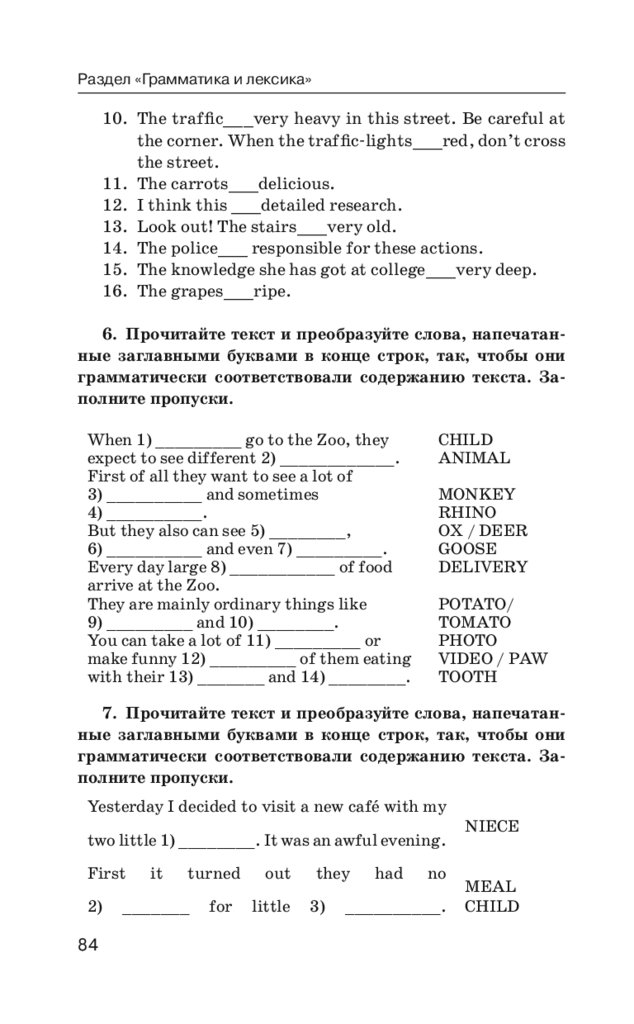

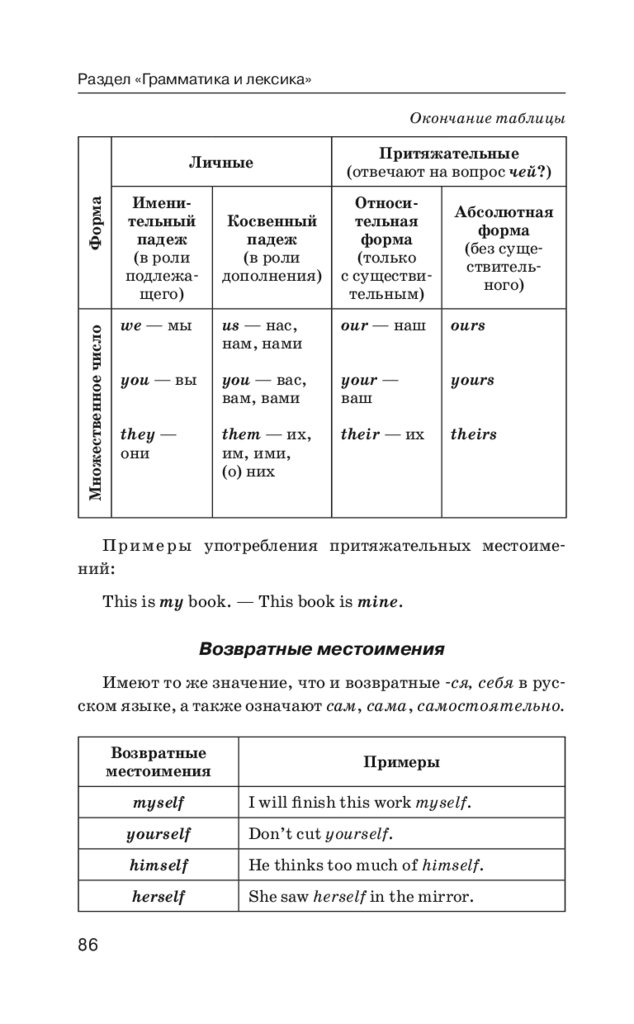
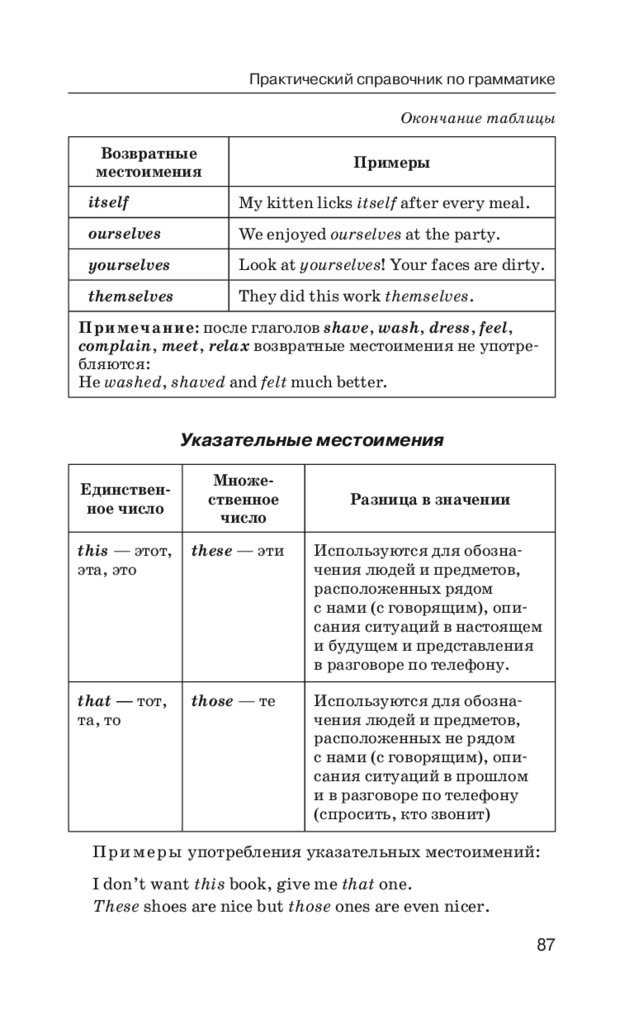
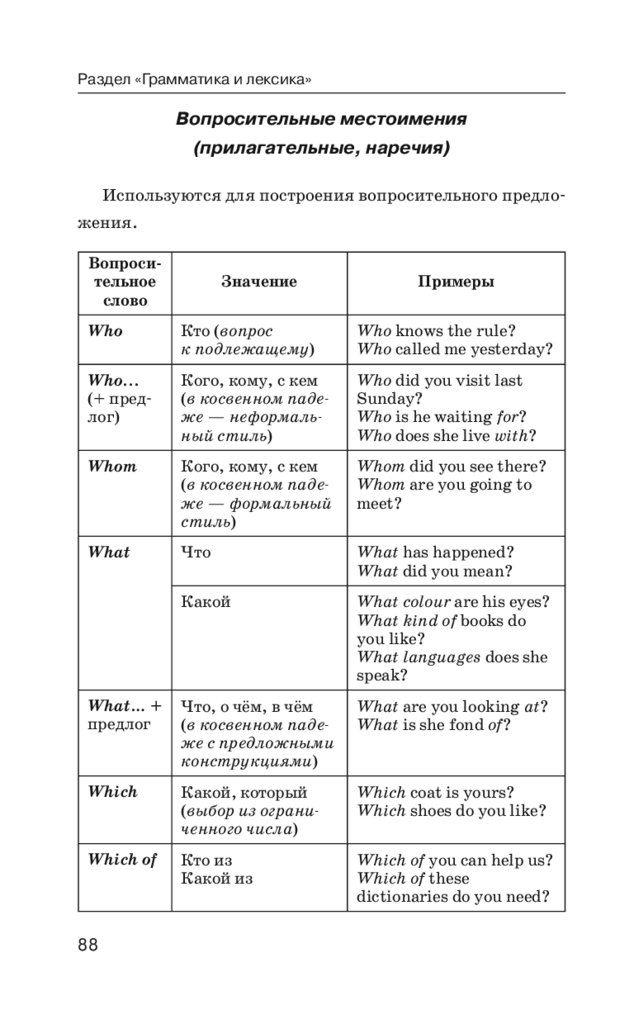
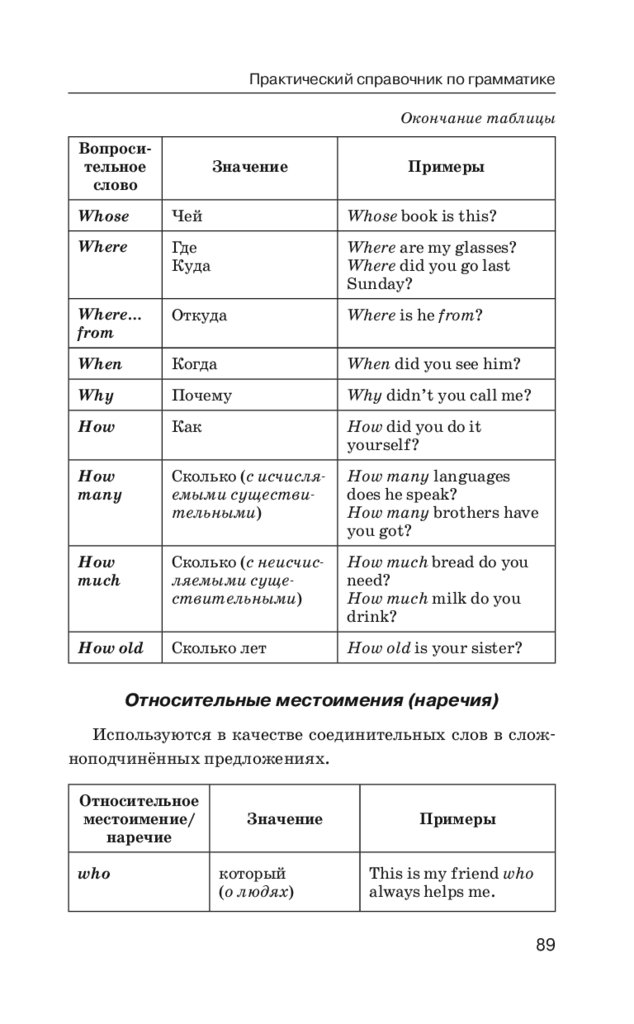
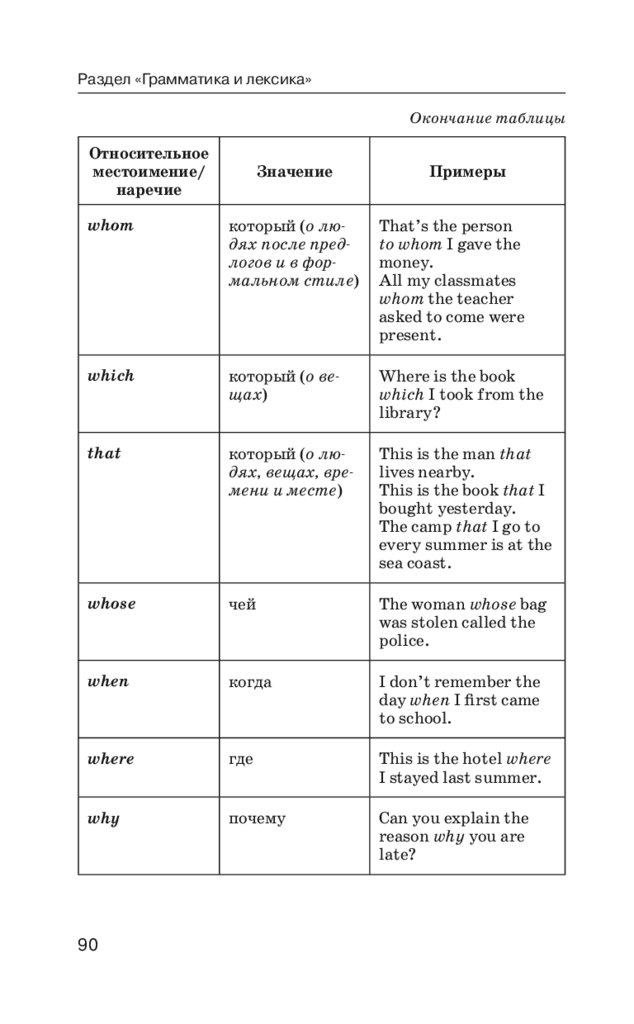
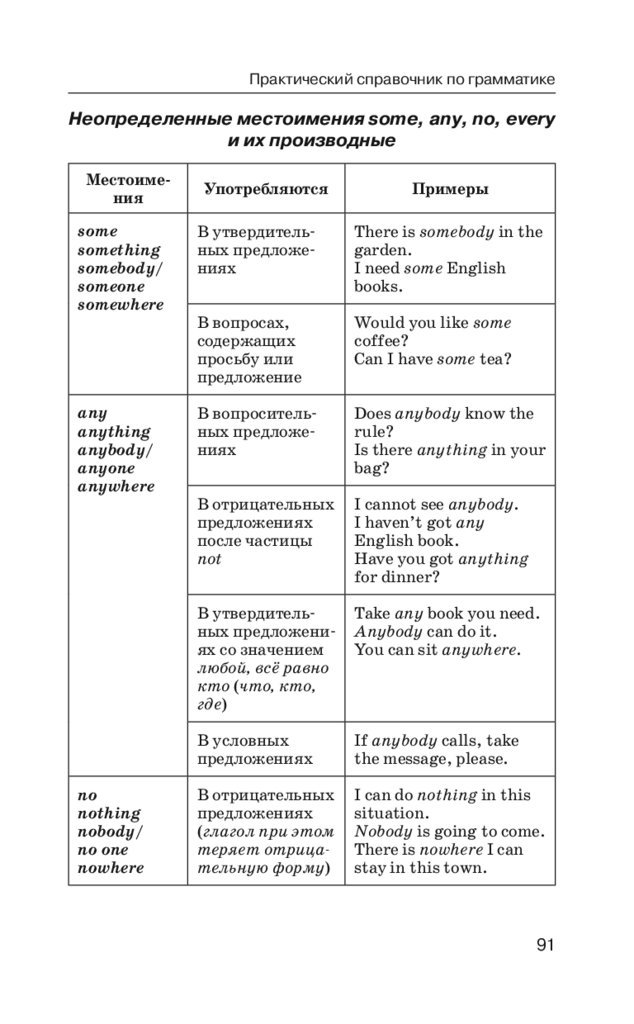
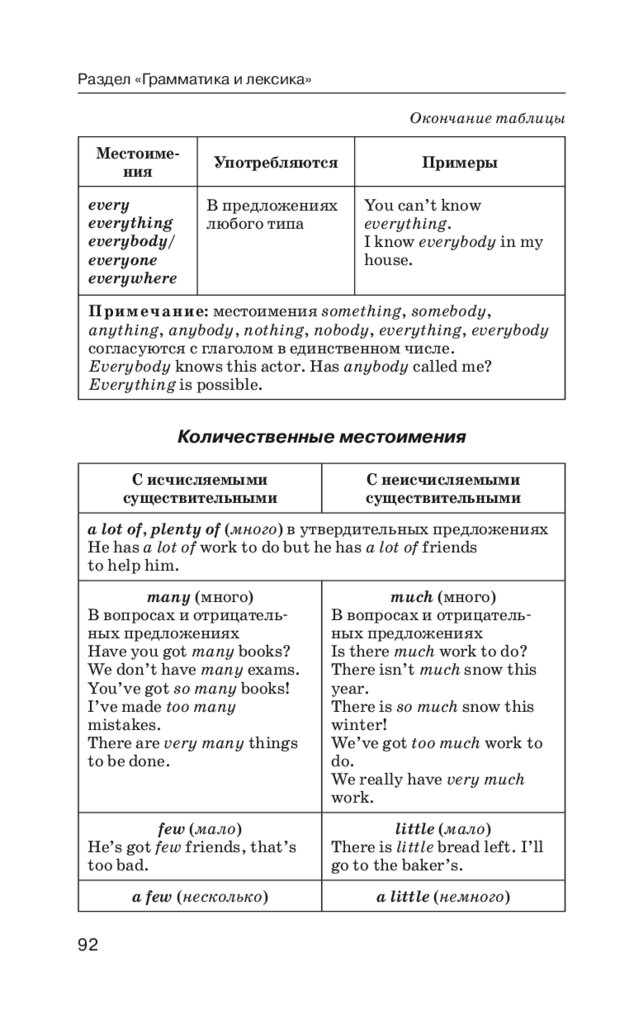
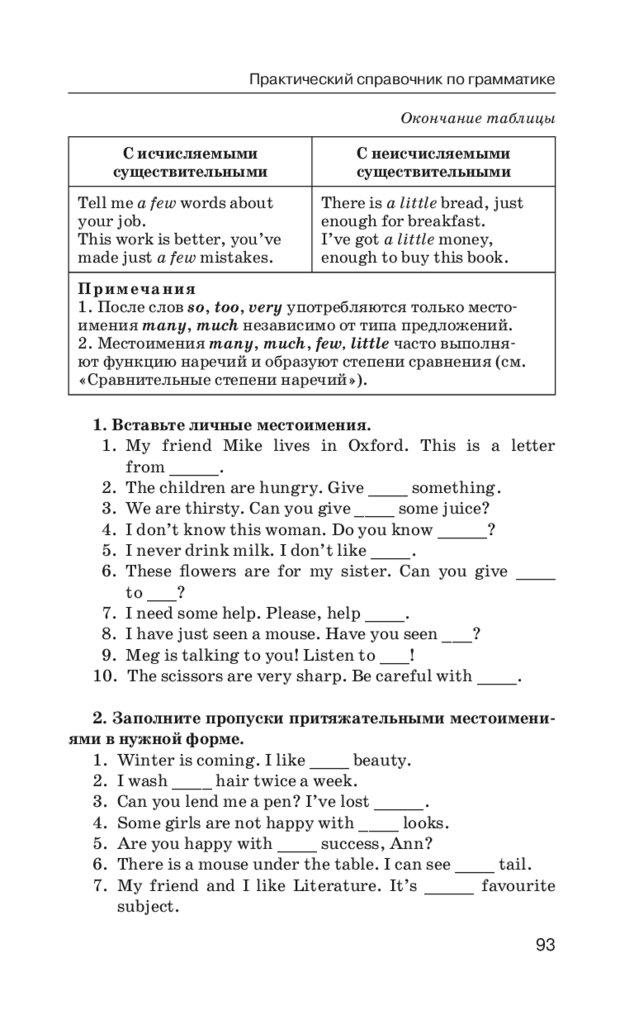
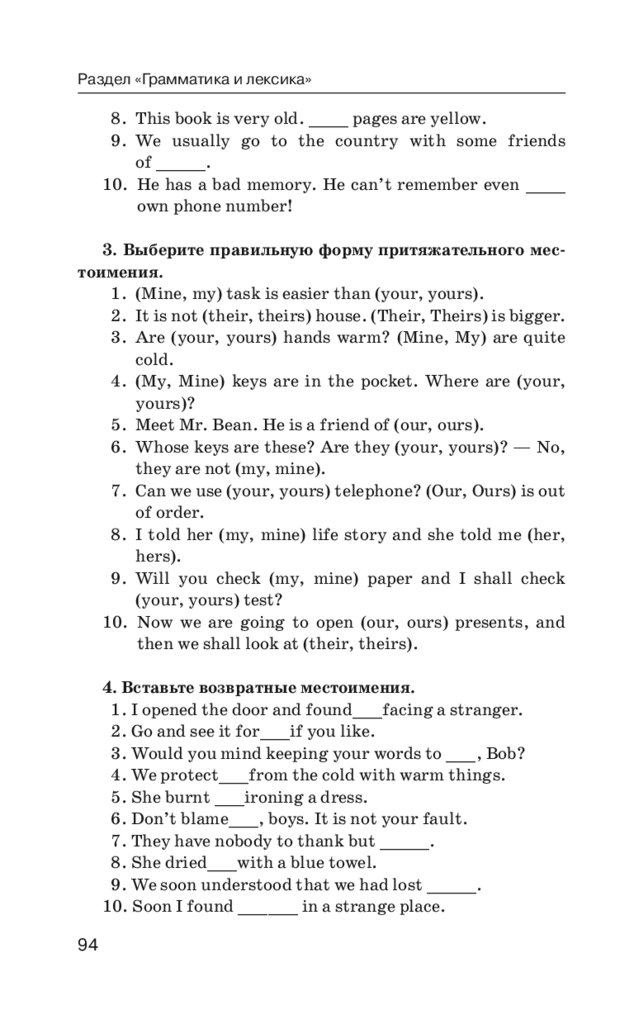
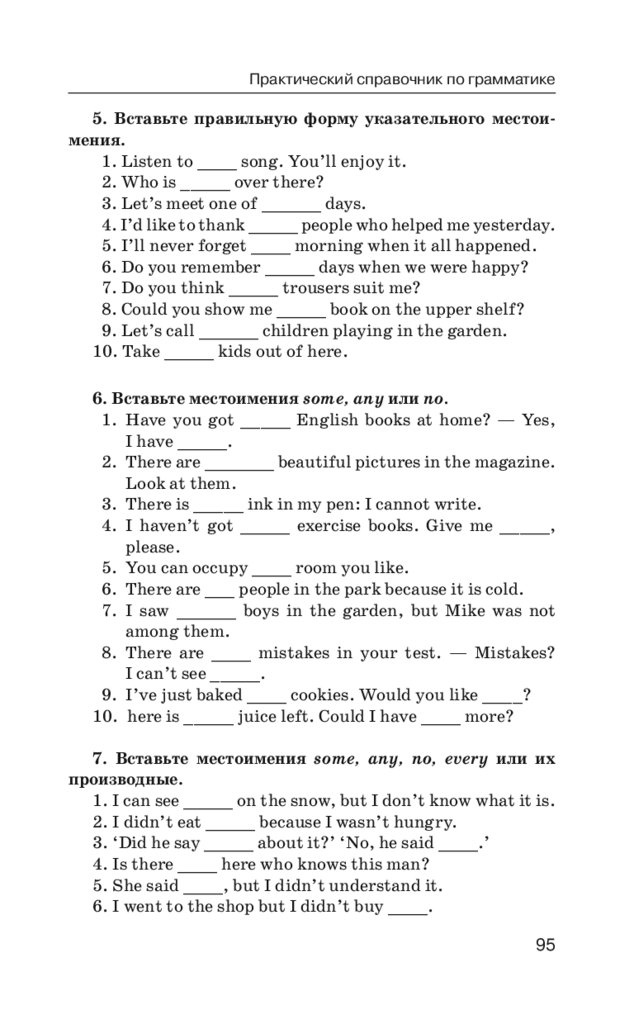
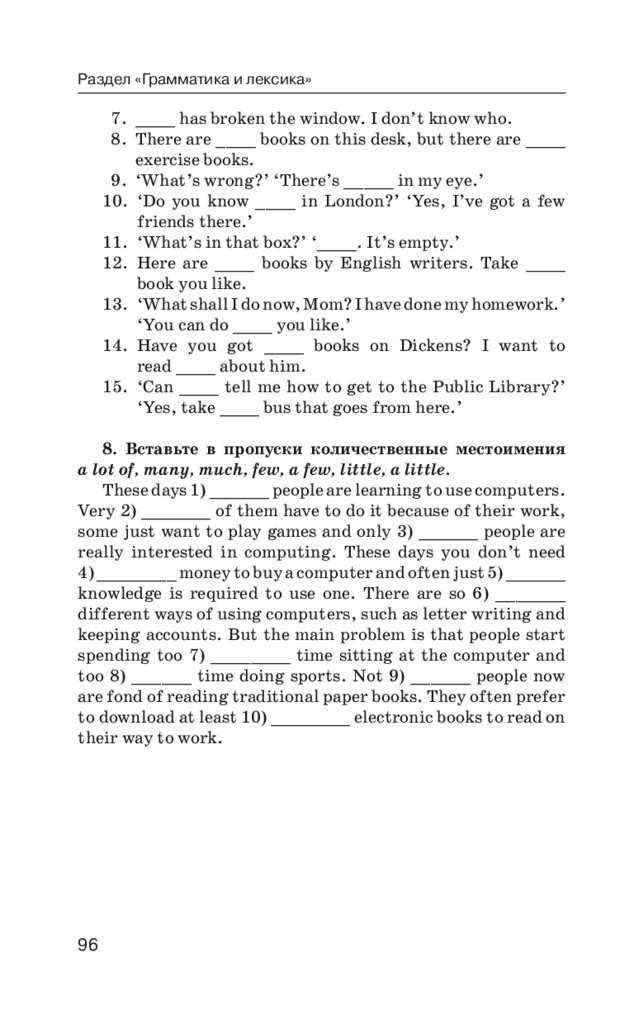
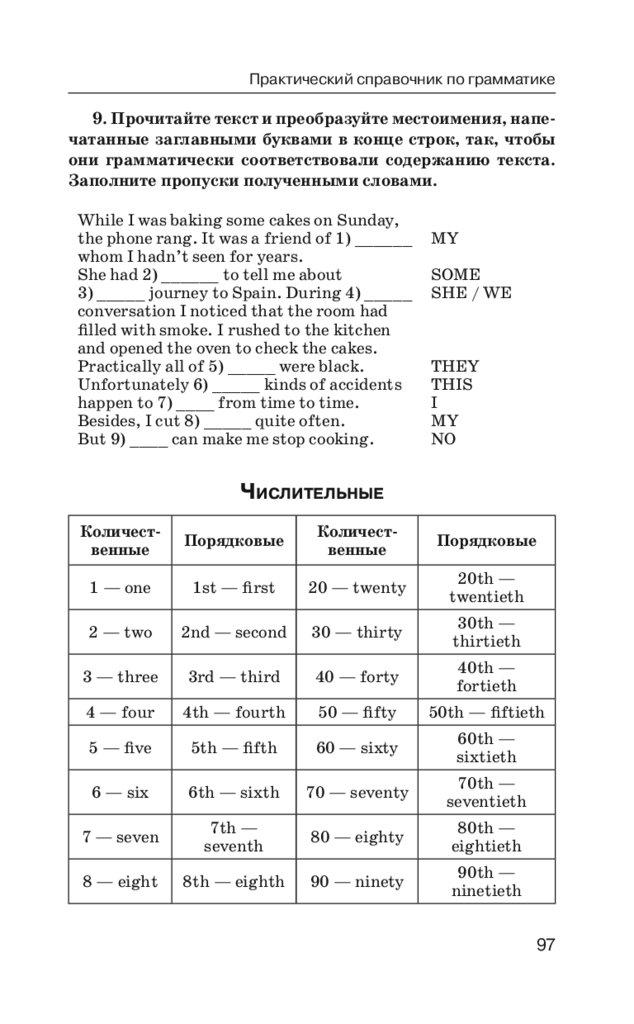
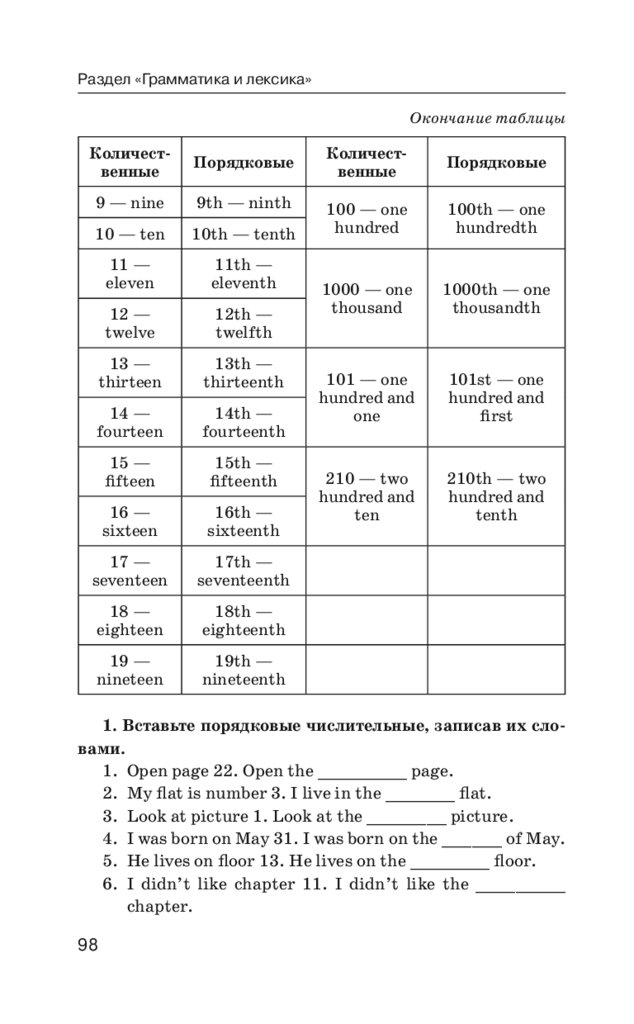
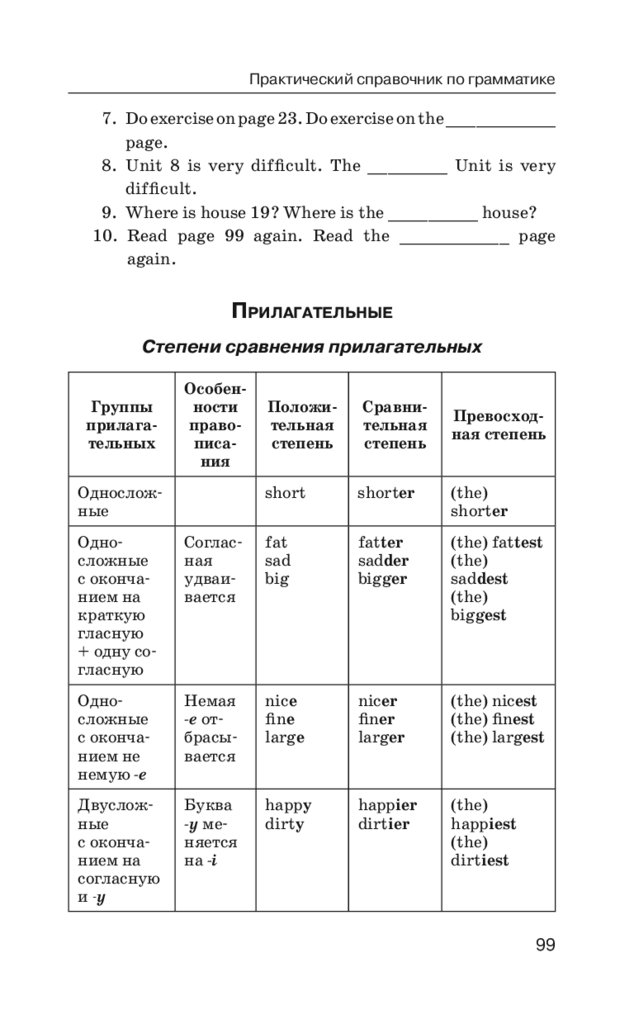
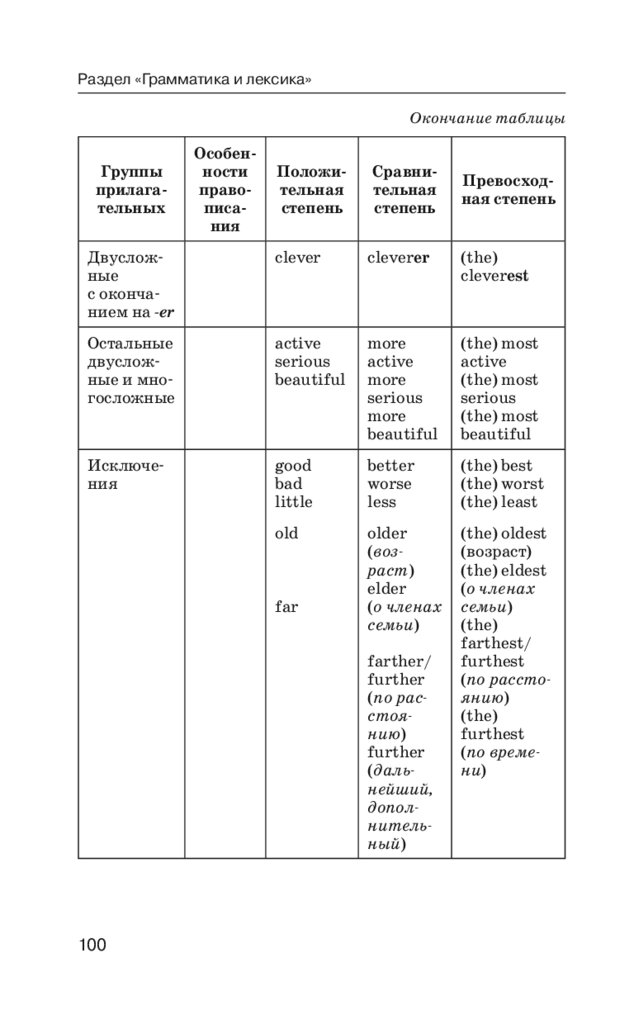
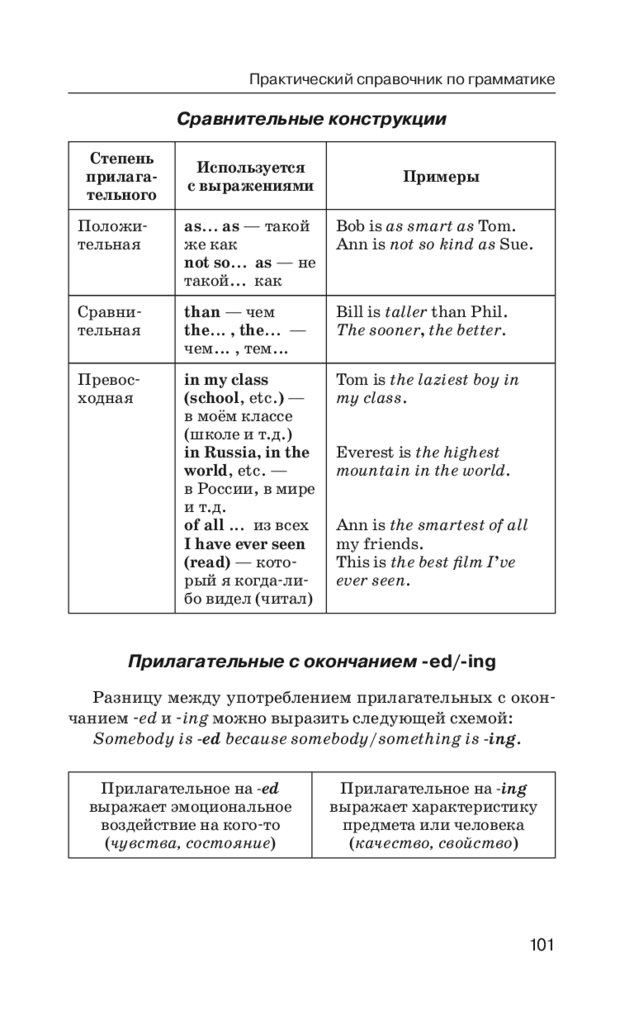
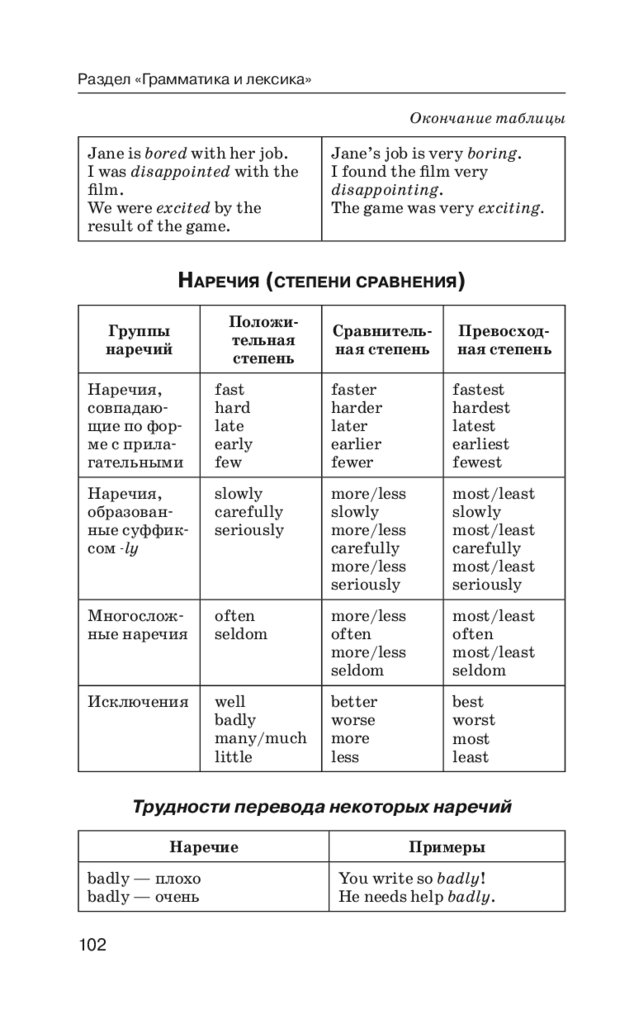
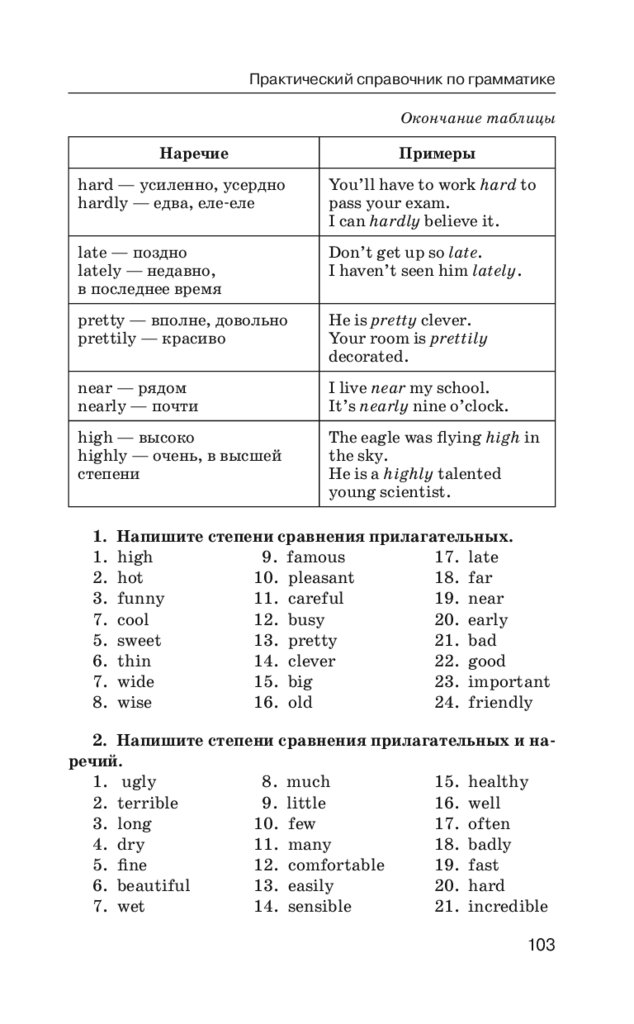
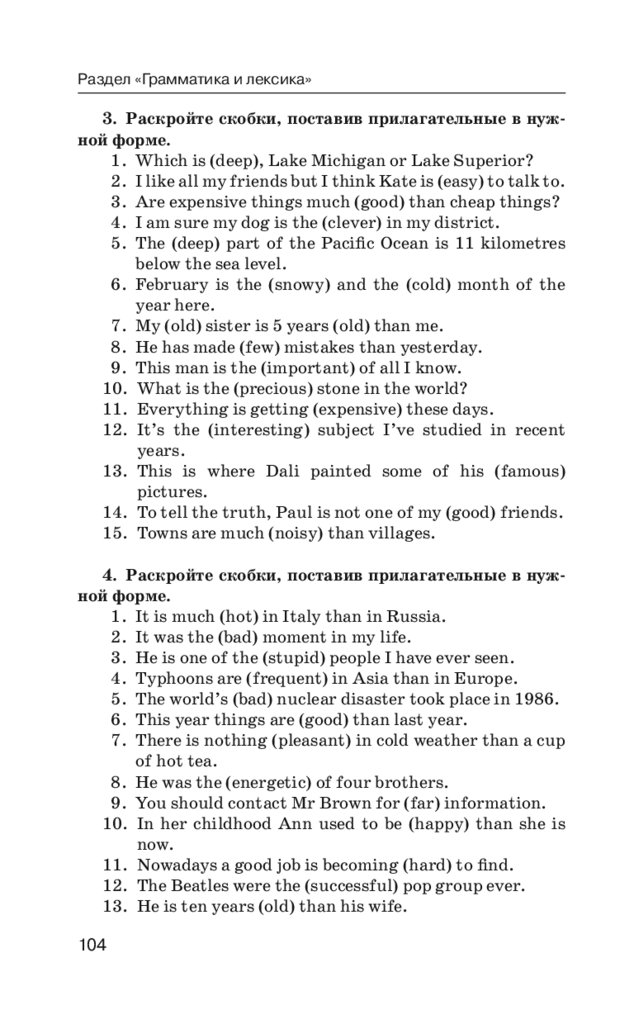
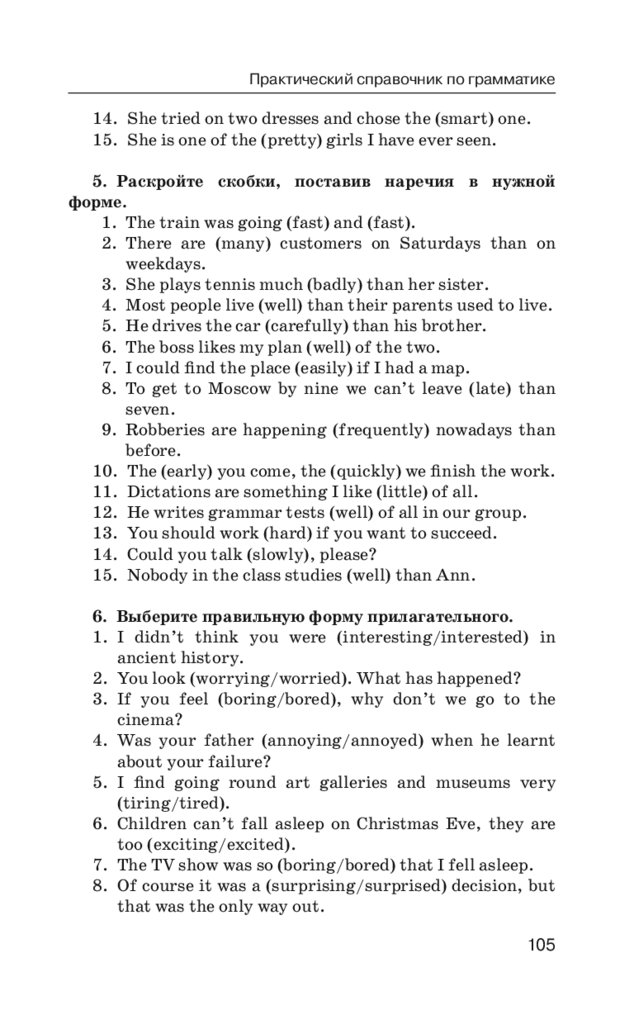
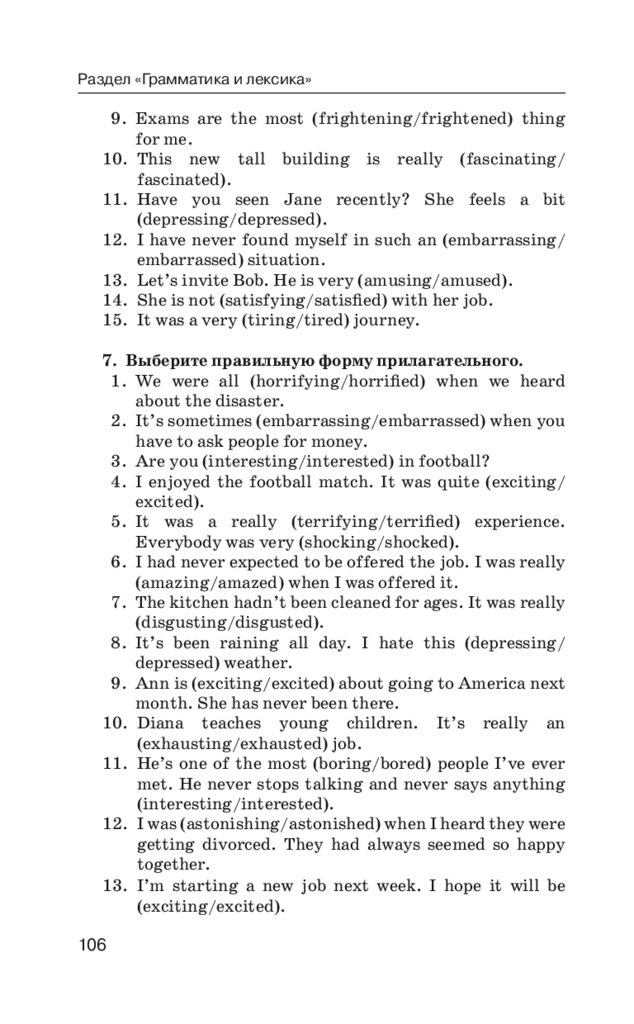
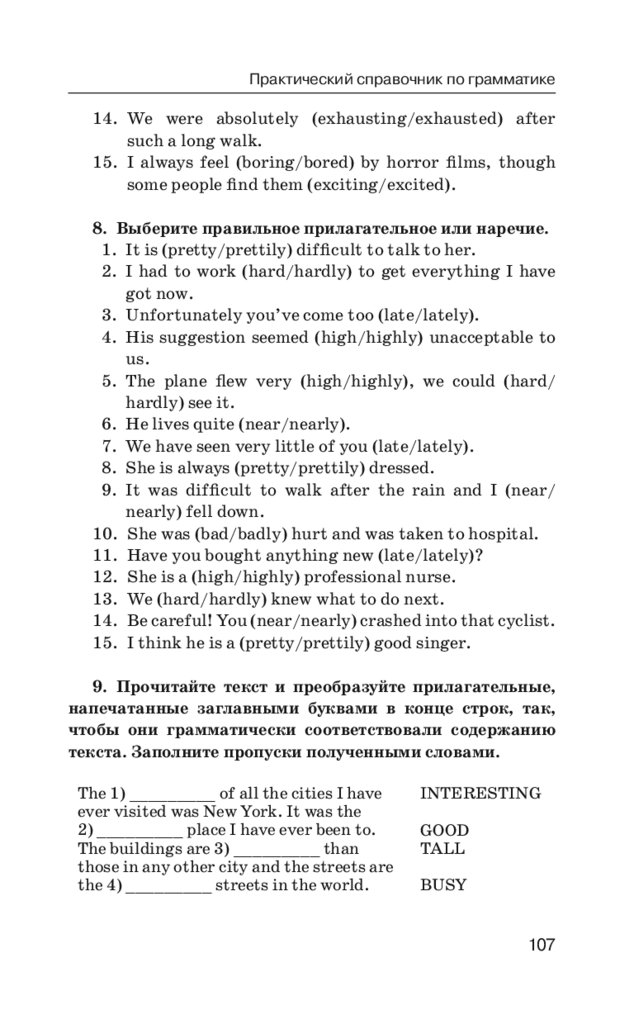
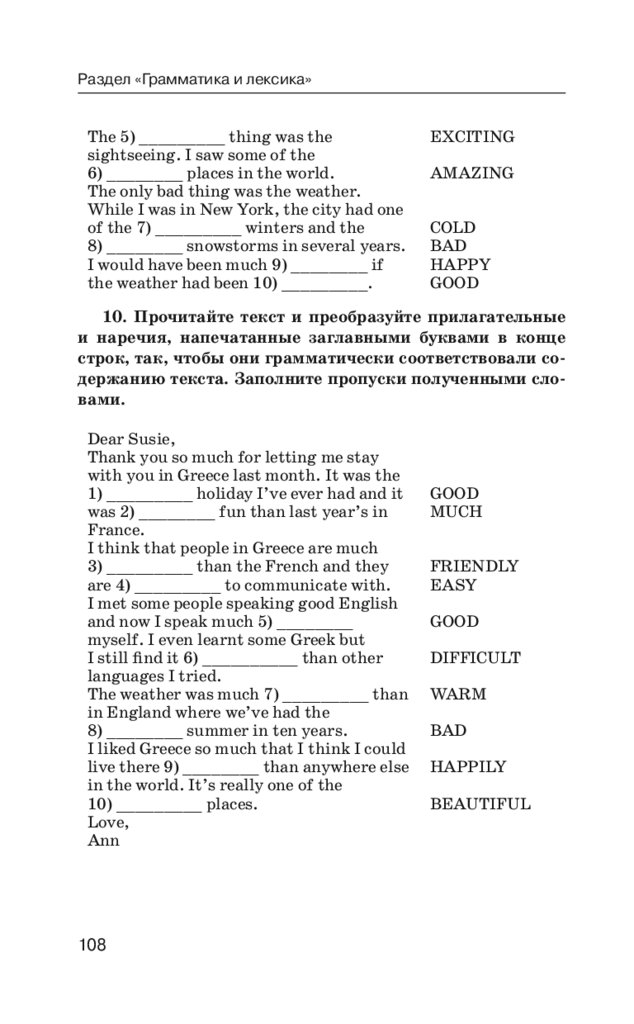
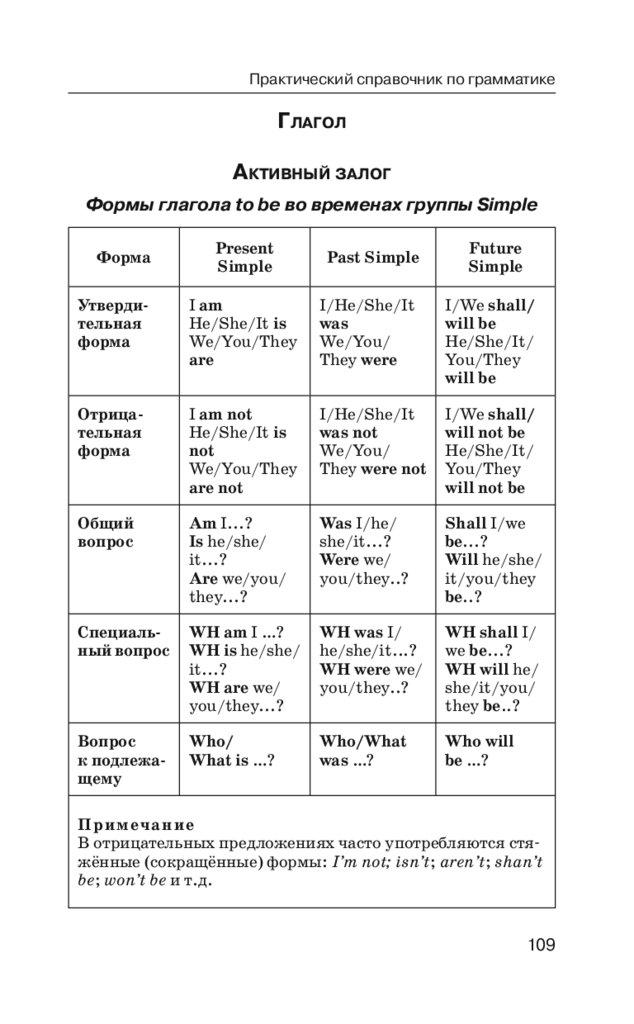
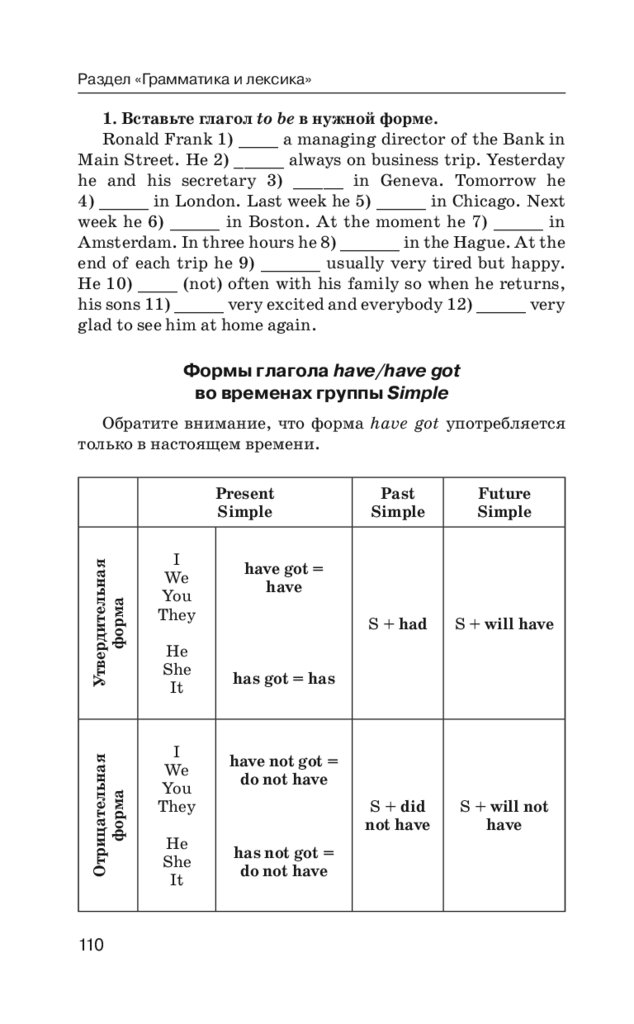
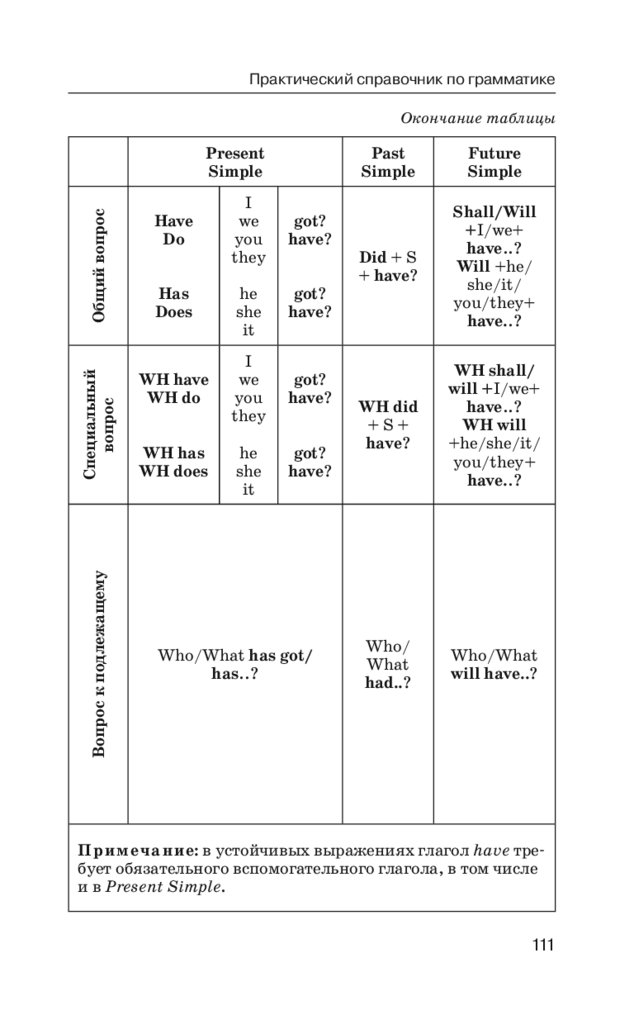
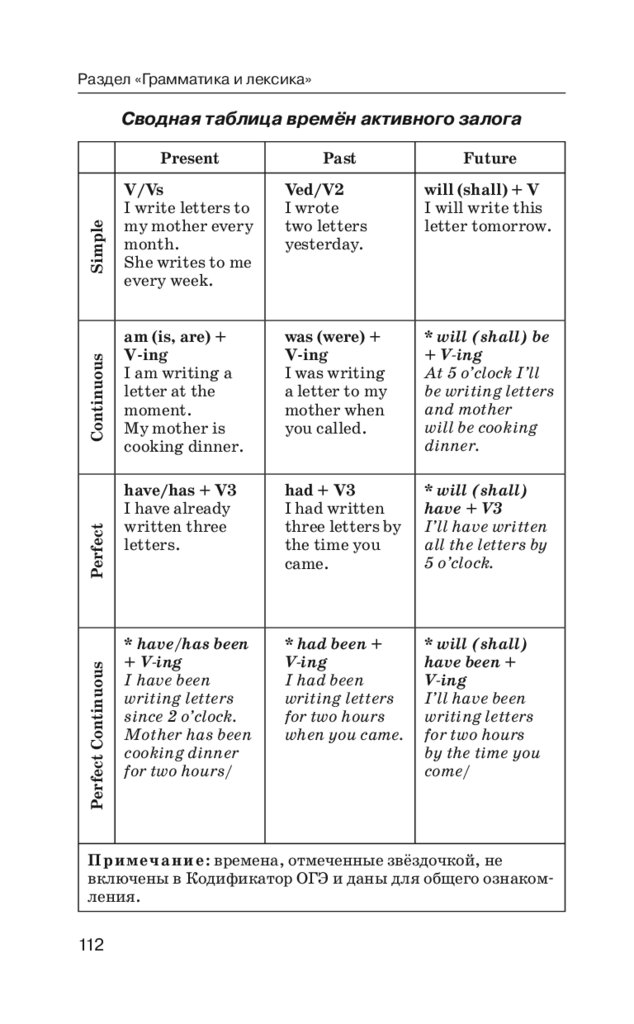
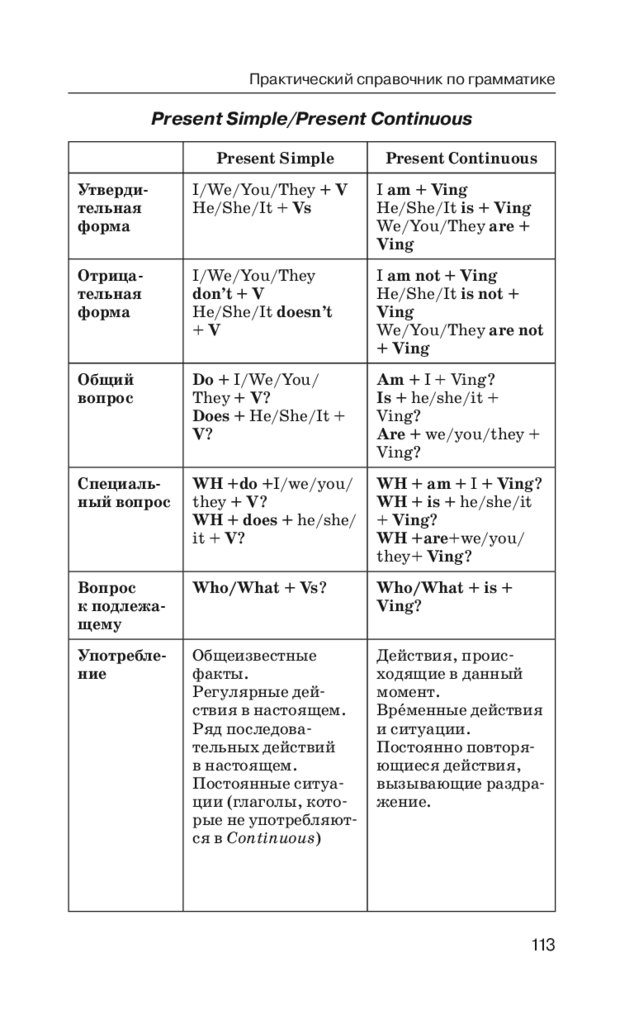
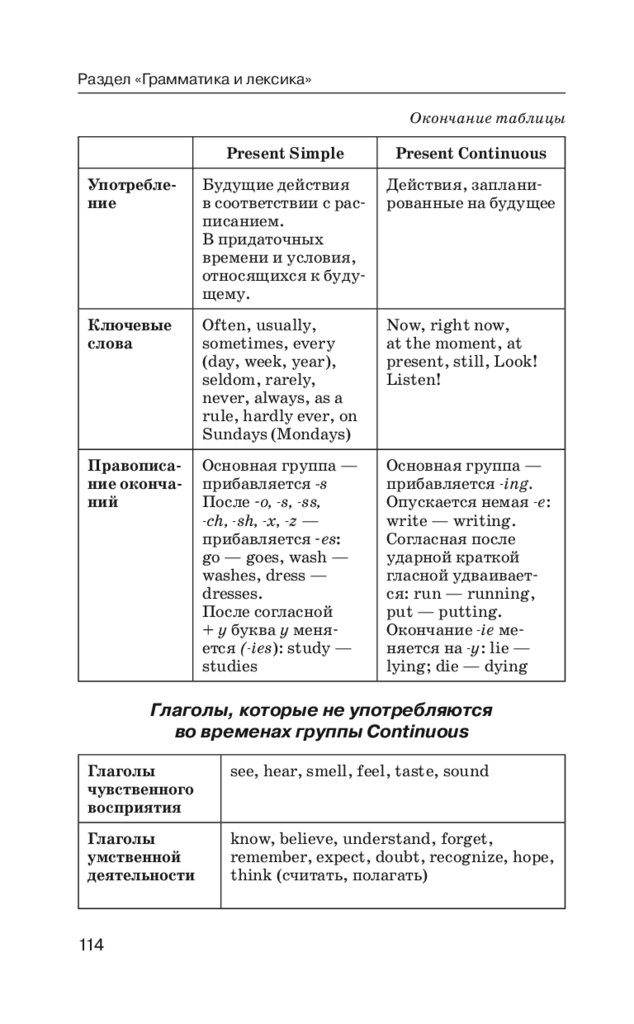
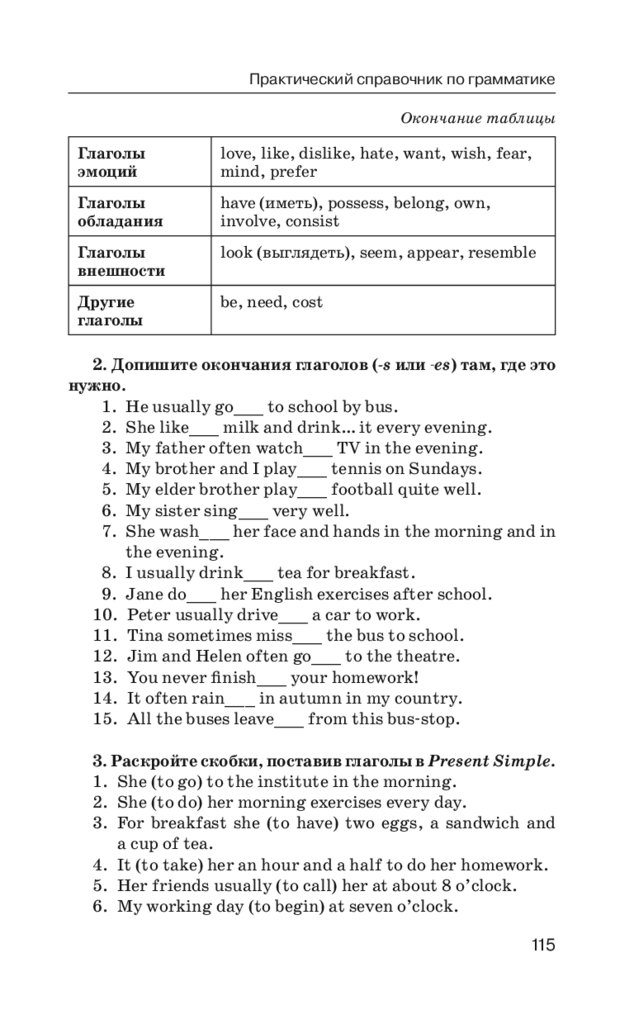
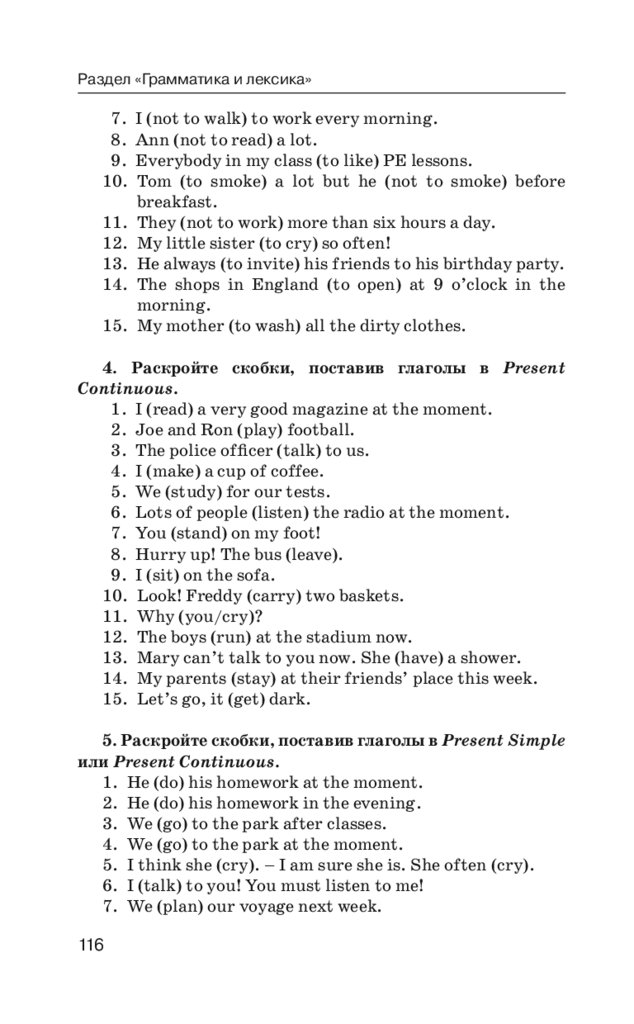
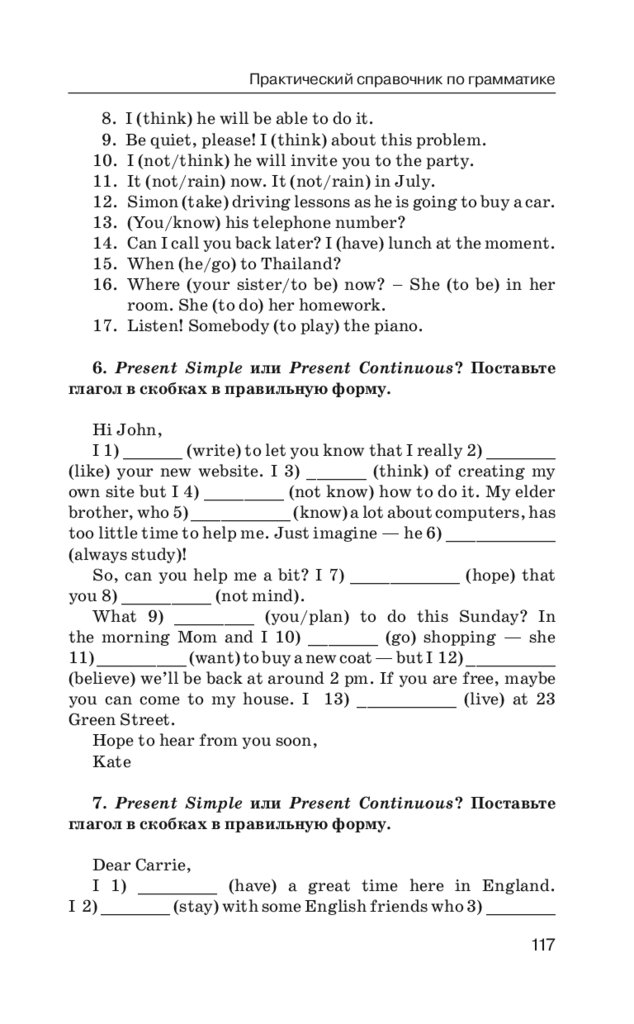
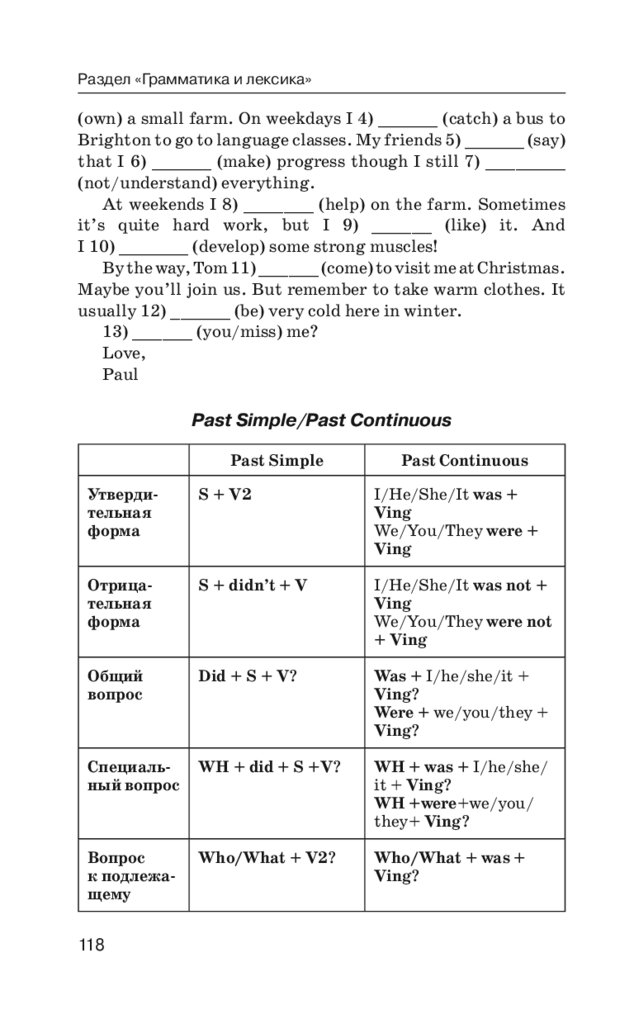
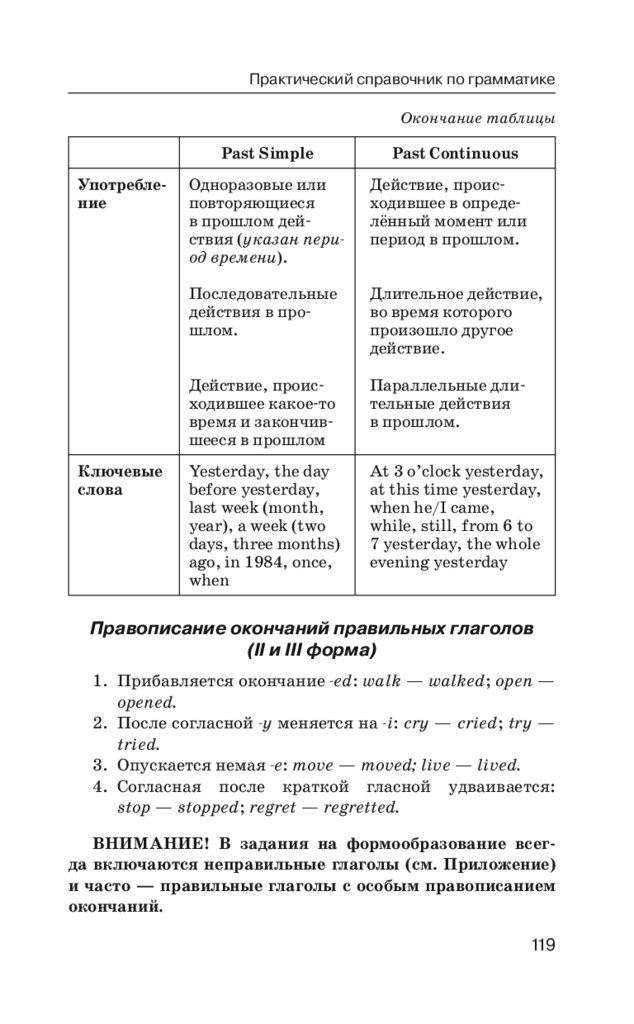
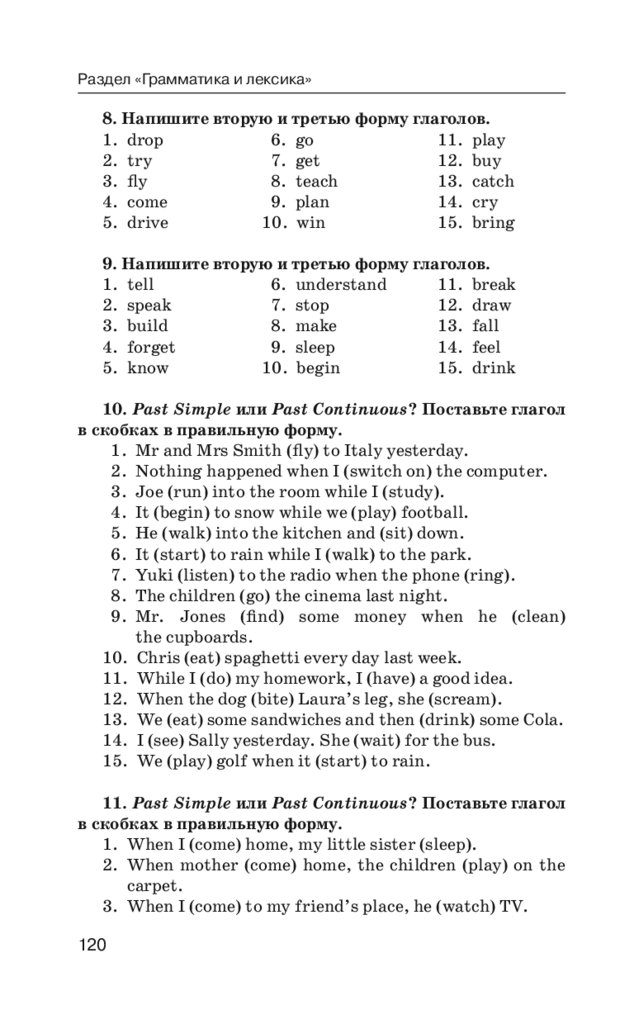
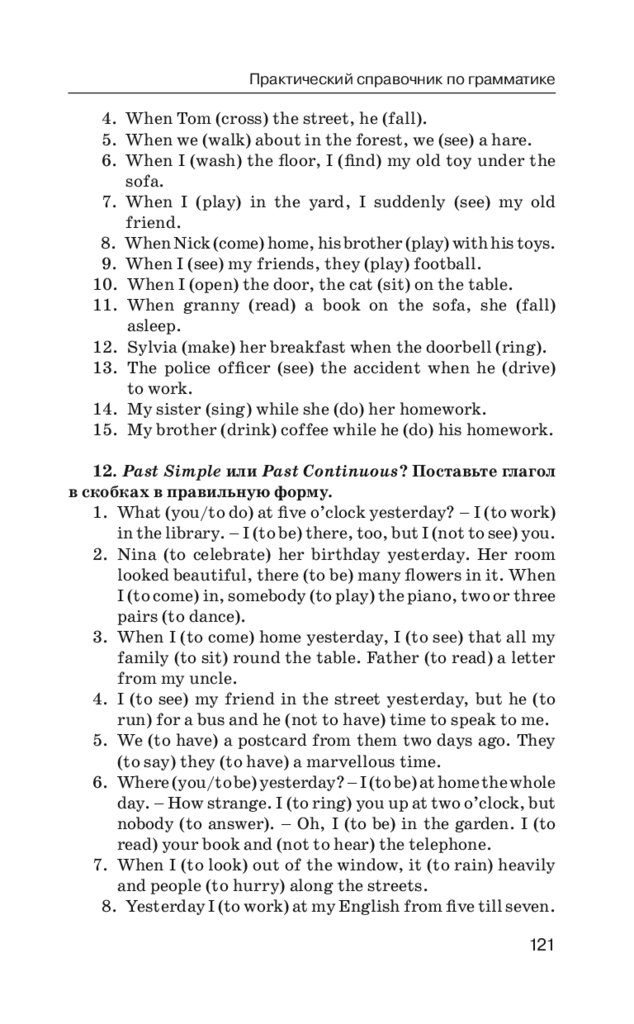
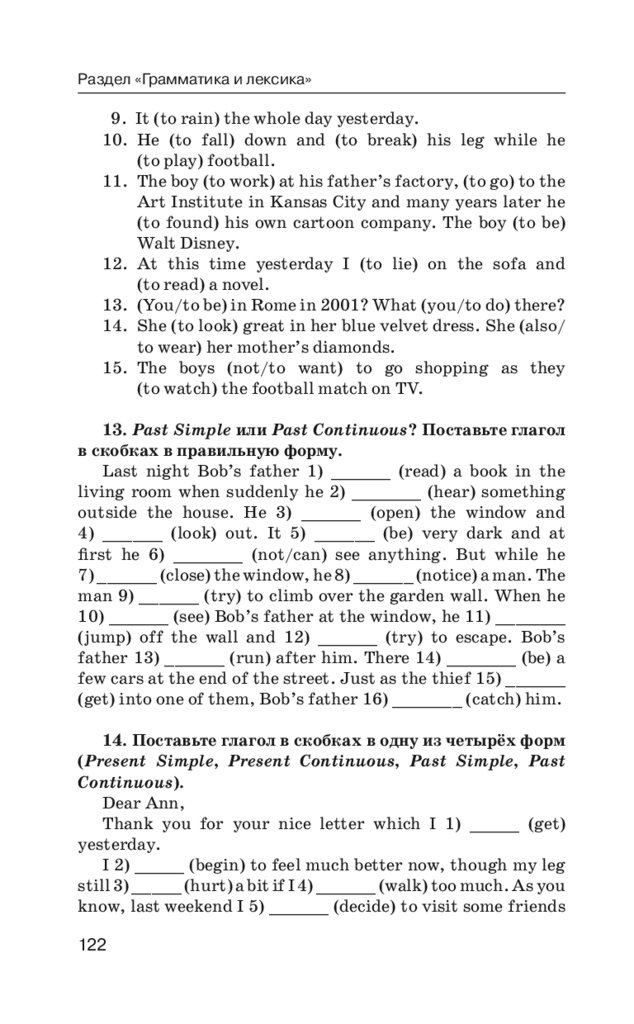
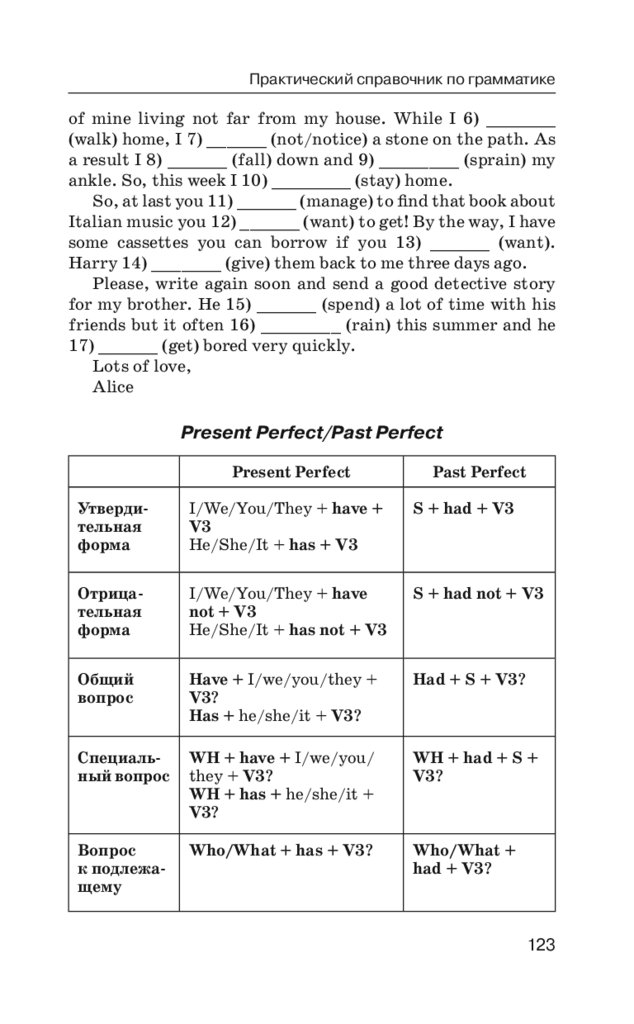
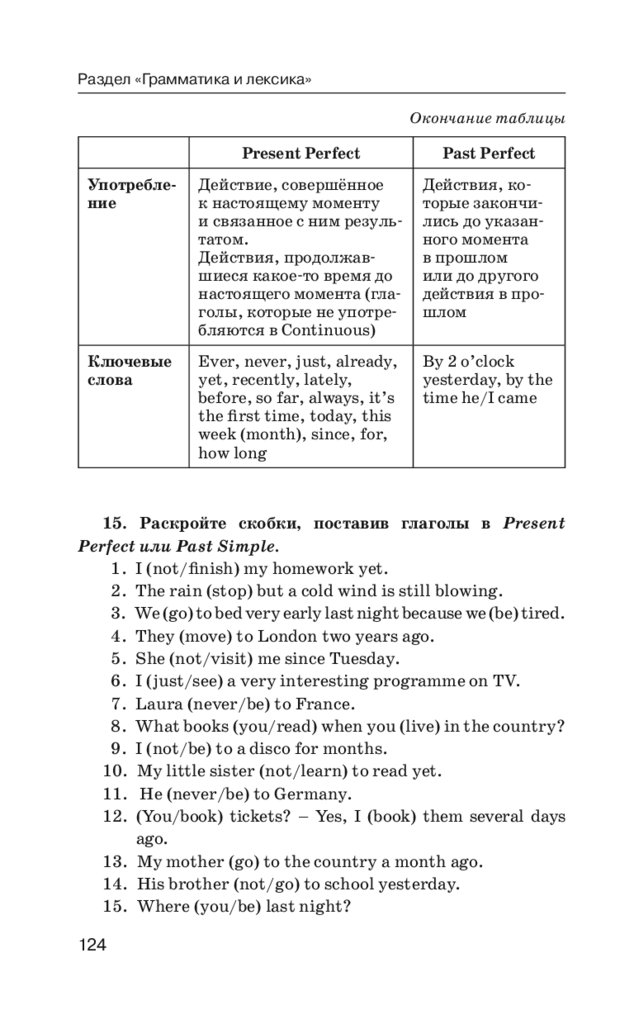
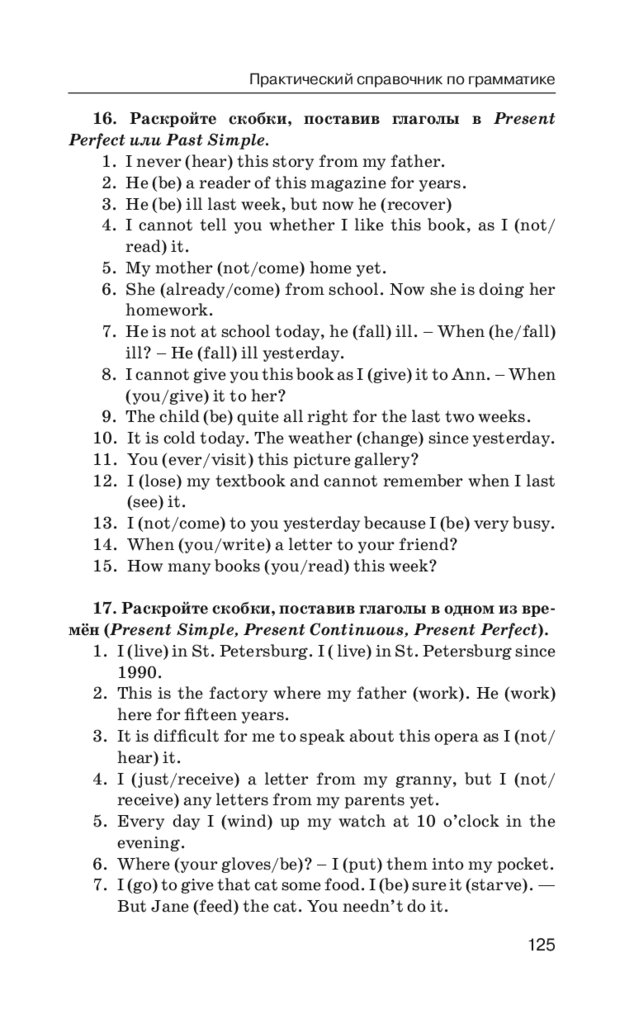
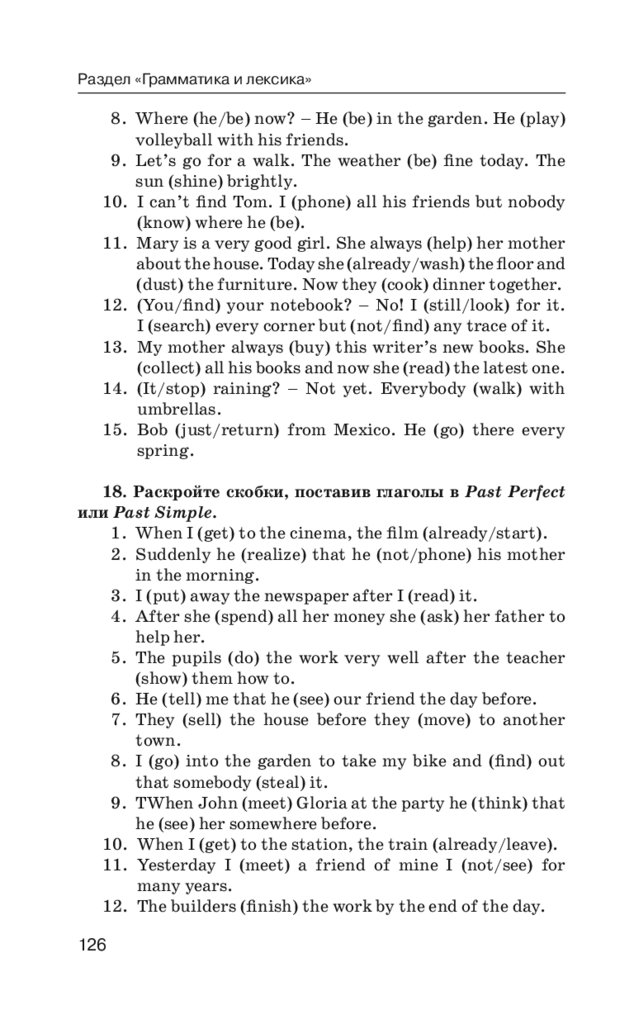
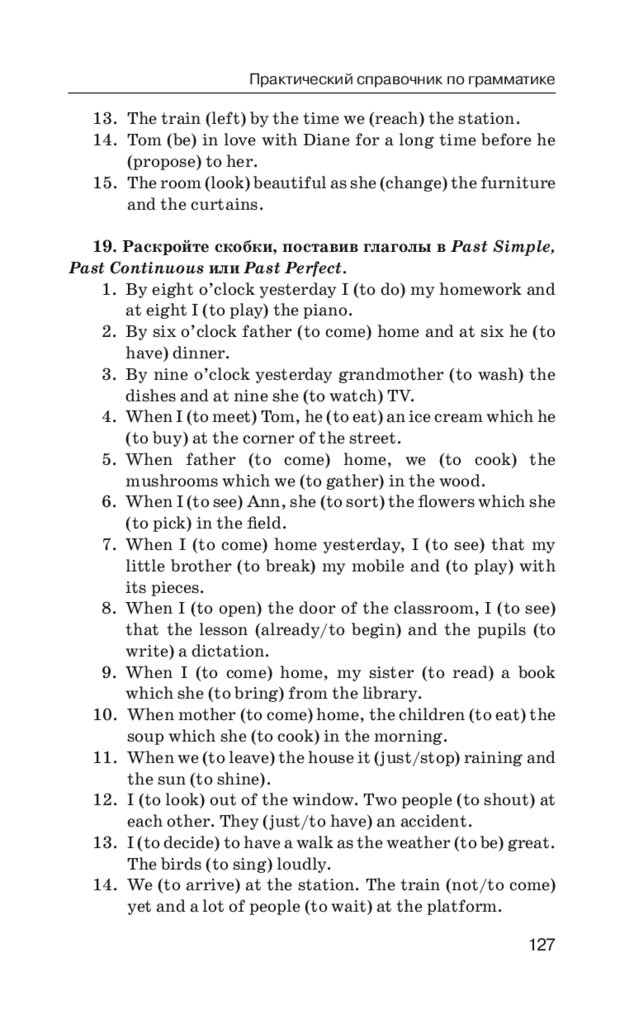
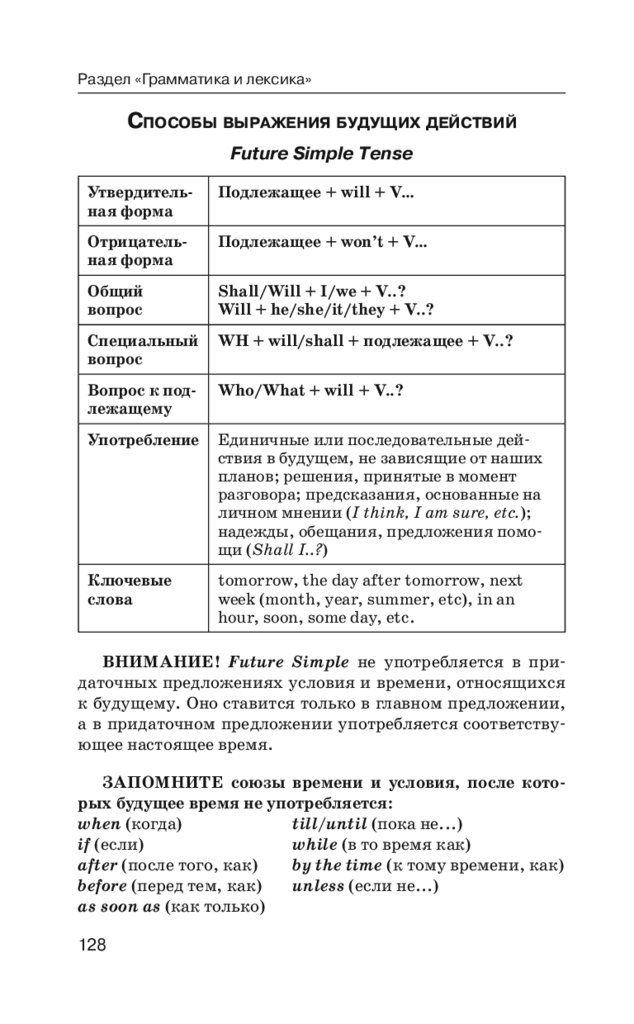
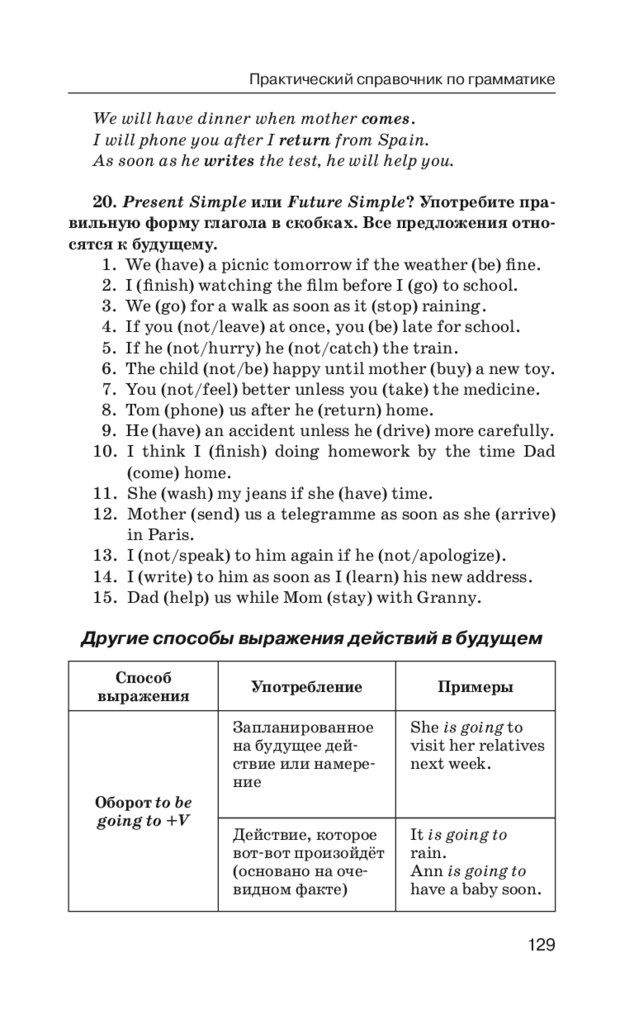
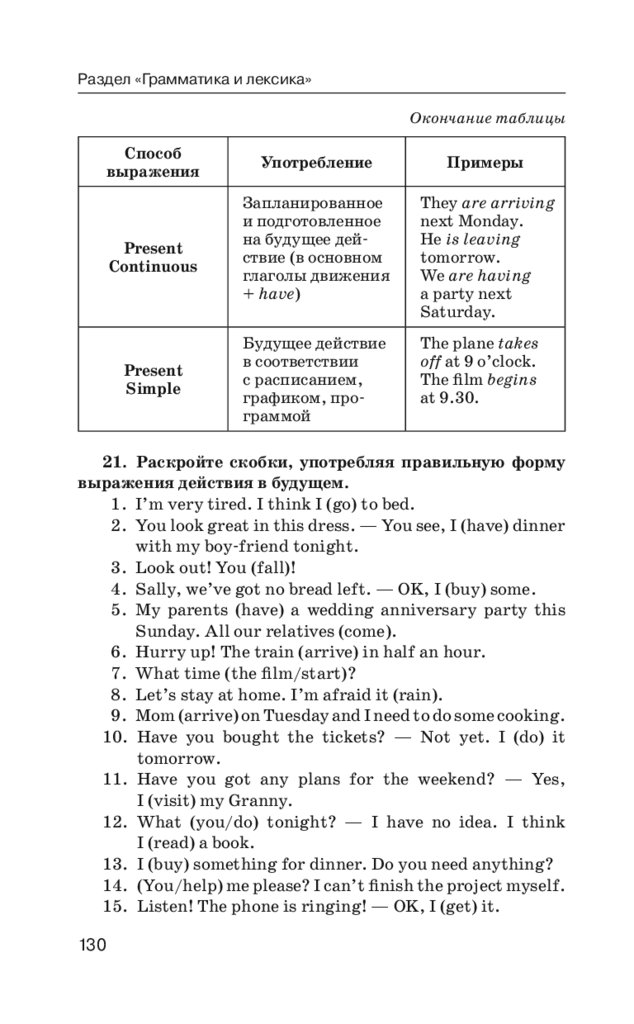
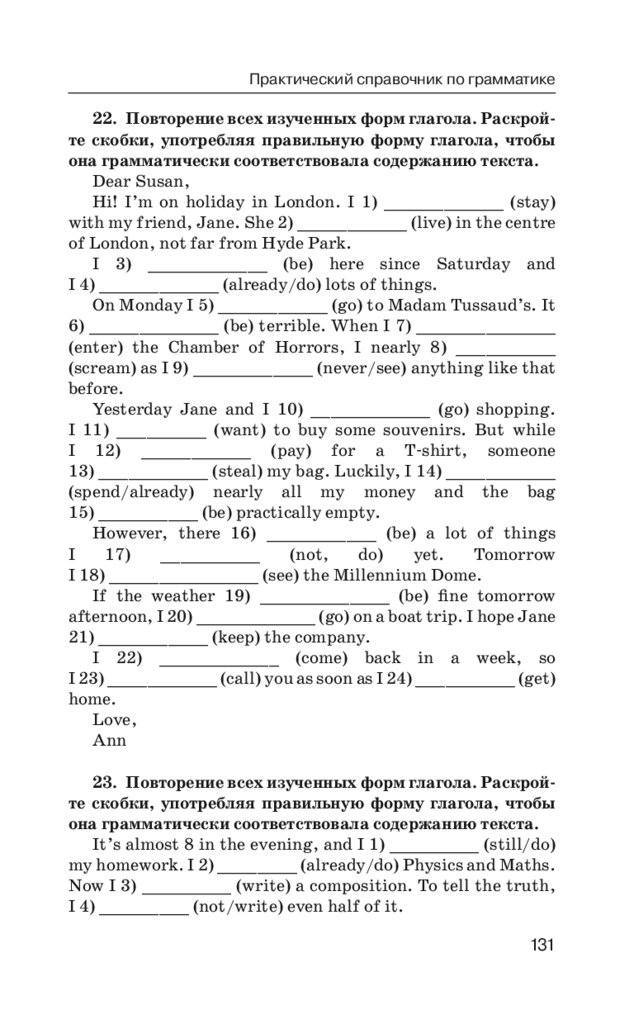
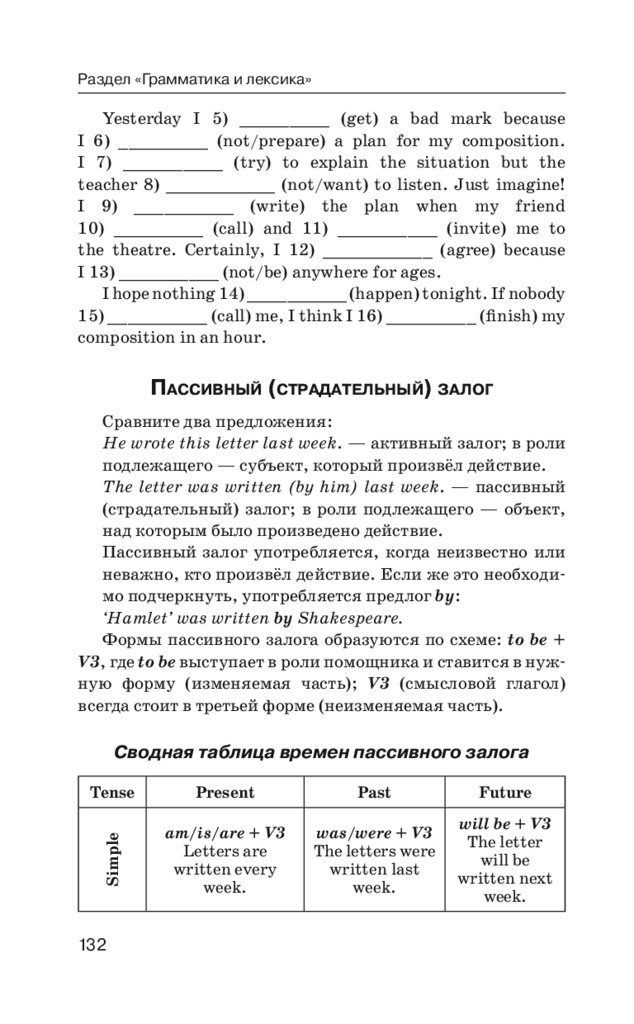
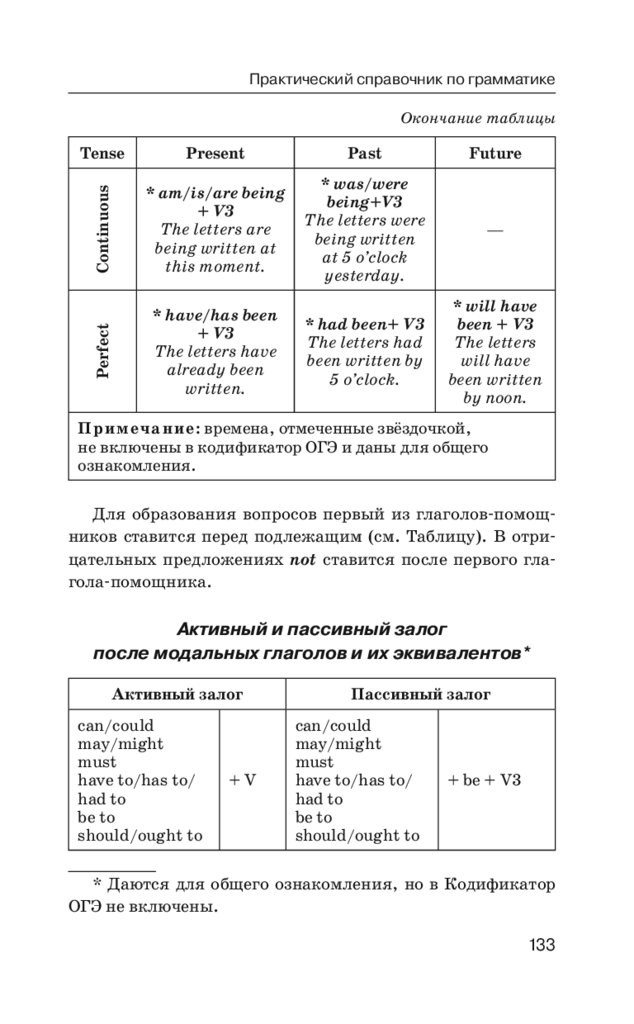
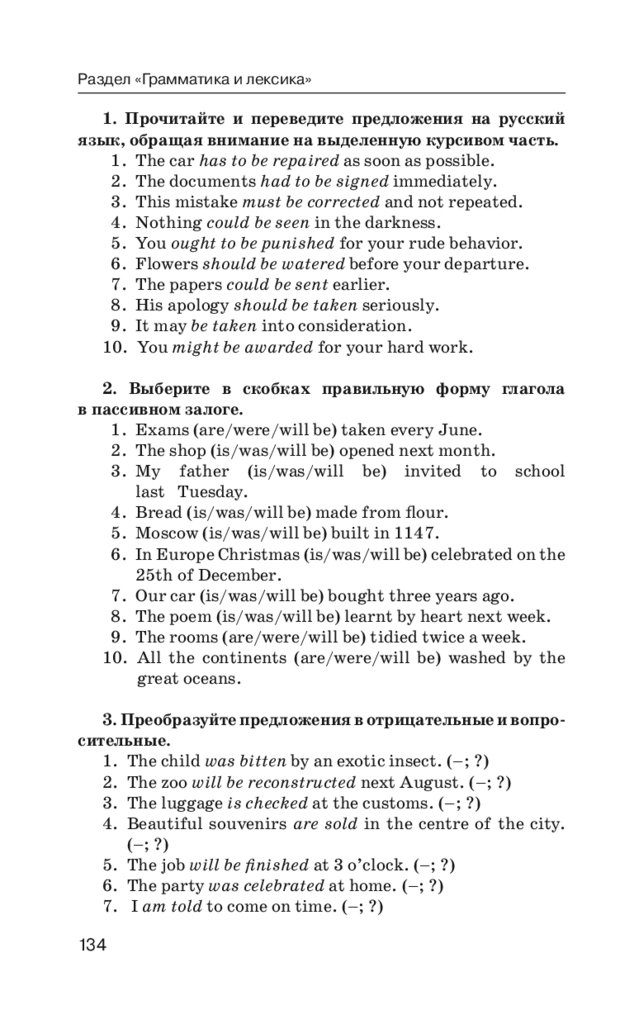
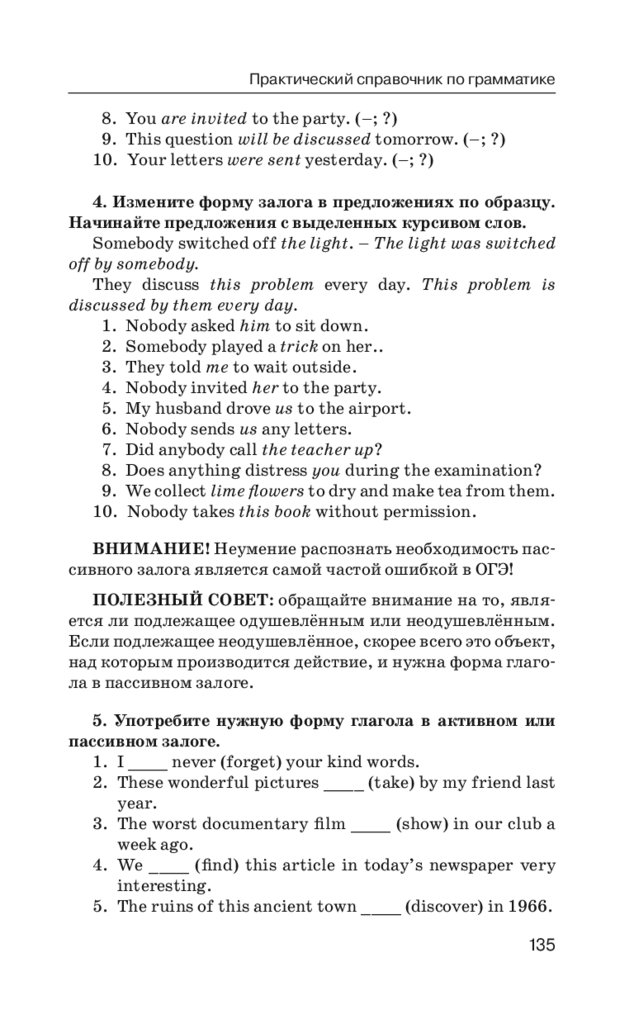
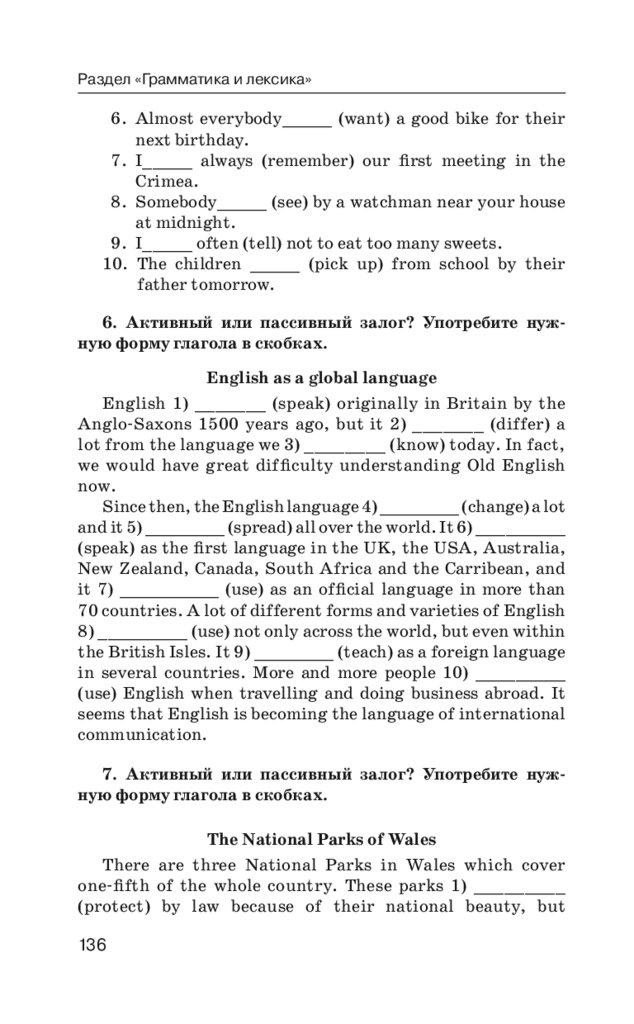
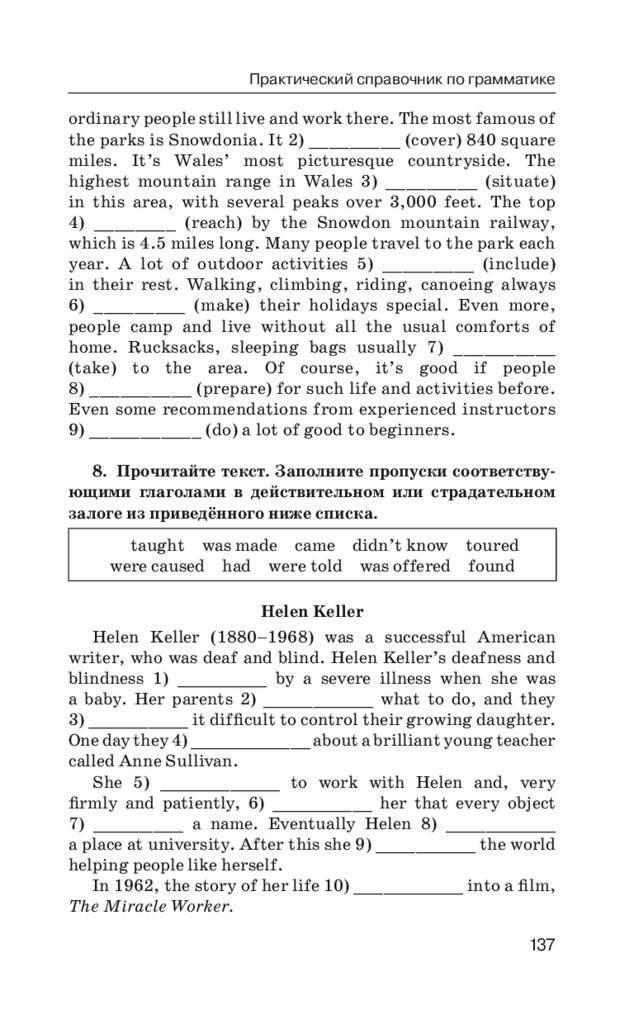
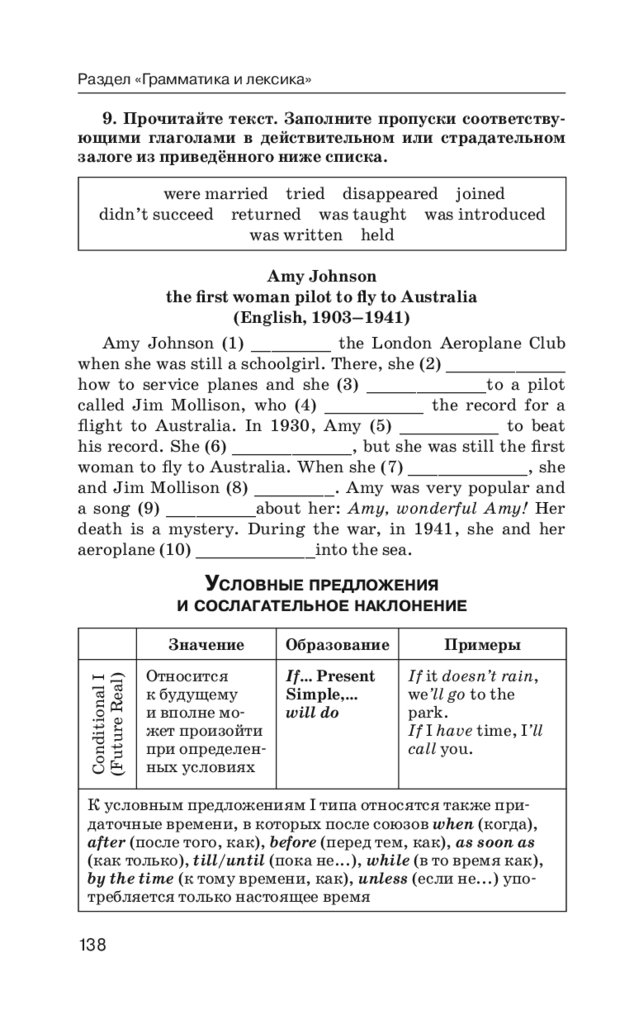
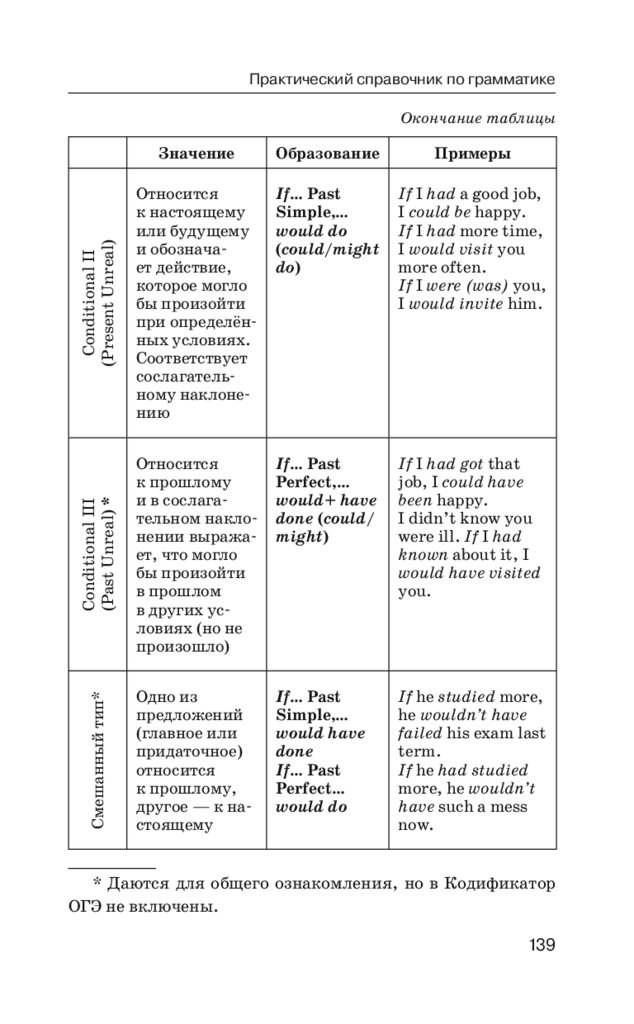
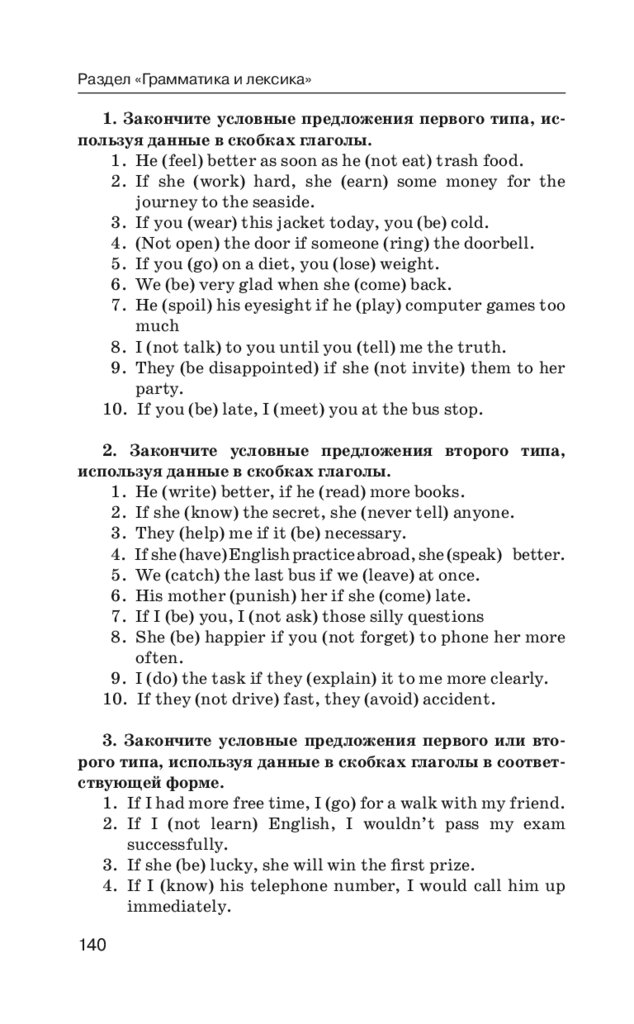
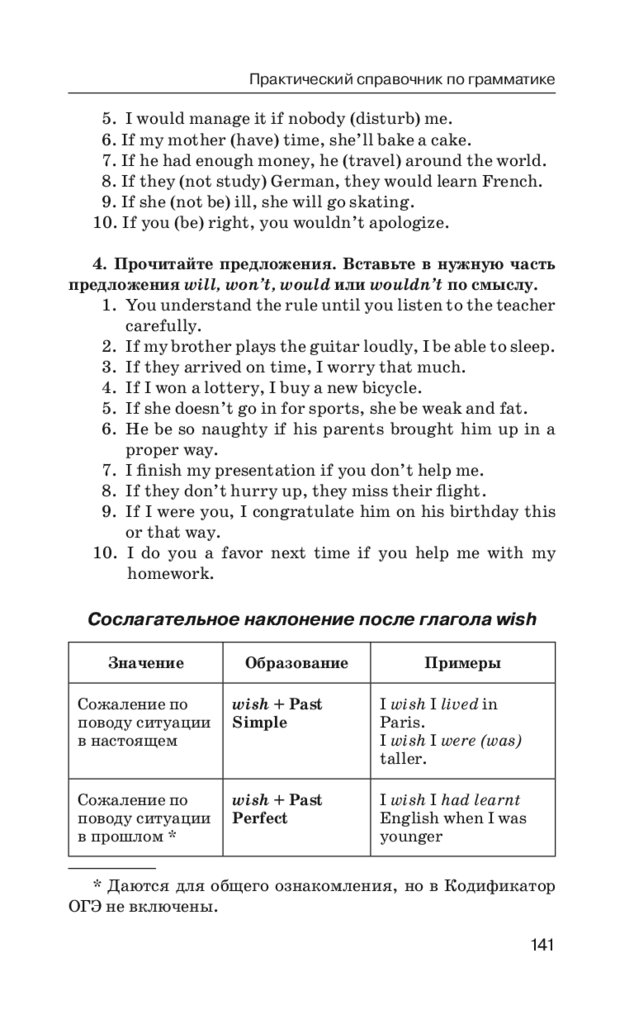
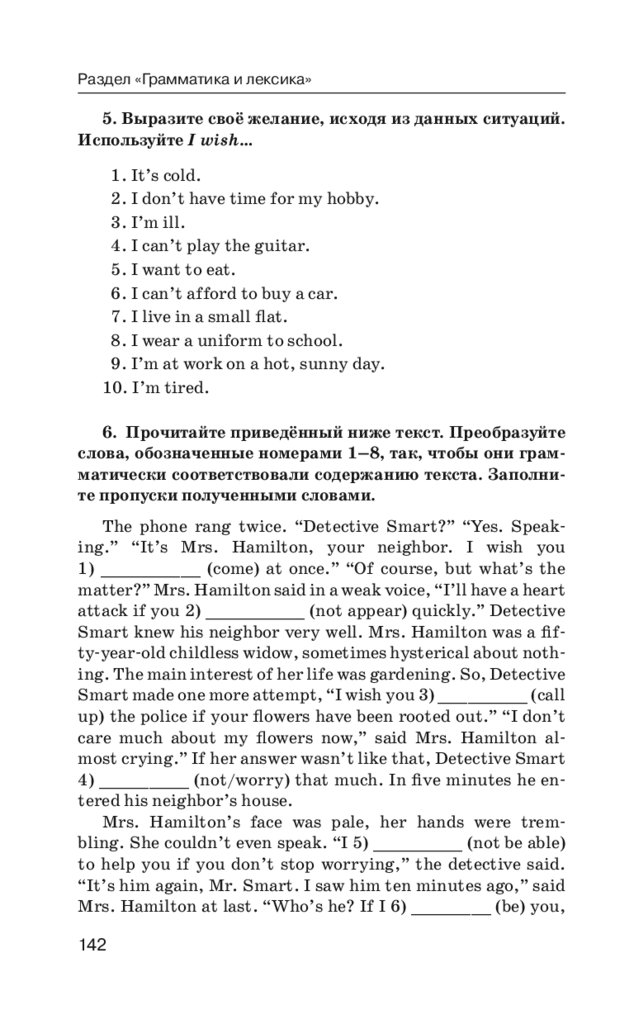
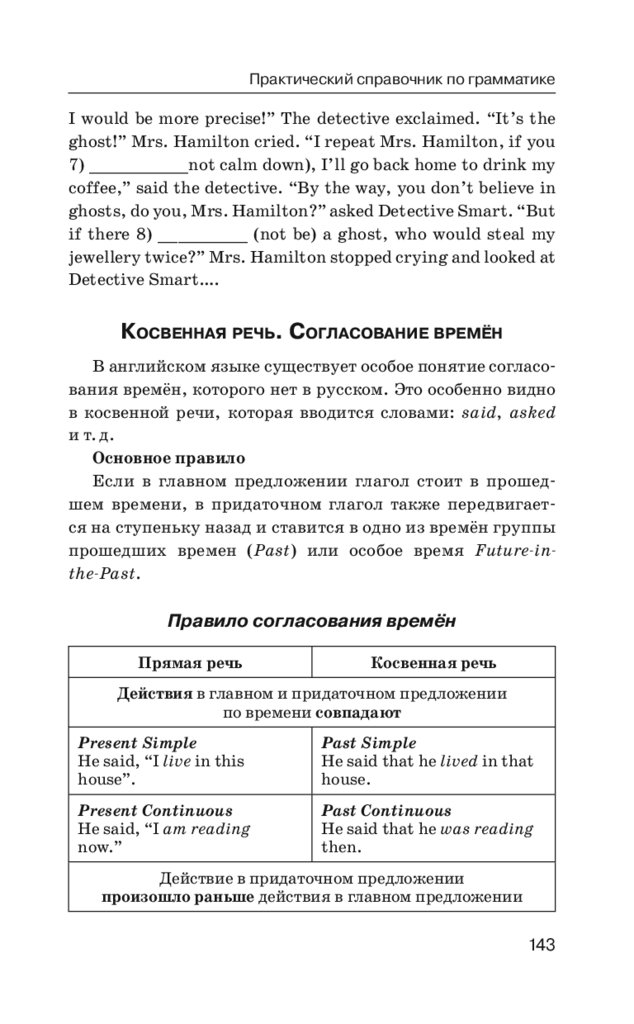
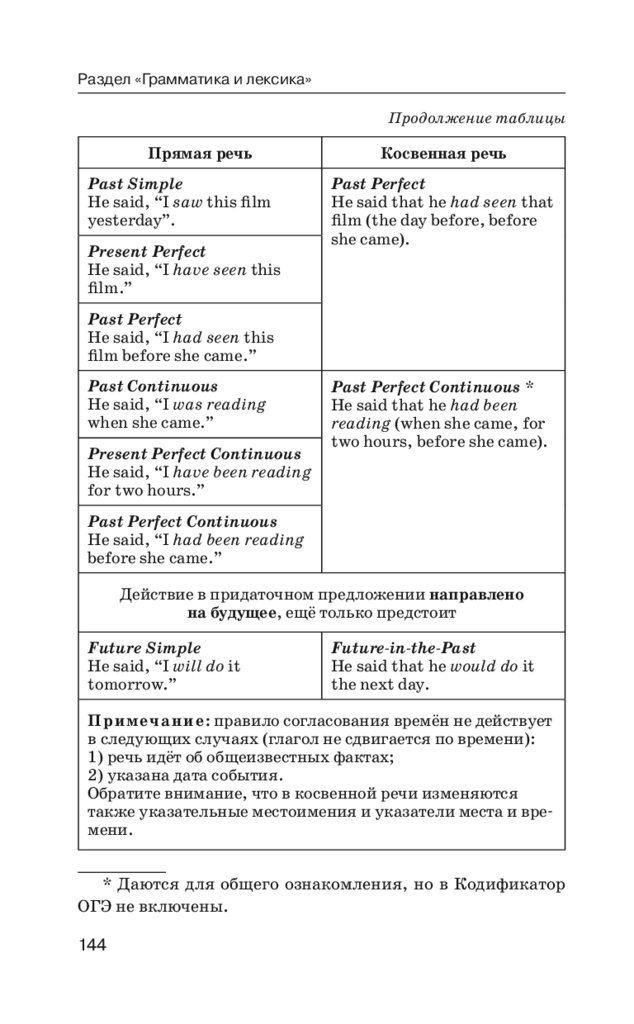
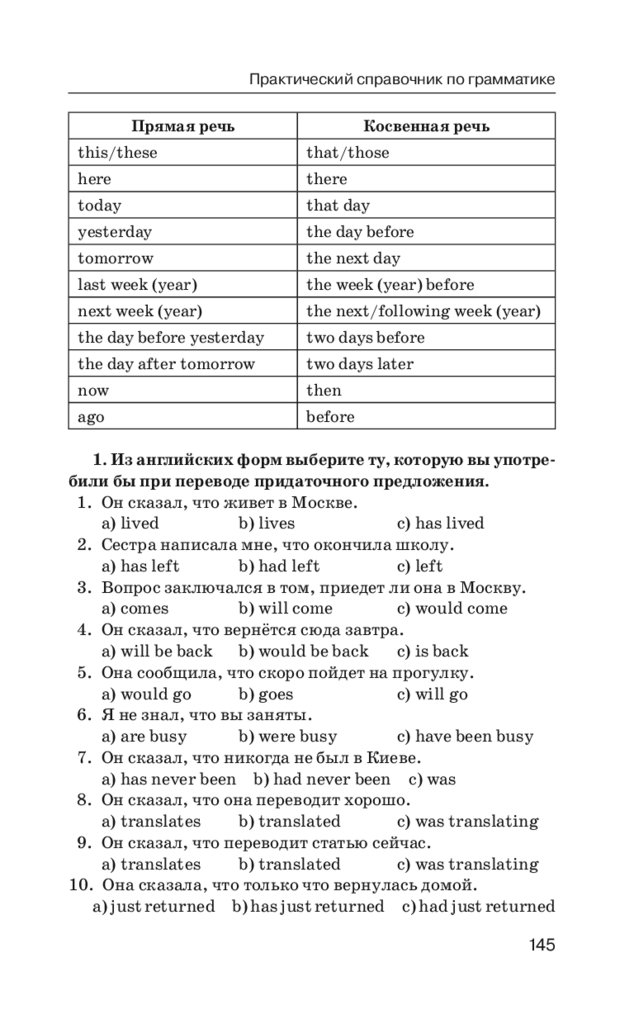
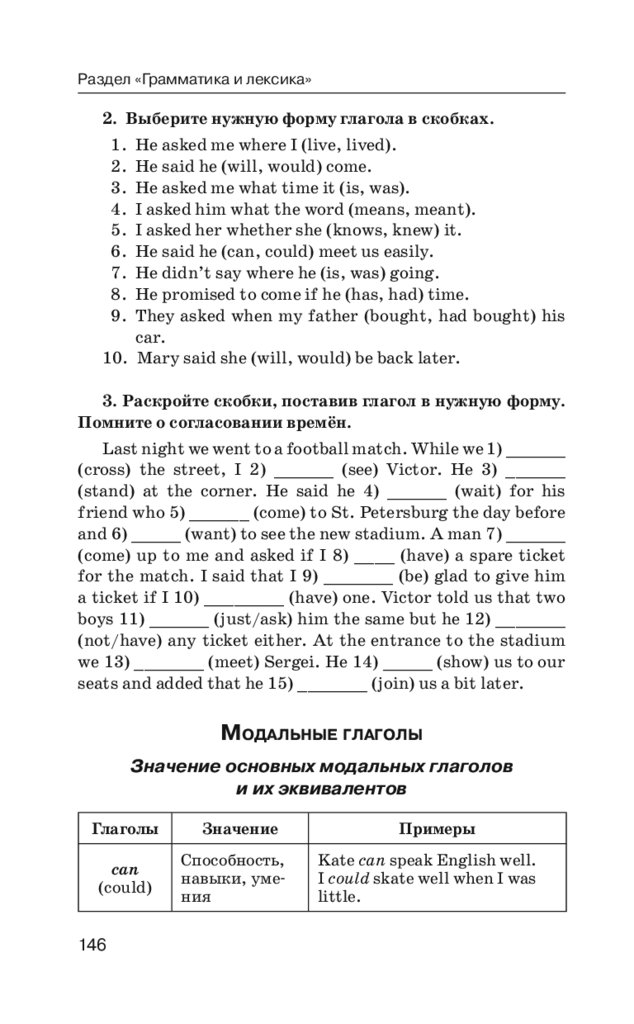
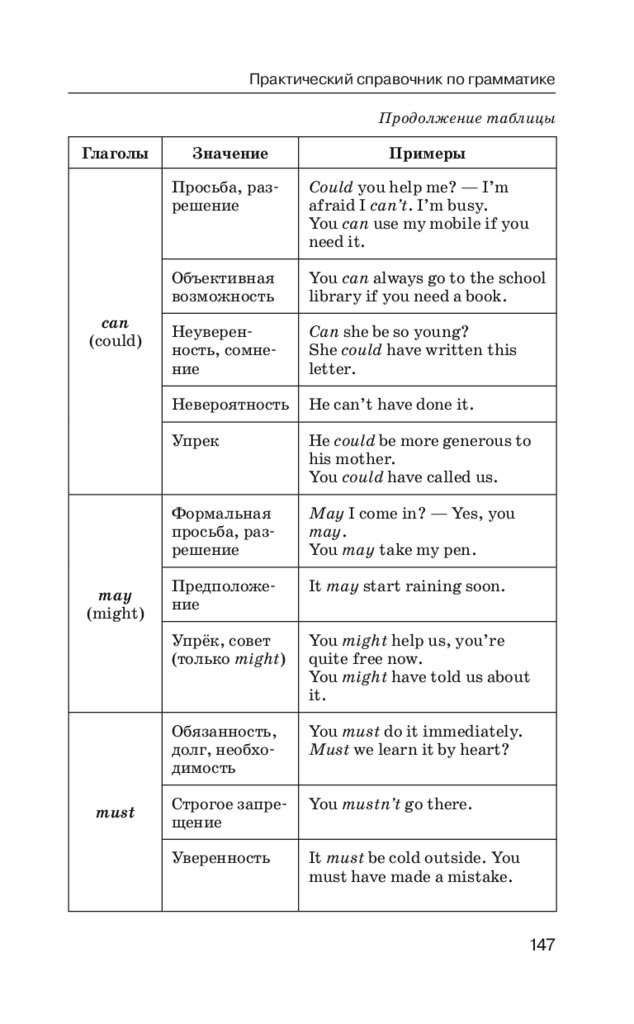
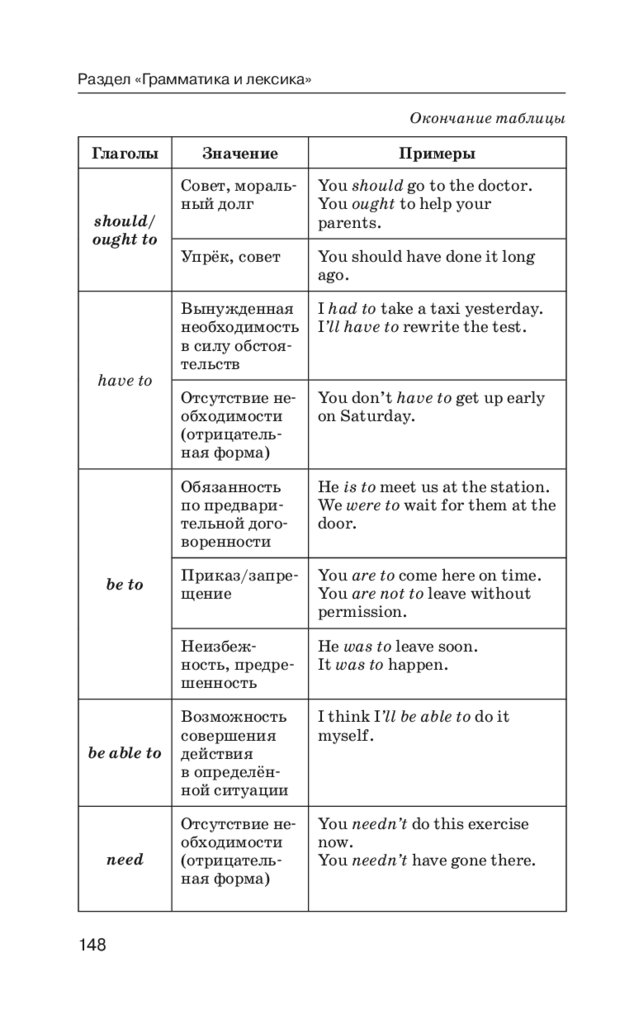
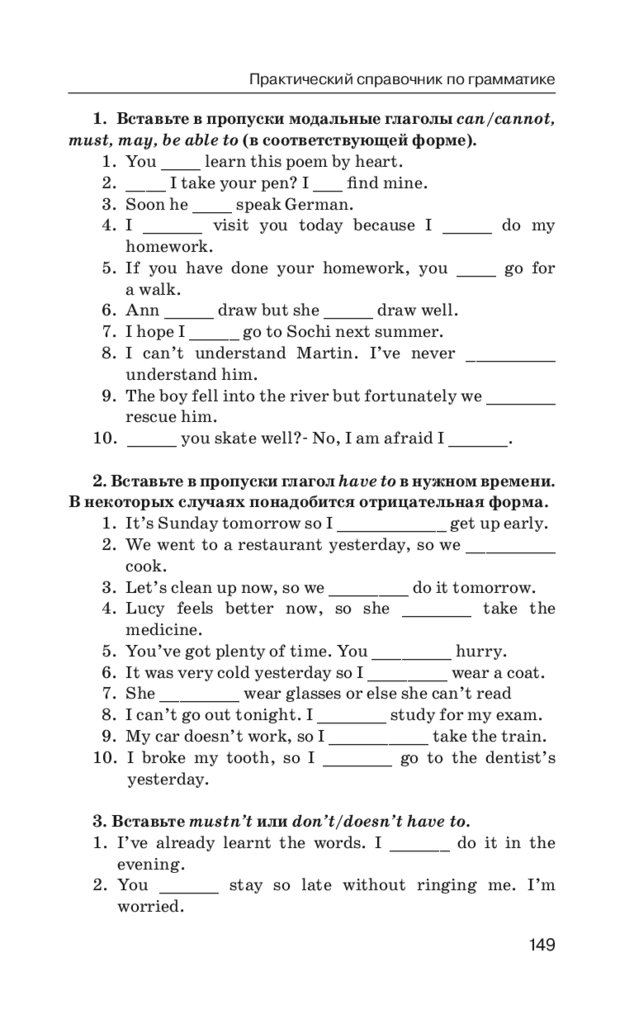
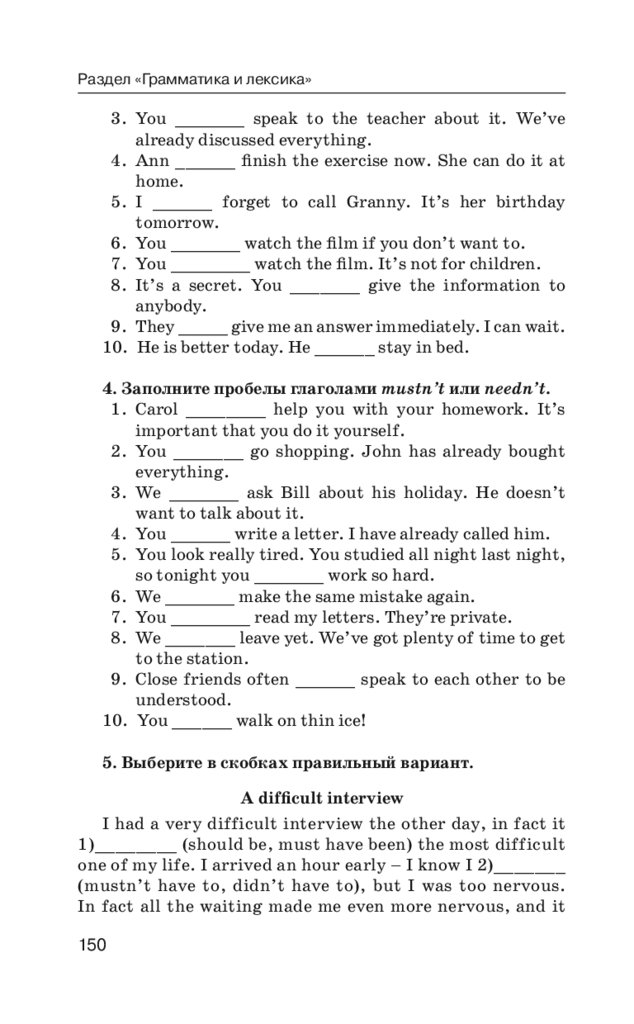
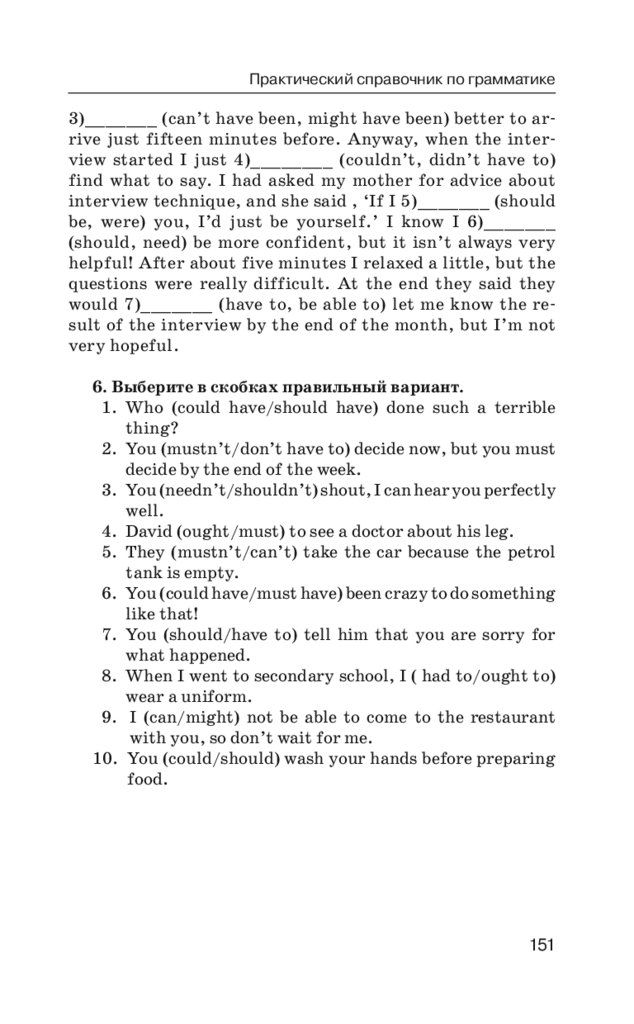
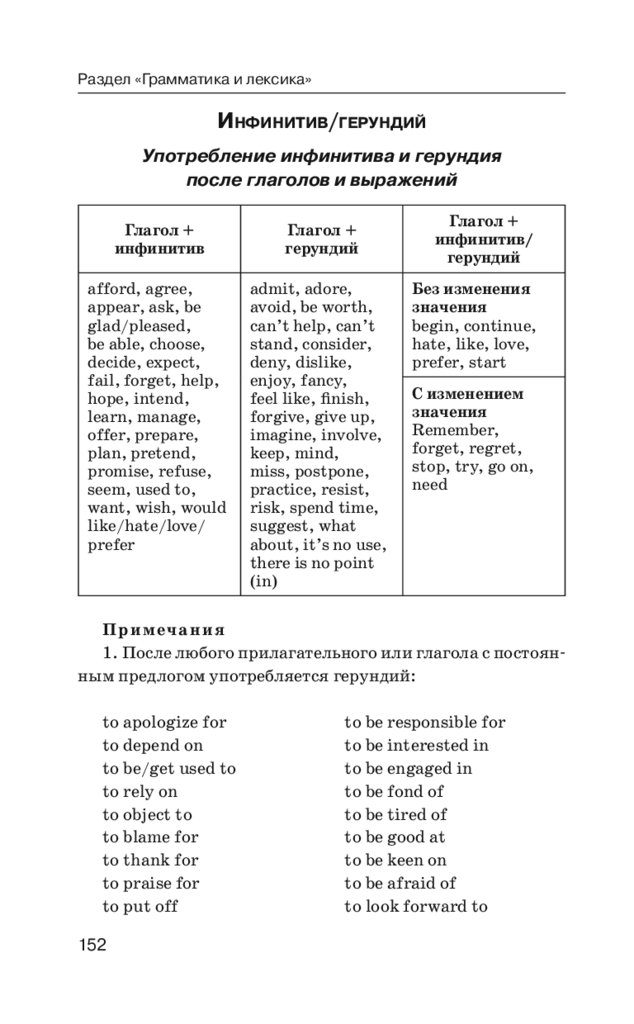
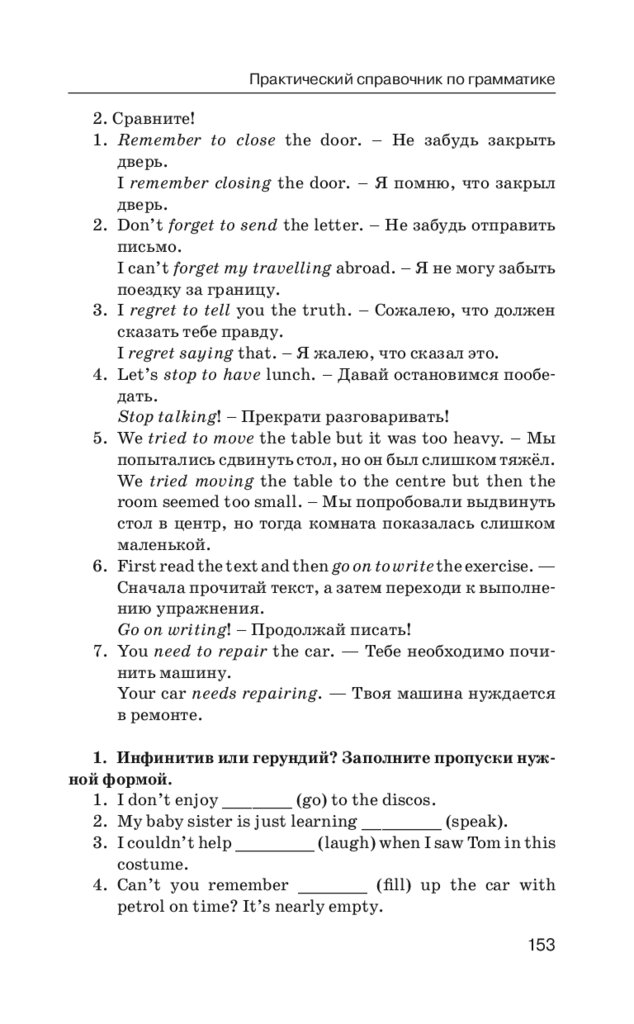
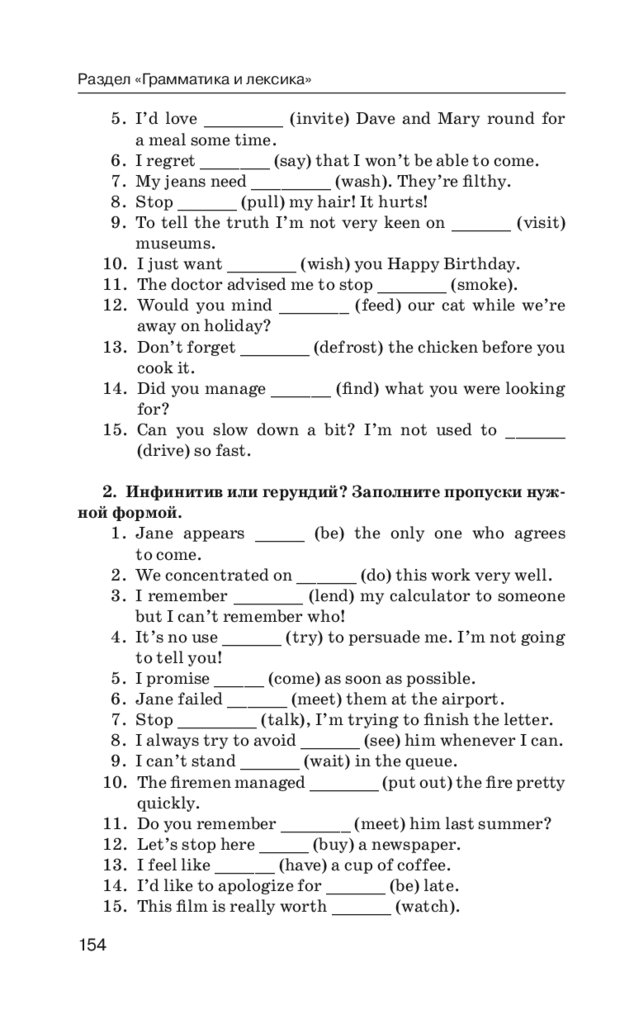
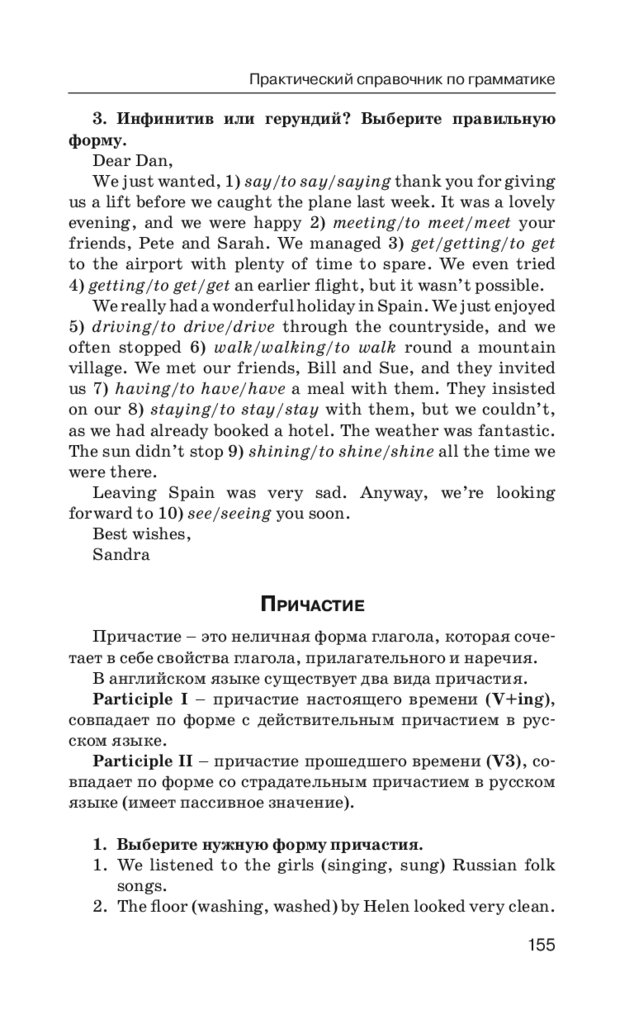
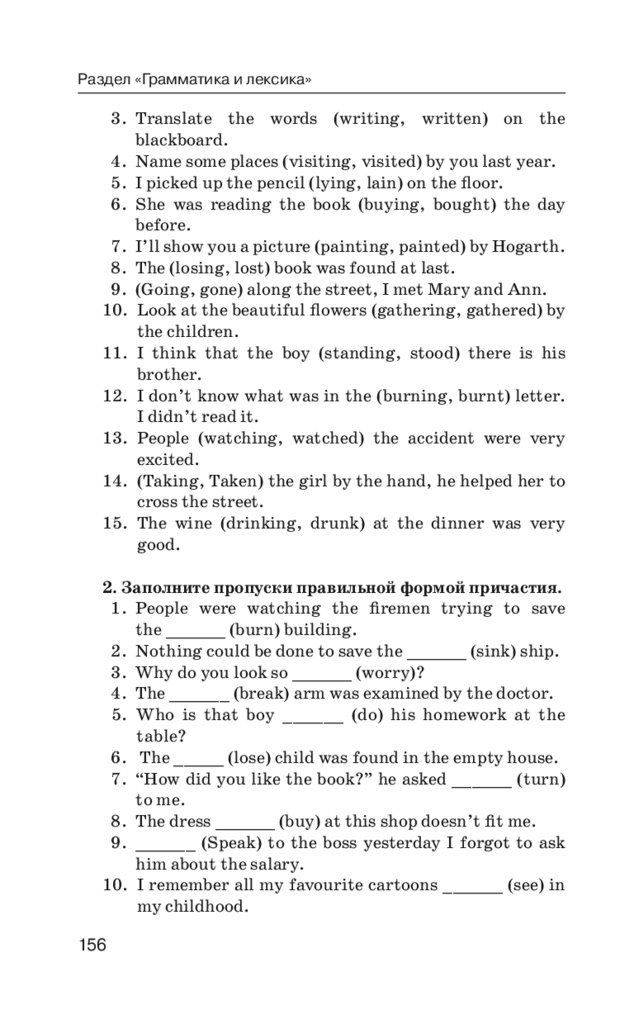
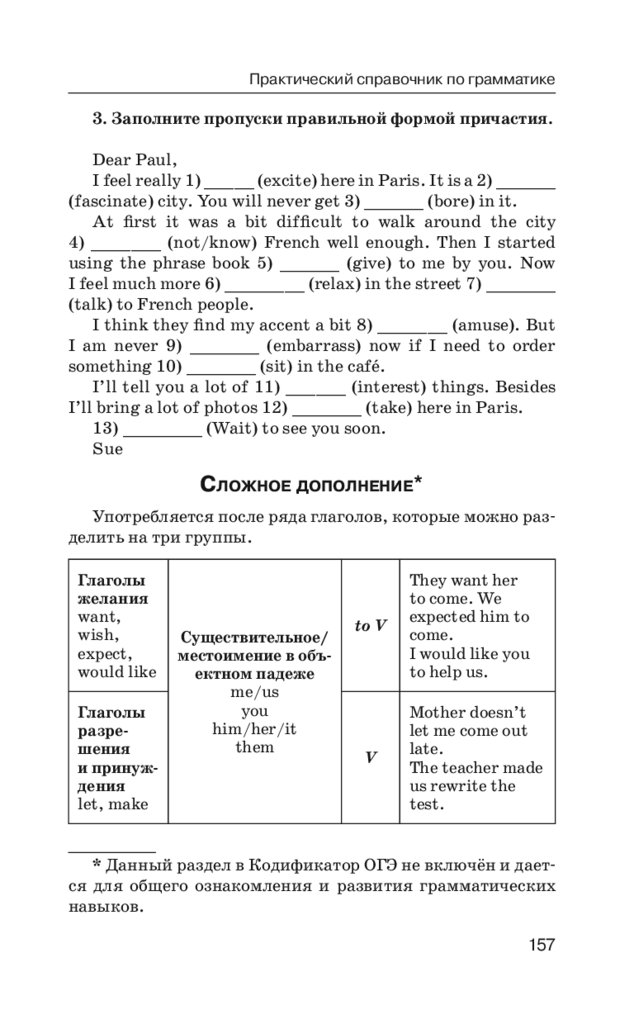
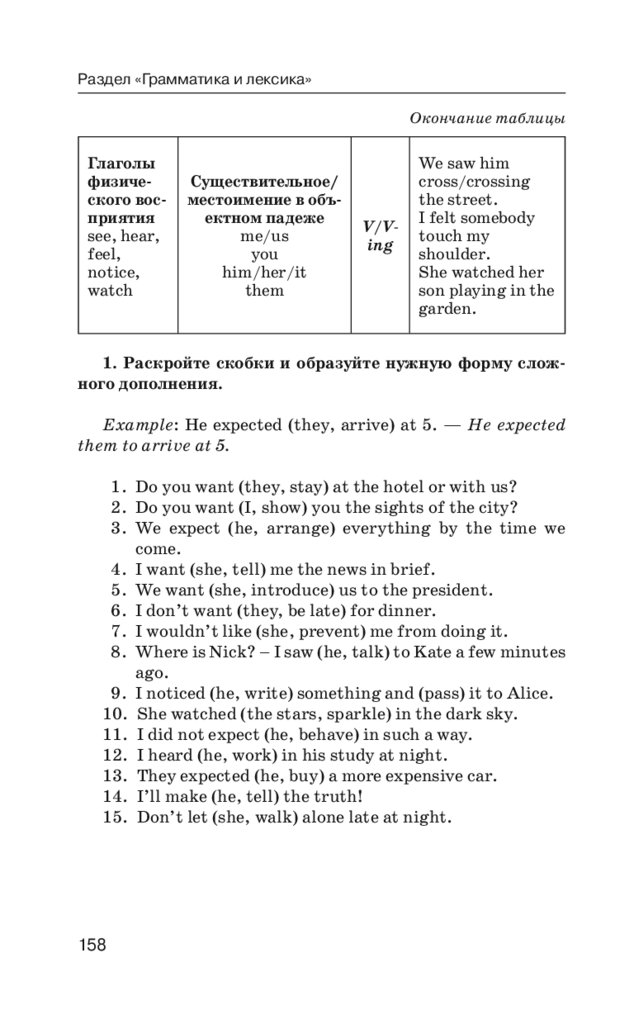
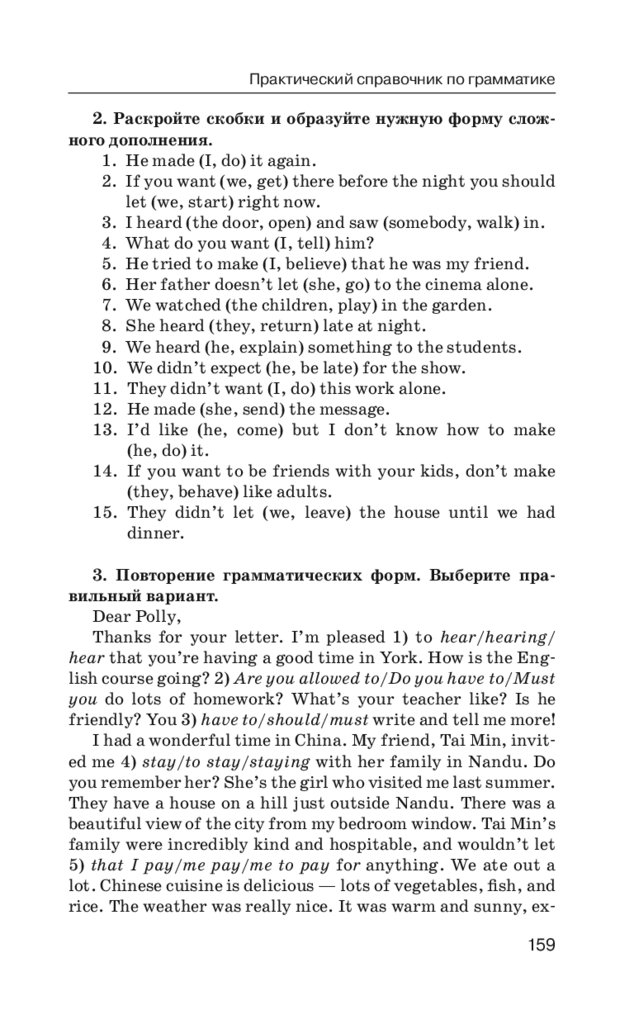
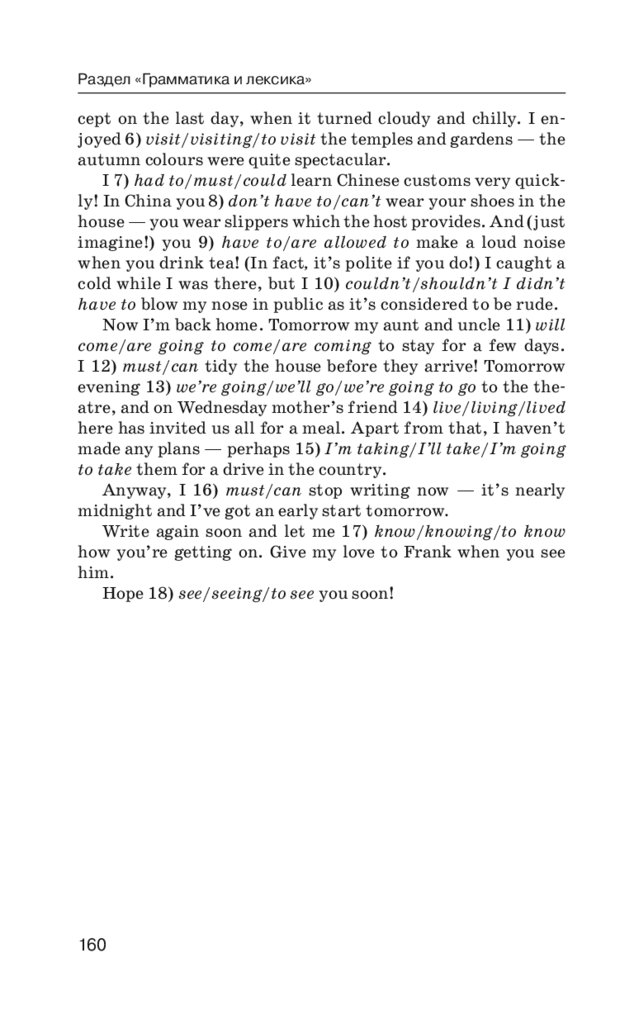
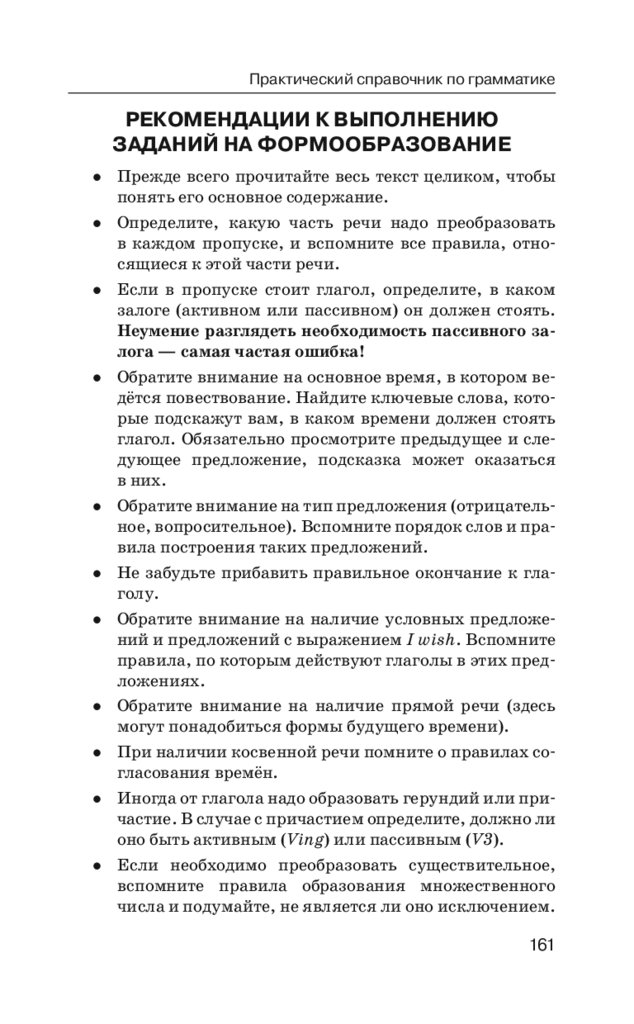
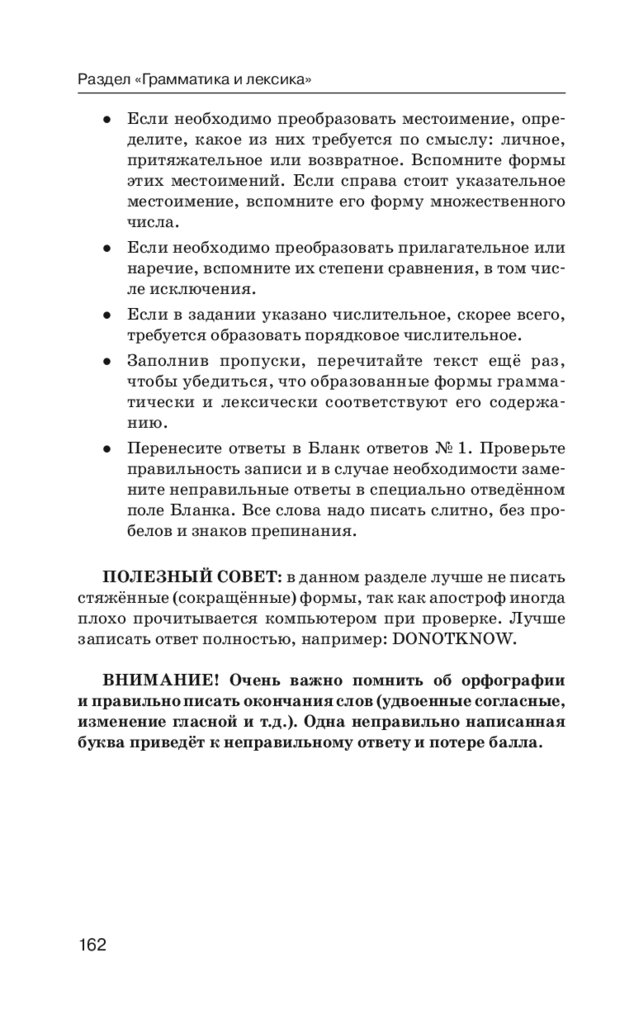
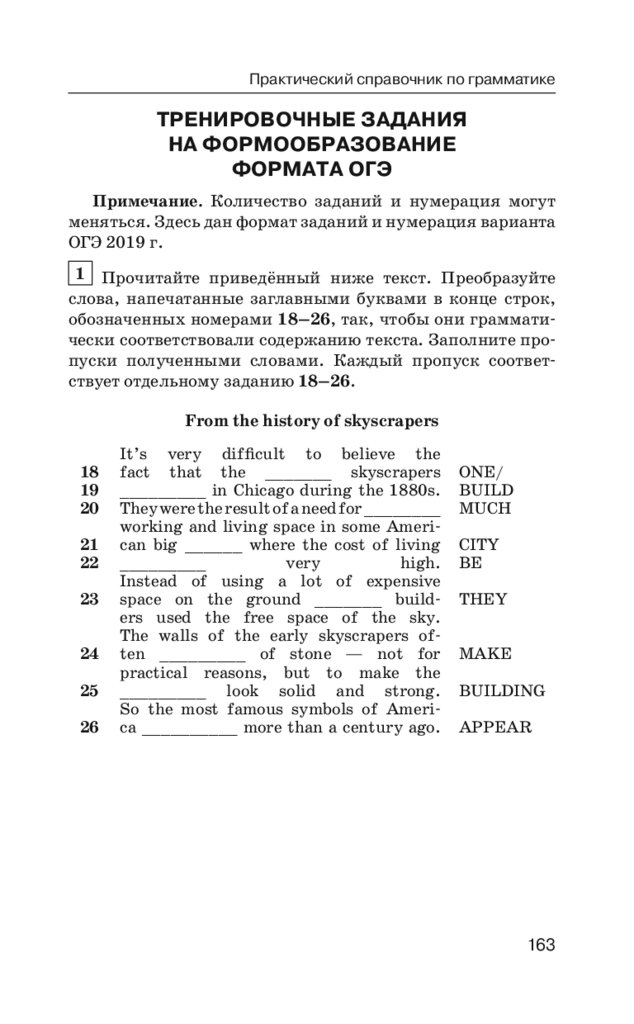
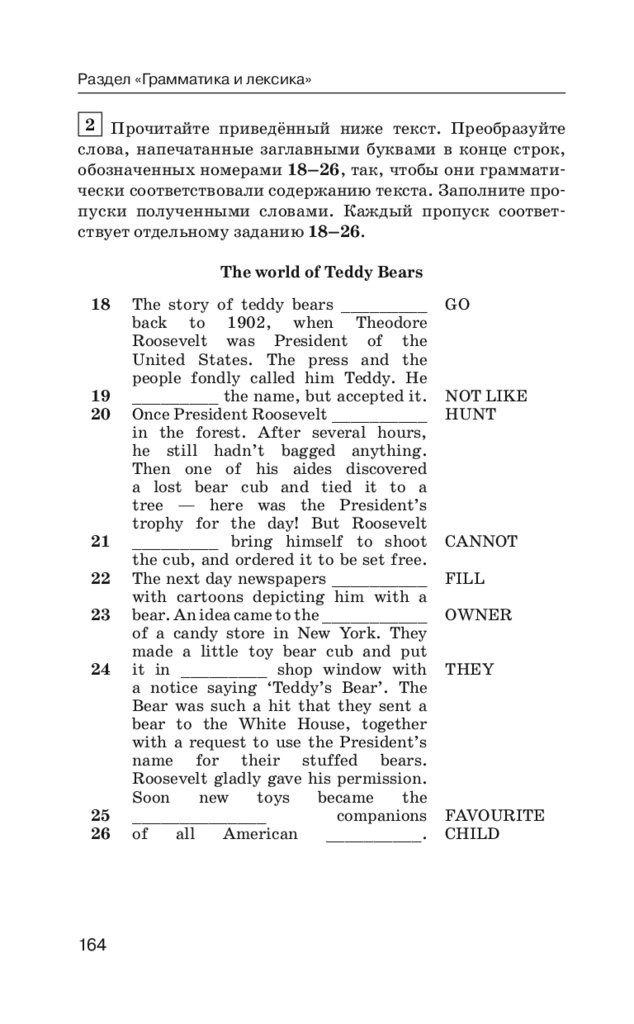
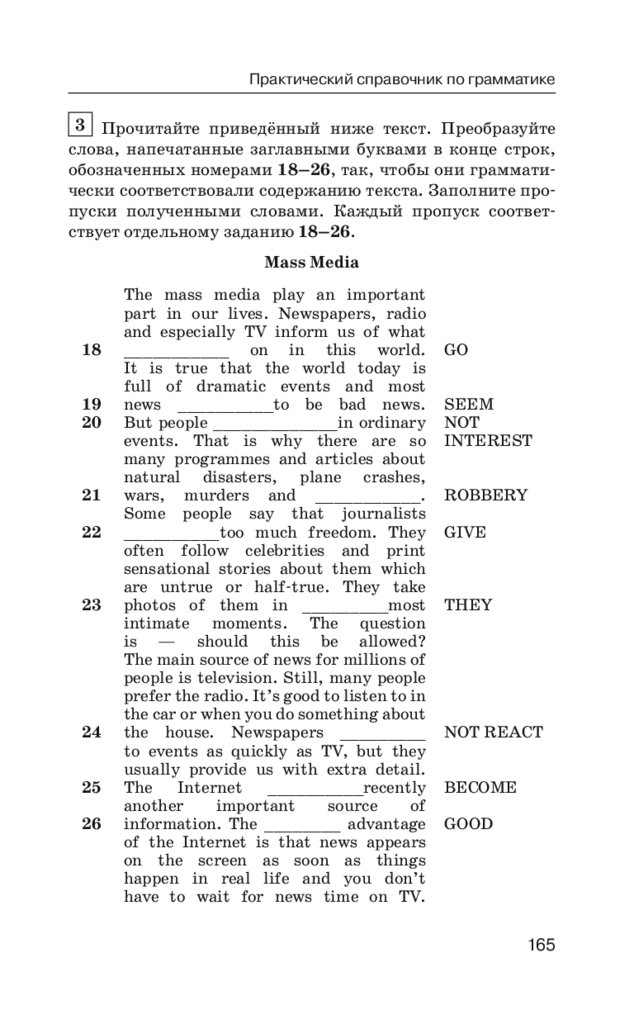
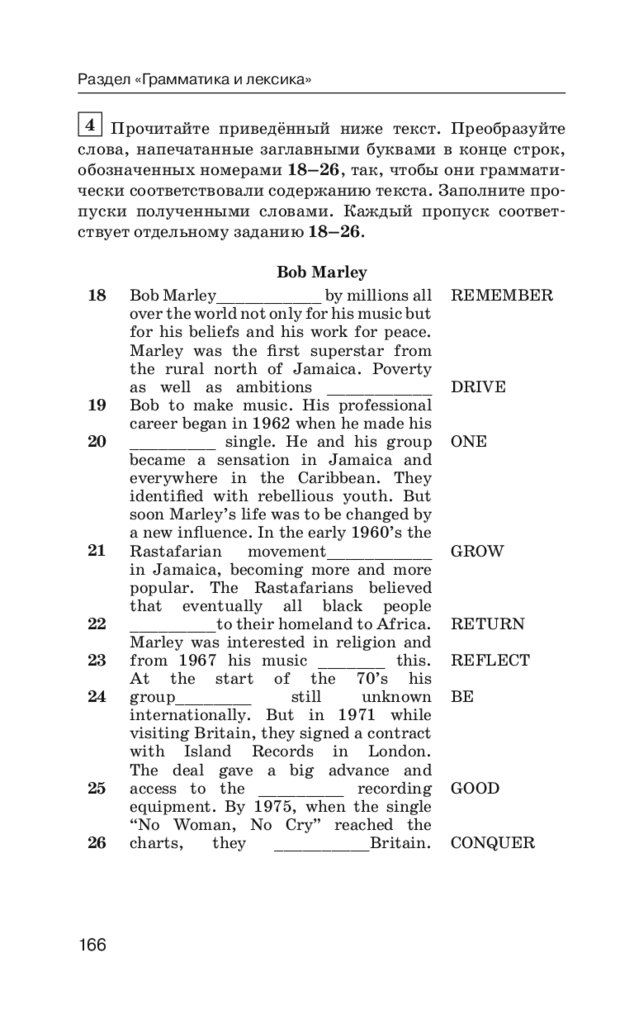
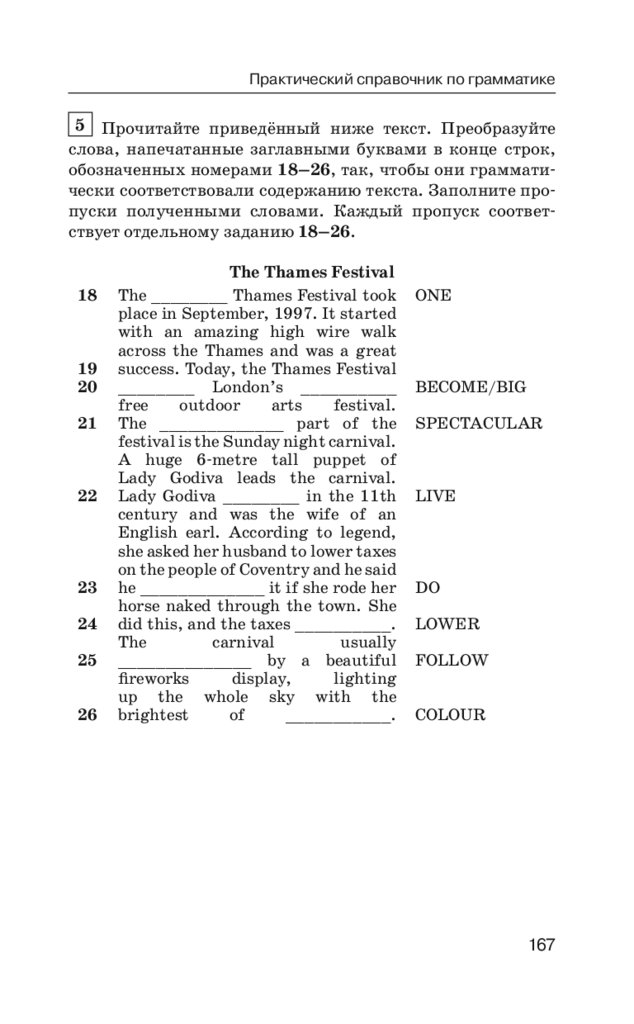
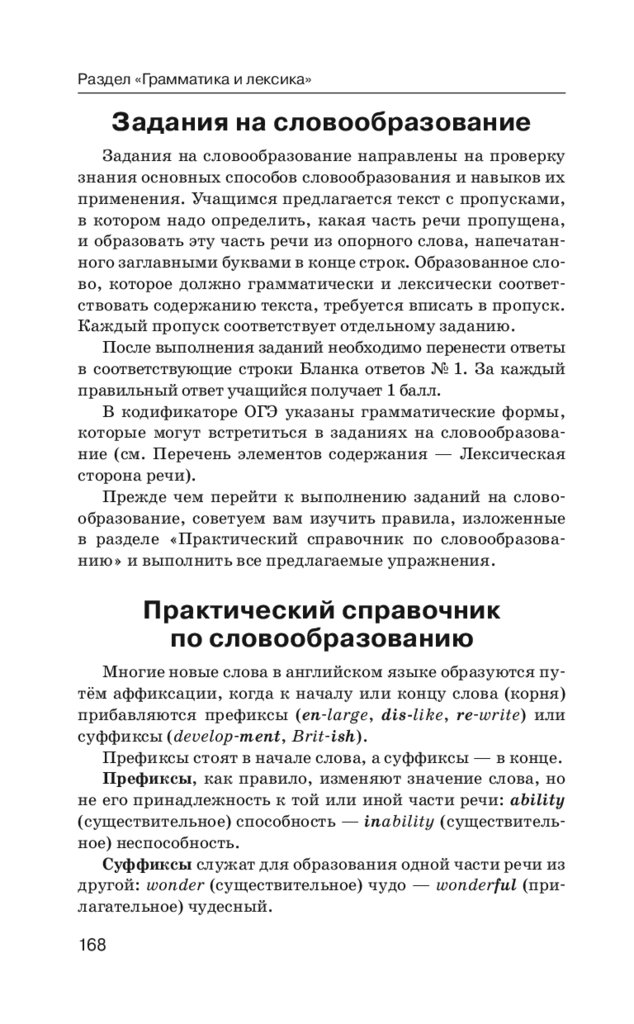
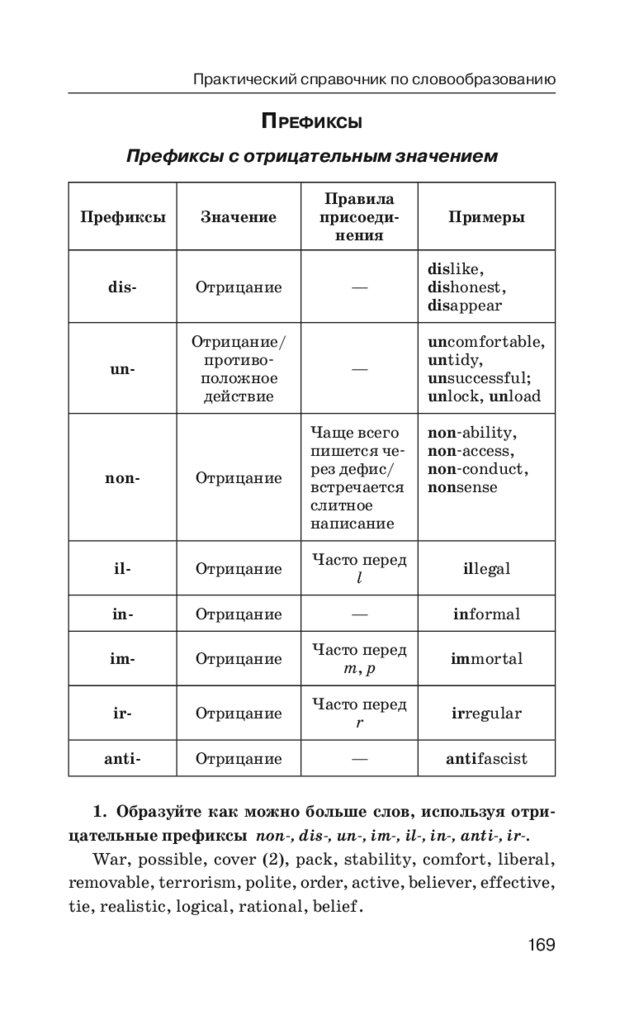
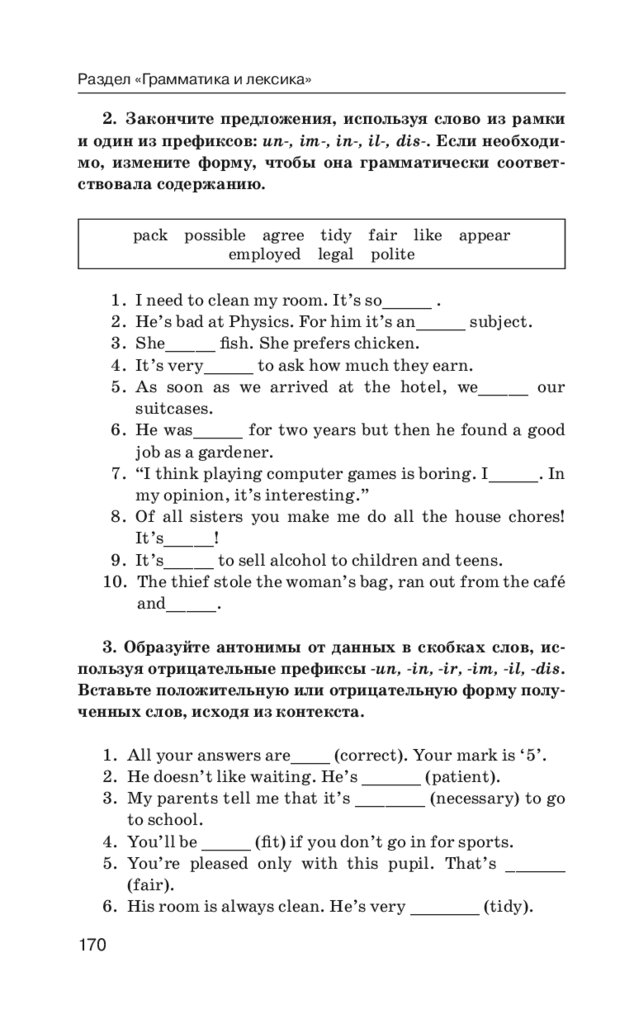
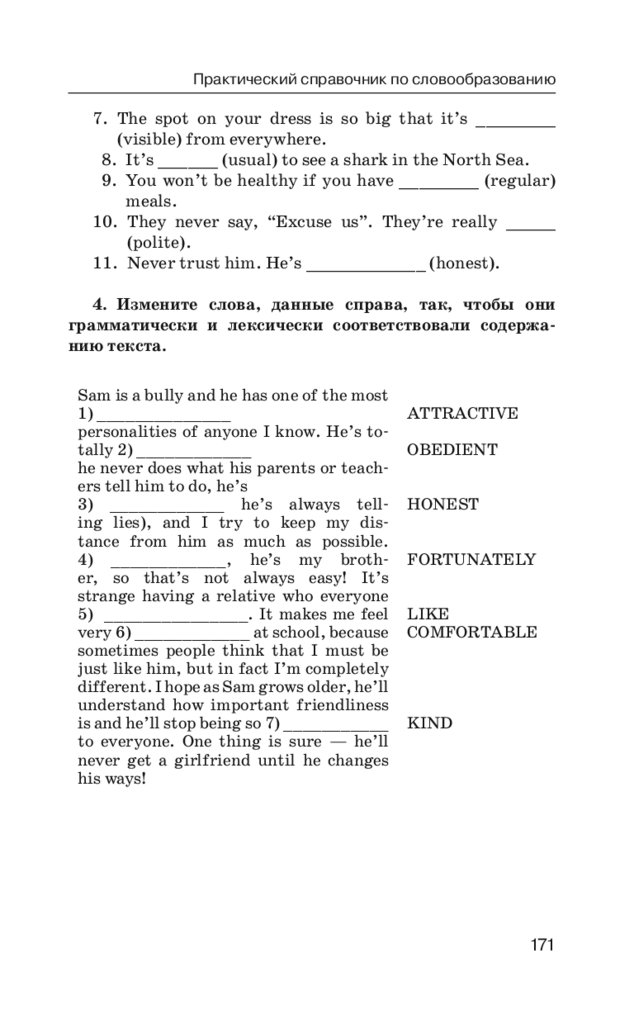
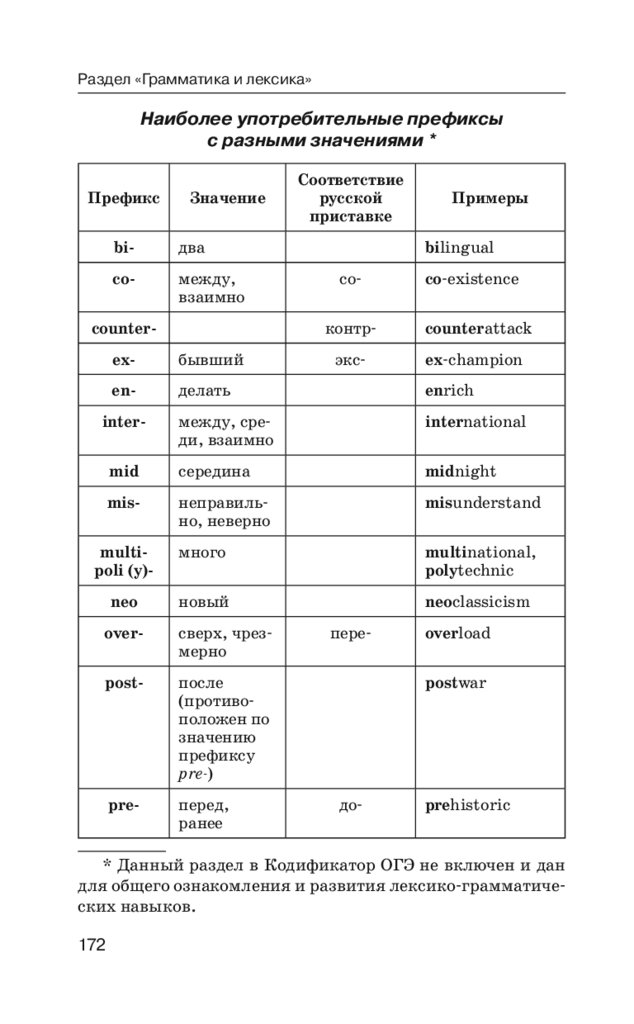
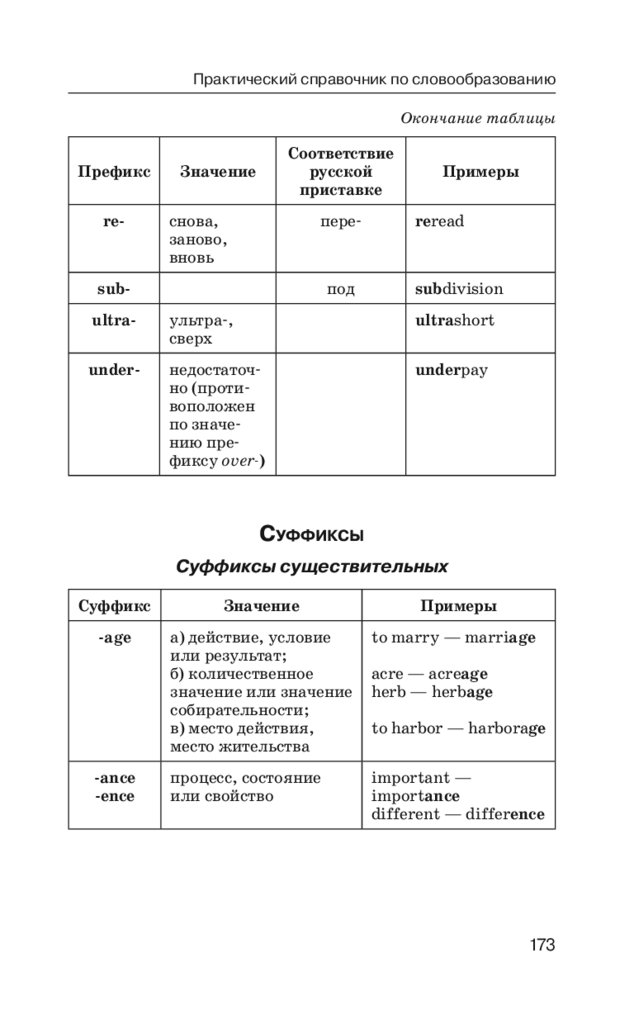
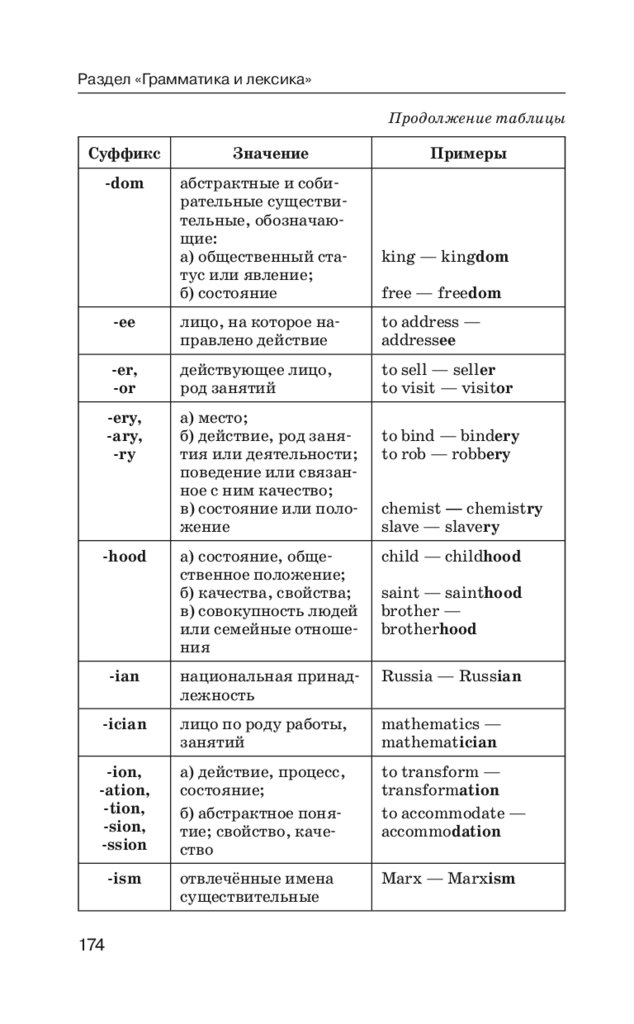
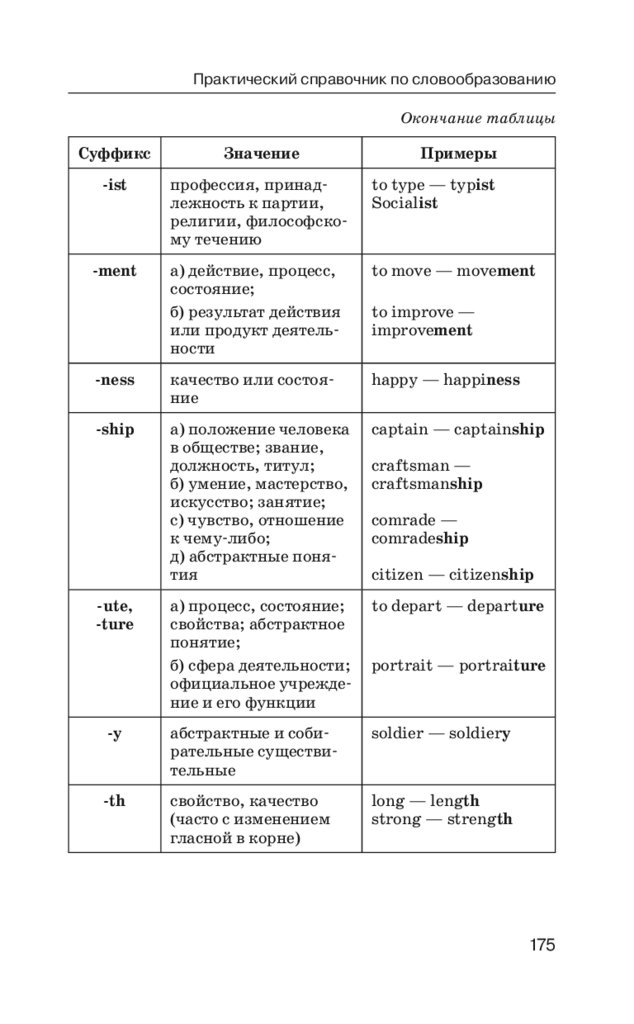
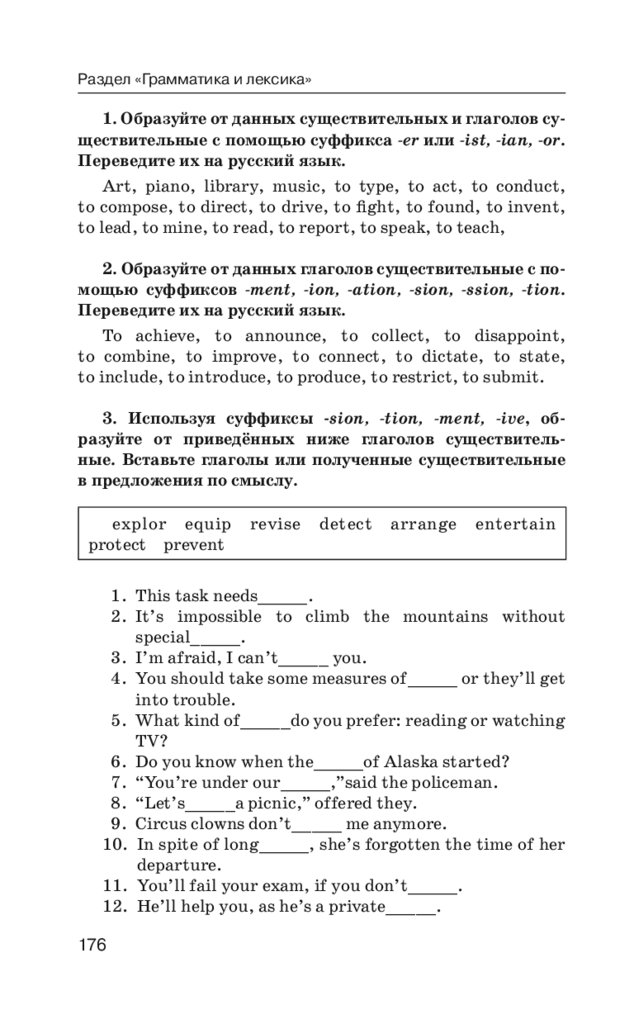

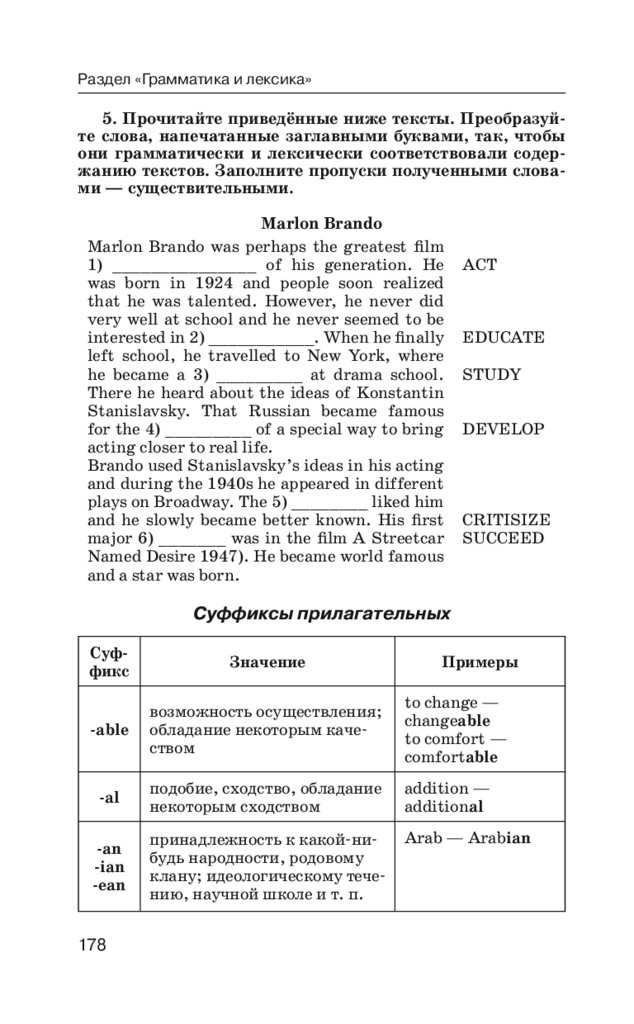
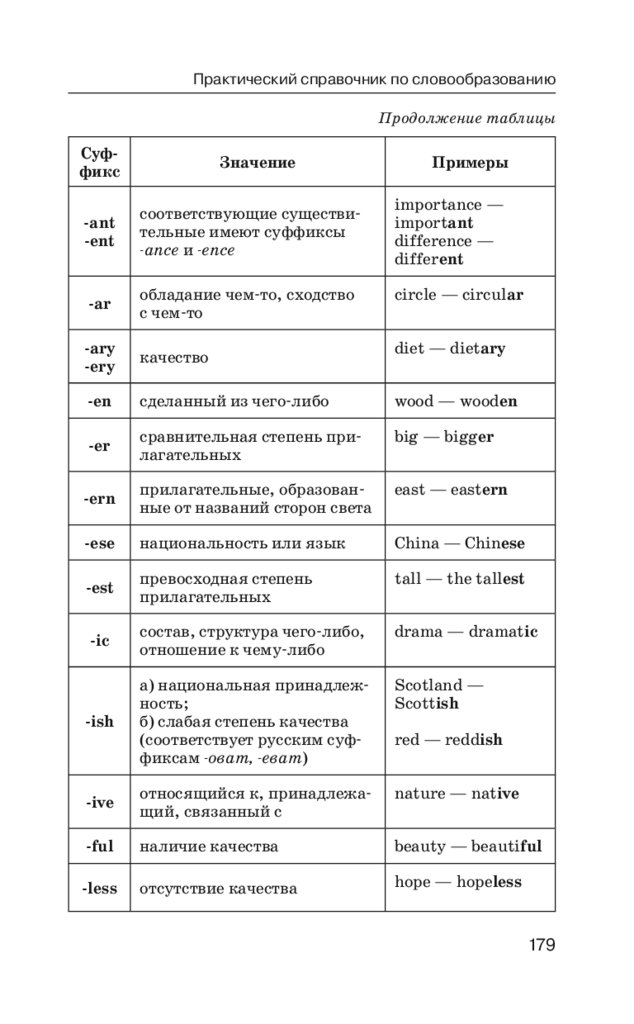
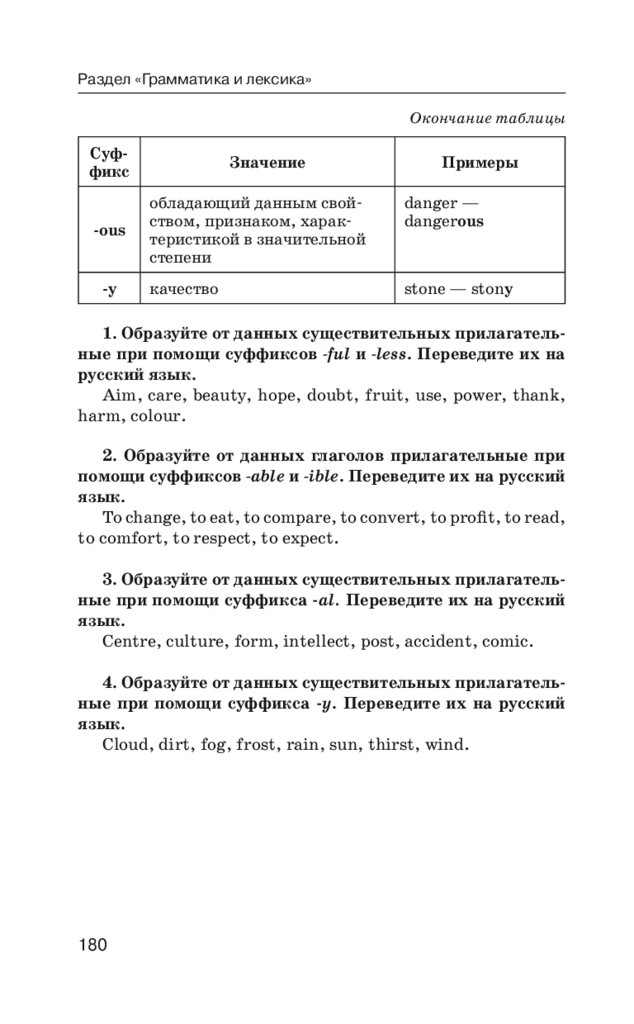
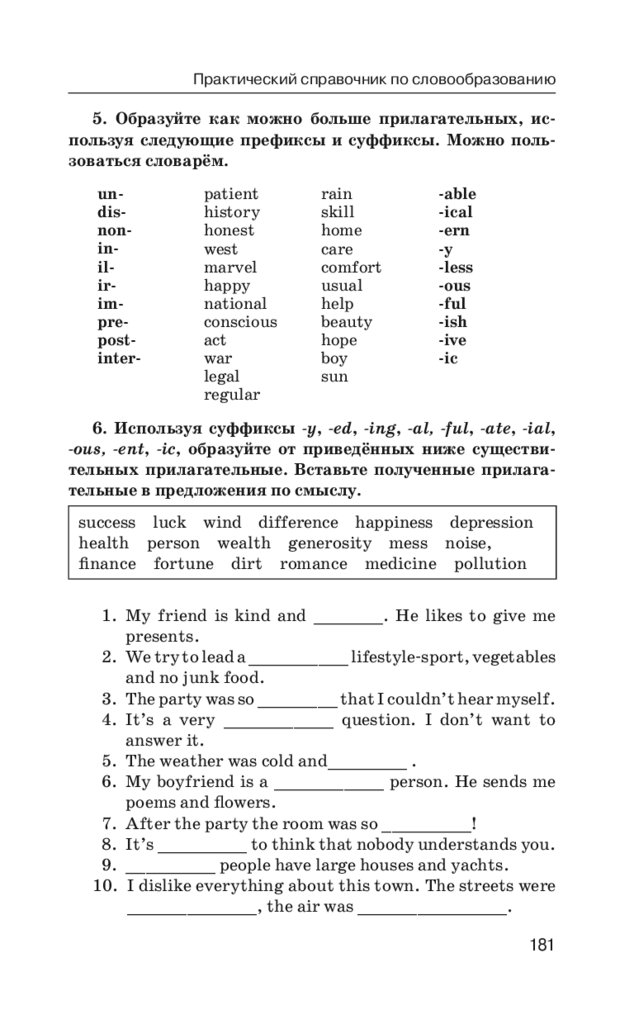
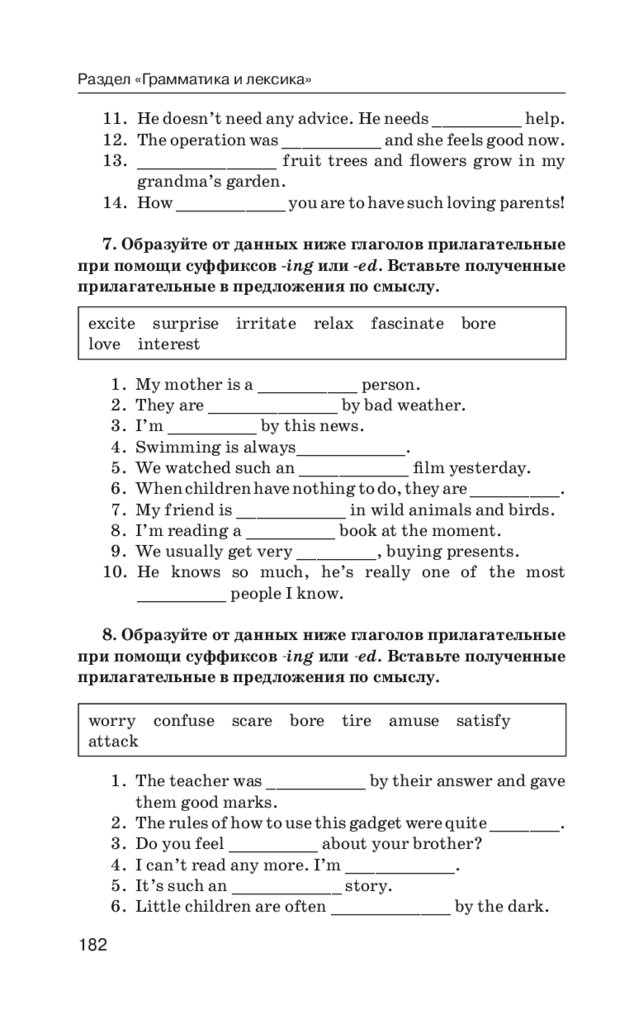
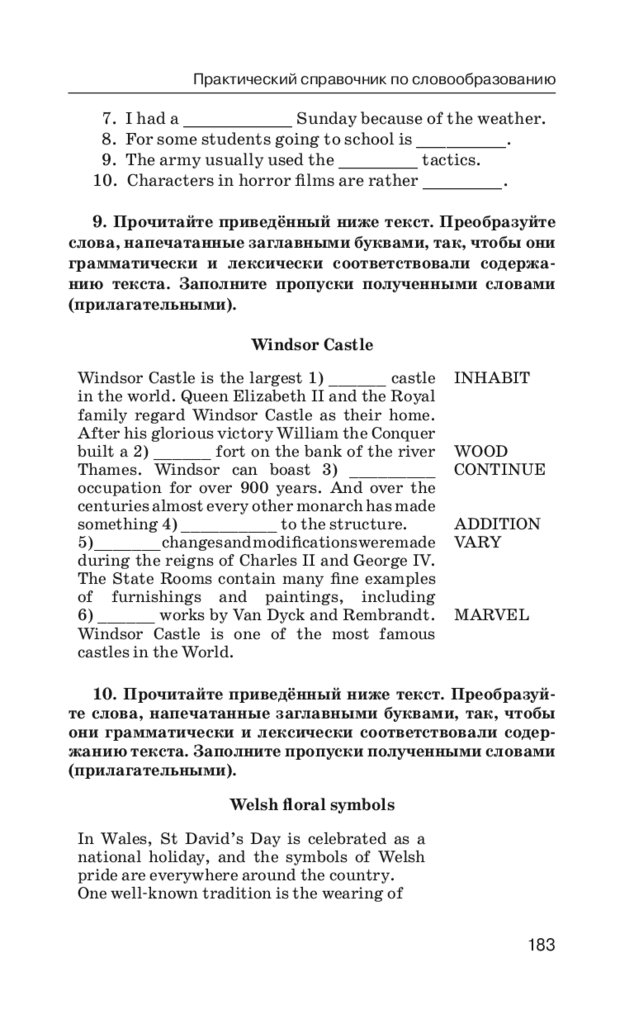
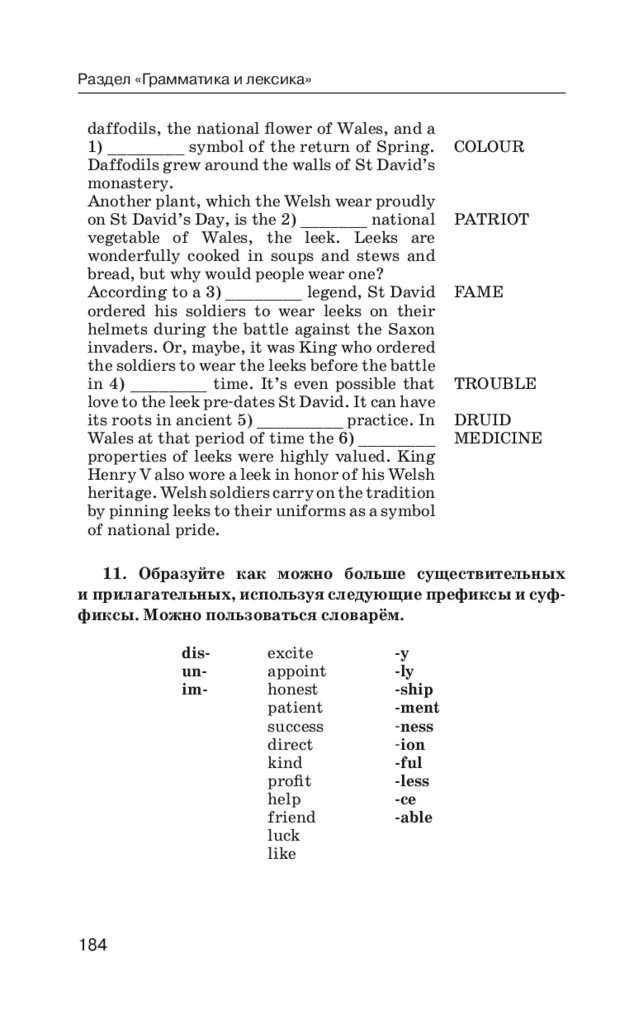
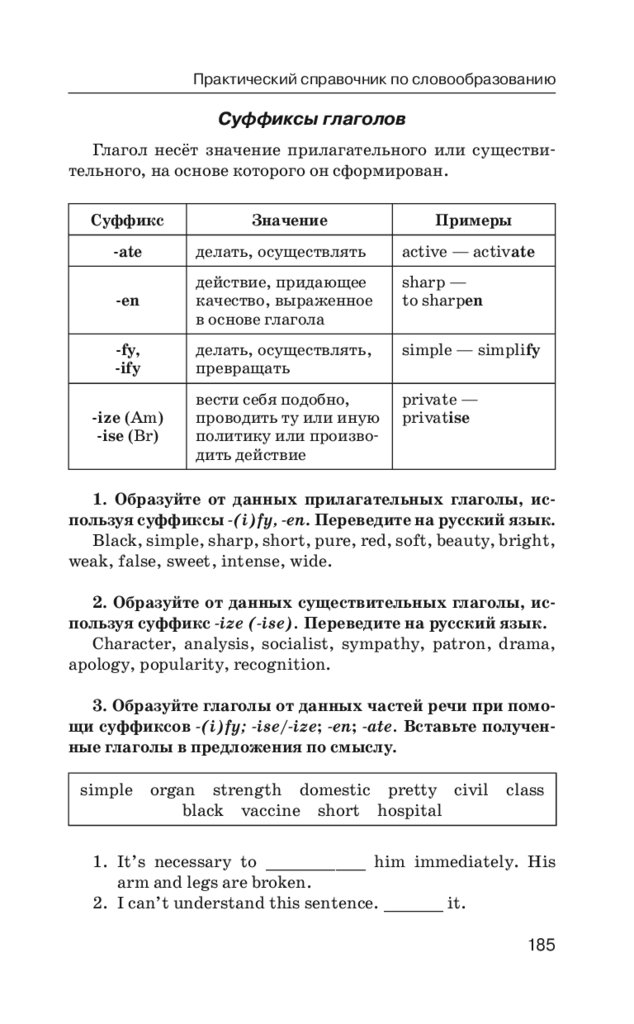
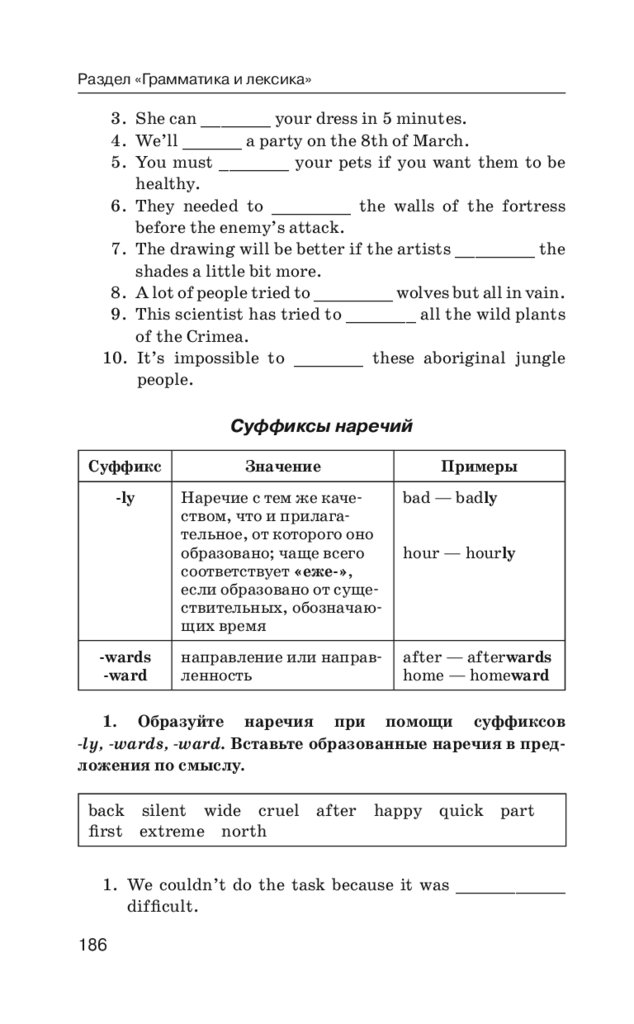
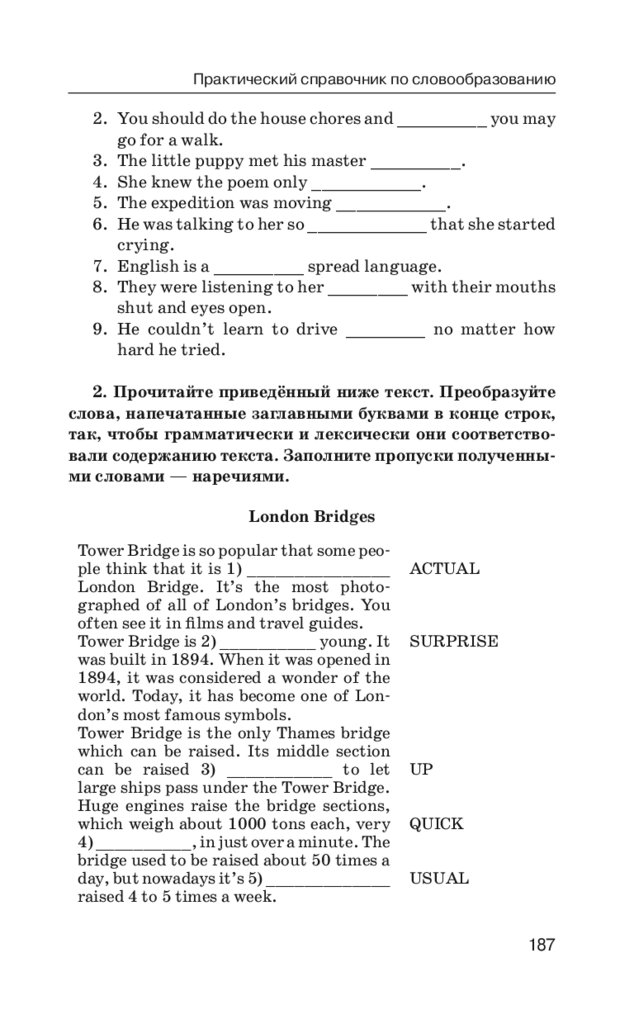
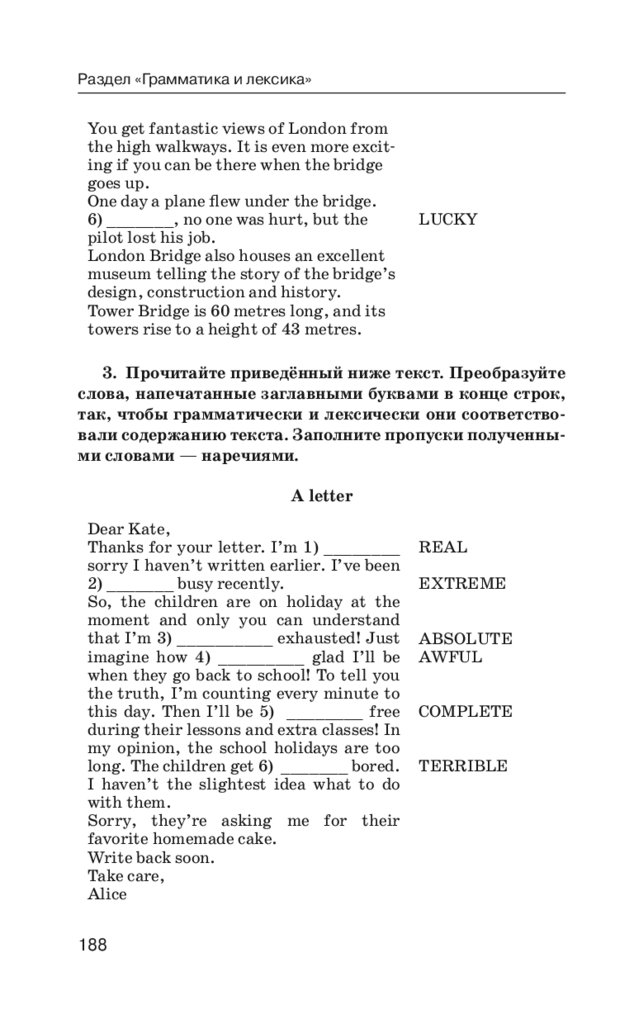
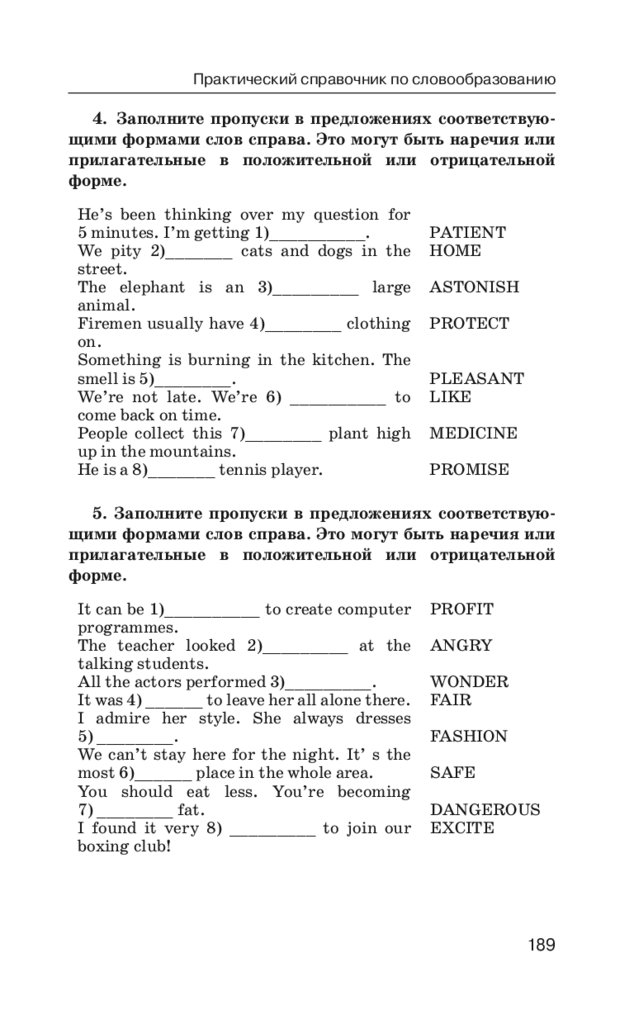
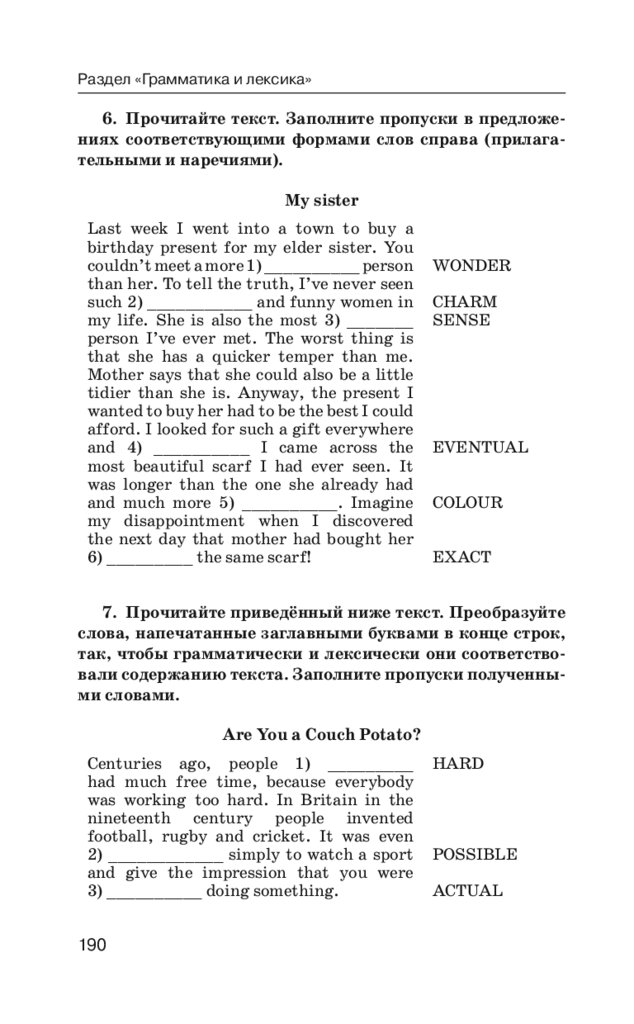
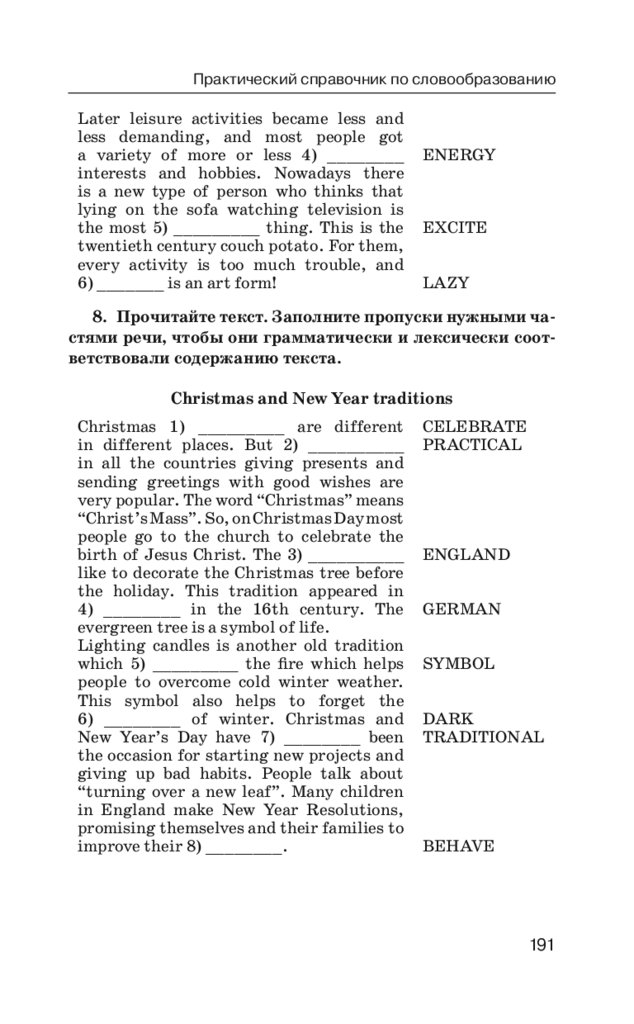
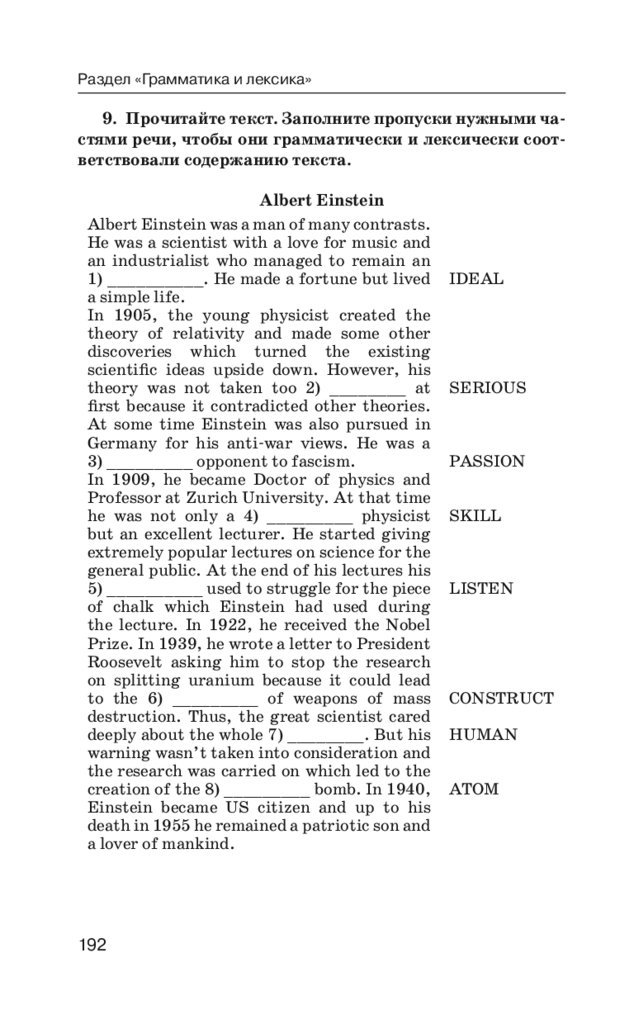
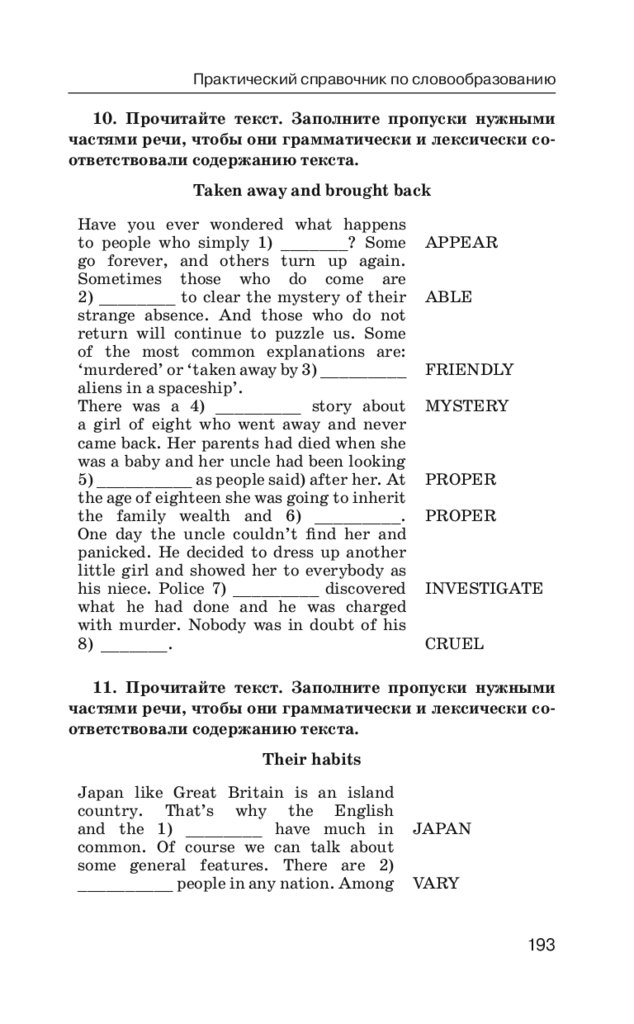
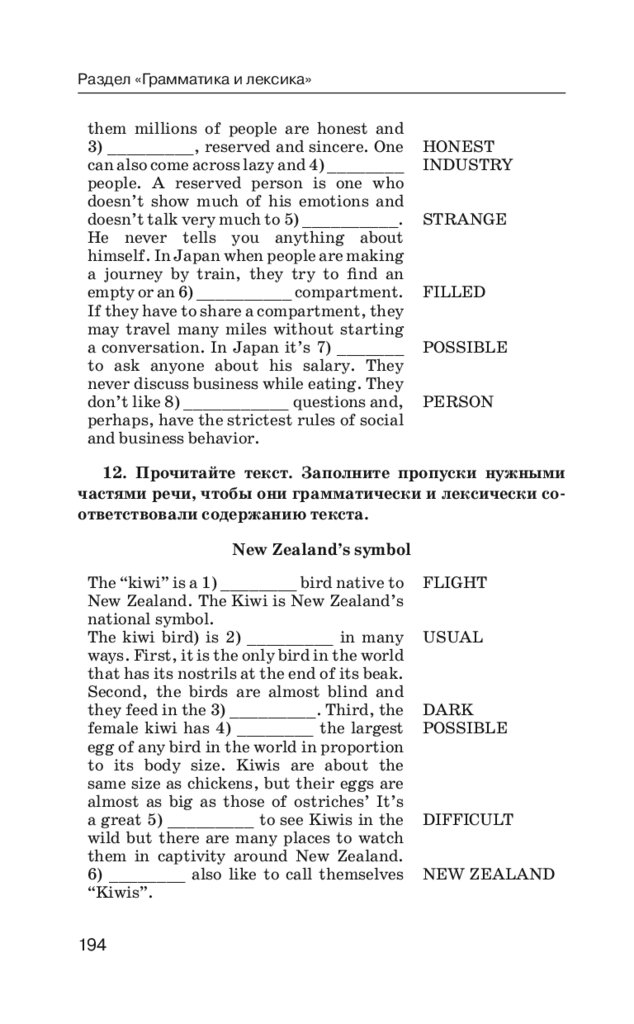
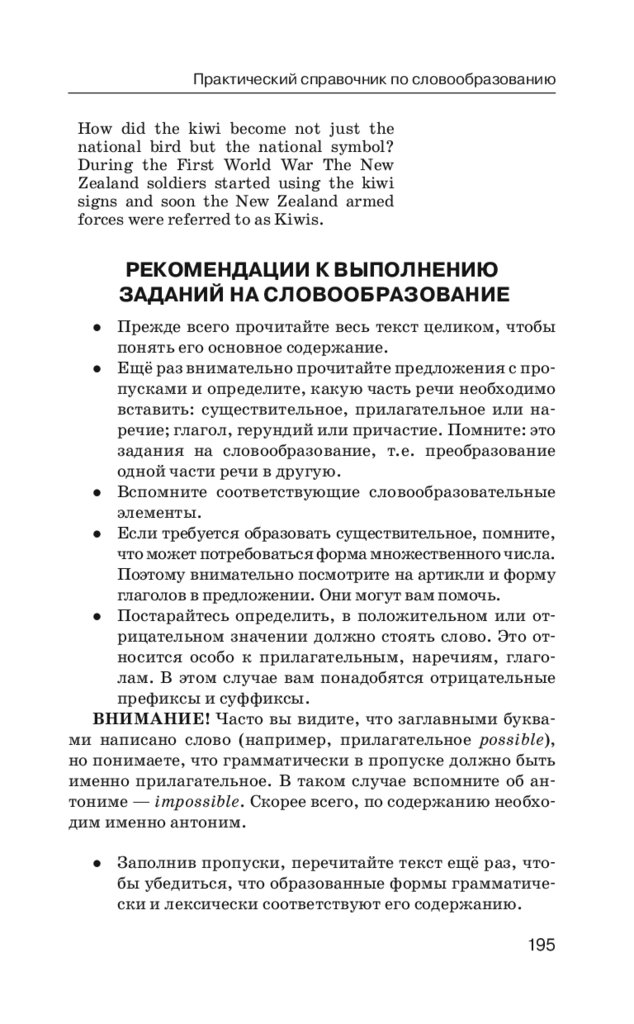
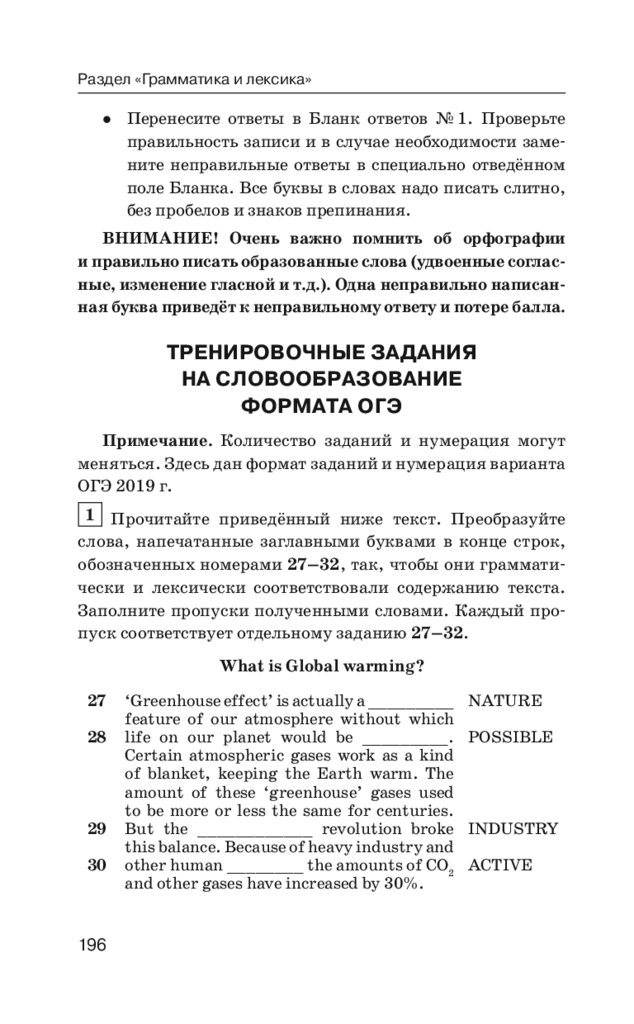
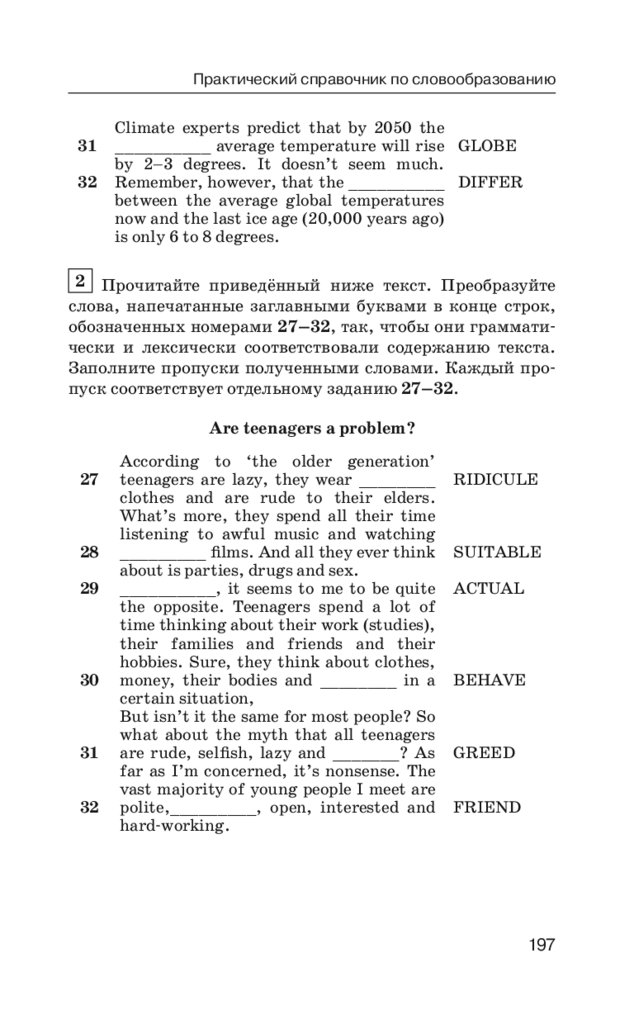
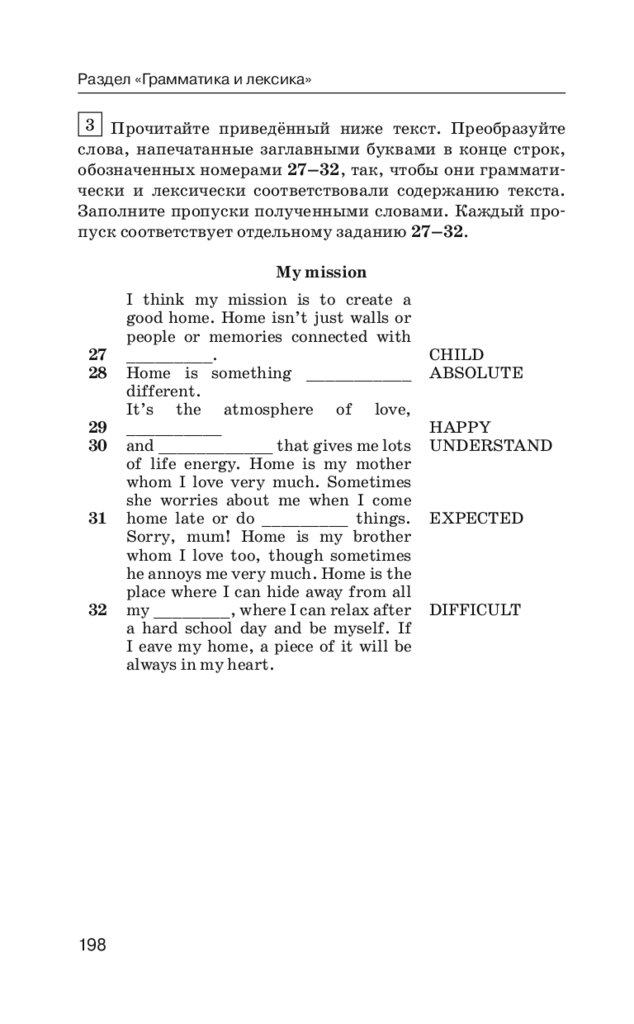
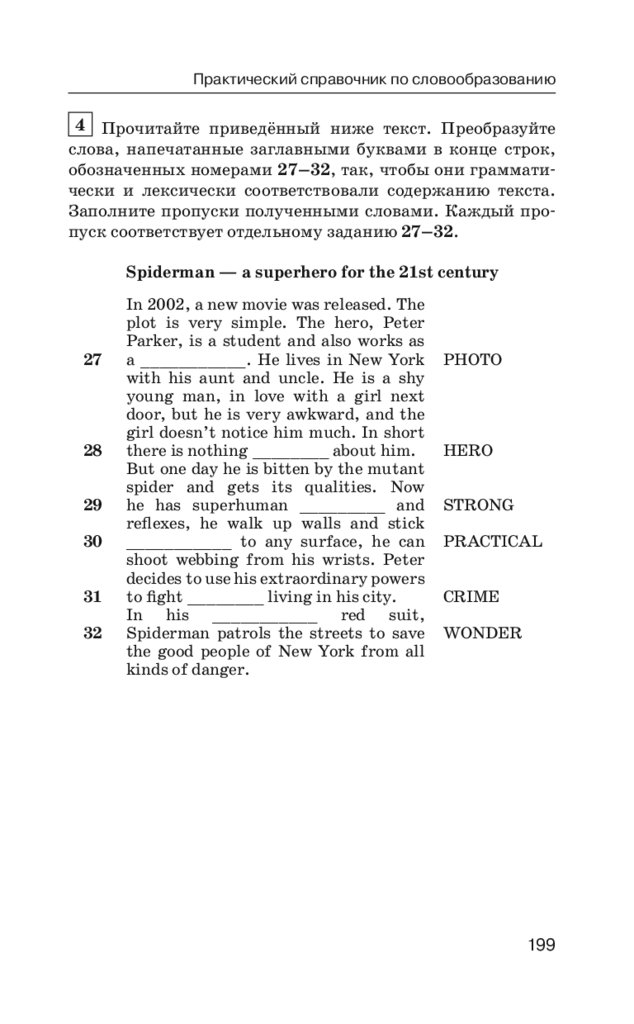
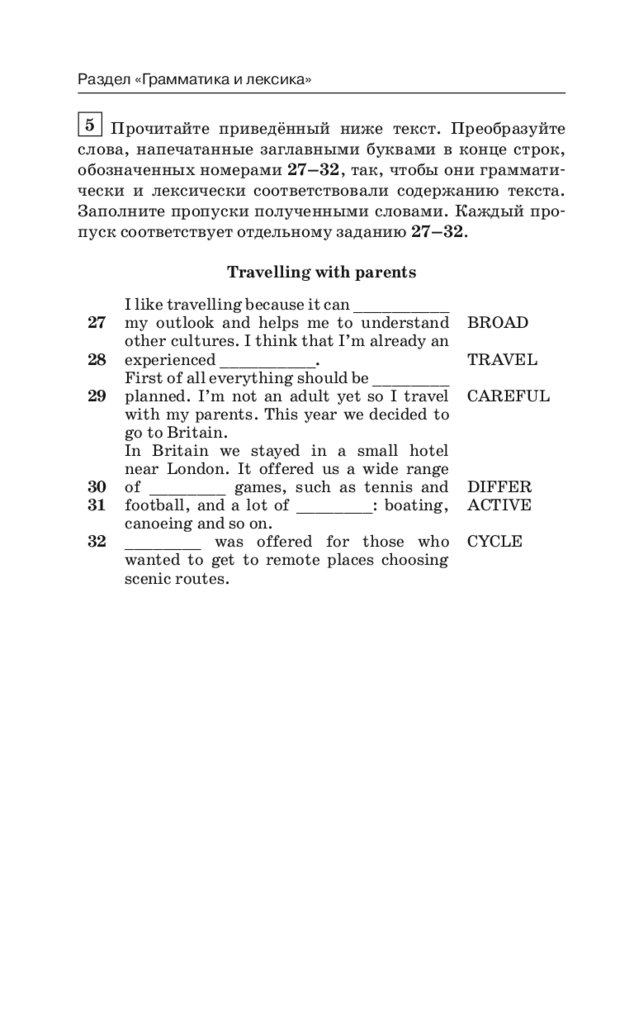
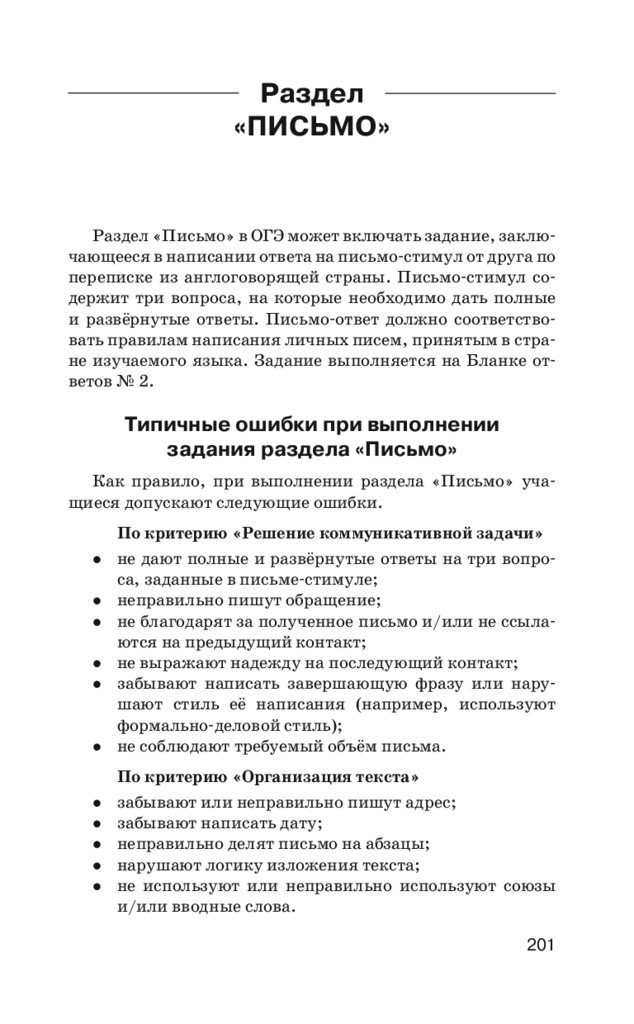
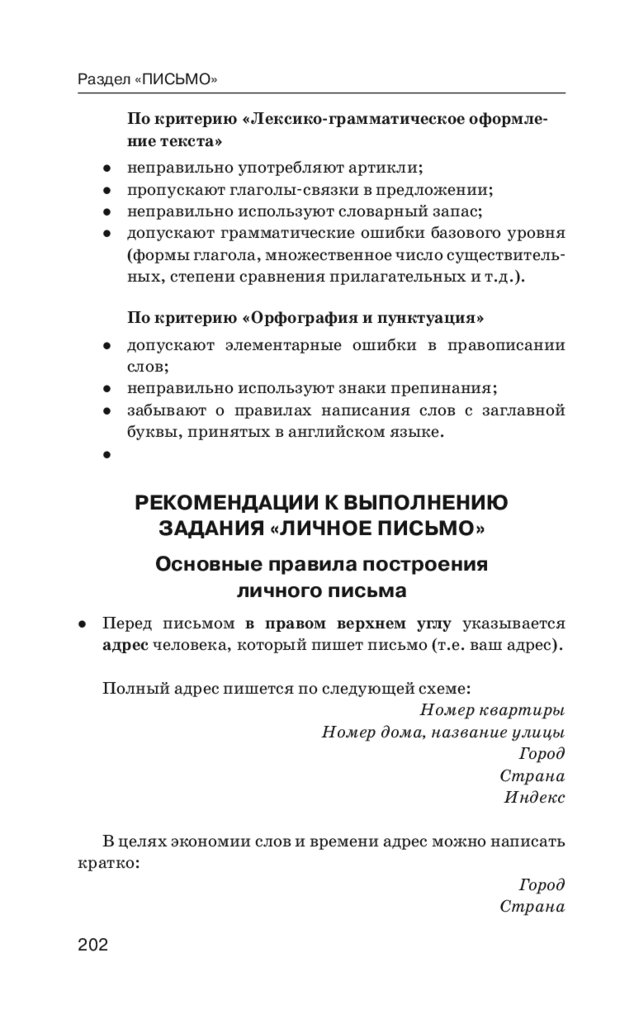
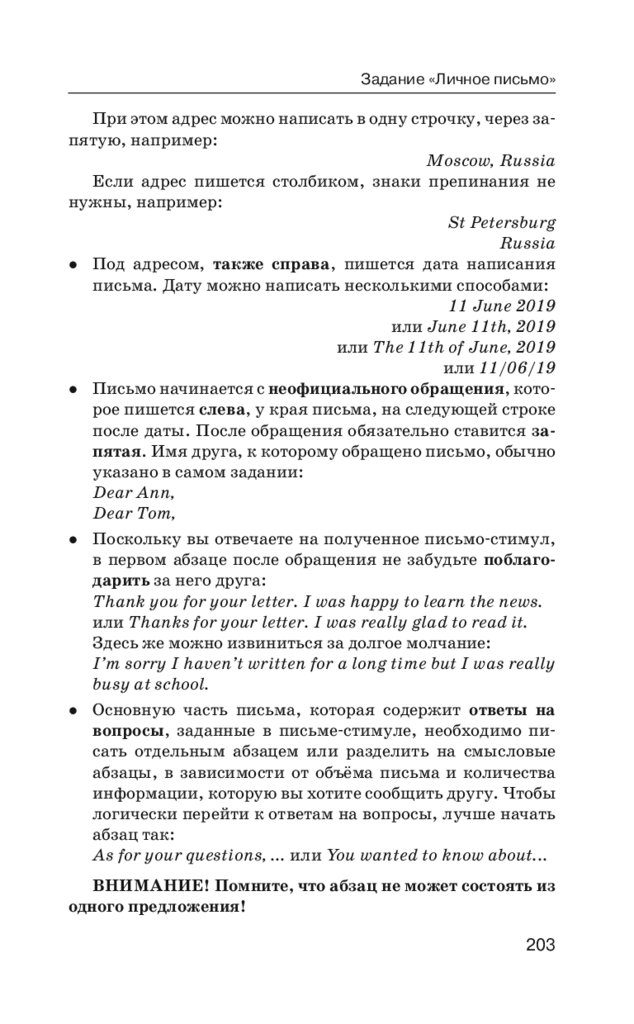
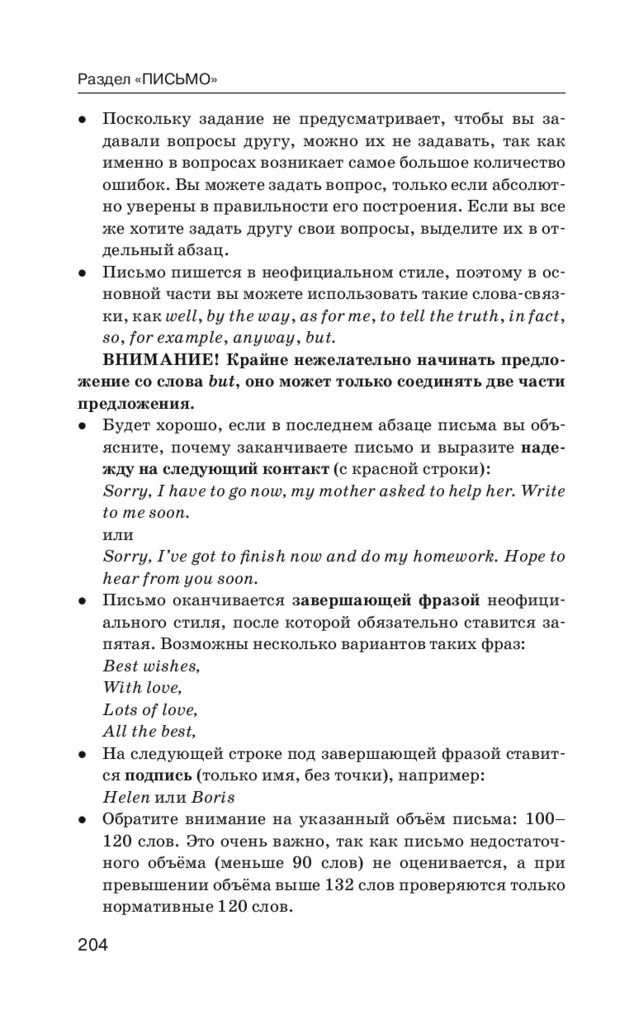
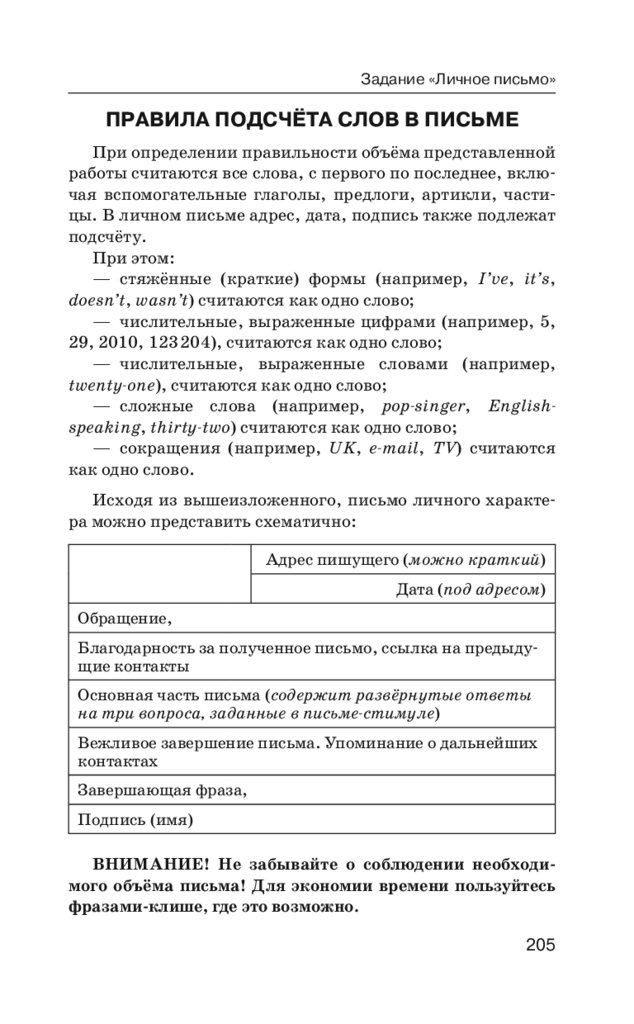
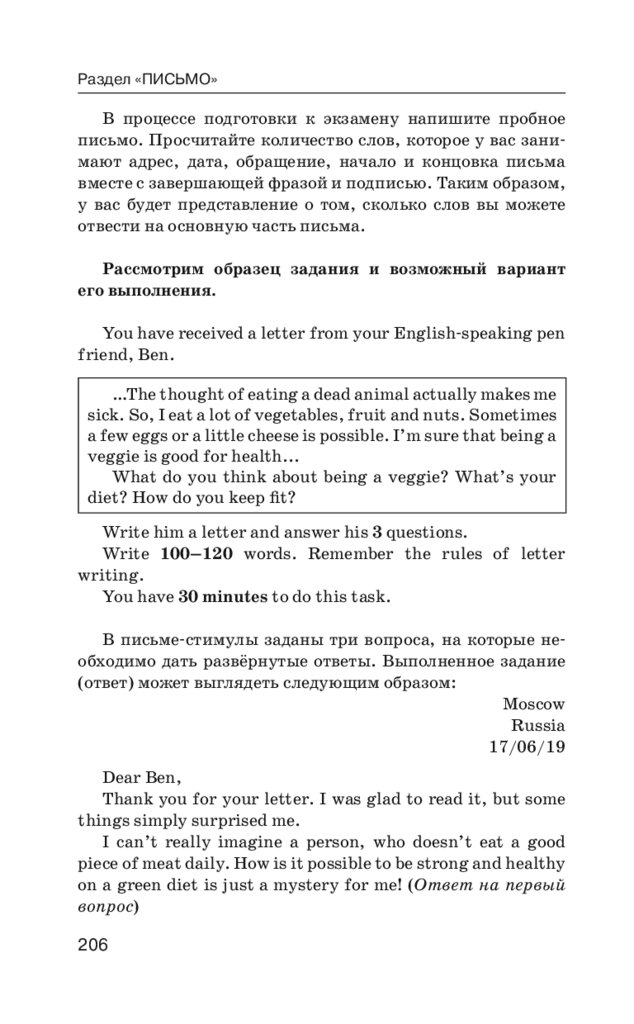
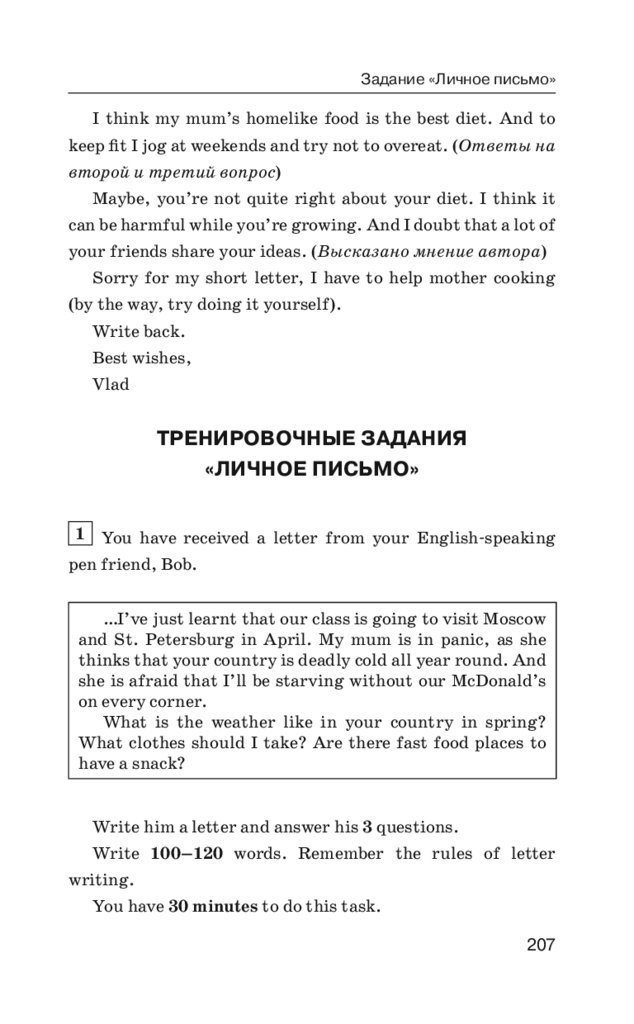
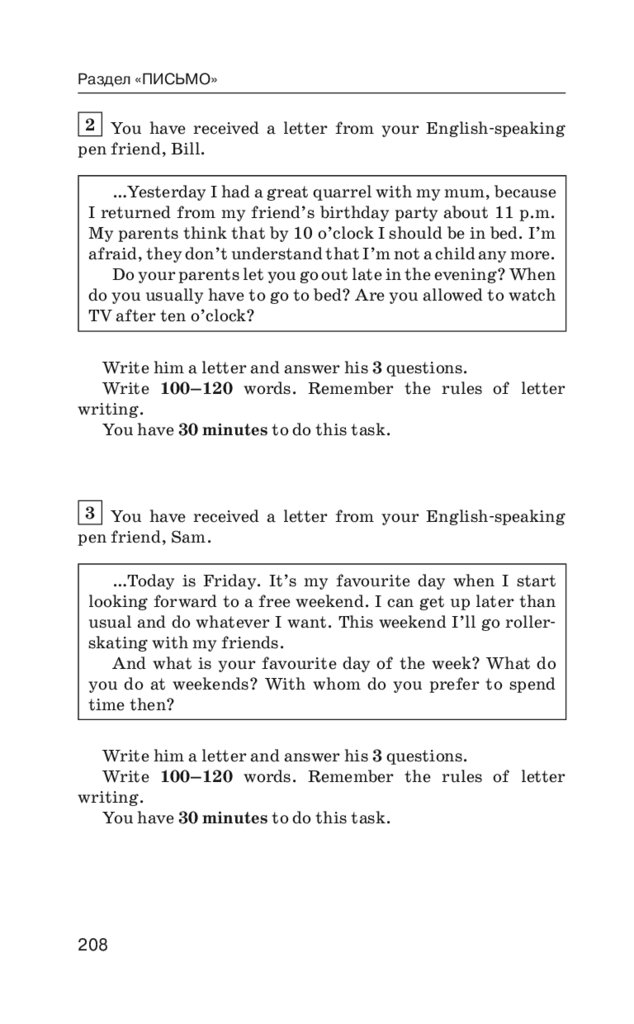
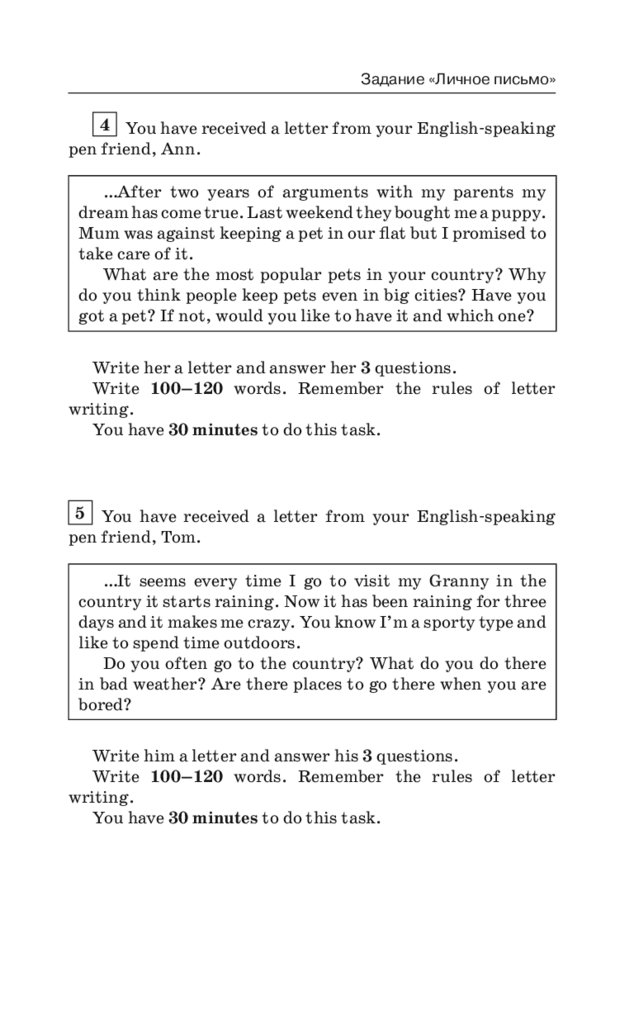
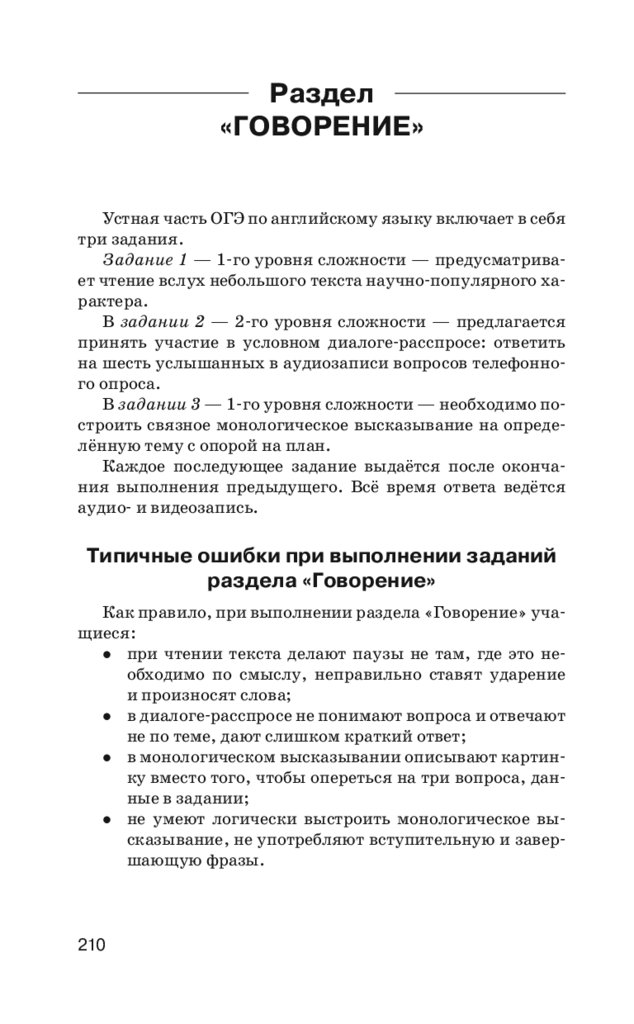
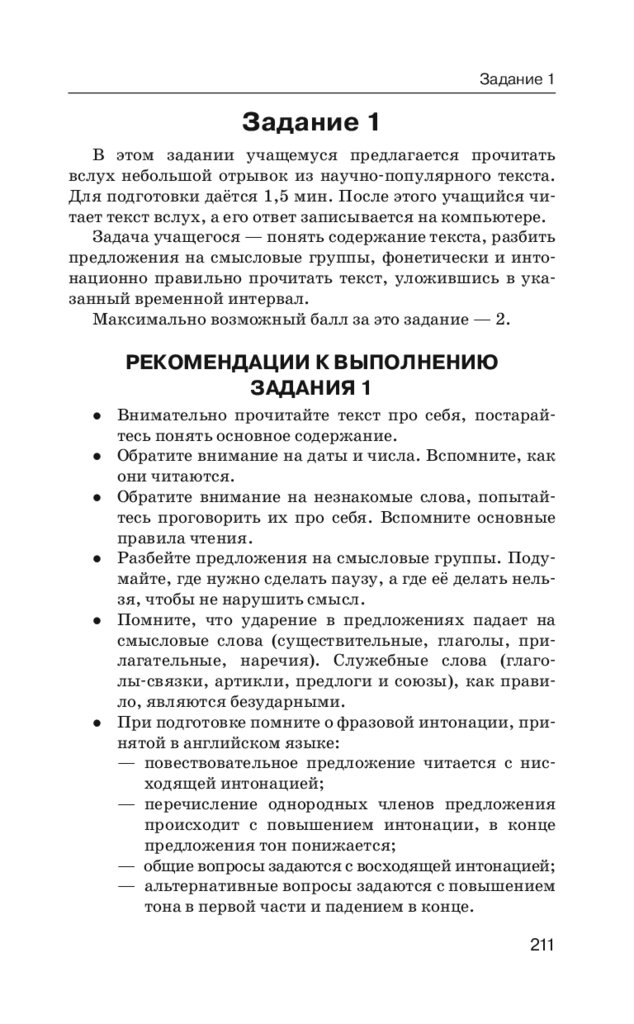
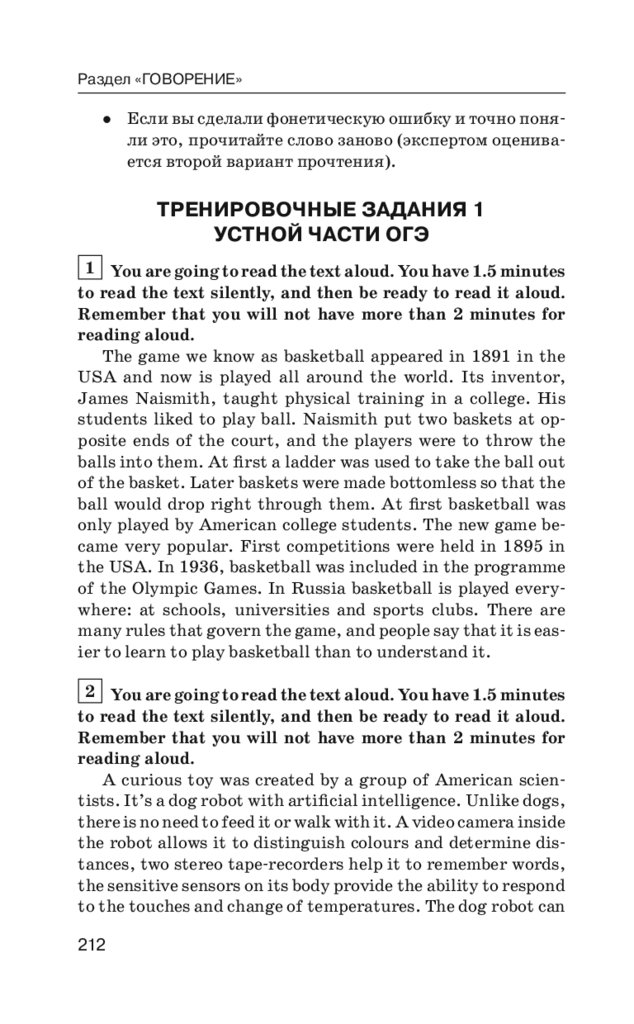
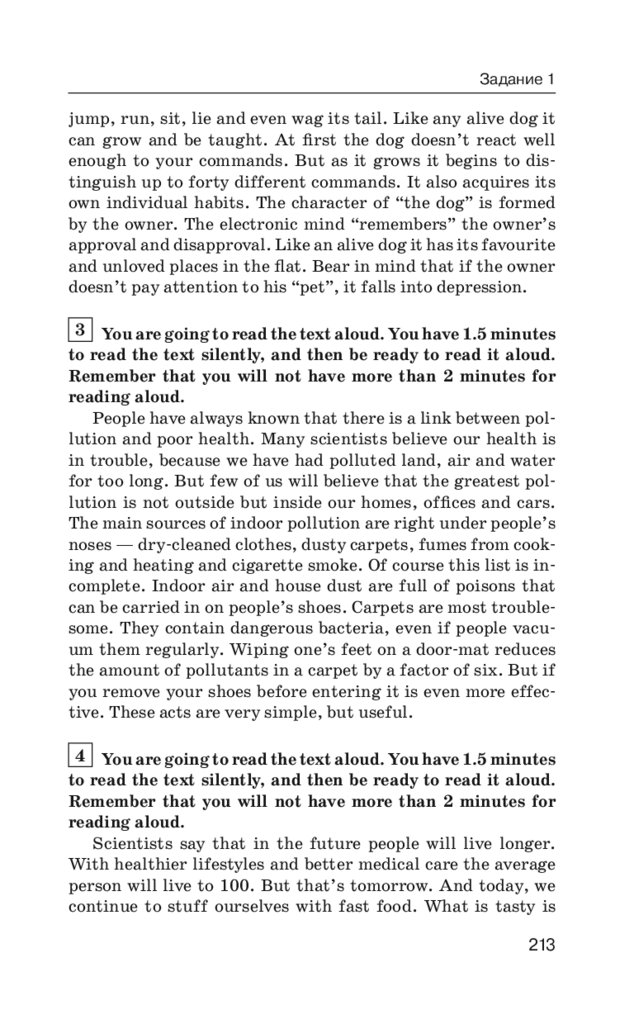
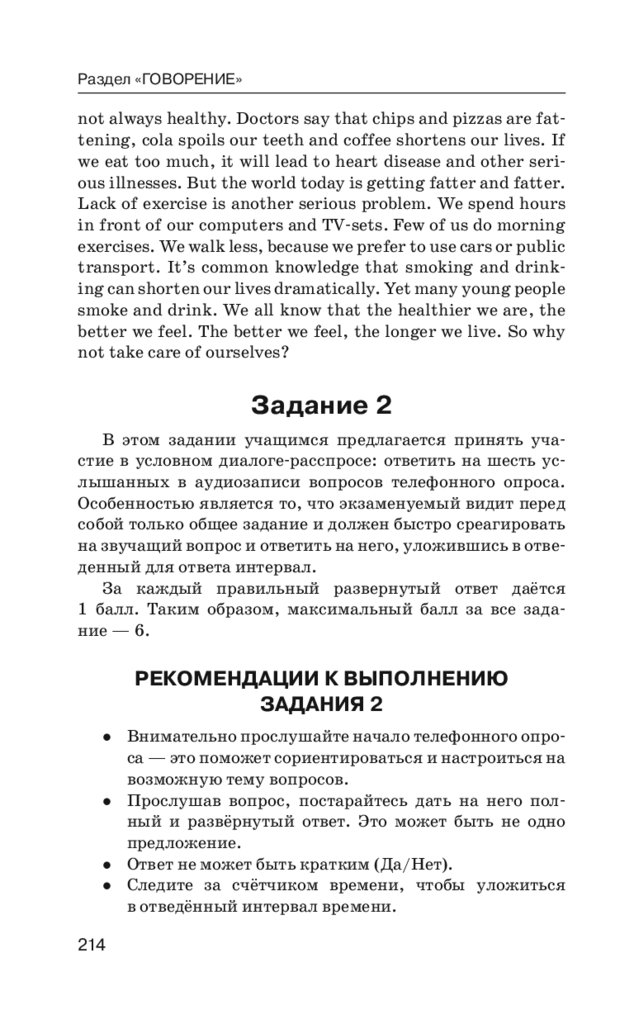
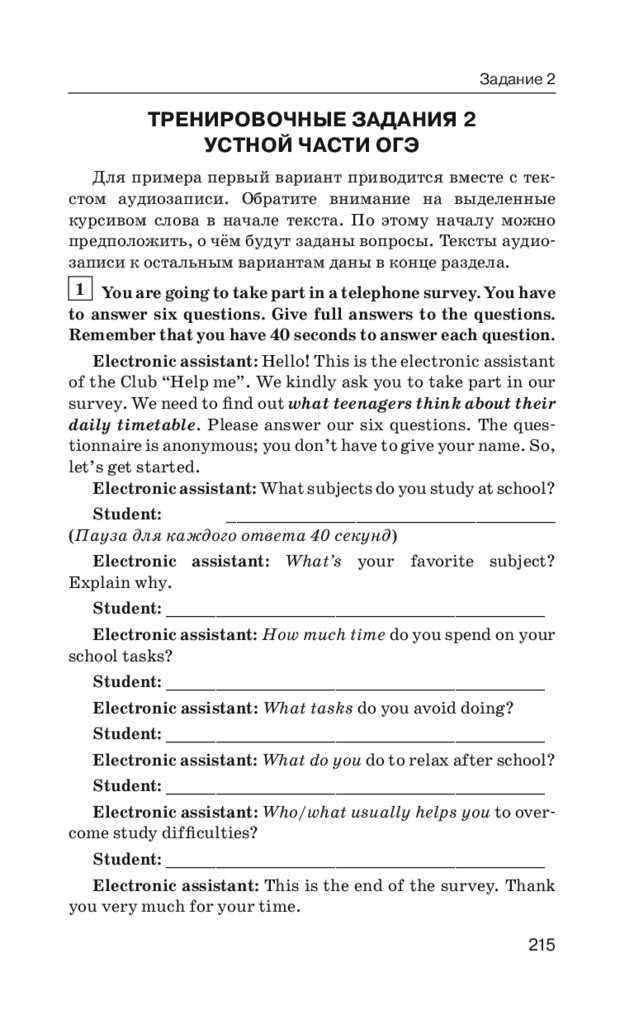
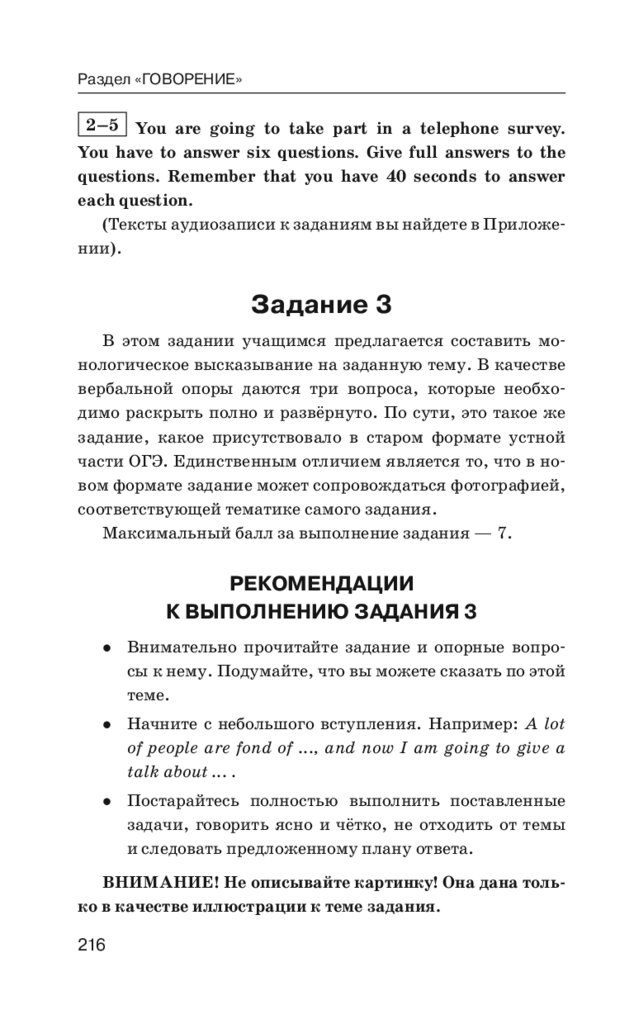
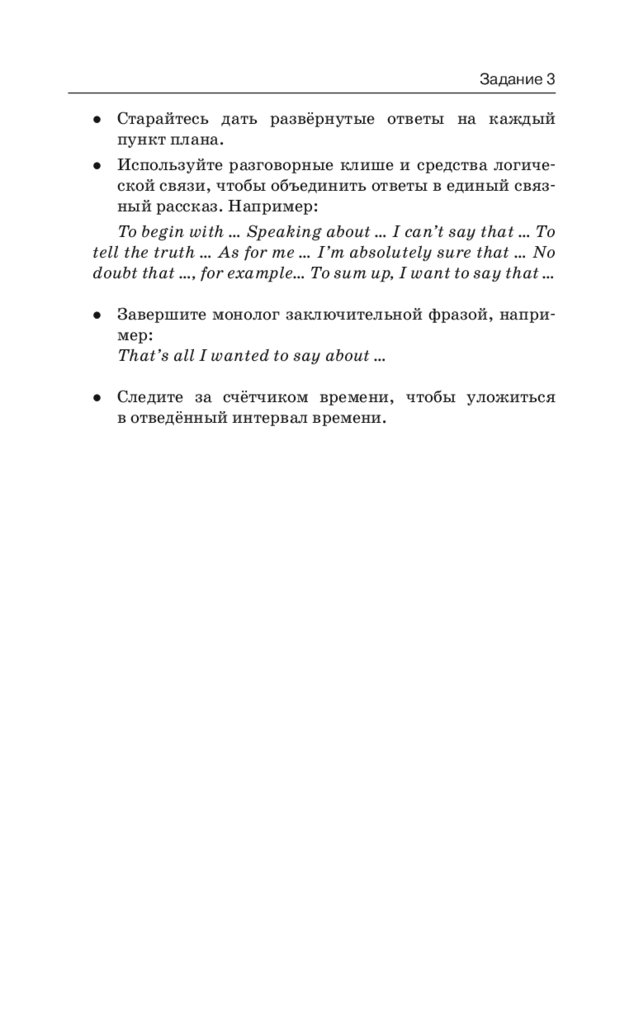
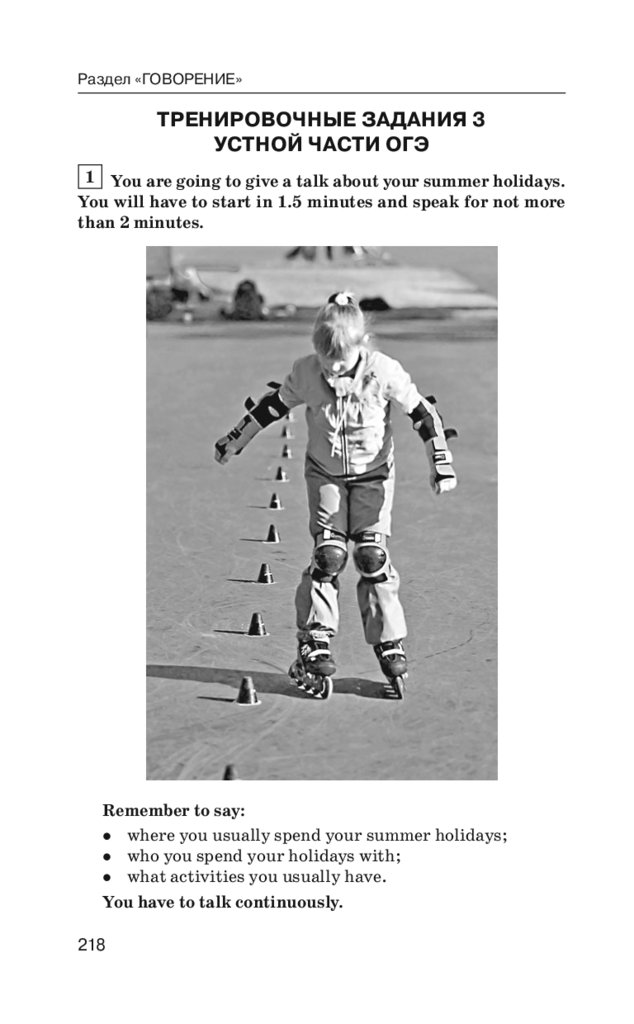
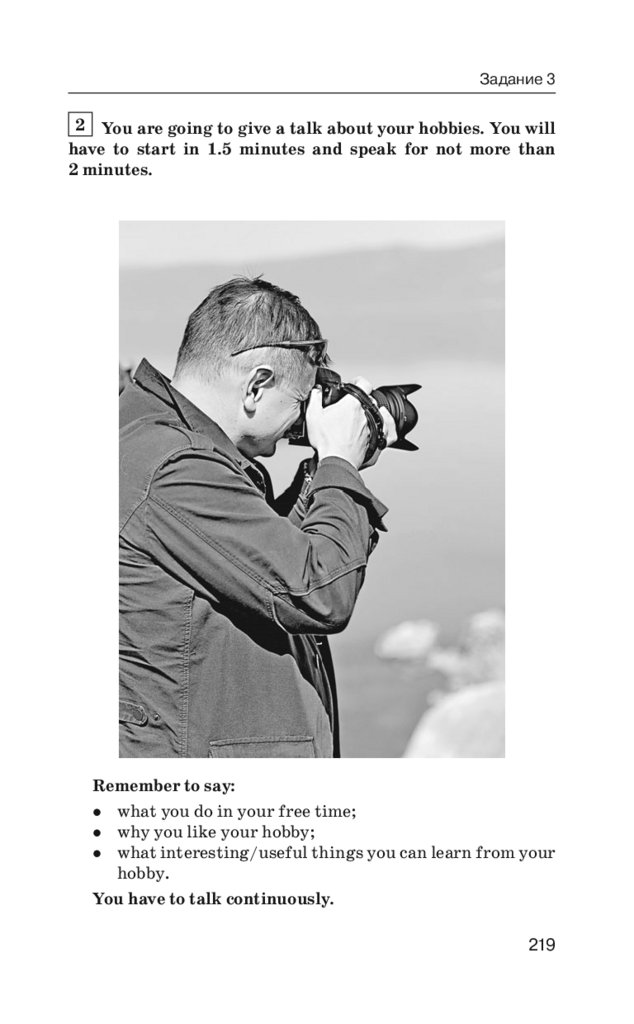
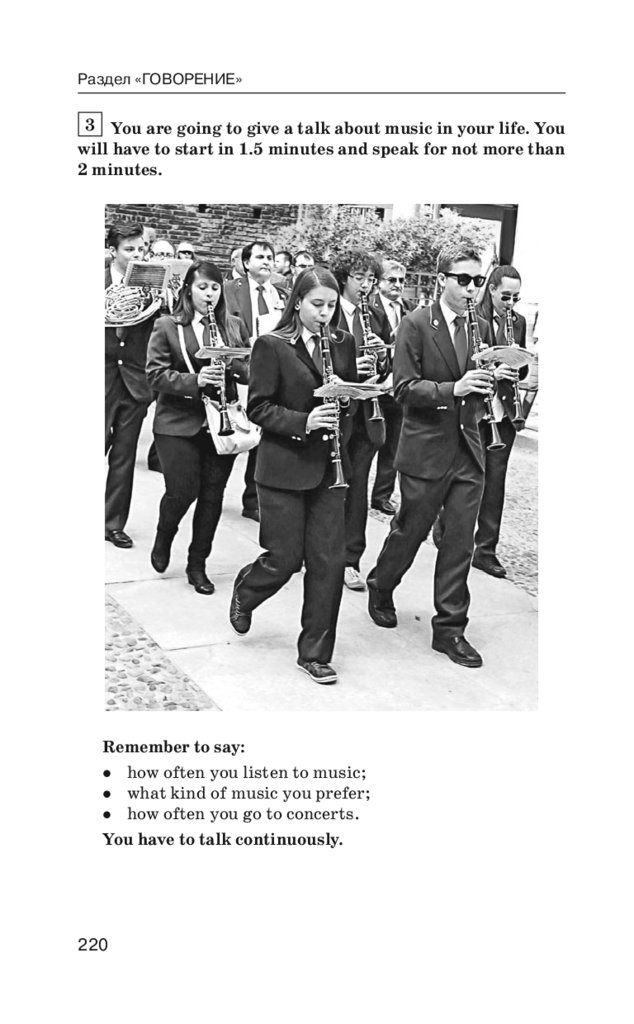
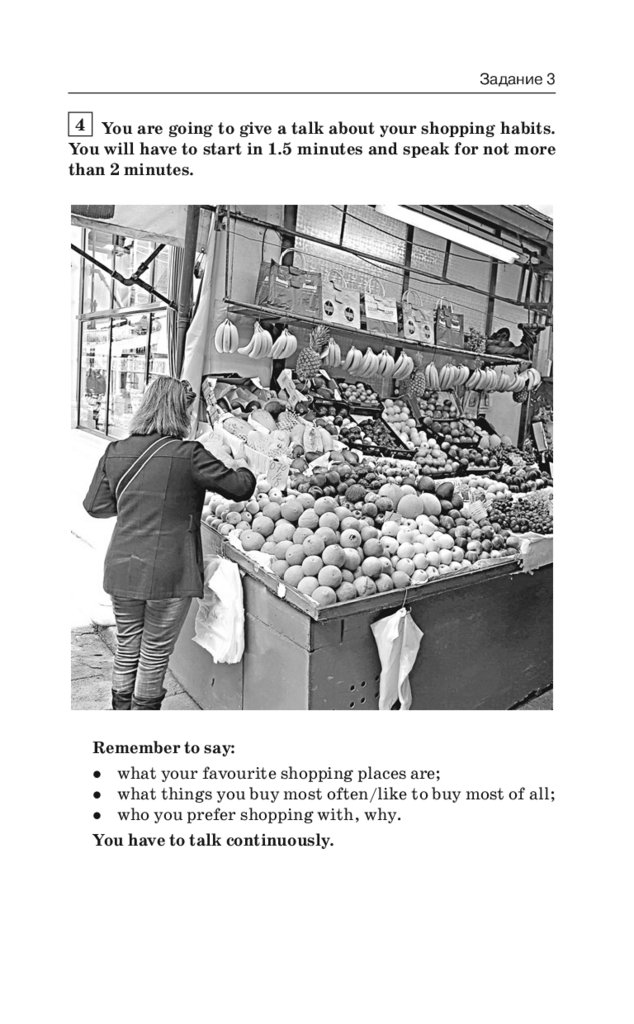
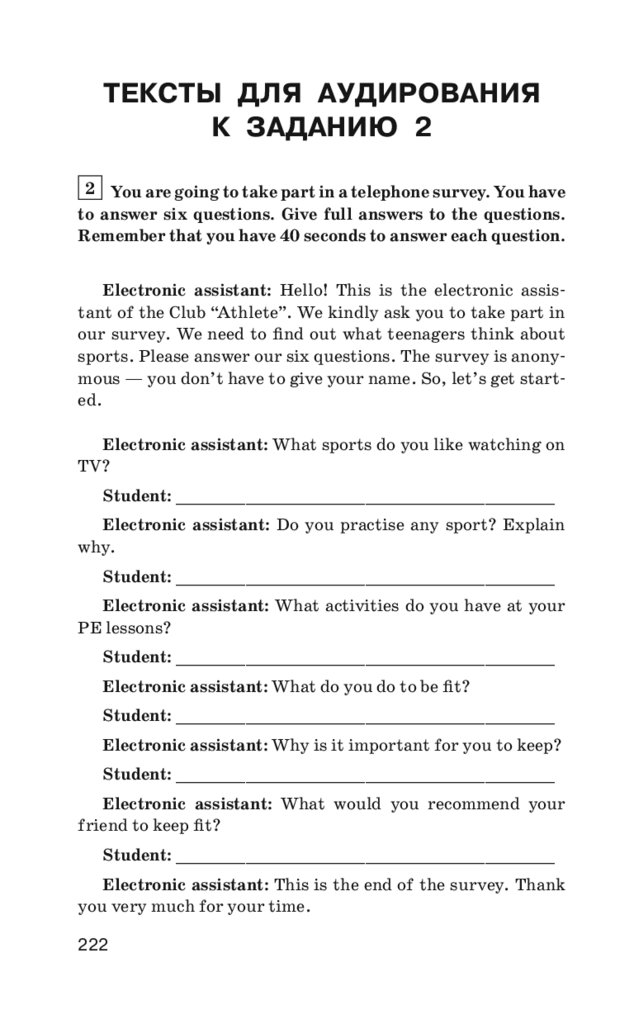
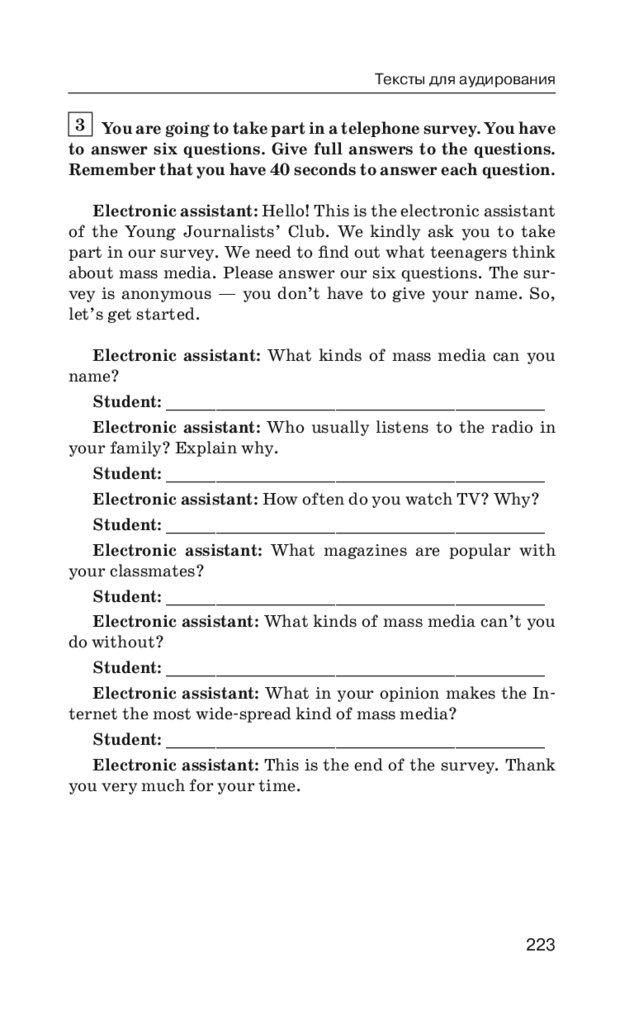
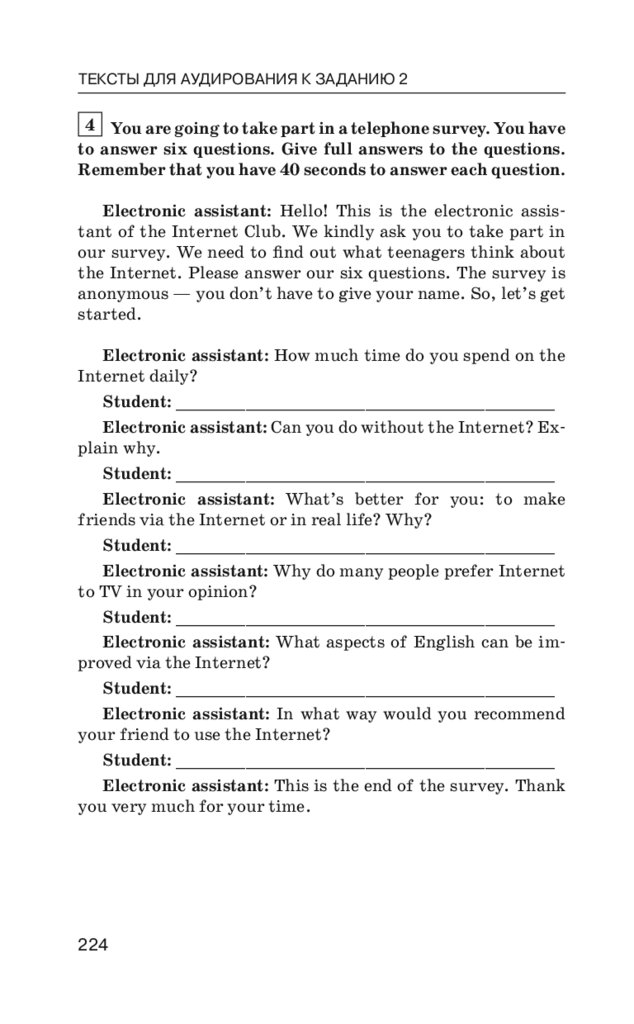
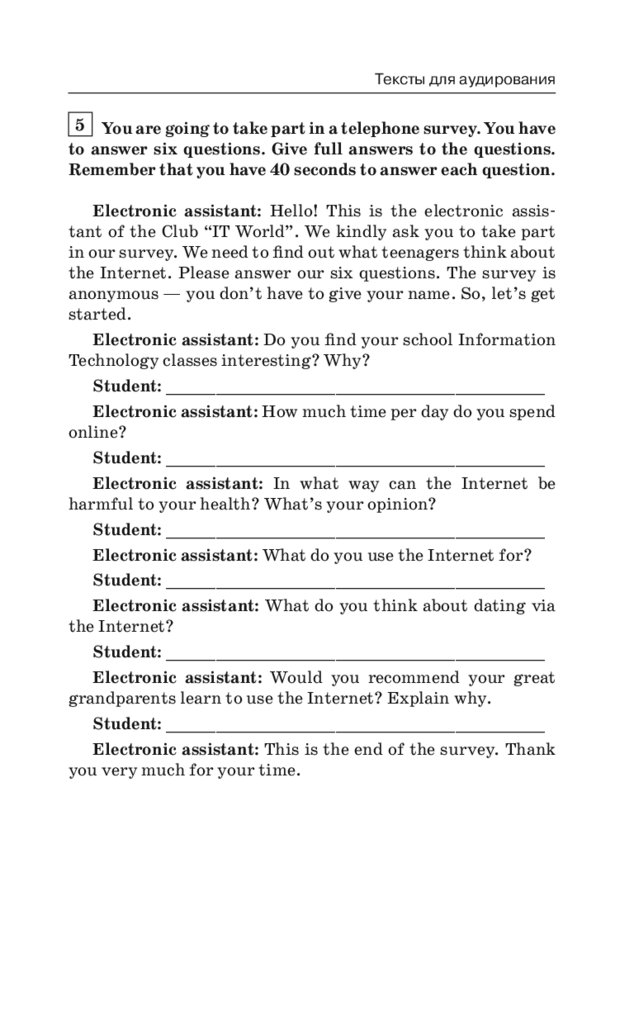
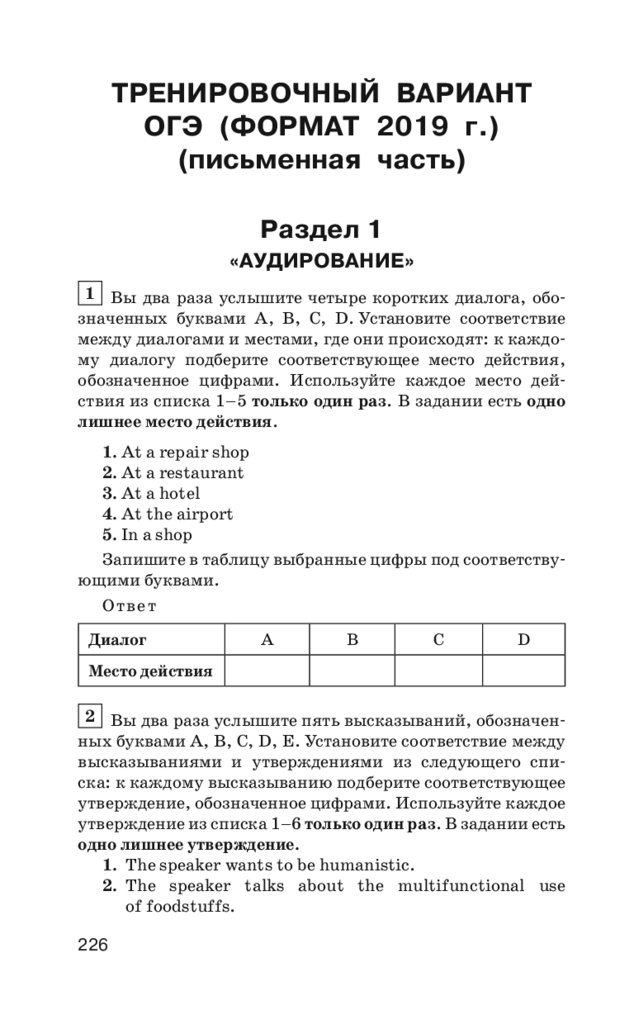
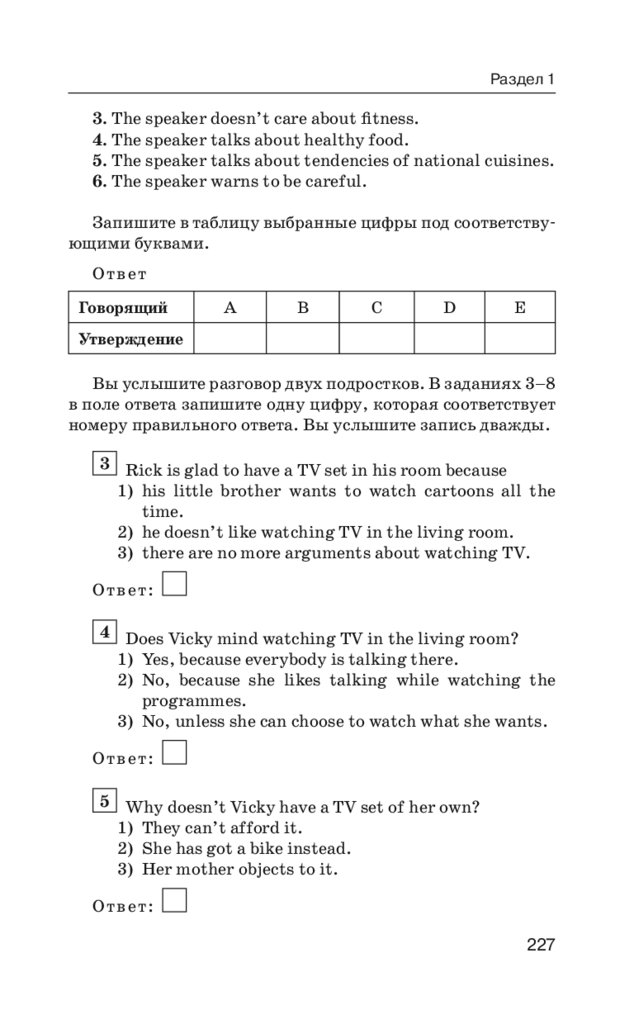
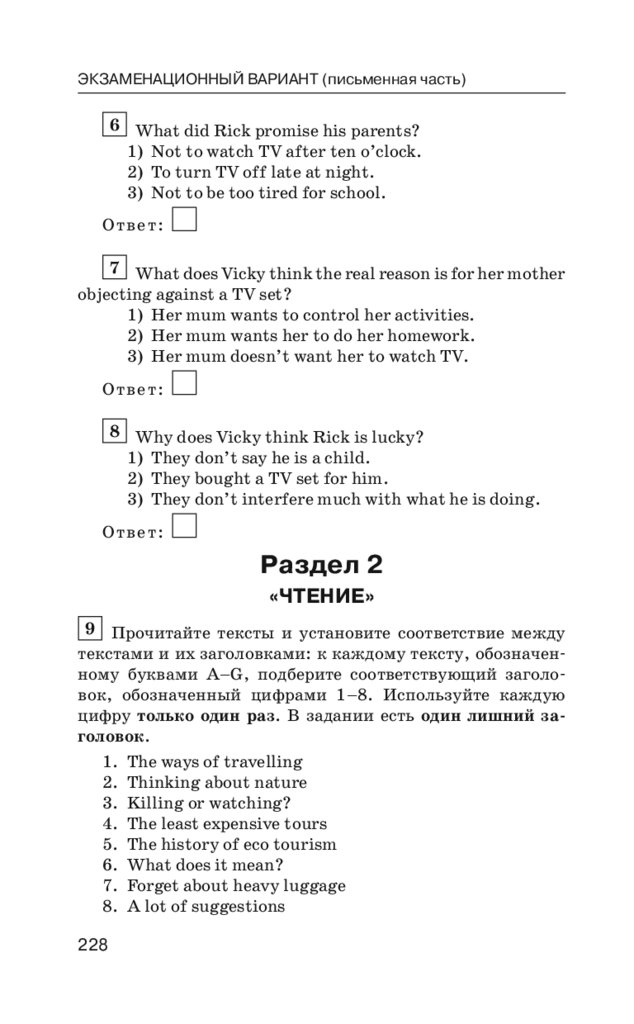
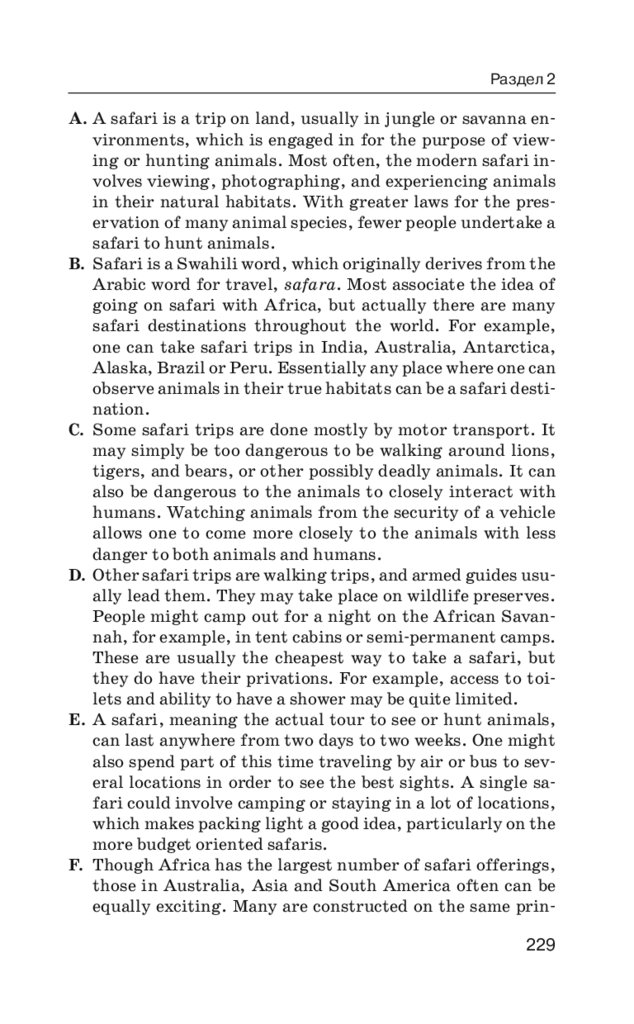
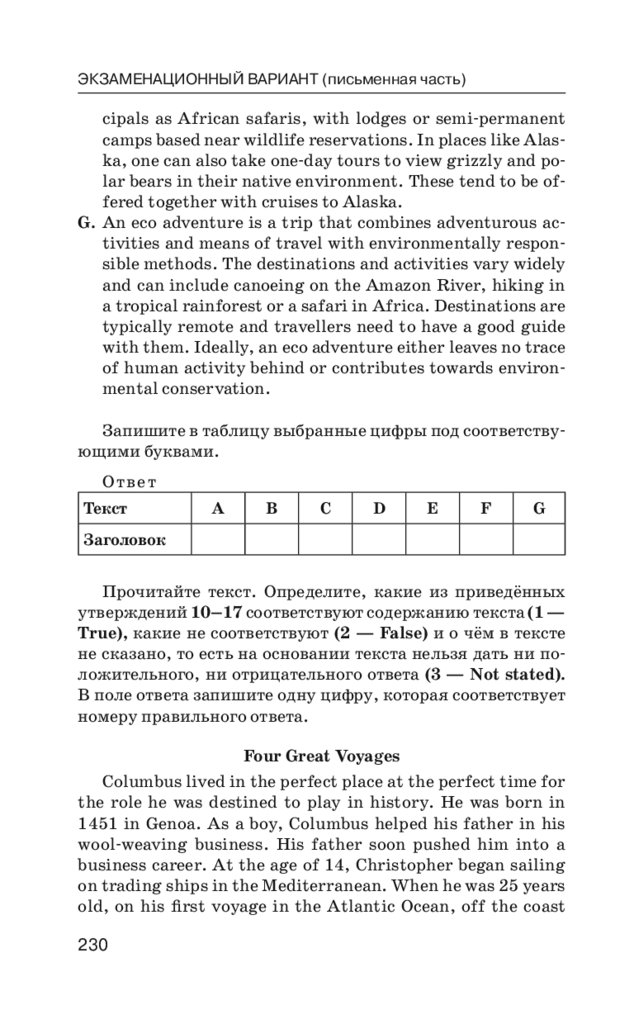

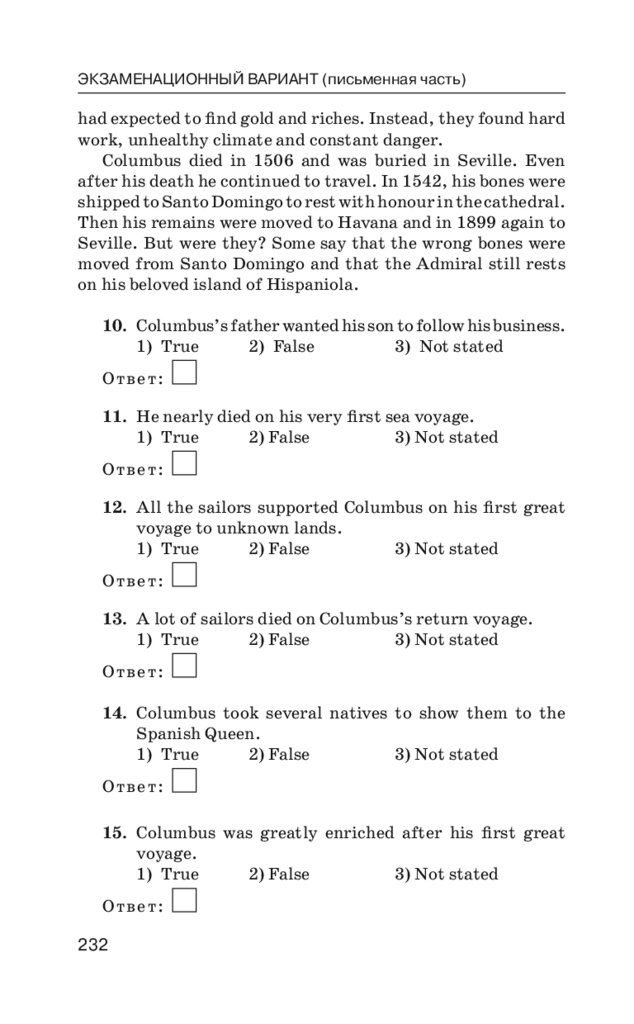

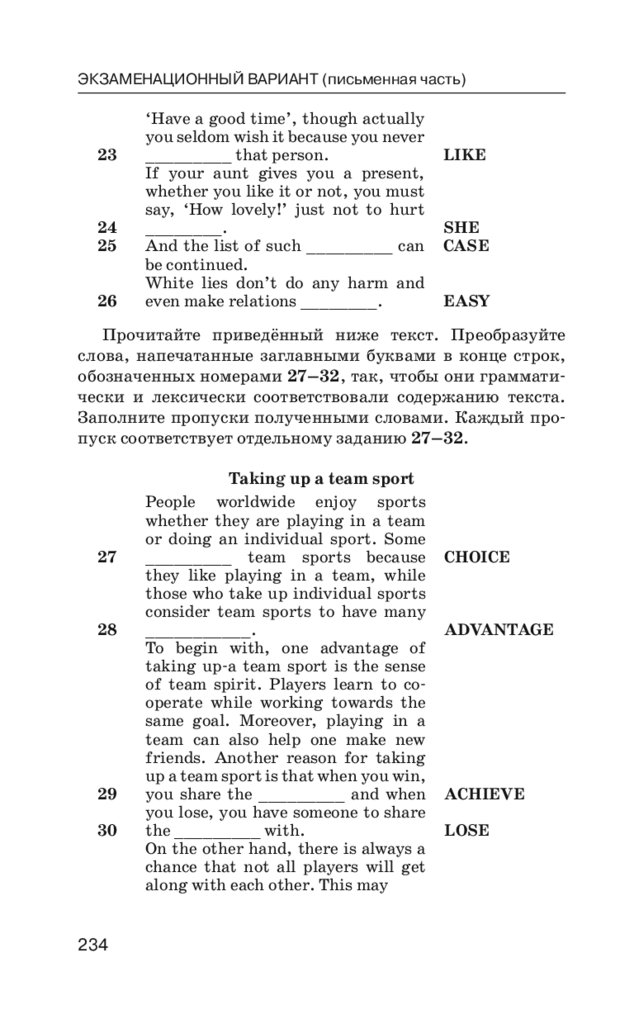
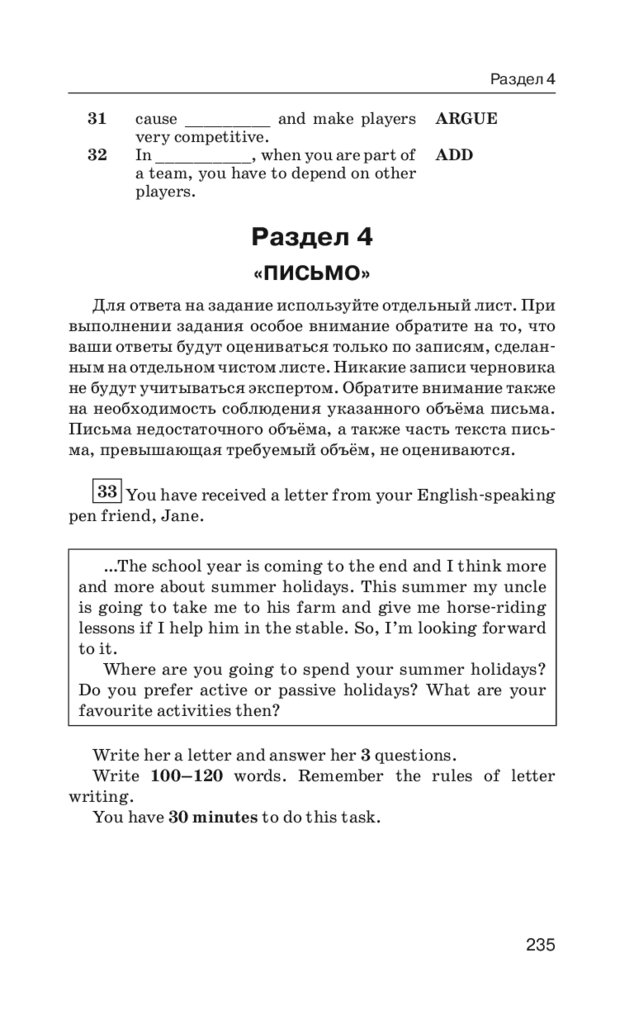
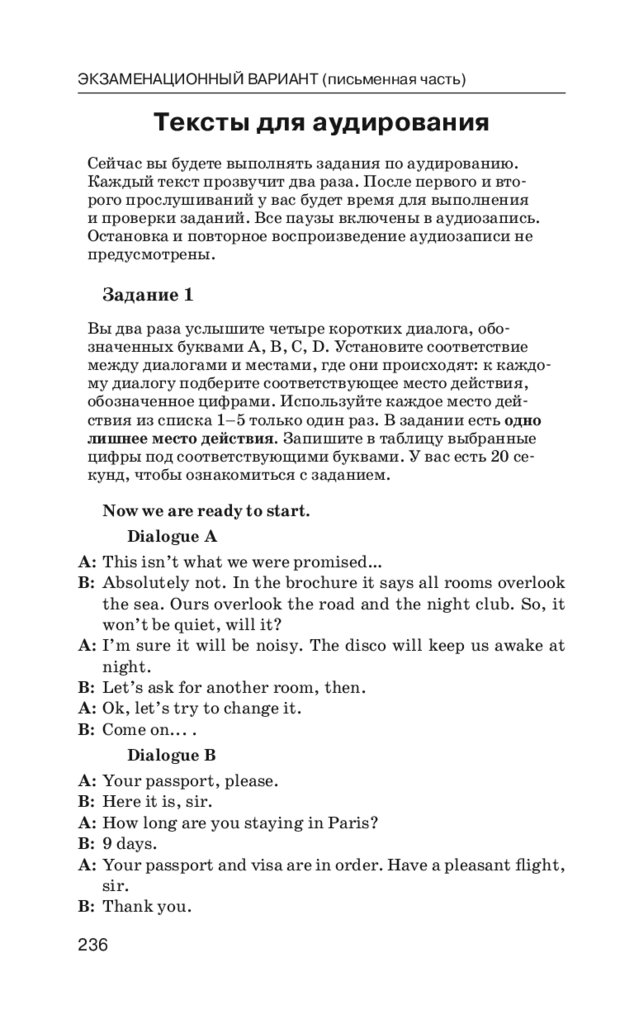
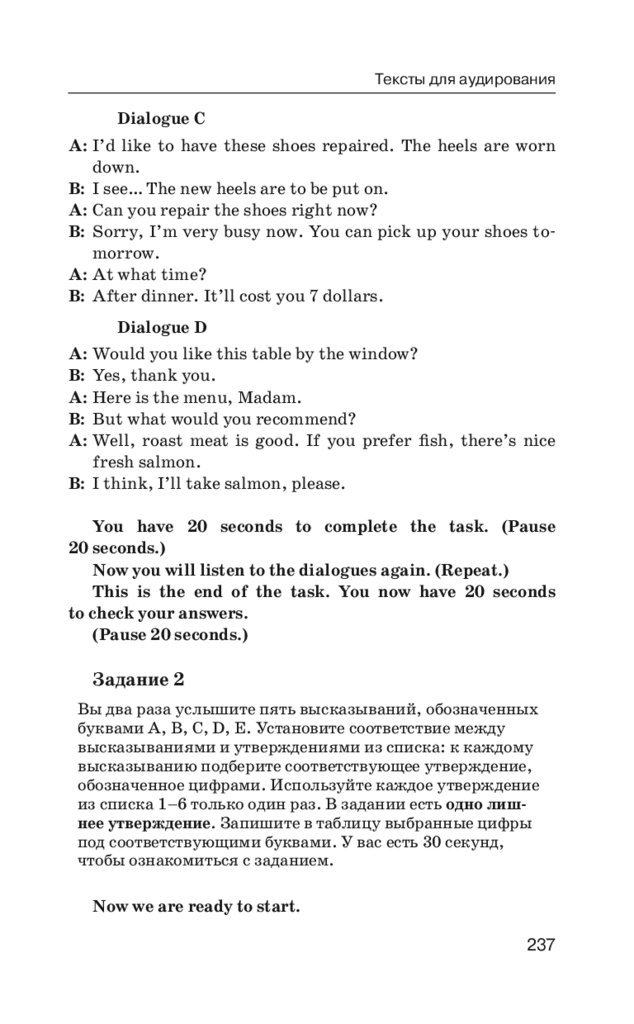
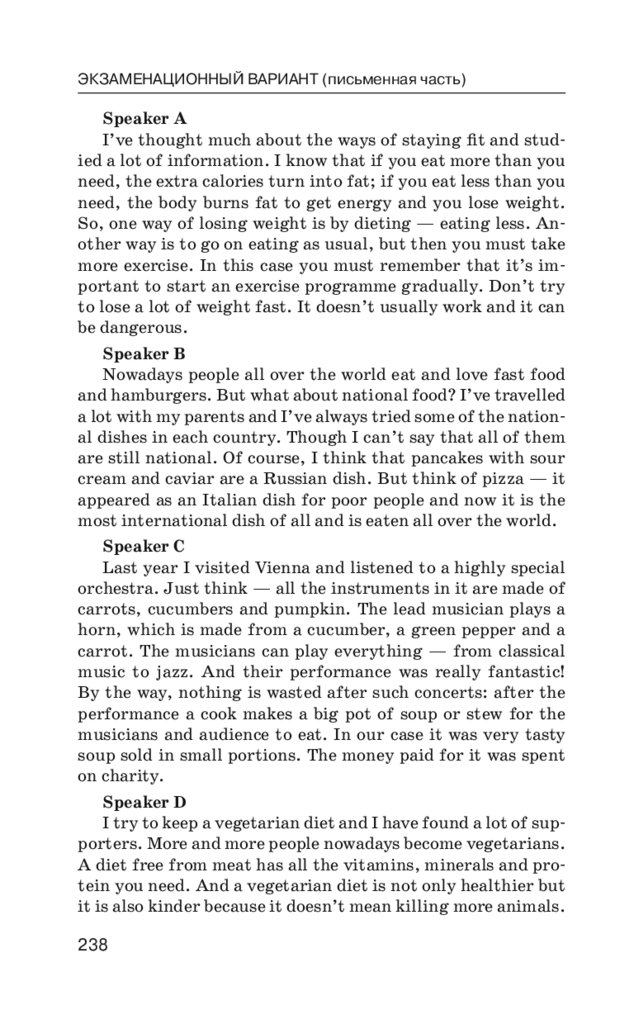
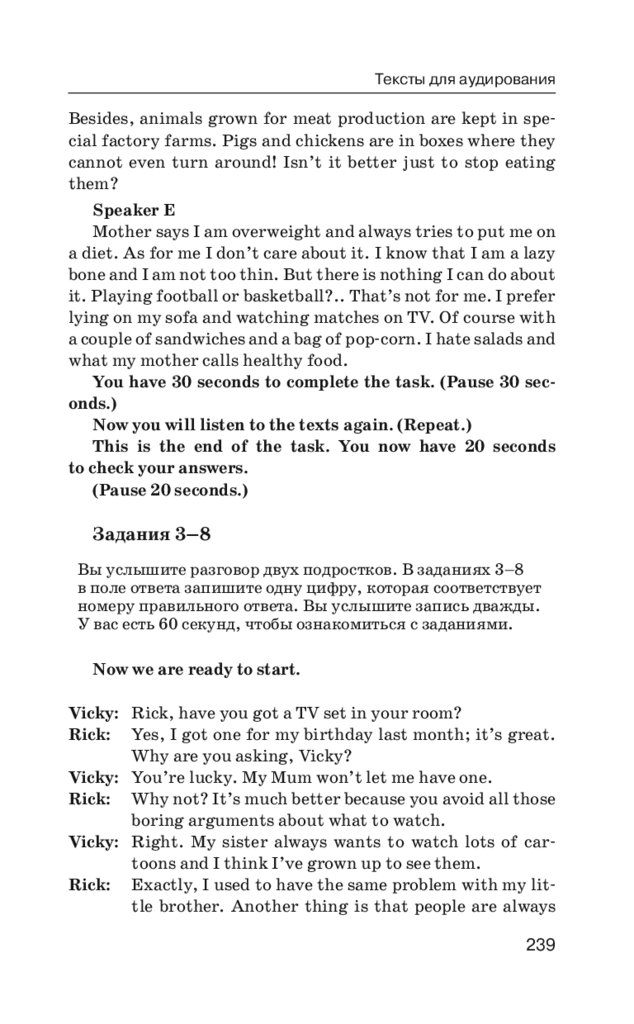
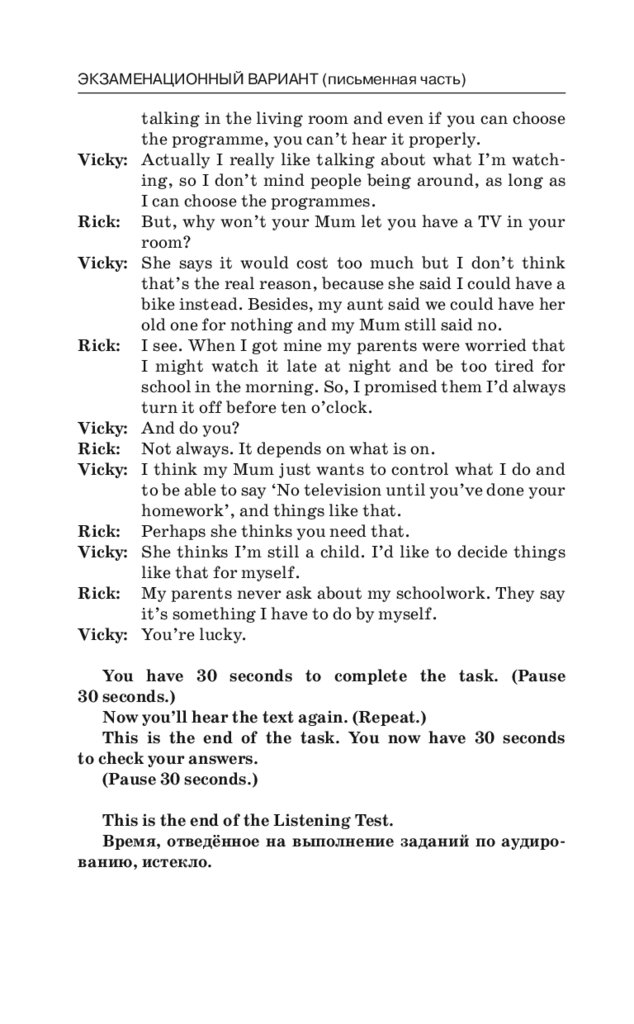
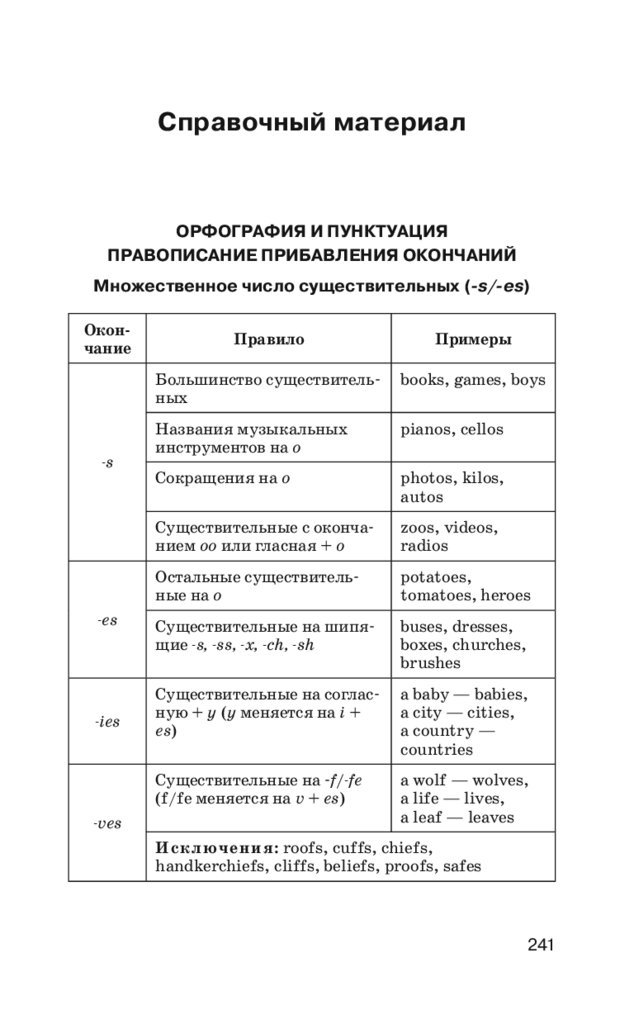
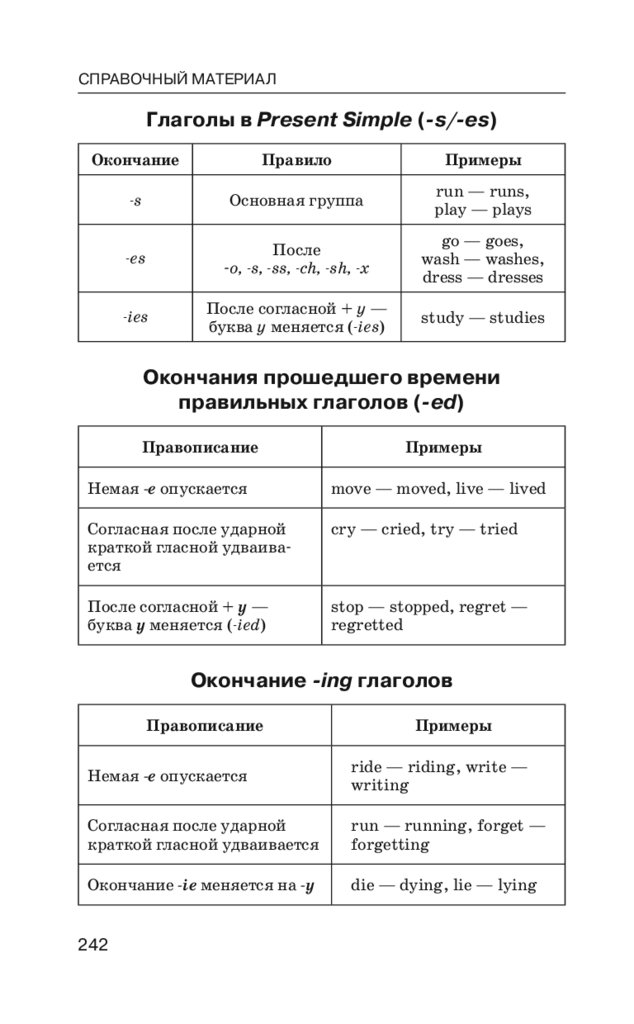
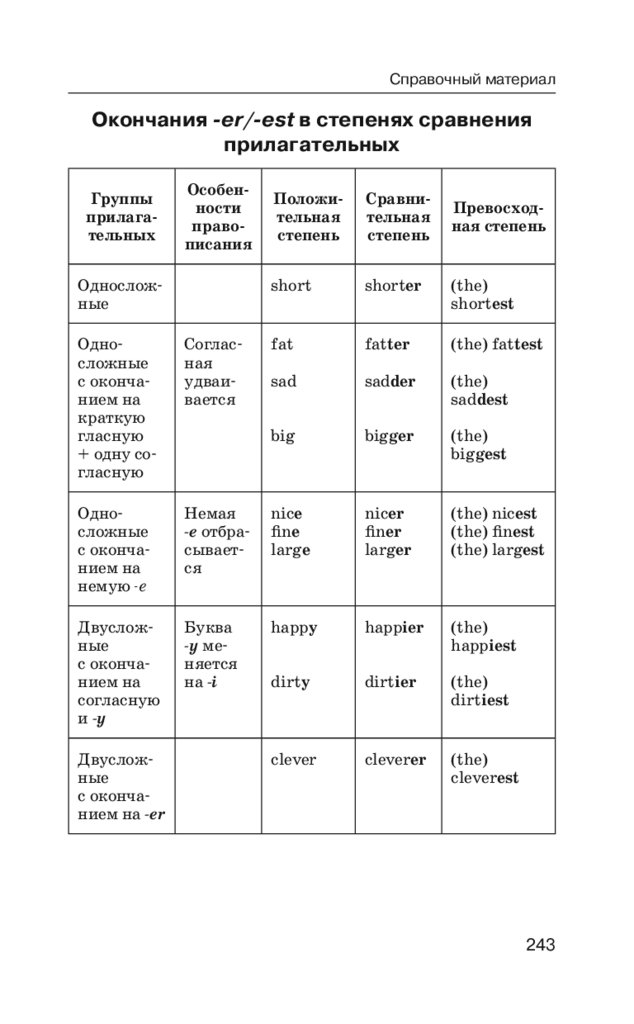
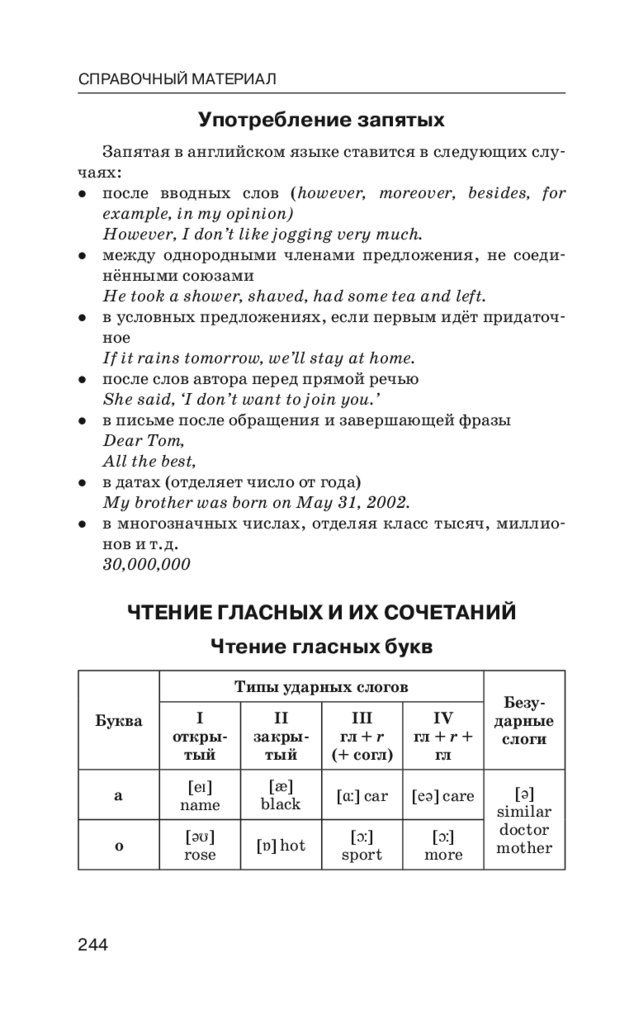
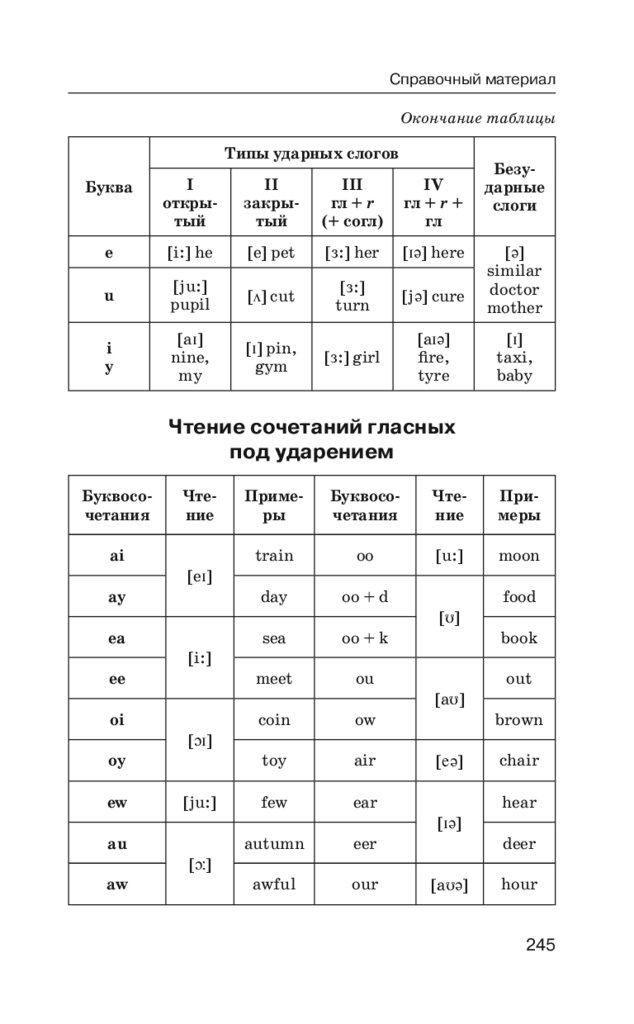
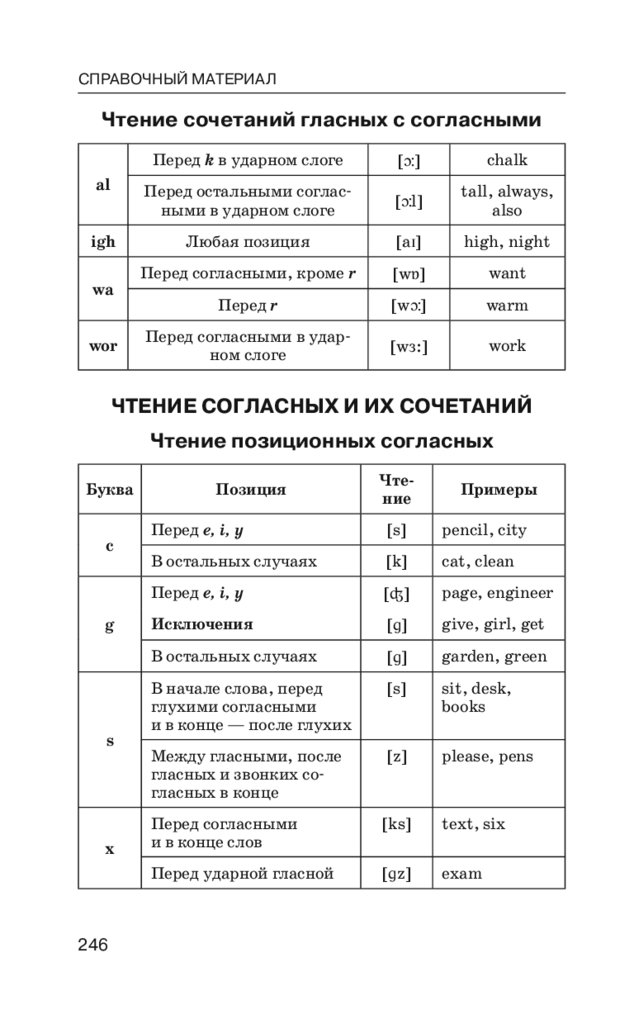
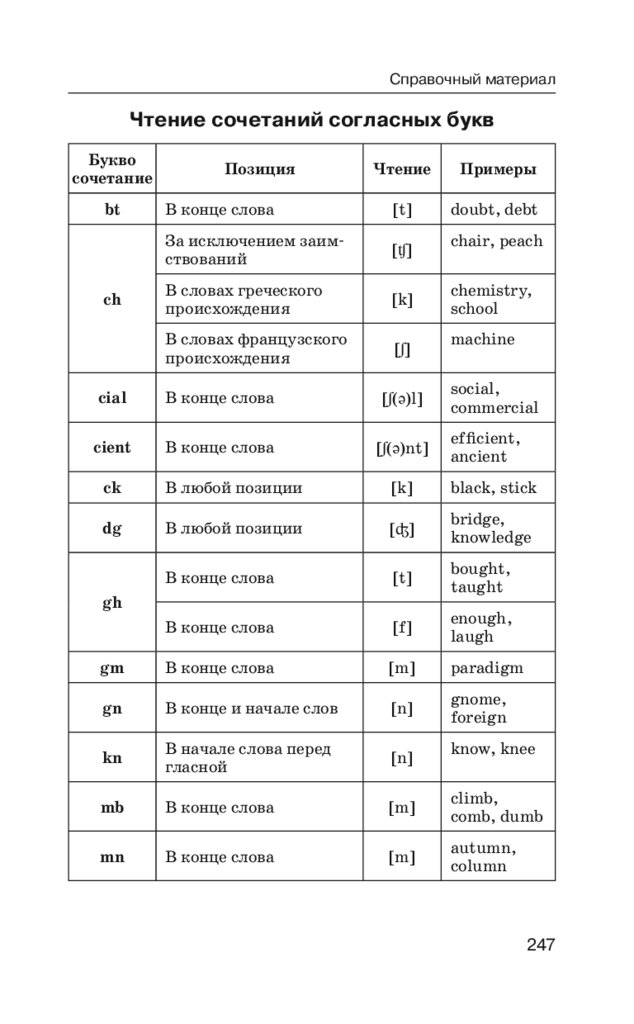
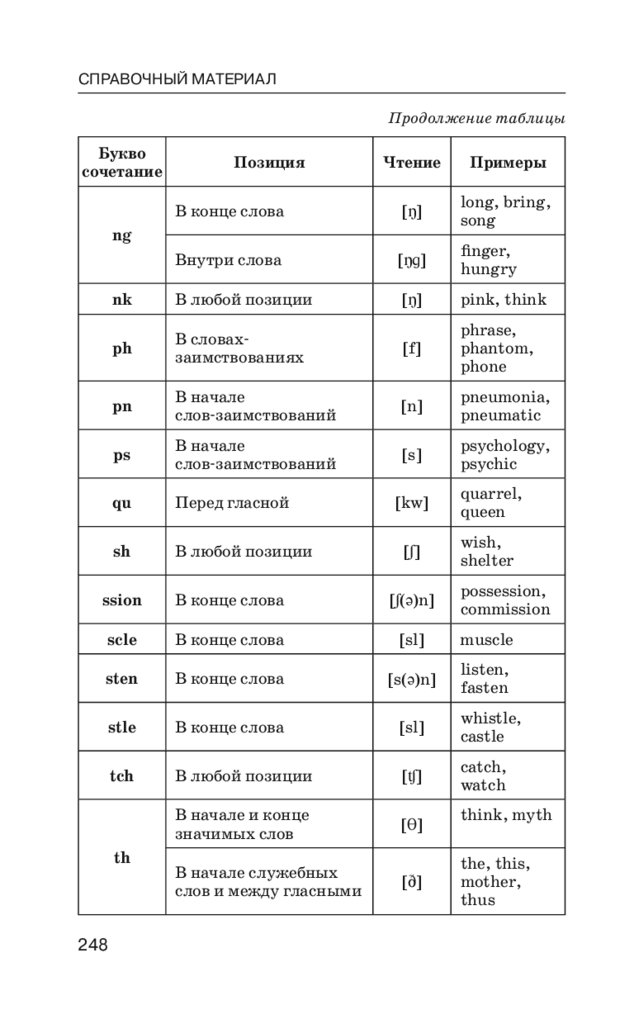
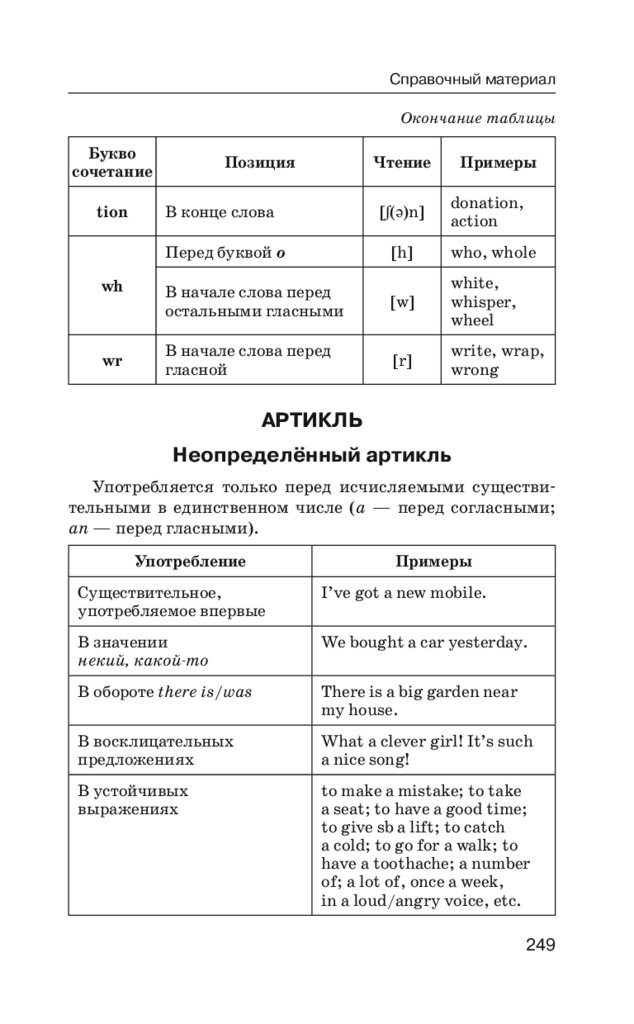
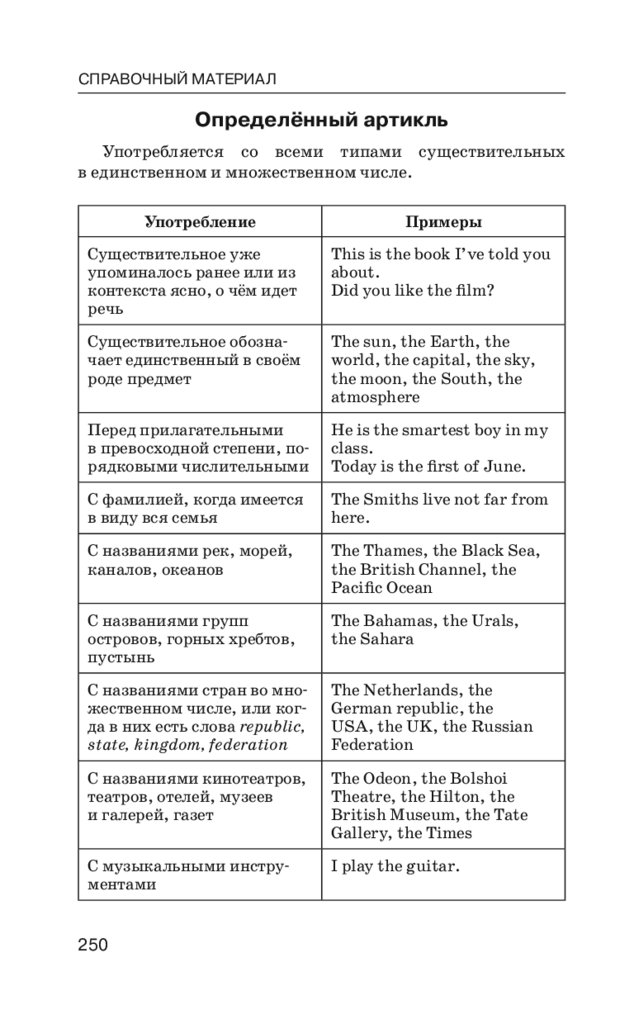
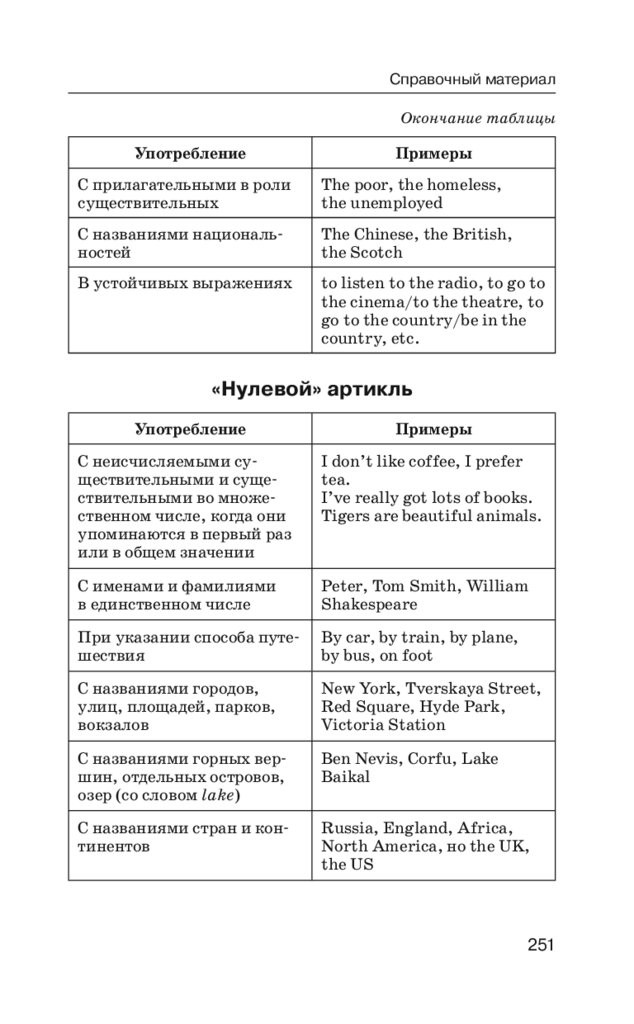
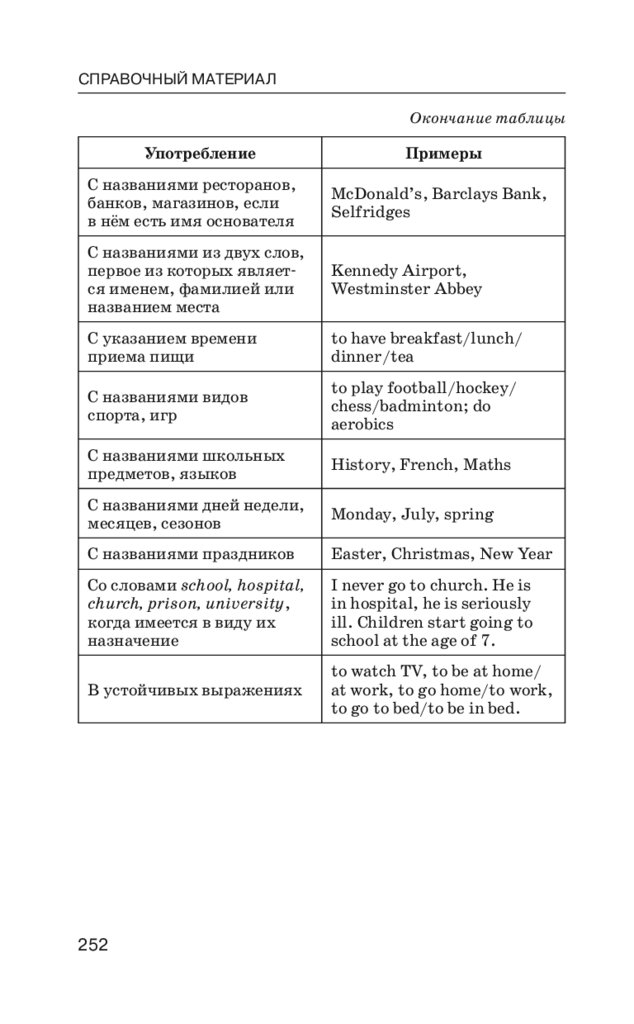
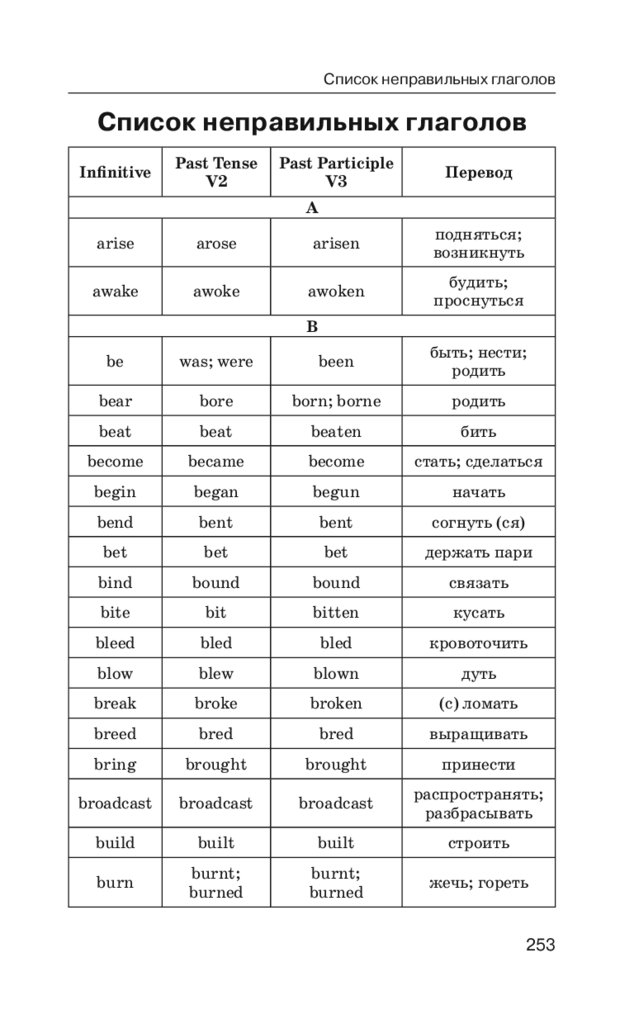
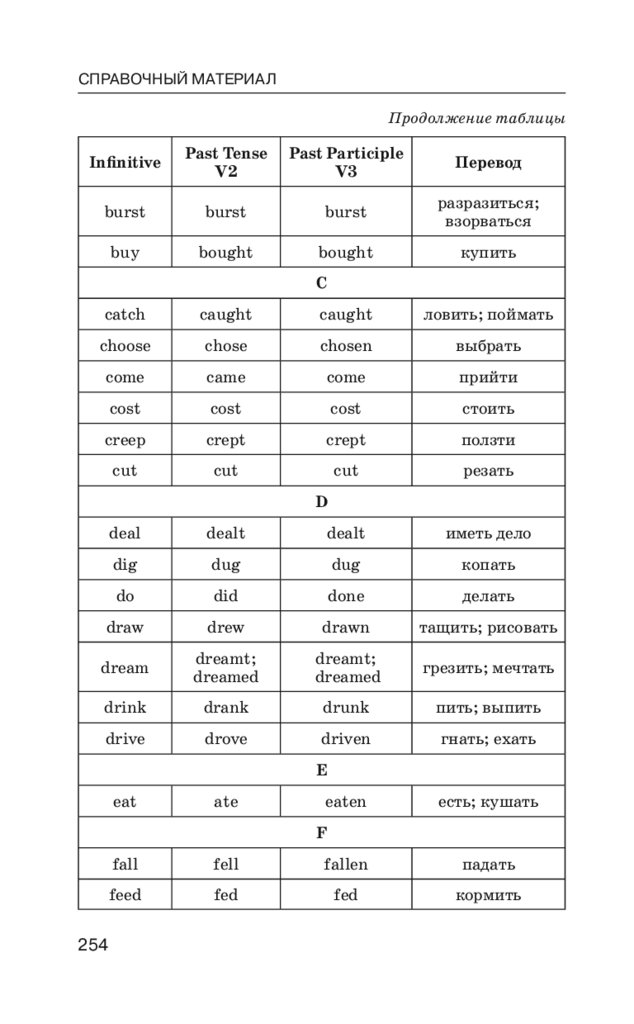
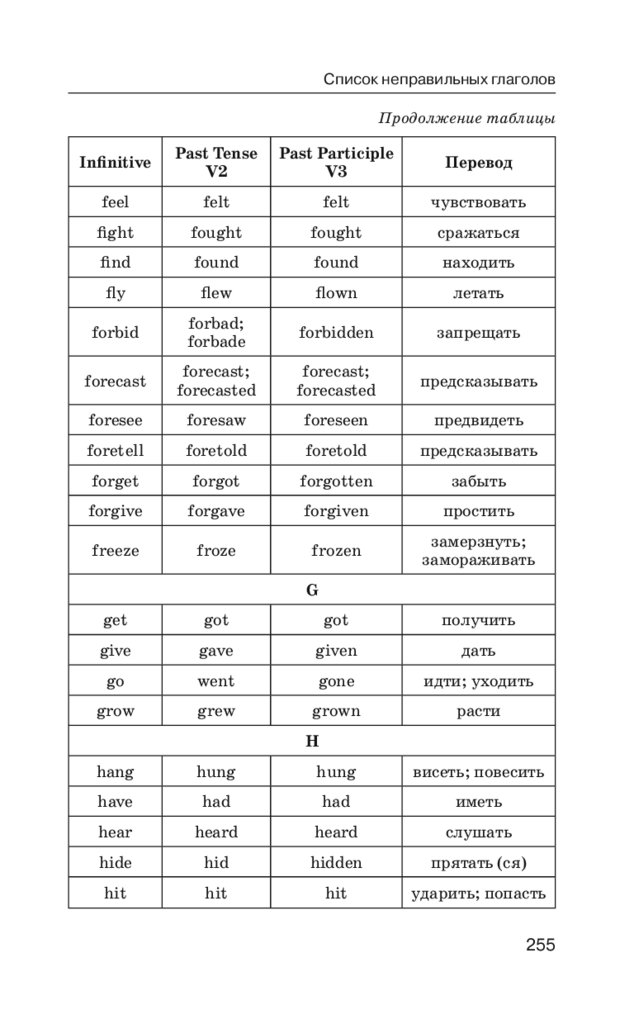
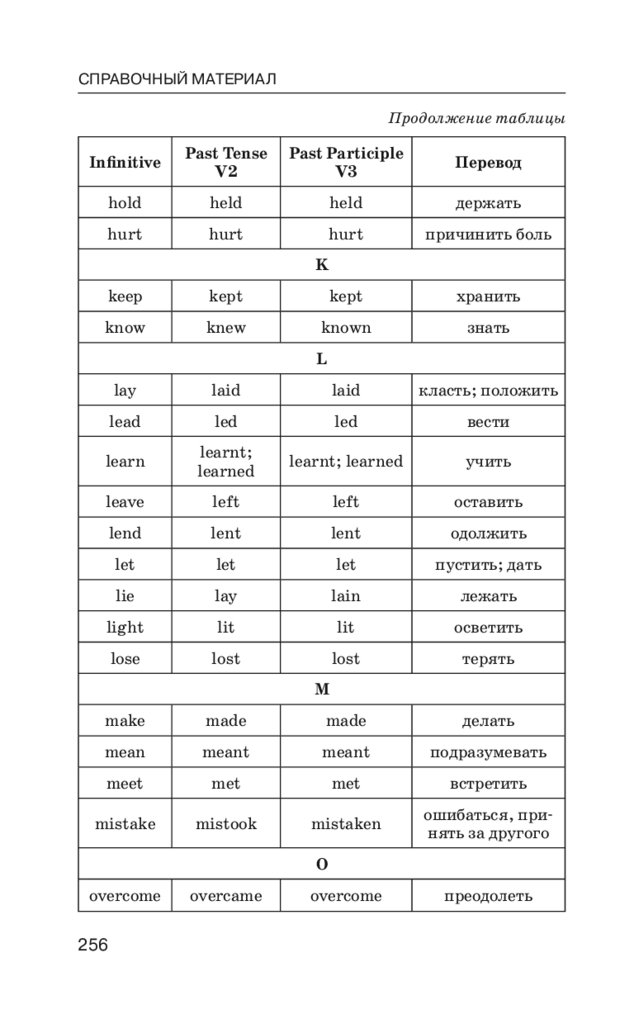
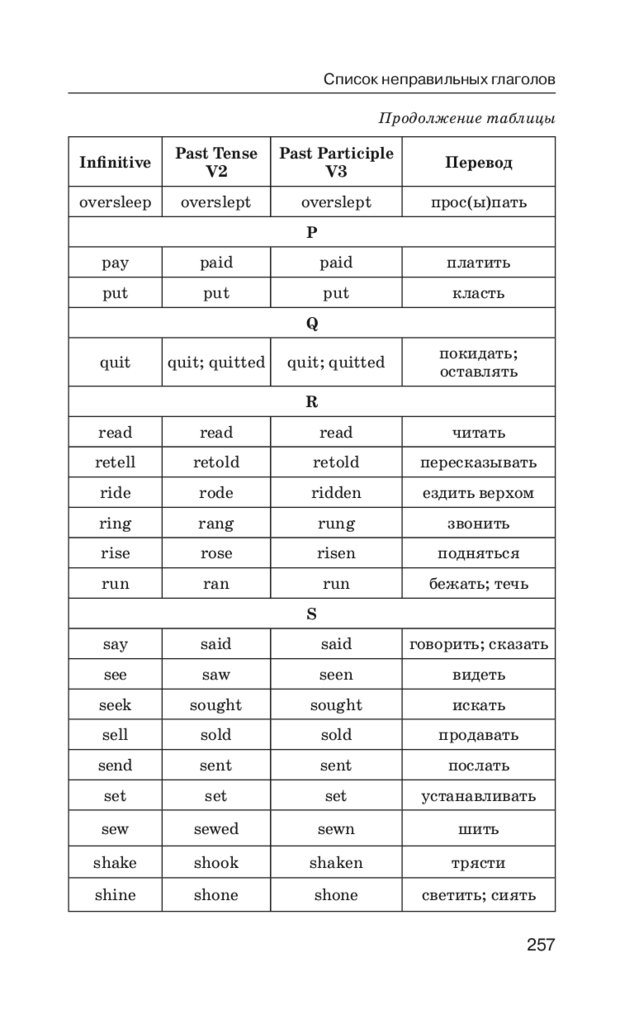
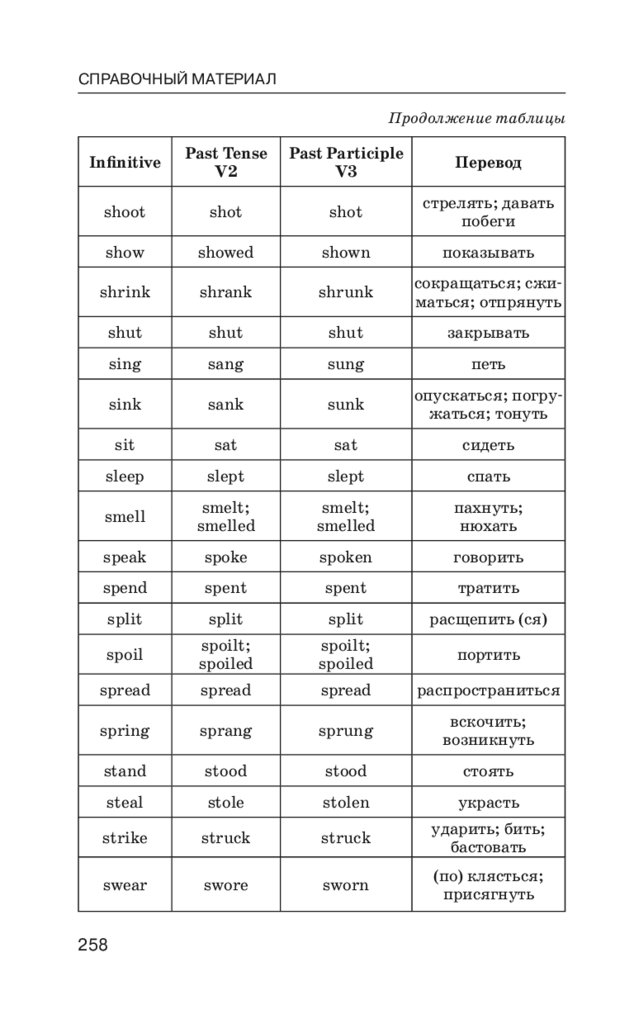
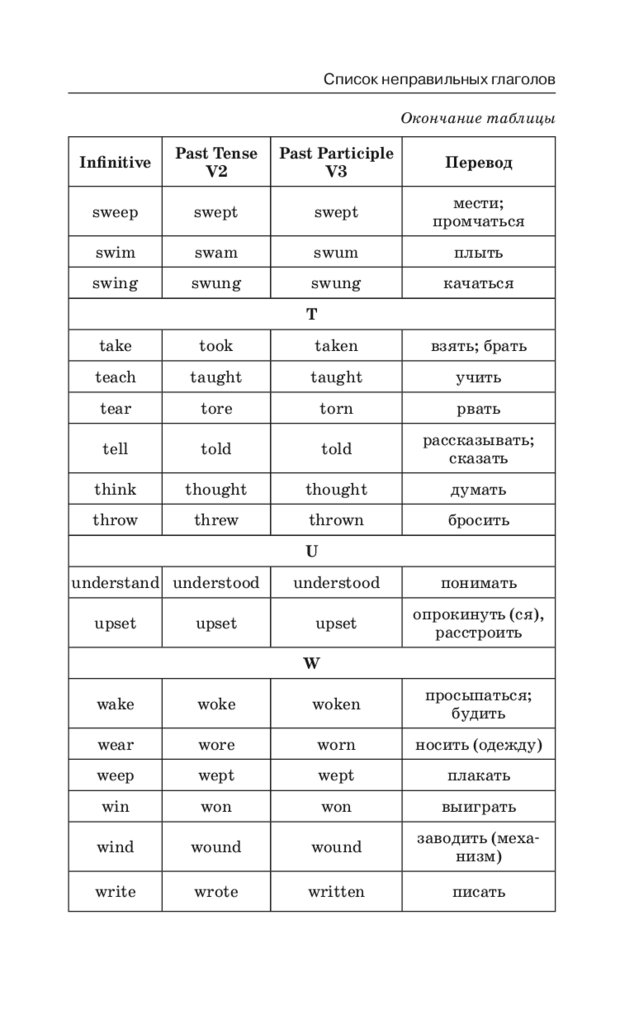
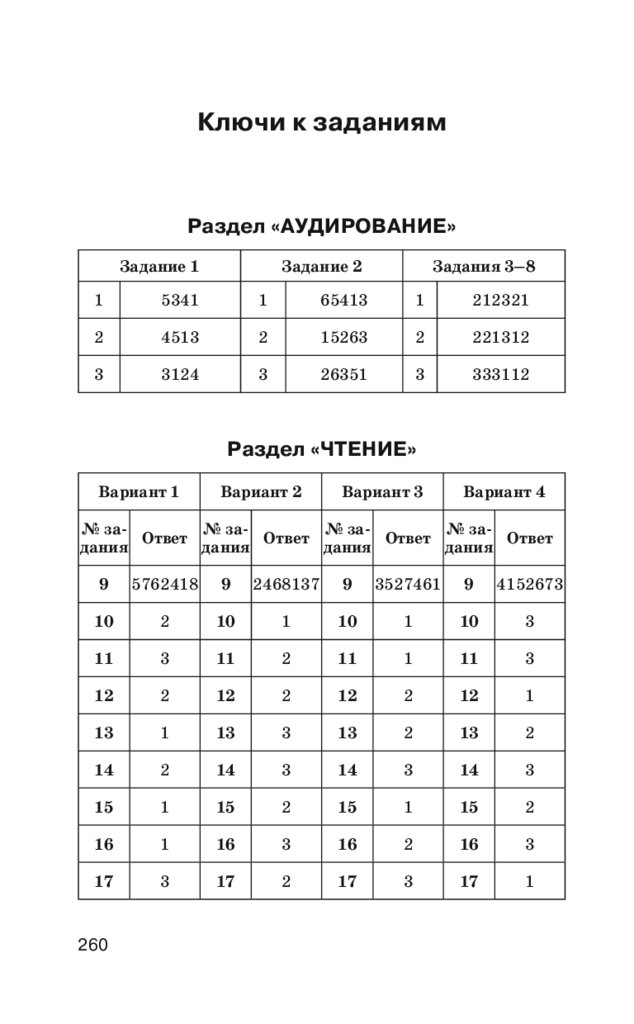
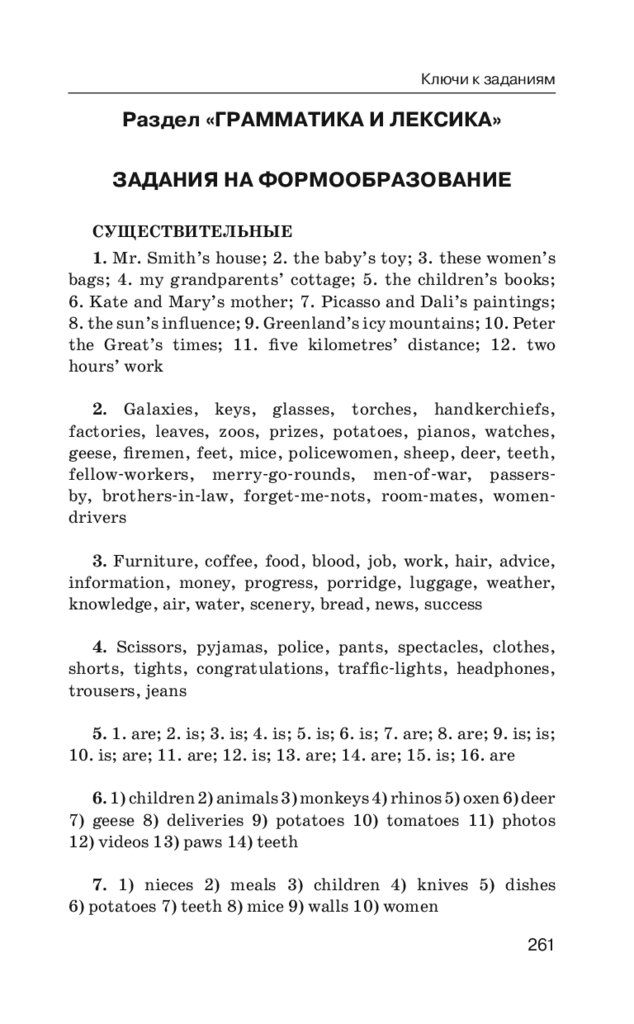
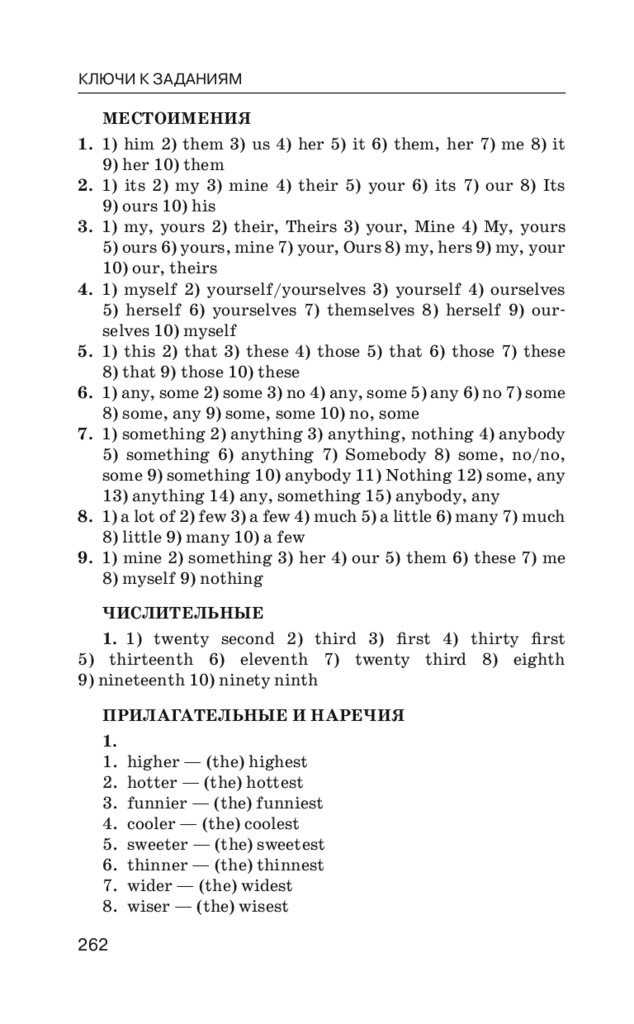
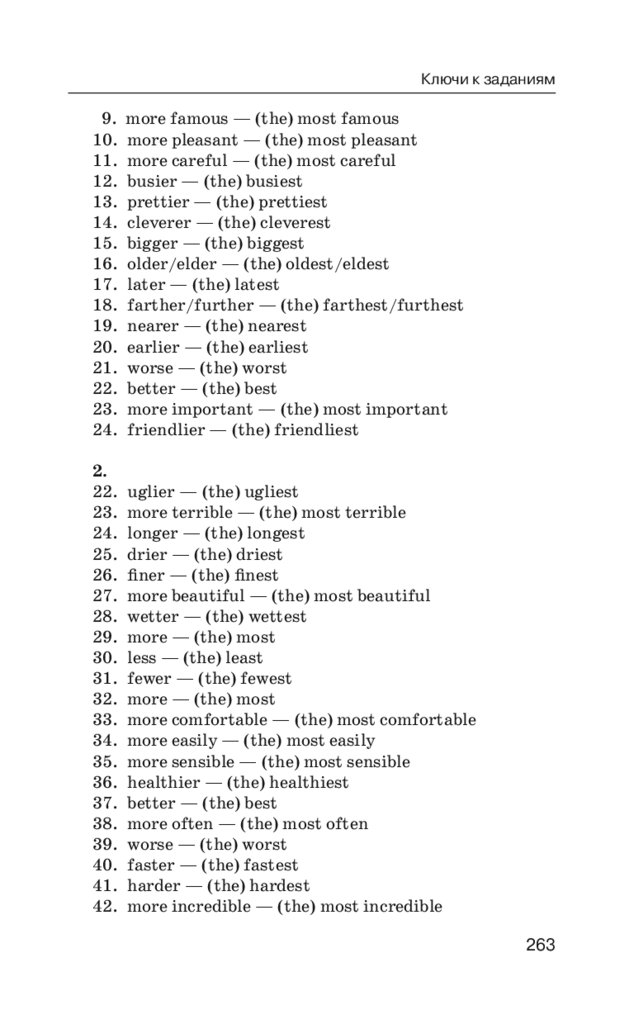
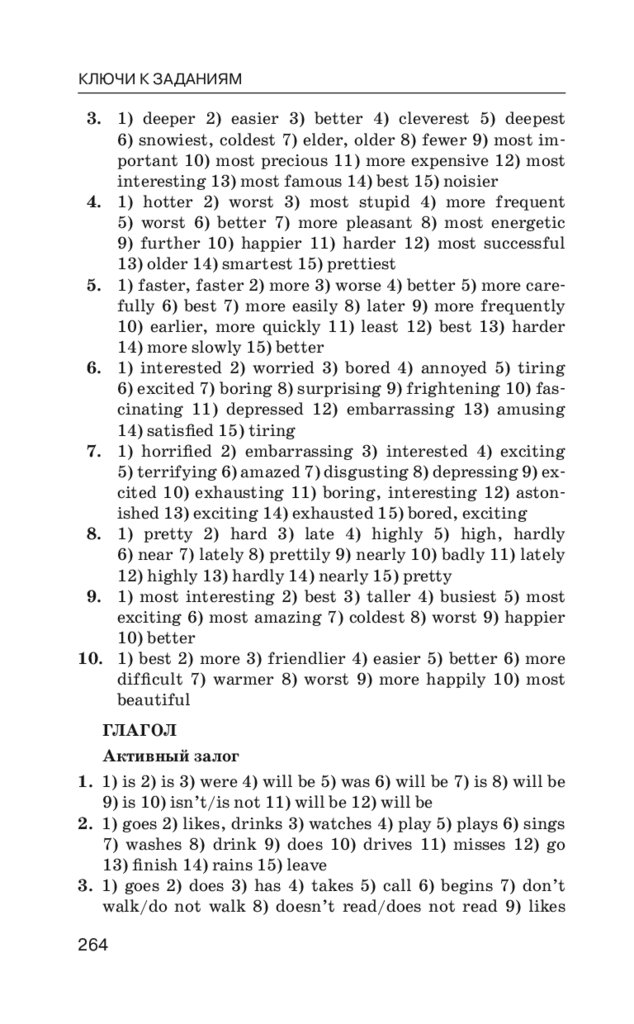
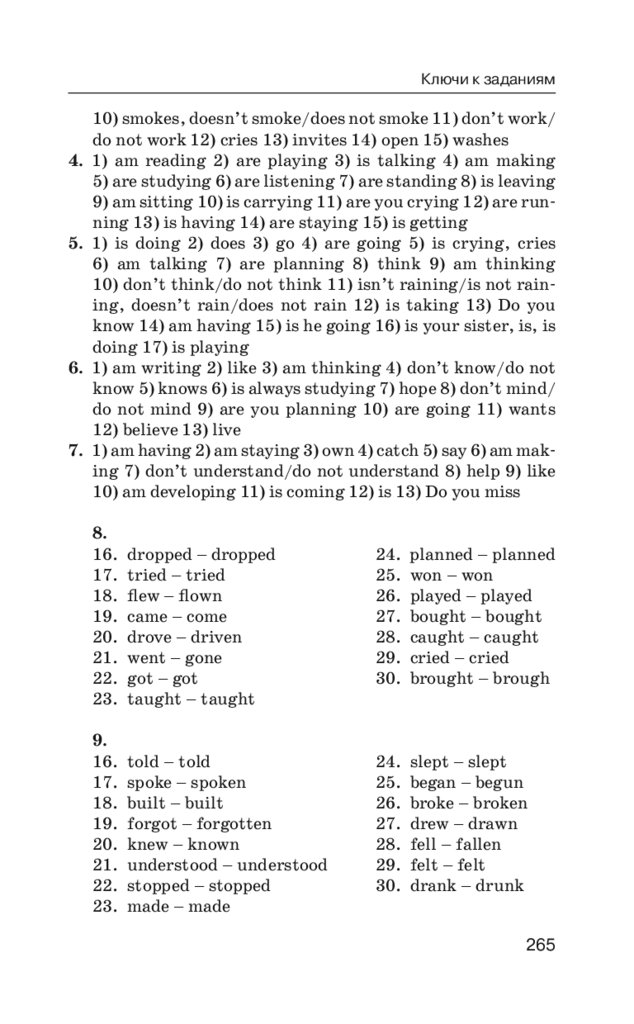
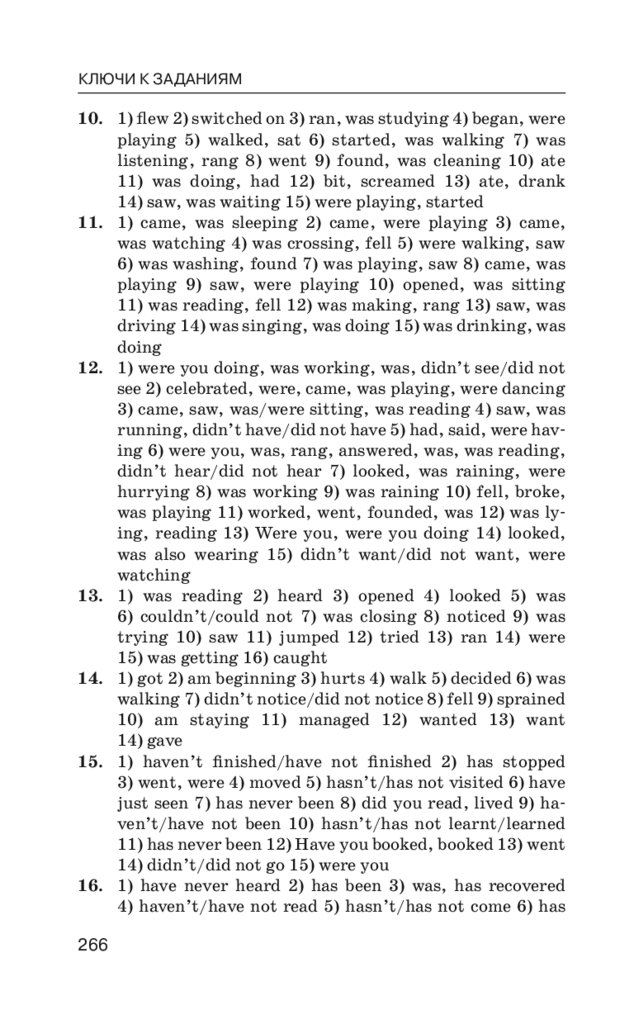
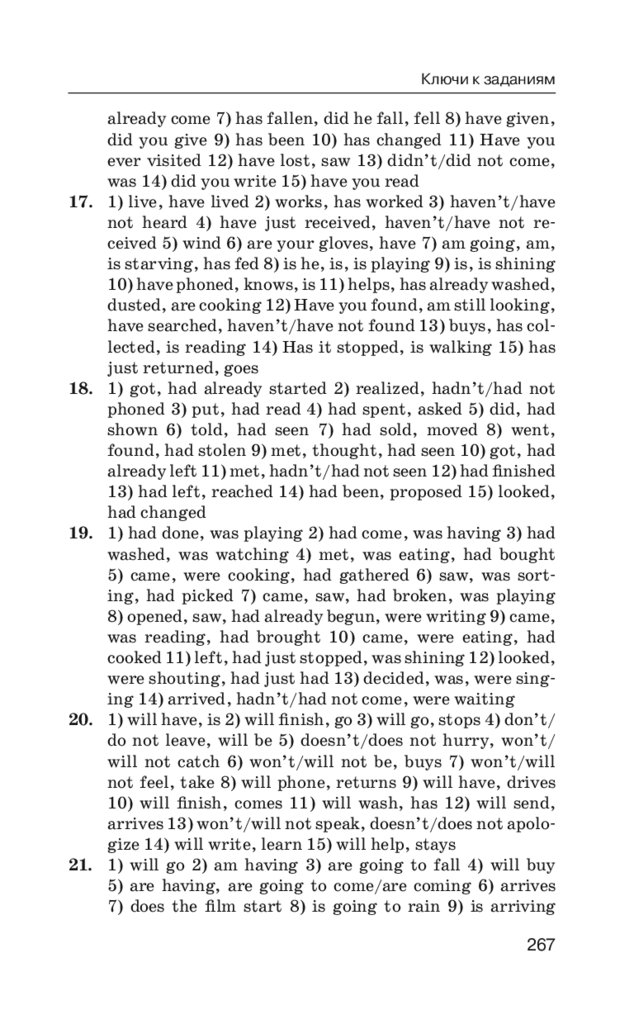
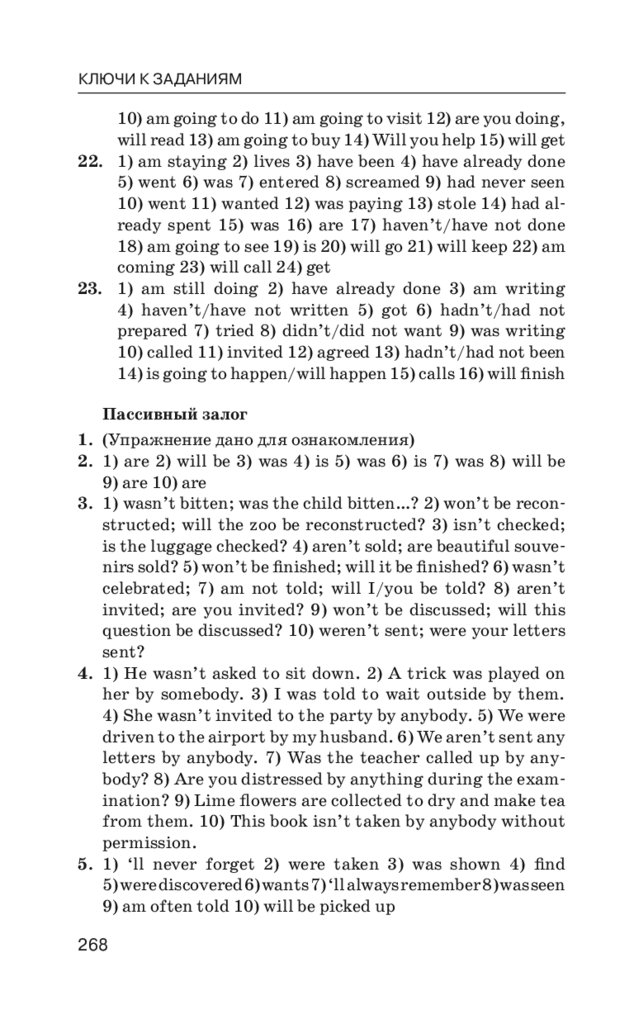
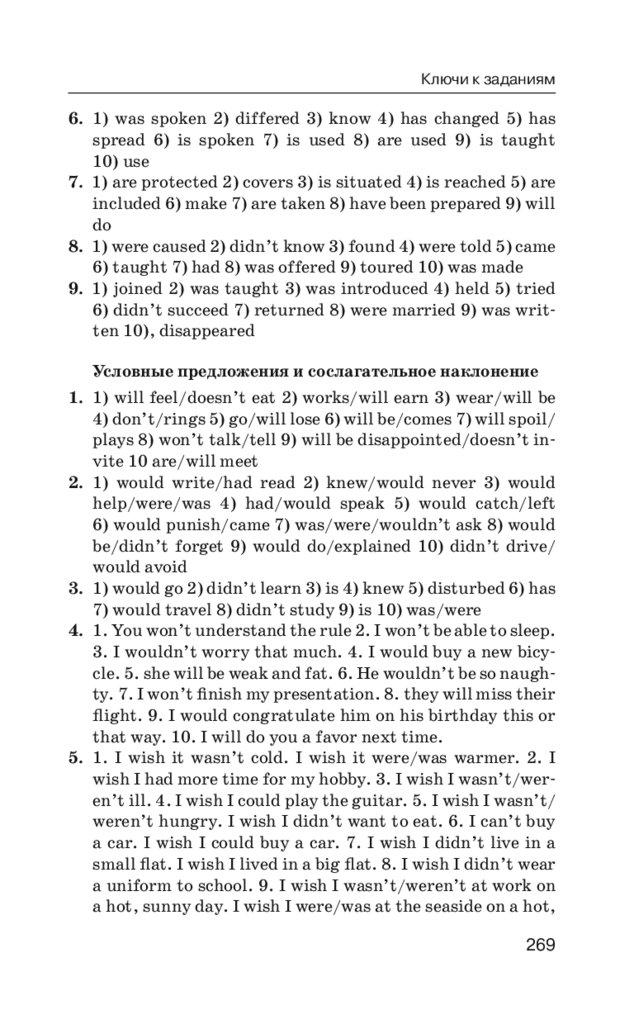
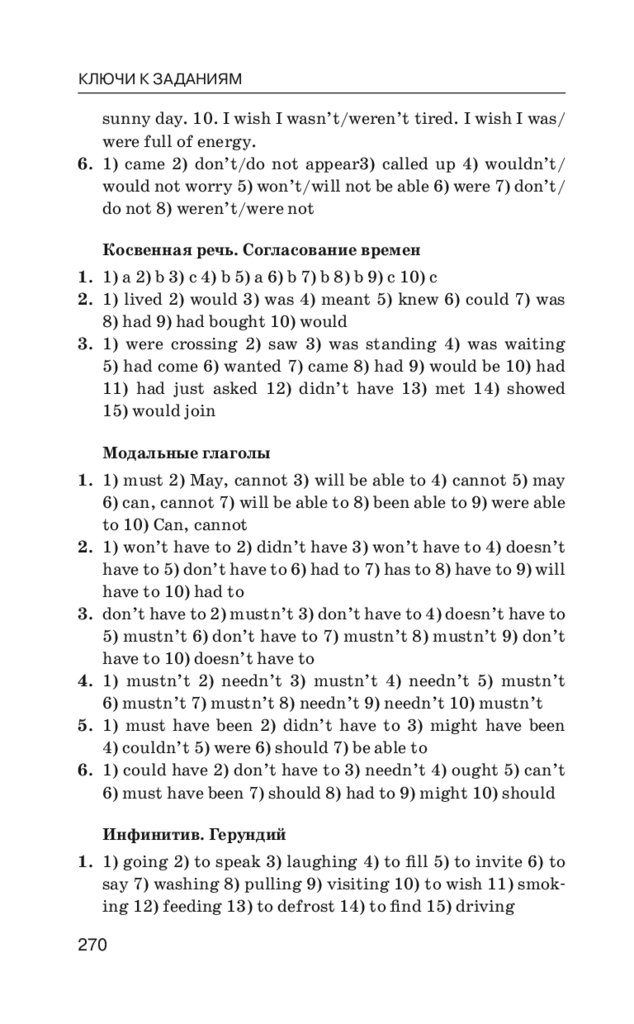
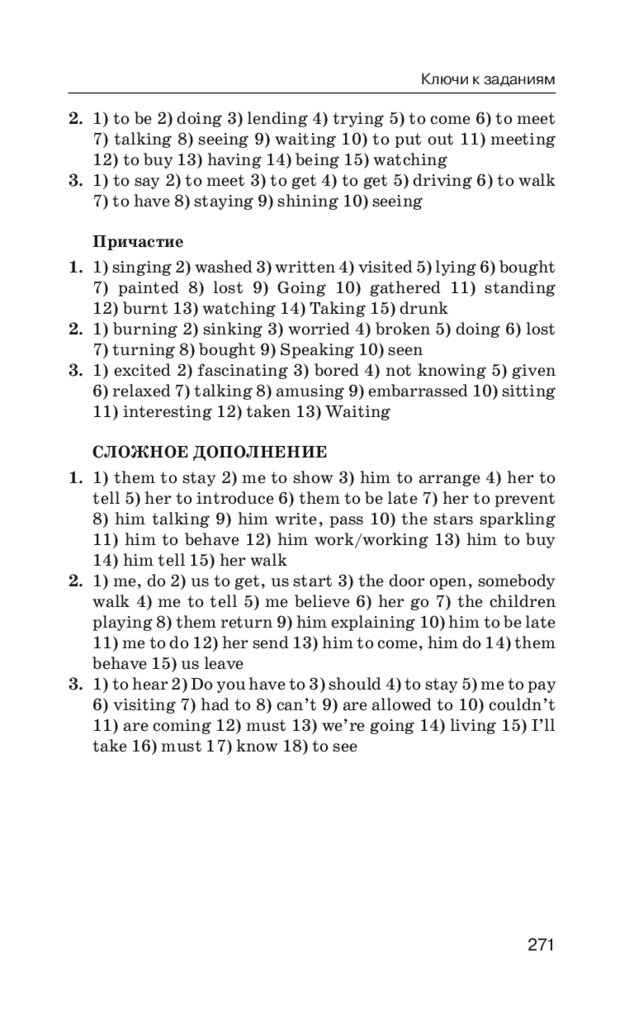
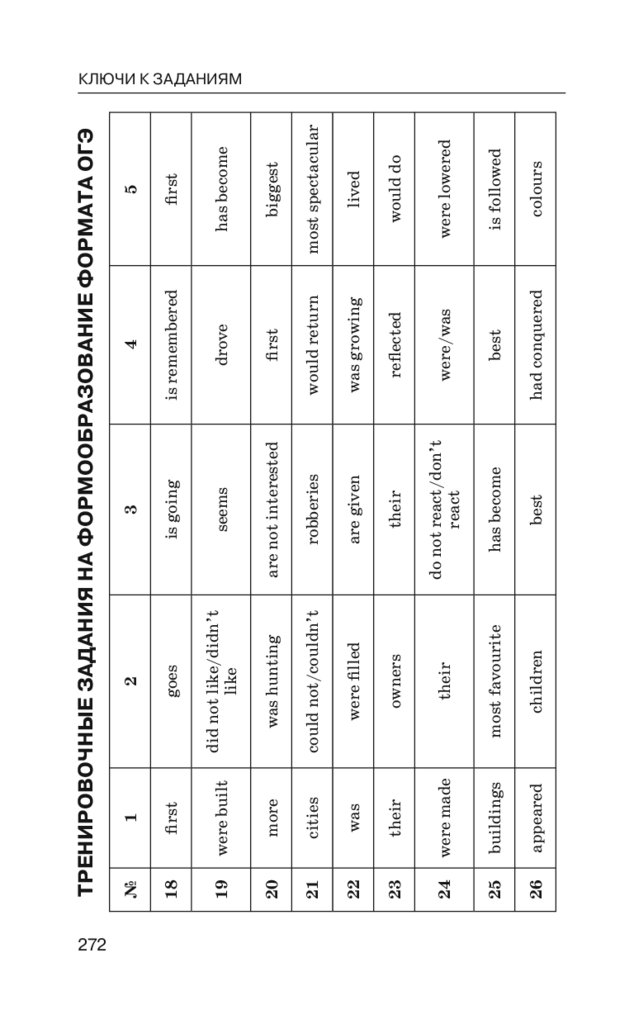
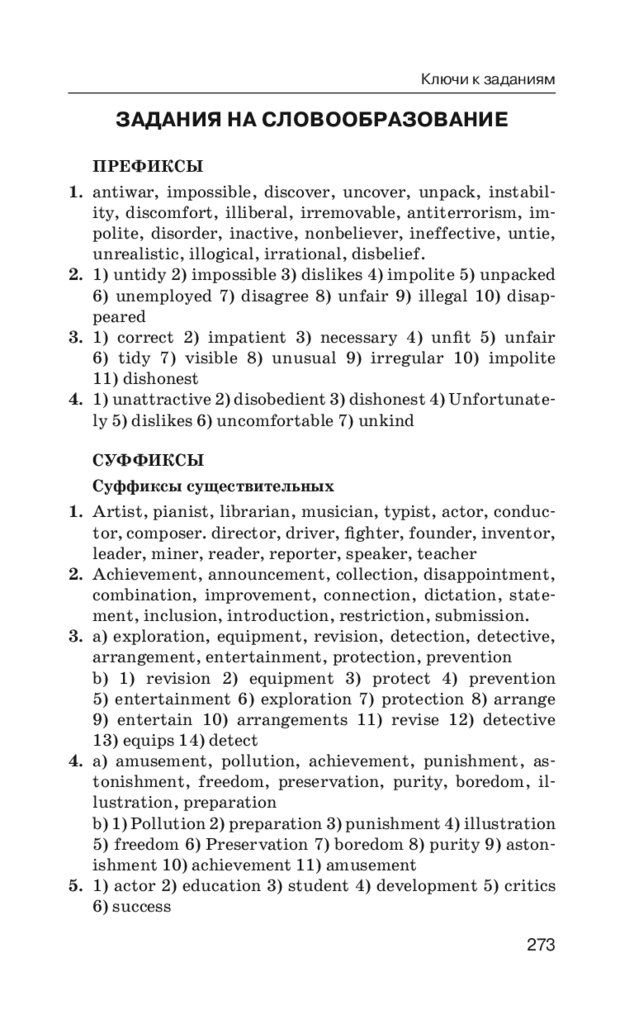
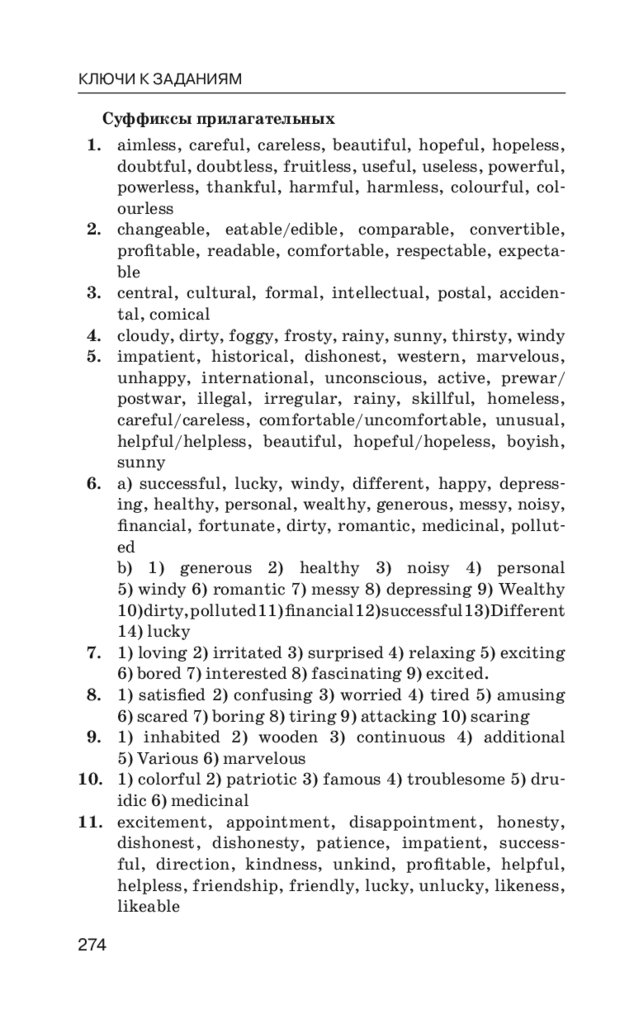
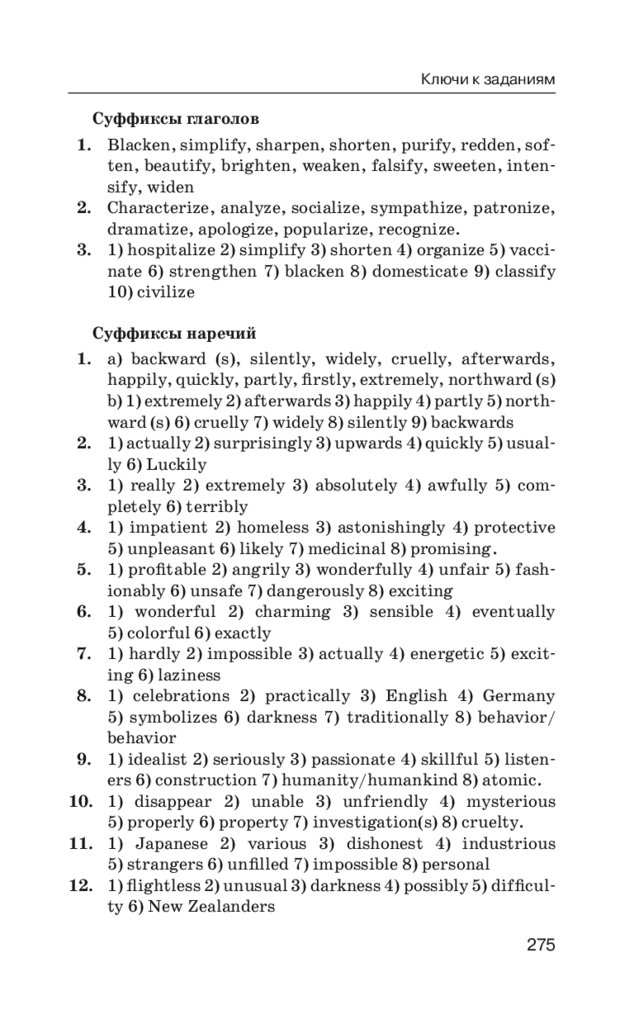
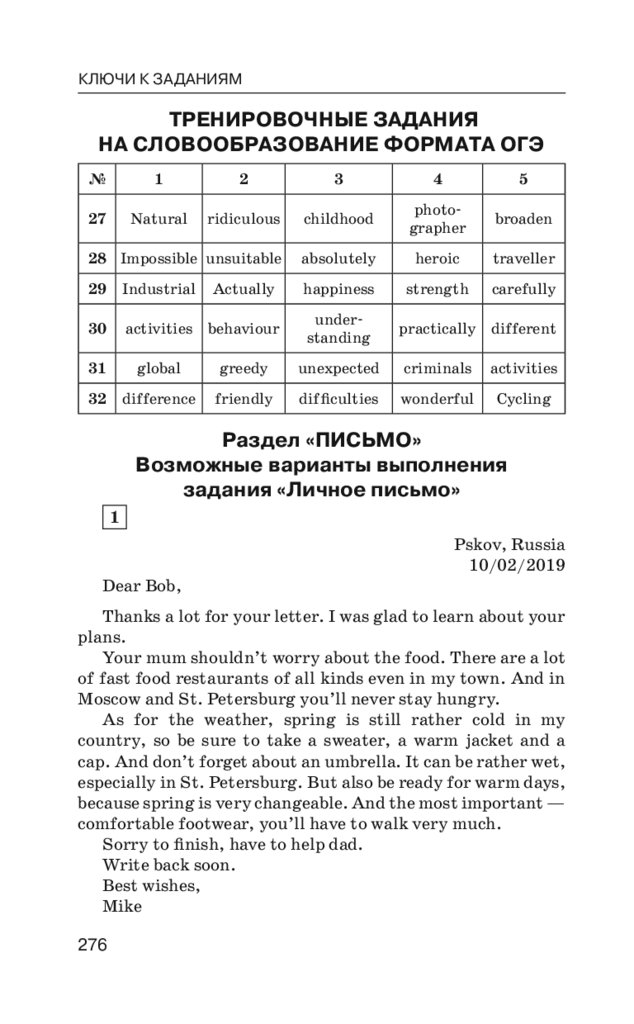
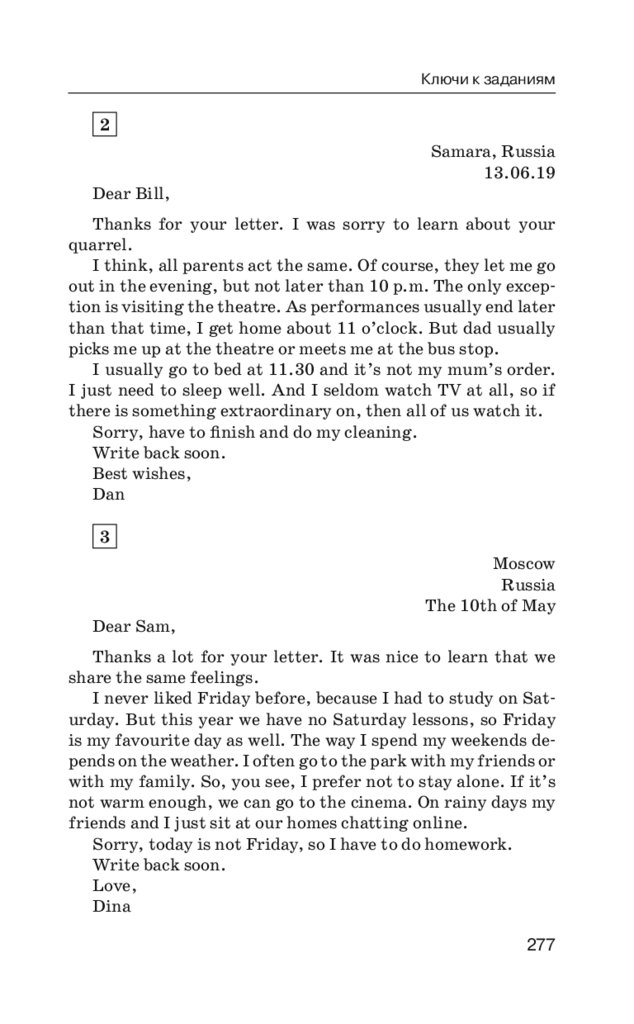
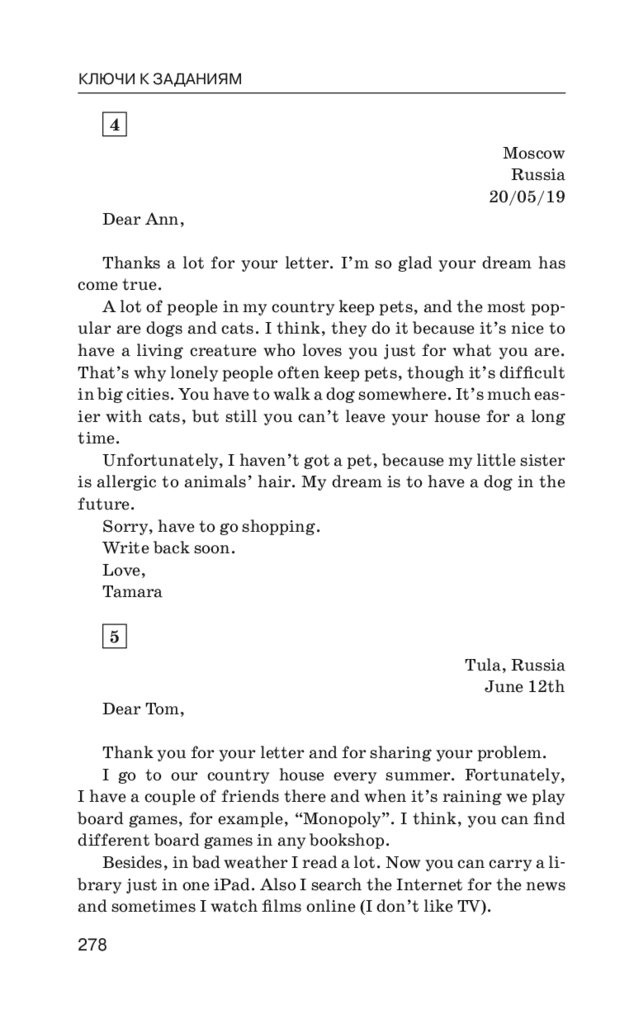
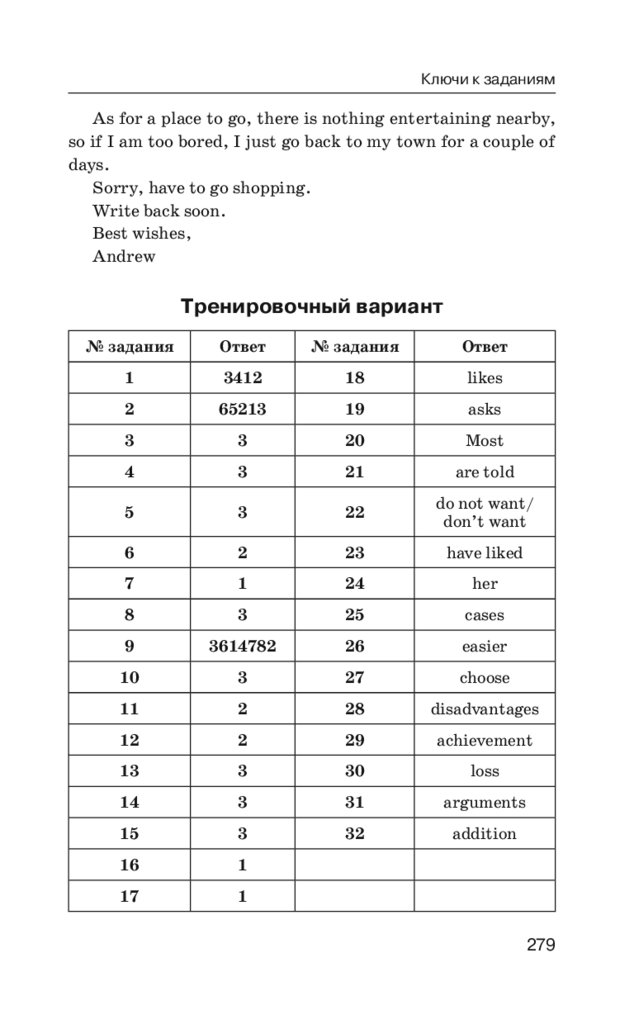
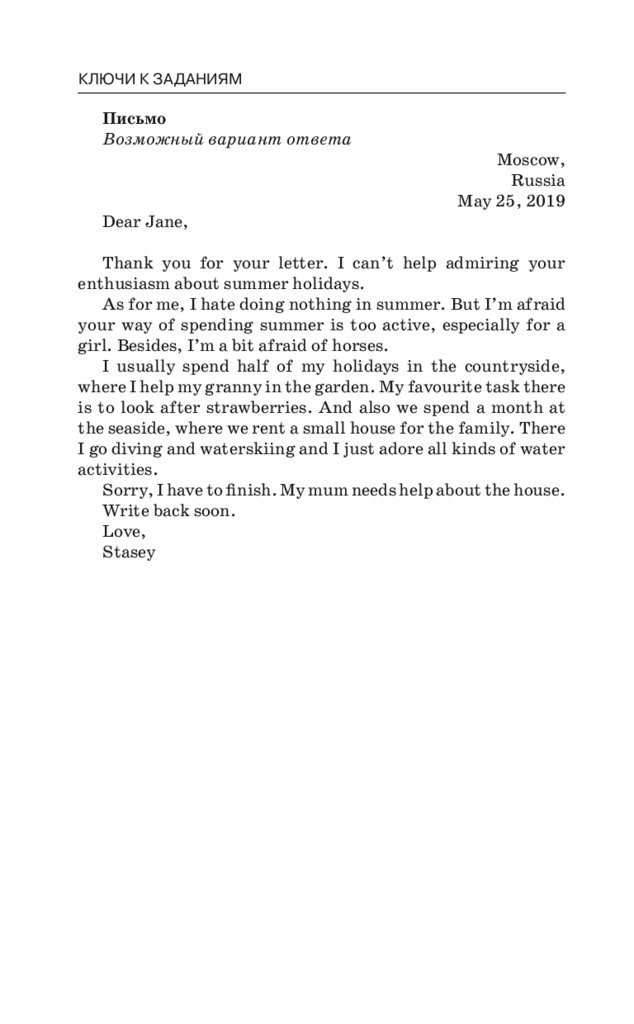
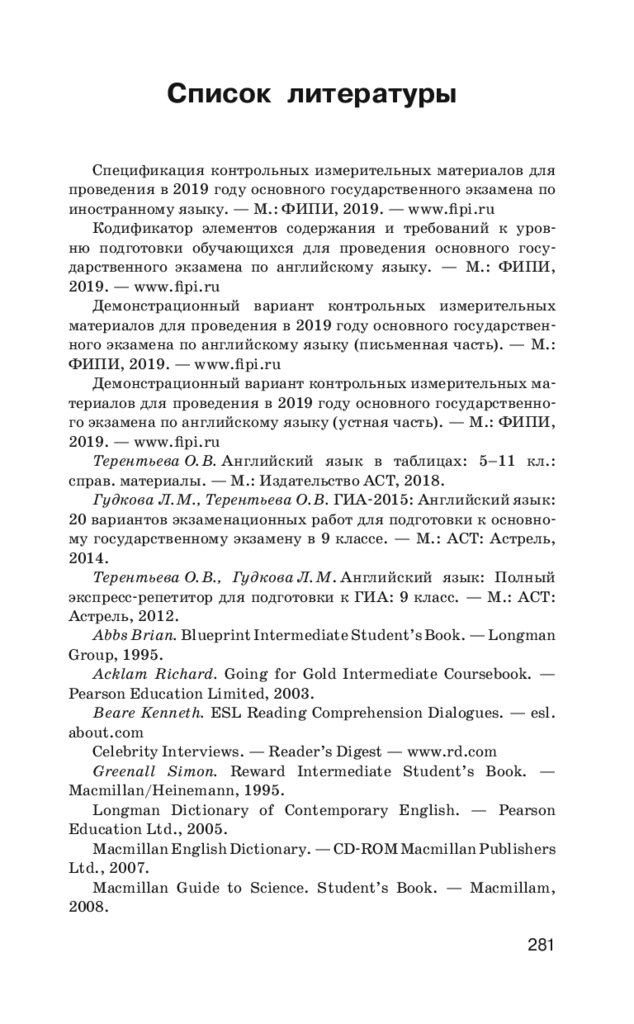

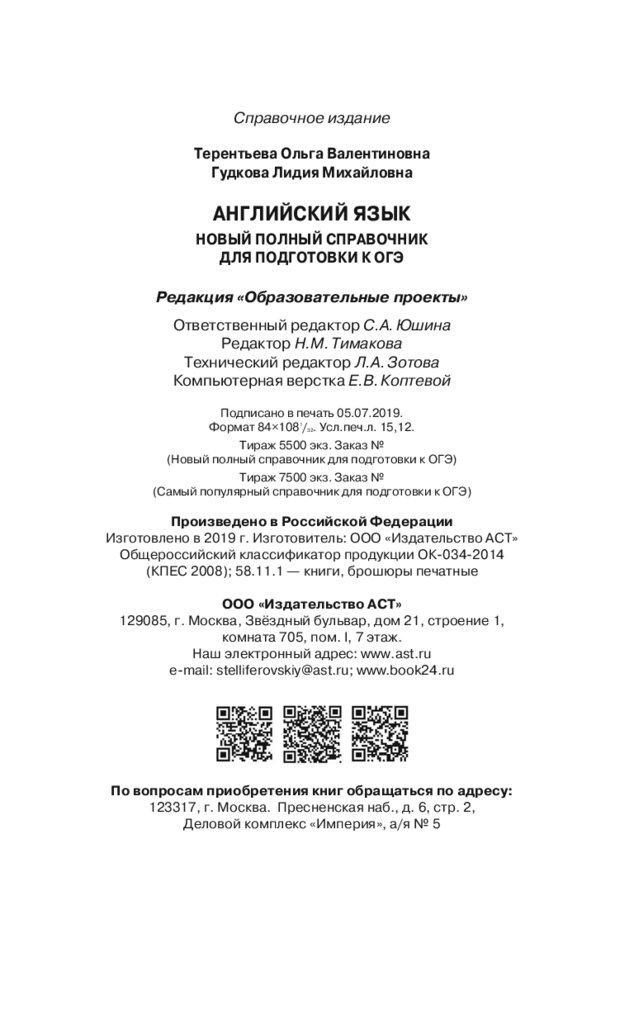
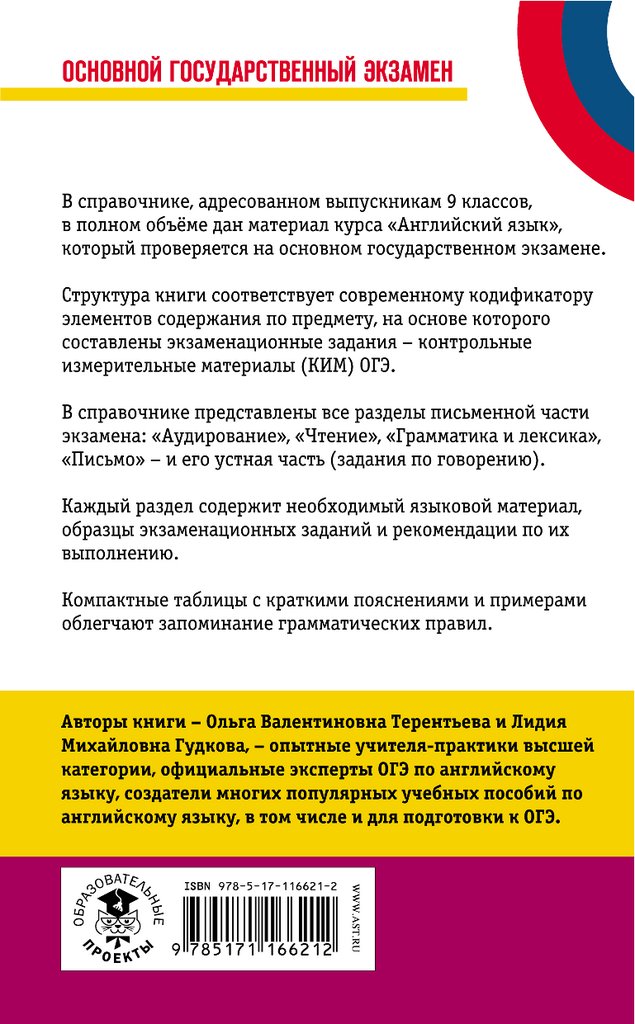
 english
english








